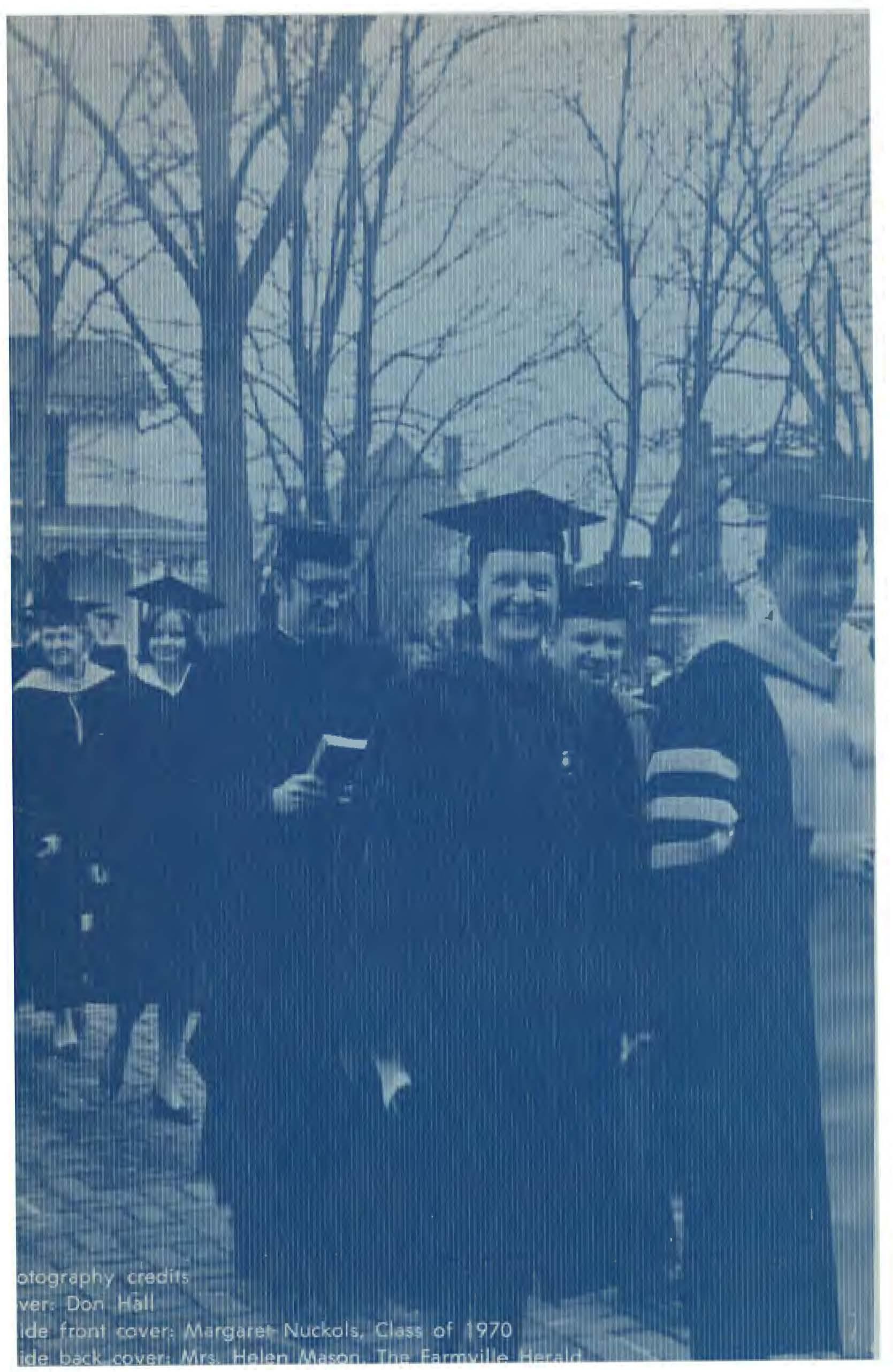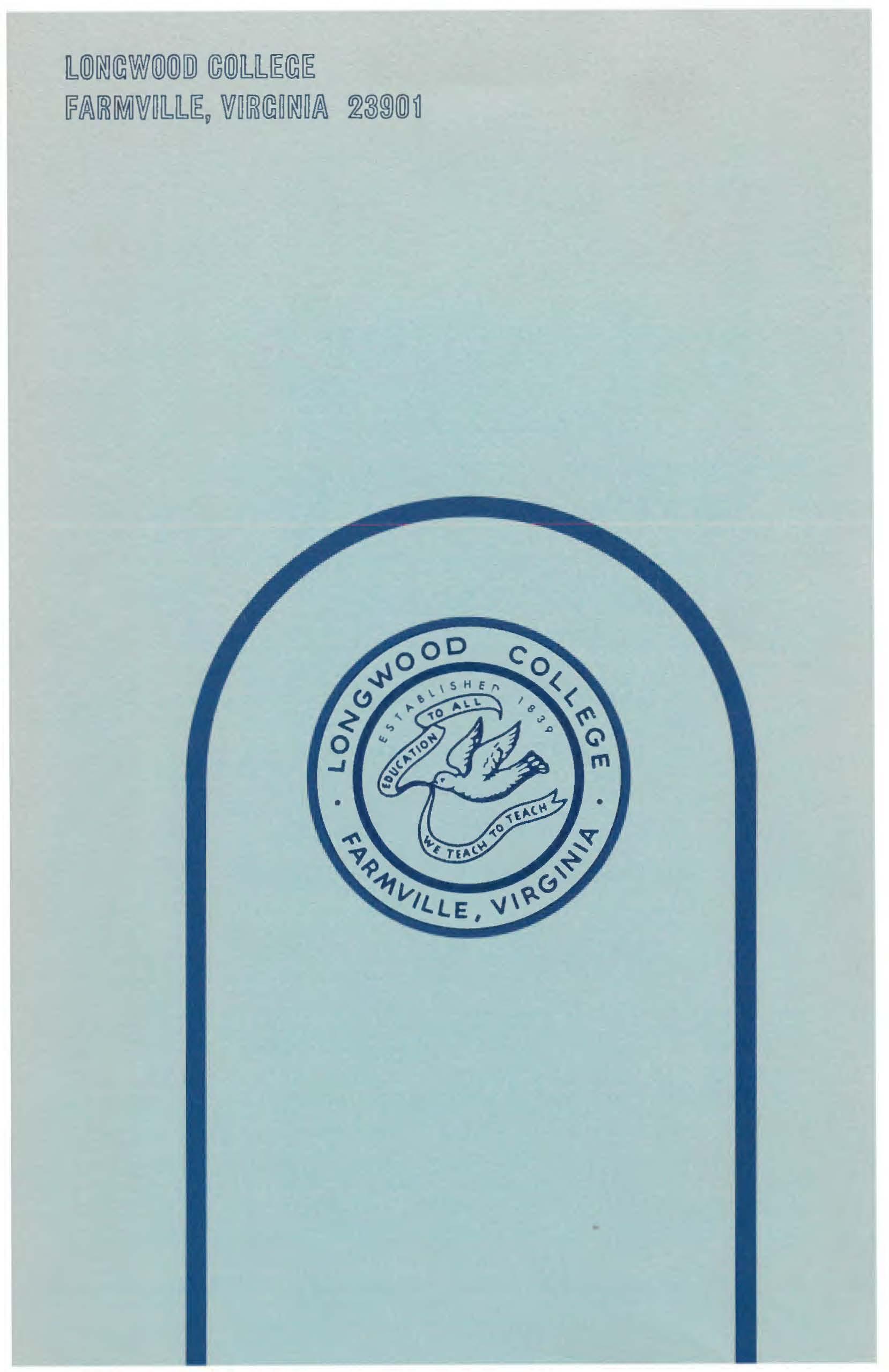




Farmville Virginia 23901
Announcements Session 1970 71
Virginia's First State College for Women
Accredited by : Southern Association of Colleges and Schools , National Council for Accreditation of Teacher Education, Virginia State Board of Education
Eighty-seventh session begins September 13, 1970
VOLUME LVI
NUMBER 2 APRIL 1970
Published quarterly by Longwood College, Farmville , Va . 23901 Second class mailing privilege authorized at Farmville , Va 23901
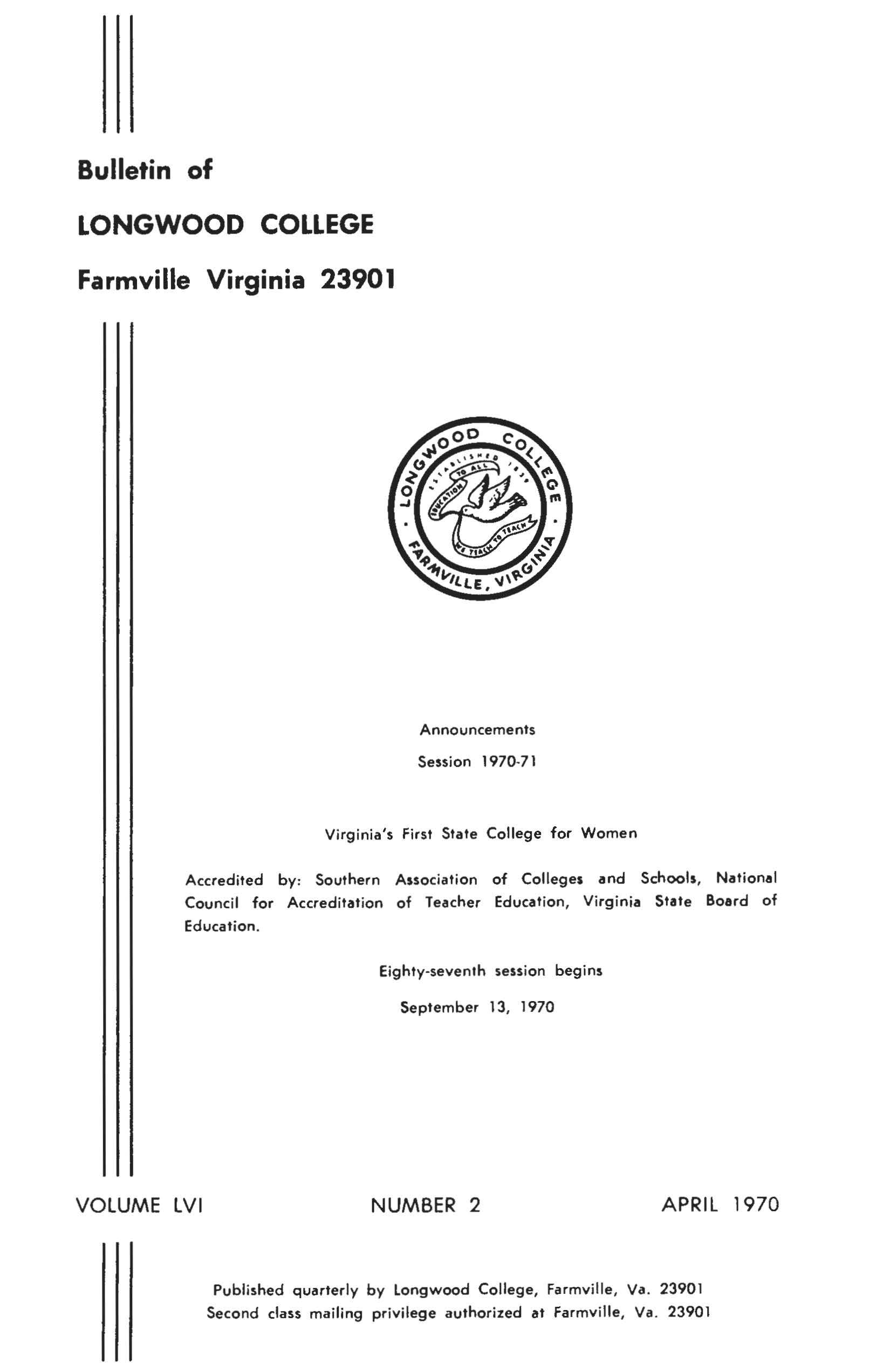

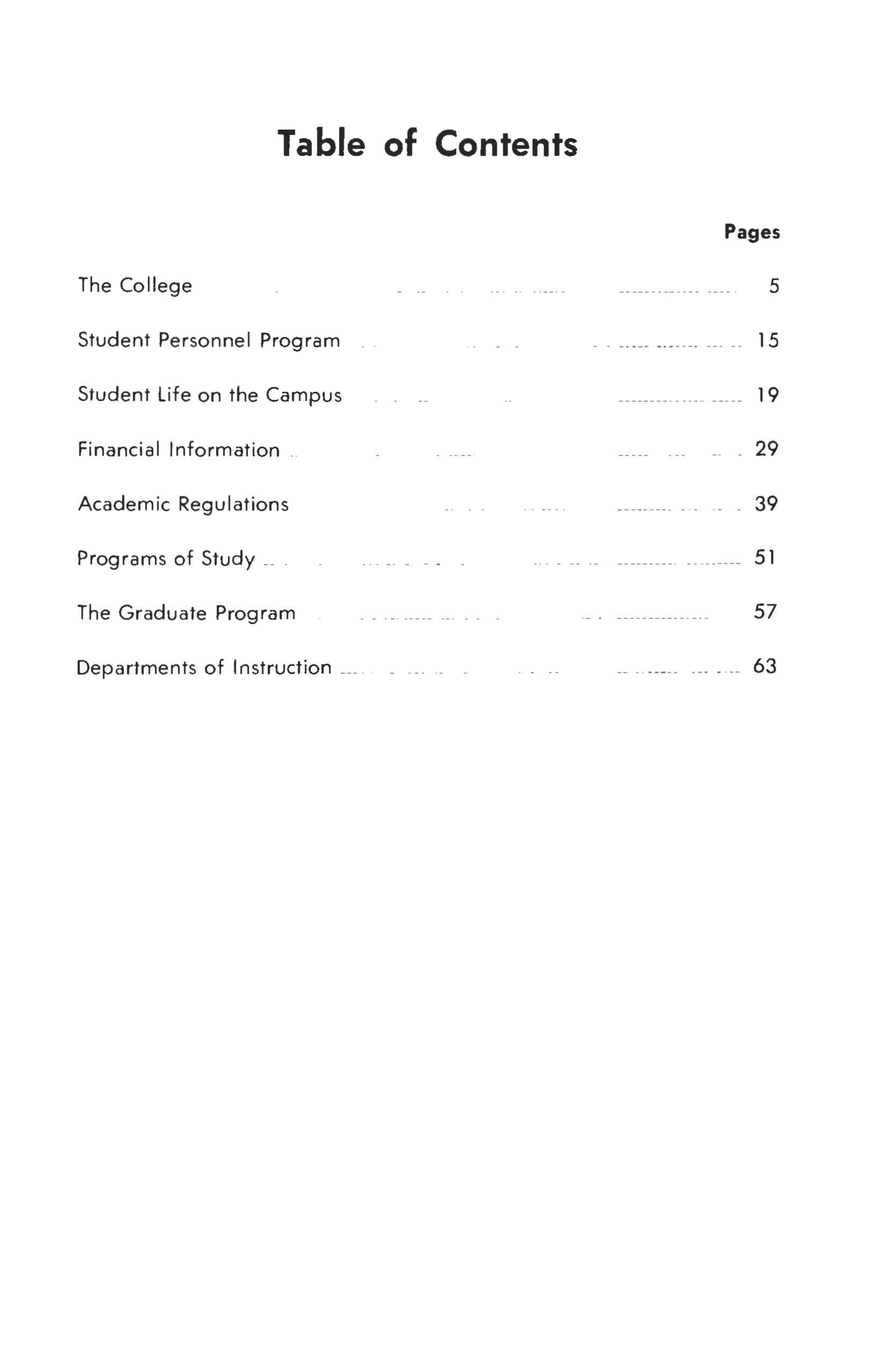

First Semester
September 13 September 14 September 17 September 18 September 21 September 28 October 5 November 6 November 9 November 13 November 17 November 25 November 30 December 18 January 4 January 15 January 18 January 27
Sunday~Opening date Freshmen and transfer students arrive
Monday-First student teaching block begins. Thursday-Academic advising for freshmen and transfers . Friday-Registration for freshmen and transfers.
Monday-Classes begin at 8:00 a.m. Monday-Last day for schedule changes. Monday-Last day on wh ich classes may be dropped without automatic "F".
Friday-First student teaching block ends. Monday-Block classes begin Friday-Mid-semester estimates due. Tuesday-Convocation Wednesday-Thanksgiving Holiday begins at 12 noon Monday-Classes resume at 8:00 a m Friday-Christmas Holiday begins at 12 noon. Monday-Classes resume at 8 :00 a.m. Friday-First semester classes end. Monday-Examinations begin Wednesday-Examinations end.
Second Semester
February February 2 February 9 February 16 March 20 March 26 April 5 April 27 May 21 May 24 June 2 June 5 June 14 August 20
Monday-Second student teaching block begins. Registration for new students. Tuesday-Classes begin at 8 :00 a.m. Tuesday-Last day for schedule changes. Tuesday-Last day on which classes may be dropped without automatic "F".
Saturday-Founders Day
Friday-Second student teaching block ends. Mid-semester estimates due. Spring vacation begins at 12 noon.
Monday-Classes resume al 8 :00 a.m Tuesday-Pre-registration for 1971-72 session. Fr iday-Second semester classes end. Monday-Examinations begin Wednesday-Examinations end Saturday-Commencement exercises . Monday-Summer Session begins Friday-Summer Session ends

The primary educational objective of Longwood College is to provide a baccalaureate curriculum for students planning to teach in elementary and secondary schools. However, the College also offers curricula for those students who wish a liberal arts degree, and for preprofessional students who plan to pursue careers in the medical sciences In addition, Longwood College provides a graduate program leading to the Master's degree for persons who wish additional preparation for teaching in the elementary and secondary schools, or for supervisory work in schools
Longwood College, a pioneer first in private and later in public education, is one of the oldest colleges for women in the United States. The College was founded on March 5, 1839, this being the date that the Farmville Female Seminary Association was incorporated by the General Assembly of Virginia. The seminary opened its doors in an impressive brick building in the Georgian style of architecture, which now forms a part of Ruffner Hall, the administration building at Longwood College . Prior to 1839 there existed the Farmville Female Seminary established in 1833 and another female seminary established in 1835 by the Reverend A. J Heustis. It is possible that the seminary of 1839 was an outgrowth of these earlier schools. If this is the case, Longwood College can justifiably claim a founding date of 1833.
In succeeding years the increasing prosperity of the Farmville Female Seminary or Female Academy, as it was sometimes called, led the stockholders to expand the seminary into a college, and the Farmville Female College was incorporated in 1860 . This college, under both private and church management, enjoyed a long period of ·successful operation. Between 1860 and 1884 it was 9irected in turn by George La Monte, a young graduate of Union College, New York; Arnaud Preot, a distinguished French musician and linguist; Dr. Paul Whitehead , a Methodist minister; and the Misses Fannie and Mary Elizabeth Carter of Mecklenburg County.
The first State legislature to assemble after the adoption of the postbellum constitution established a system of public schools in Virginia on July 11, 1870 For twelve years, or more, the conduct of these schools was entrusted to such teaching forces as were found ready at hand. However, during this period it became evident to educational leaders that some provision must be made for the training of teachers . To meet this demand, the legislature on March 7, 1884, passed an act establishing a State Female Normal School. On April 7, 1884, the State of Virginia acquired the property of the Farmville Female College, and in October of the same year the Normal School opened with 110 students enrolled . This was the first State institution of higher learning for women in Virginia .
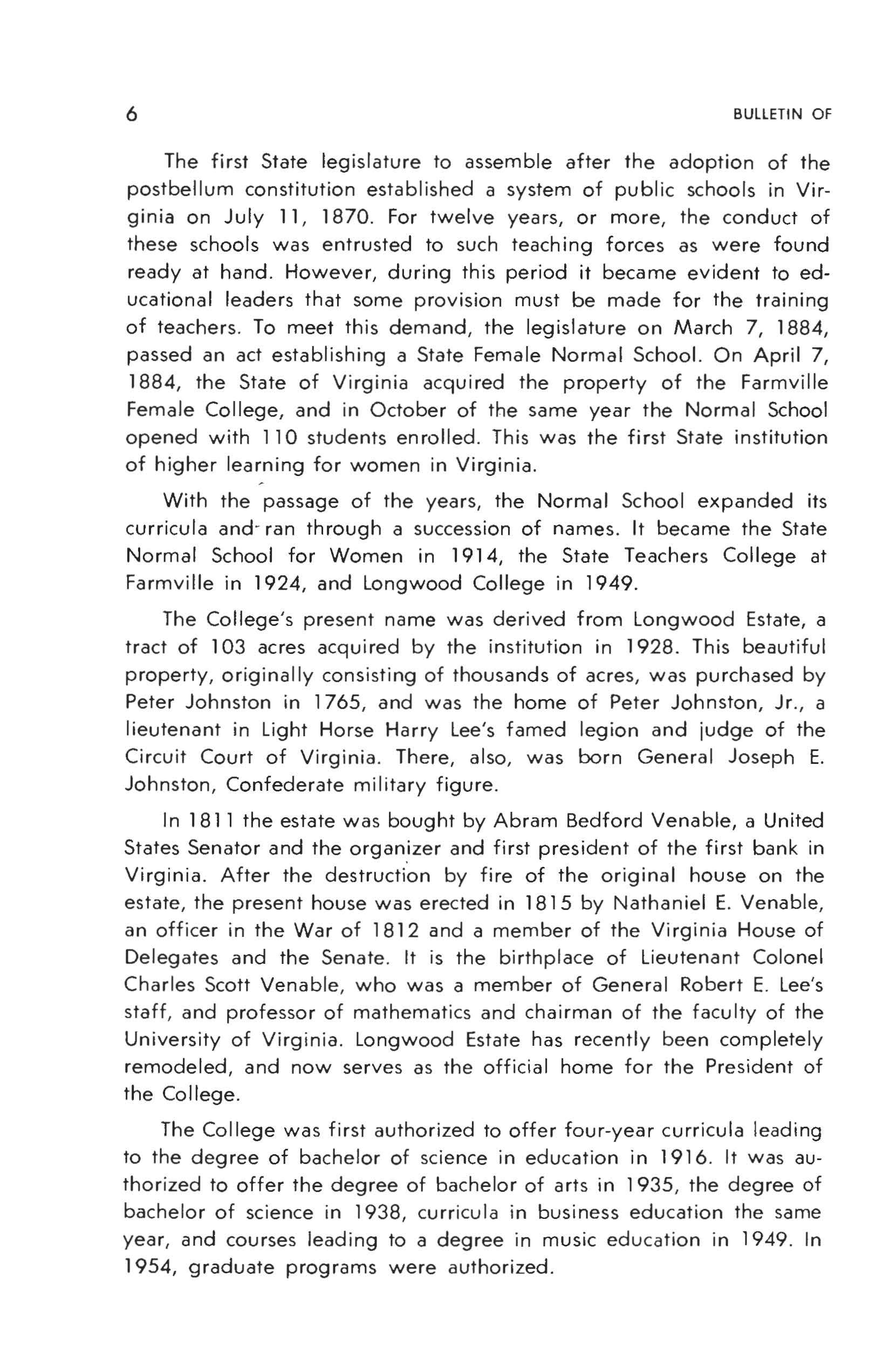
With the passage of the years, the Normal School expanded its curricula and ran through a succession of names It became the State Normal School for Women in 1914, the State Teachers College at Farmville in 1924, and Longwood College in 1949.
The College's present name was derived from Longwood Estate, a tract of 103 acres acquired by the institution in 1928. This beautiful property, originally consisting of thousands of acres, was purchased by Peter Johnston in 1765, and was the home of Peter Johnston, Jr., a lieutenant in Light Horse Harry Lee's famed legion and judge of the Circuit Court of Virginia There, also, was born General Joseph E. Johnston, Confederate military figure
In 1811 the estate was bought by Abram Bedford Venable, a United States Senator and the organizer and first president of the first bank in Virginia. After the destruction by fire of the original house on the estate, the present house was erected in 1815 by Nathaniel E. Venable, an officer in the War of 1812 and a member of the Virginia House of Delegates and the Senate It is the birthplace of Lieutenant Colonel Charles Scott Venable, who was a member of General Robert E Lee's staff, and professor of mathematics and chairman of the faculty of the University of Virginia Longwood Estate has recently been completely remodeled, and now serves as the official home for the President of the College
The College was first authorized to offer four-year curricula leading to the degree of bachelor of science in education in 1916. It was authorized to offer the degree of bachelor of arts in 1935, the degree of bachelor of science in 1938, curricula in business education the same year, and courses leading to a degree in music education in 1949 In 1954, graduate programs were authorized.
The College is located in Farmville, a Southside Virginia community, with a population of 5,000 The town is the business and educational center of this area of Virginia. Located here are churches, hotels, and the modern Southside Community Hospital. Hampden Sydney College, a liberal arts college for men, is within five miles of Farmville.
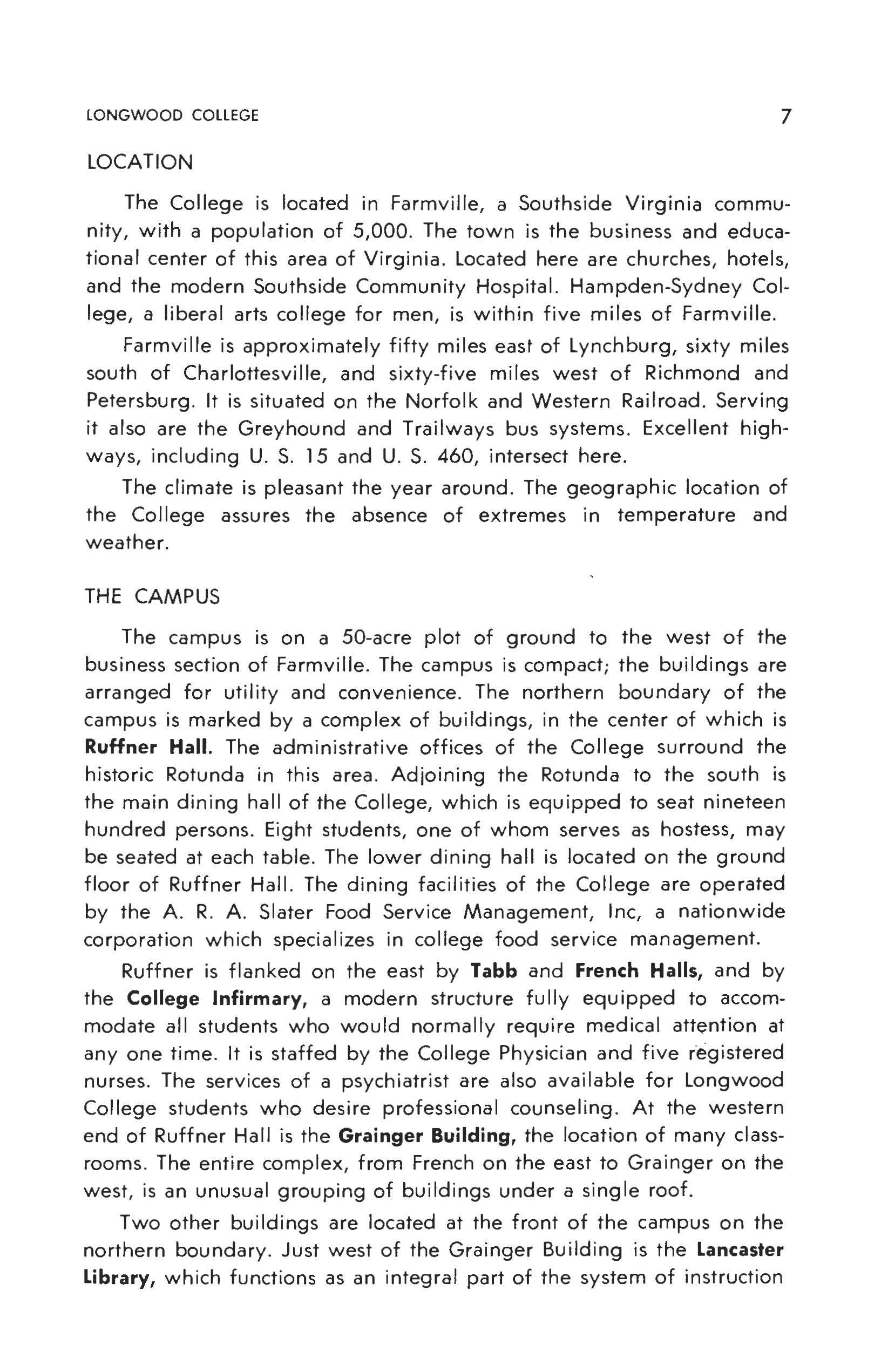
Farmville is approximately fifty miles east of Lynchburg, sixty miles south of Charlottesville, and sixty-five miles west of Richmond and Petersburg. It is situated on the Norfolk and Western Railroad. Serving it also are the Greyhound and Trailways bus systems. Excellent highways, including U. S. 15 and U S. 460, intersect here.
The climate is pleasant the year around. The geographic location of the College assures the absence of extremes in temperature and weather.
The campus is on a 50-acre plot of ground to the west of the business section of Farmville. The campus is compact; the buildings are arranged for utility and convenience . The northern boundary of the campus is marked by a complex of buildings, in the center of which is Ruffner Hall. The administrative offices of the College surround the historic Rotunda in this area . Adjoining the Rotunda to the south is the main dining hall of the College, which is equipped to seat nineteen hundred persons . Eight students, one of whom serves as hostess, may be seated at each table. The lower dining hall is located on the ground floor of Ruffner Hall . The dining facilities of the College are operated by the A. R. A. Slater Food Service Management, Inc, a nationwide corporation which specializes in college food service management.
Ruffner is flanked on the east by Tabb and French Halls, and by the College Infirmary, a modern structure fully equipped to accommodate all students who would normally require medical attention at any one time. It is staffed by the College Physician and five registered nurses . The services of a psychiatrist are also available for Longwood College students who desire professional counseling . At the western end of Ruffner Hall is the Grainger Building, the location of many classrooms . The entire complex, from French on the east to Grainger on the west, is an unusual grouping of buildings under a single roof.
Two other buildings are located at the front of the campus on the northern boundary. Just west of the Grainger Building is the Lancaster Library, which functions as an integral part of the system of instruction
at Longwood College. The building, constructed in 1938, was remodeled and substantially enlarged in 1961, and is commodious and attractive, with modern equipment. Completely air-conditioned, its three floors include individual study carrels, group study and discussion rooms, seminar rooms, a typing room, faculty carrels, and a separate reading room for the use of the collection of periodicals and newspapers on 2,300 reels of microfilm. The main book collection, approximately l 09,000 volumes, is available on open shelves to all users, with reading and informal lounge areas interspersed among the book areas on three floors. Other collections in the library include a file of 8,000 pamphlets, a picture file of 6,800 items and more than 1,300 maps. Twenty-two newspapers and some 575 current magazines are received. Also in the Library is a collection of college publications, student publications, college catalogues, alumnae bulletins, and other materials.
A library orientation program is given to all freshmen by members of the English Department in cooperation with the library staff. By means of this program students are introduced to the library· building and its functional divisions, to the various book collections, and to general and special reference tools. They are shown how to borrow library materials, how to use the Faculty Reserve Collection, and how to locate subject material or specific books. This program is followed by individual instruction through their four years of college.
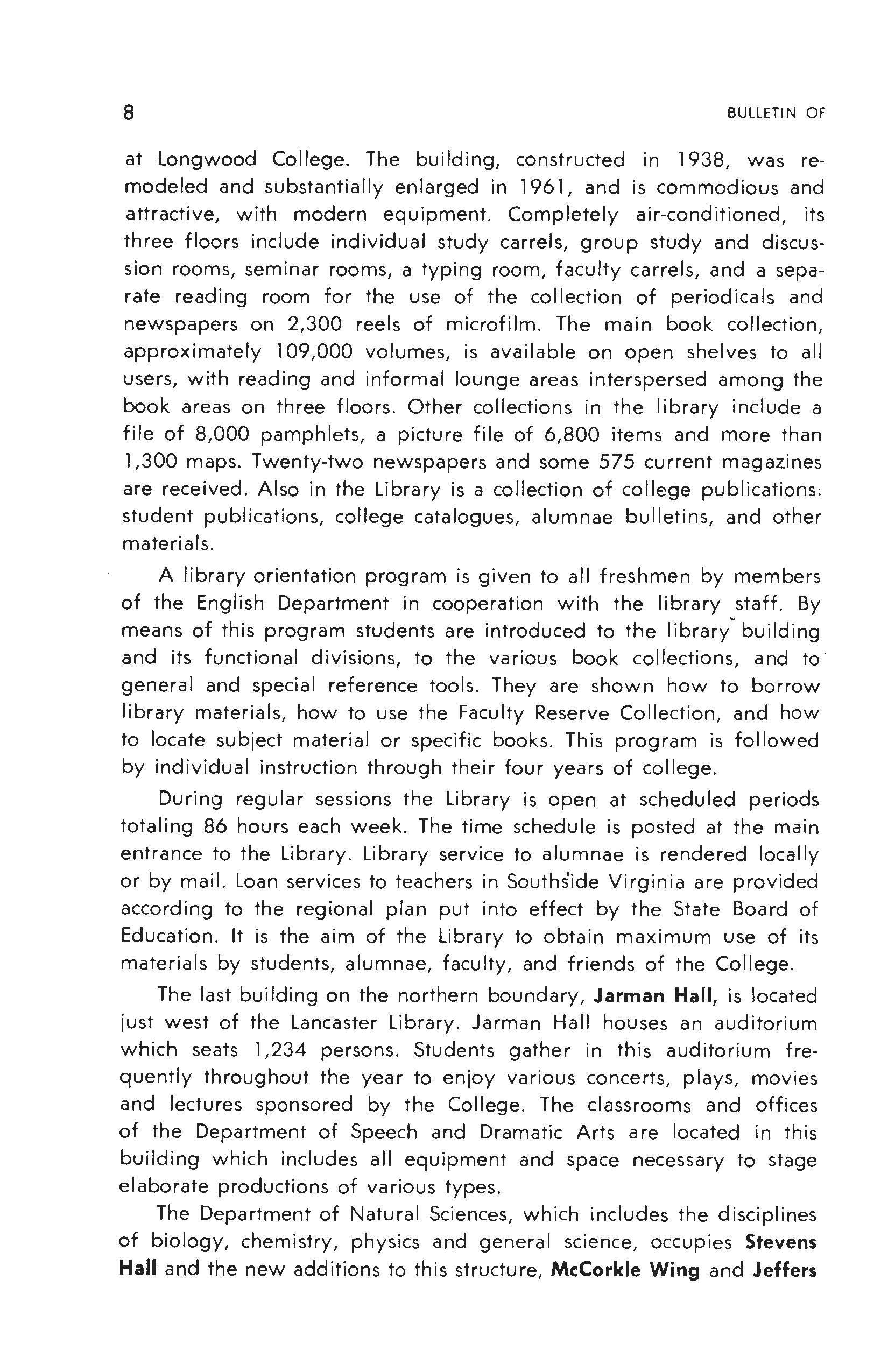
During regular sessions the Library is open at scheduled periods totaling 86 hours each week. The time schedule is posted at the main entrance to the Library. Library service to alumnae is rendered locally or by mail. Loan services to teachers in Southside Virginia are provided according to the regional plan put into effect by the State Board of Education. It is the aim of the Library to obtain maximum use of its materials by students, alumnae, faculty, and friends of the College.
The last building on the northern boundary, Jarman Hall, is located just west of the Lancaster Library. Jarman Hall houses an auditorium which seats 1,234 persons. Students gather in this auditorium frequently throughout the year to enjoy various concerts, plays, movies and lectures sponsored by the College. The classrooms and offices of the Department of Speech and Dramatic Arts are located in this building which includes all equipment and space necessary to stage elaborate productions of various types.
The Department of Natural Sciences, which includes the disciplines of biology, chemistry, physics and general science, occupies Stevens Hall and the new additions to this structure, McCorkle Wing and Jeffers
Auditorium. Located southwest of Jarman Auditorium , the StevensMcCorkle-Jeffers complex contains laboratories, lecture rooms and office space for the department . The 200-seat-capacity Jeffers Auditorium, completed in 1968, also functions as a meeting place for various college groups.
A greenhouse is located nearby for use by the department, and a modern facil i ty for the care and maintenance of research animals is available on the lower floor of Jeffers. The College Museum, located i n Stevens Hall, contains more than 1,200 minerals, rocks, fossils, plants and an i mals Most of the geological specimens were gifts from the private collect ions of D. A Brodie and H B. Derr Modern in every respect, this building enables the College to offer excellent preparation in science.
Three academic buildings, Hiner, Coyner, and lier, are located south of Grainger Hall. Hiner Building is a completely renovated and modernized structure which houses the Department of Education, Psychology and Philosophy . The major offices and classrooms of the Department of History and Social Sciences also occupy a portion of Hiner Building. Here is located the television studio which provides closedcircuit television in every room of the building. The Bureau of Teaching Materials, which contains a large selection of various aud i o-visual teaching aids, is housed in the basement of Hiner Building.
The Coyner Home Economics Building opened in the fall of 1970. The facilities of the Home Economics Building include a Child Development Laboratory; a Housing, Equipment and Home Furnishings Laboratory ; a Foods Laboratory and Clothing Laboratory . The four-year-old ch i ldren of Longwood faculty and staff members may attend the nursery school that is an integral part of the Child Development Laboratory. Adjacent to the Housing, Equipment and Home Furnishings Laboratory is a workroom in which students may learn how to repair, refi~ish and upholster furniture . A professional reading library, faculty cotriference room, offices , and a multipurpose classroom, equipped with a portable demonstration kitchen, are additional features of the Coyner Building.
The Worthy Johnson Crafts Home Management House, built in 1960, is located across the street from Ruffner. Senior home economics majors live for one semester here, gaining experience in the management of modern homes and families . The combination of the Crafts and Coyner structures prov i des the department with excellent facilities for the teaching of home economics . lier Gymnasium is one of several facilities used by the Department of Health and Physical Education In addition to the gymnasium in
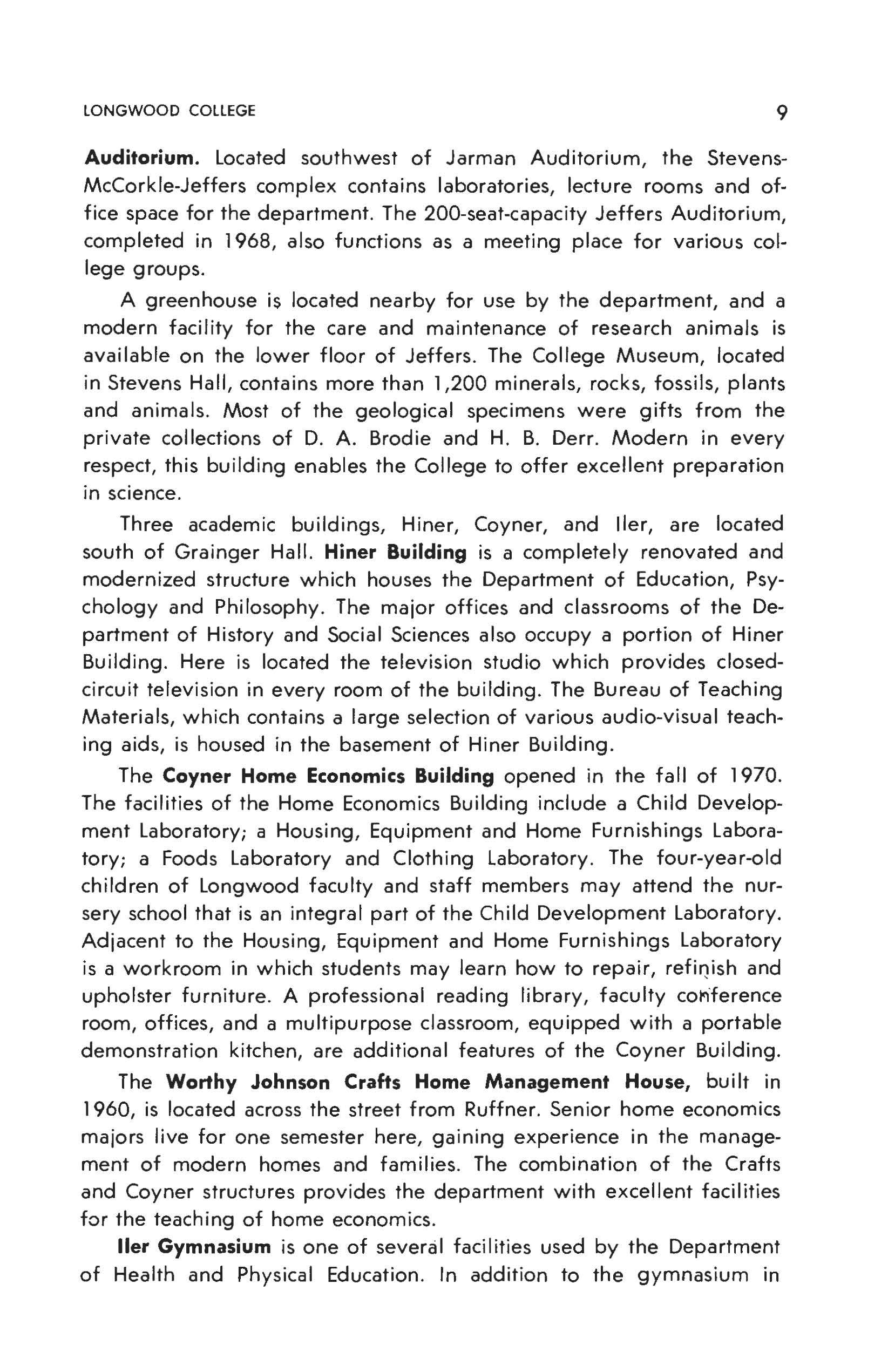
lier Building, space is also available for physical education classes in French Hall and in the Old Laundry Building, which is located just south of Tabb Hall. The swimming pool and a second gymnasium are housed in French, and a studio for dance and fencing classes is available in the Old Laundry. Three athletic fields, seven tennis courts and a regulation nine-hole golf course allow the department to offer a vigorous and varied program of physical activity.
The Wygal Music Building and the Bedford Art Building form the new Fine Arts Complex which opened in September, 1970. Located toward the south boundary of the campus, these buildings will allow the departments of Art and Music to expand their offerings significantly during the next few years. The Wygal Music Building contains a 215seat recital hall, classrooms, offices, sound-proof individual studios and practice rooms, a recording studio, and a Green Room for after-recital receptions. Among the various types of instruments available are 38 pianos, 24 electronic pianos for class instruction, a Schlicker two-manual organ, a Beckarath practice organ, and two electronic organs. Other equipment includes a Steinway grand piano, a Mason and Hamlin grand piano, a Sperrhake two-manual harpsichord, all types of string, reed, brass, and percussion instruments, and a library of recordings and music.
The Bedford Art Building houses the art collection of Longwood College. Special features of .. this structure include individual studios for painting, drawing, sculpture, ceramics and print making, as well as facilities for the teaching of photographic art. A spacious exhibit gallery will receive the works of various well-known artists throughout the year. An auditorium having a capacity of 176 seats is available for lectures and films.
At the extreme southern boundary of the campus another new facility, the Wynne Campus School, opened in September, 1970. The modern structure, of circular design, houses classrooms for elementary school children from kindergarten through the seventh grade. Observation of elementary teaching methods employed at the Campus School will supplement the student teaching experience of Longwood's elementary education majors.
Students are housed in Tabb, Ruffner, French, the Cunninghams, Wheeler, Cox, Stubbs, Curry and Frazer Dormitories. Upperclassmen draw by lot for dormitory and suites. In Main, North and South Cunningham, Wheeler, Cox, Stubbs, Curry and Frazer the rooms are arranged in suites with a connecting bath between two rooms.
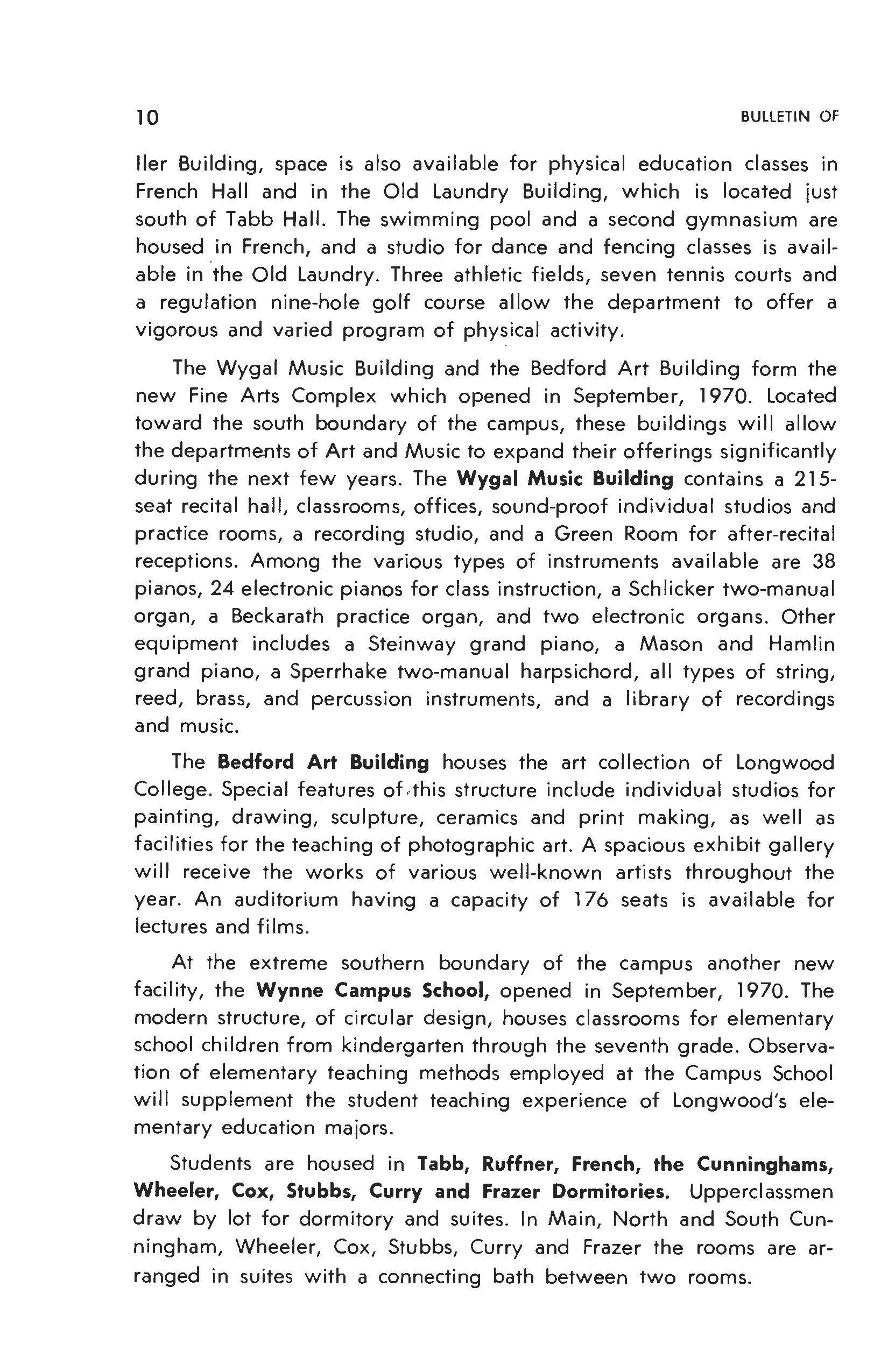
Student life in each dormitory is supervised by a Head Resident
Each student is responsible for the care of her own room. Building maintenance is under the supervision of the Housekeeper and her staff.
A typical dormitory room has two single beds, two desks, a dresser, bookshelves, chairs, and two closets. Occasionally, at students' request, some rooms may be set up as triples . Study lamps, bedspreads, bed linen, blankets, towels, wash cloths, bed pillows and waste basket are to be furnished by the student. The College laundry is located on the campus and is equipped with the necessary personnel and machinery to render excellent service to students . Automatic washing machines are also available for student use and are located in most of the dormitories in rooms planned for this purpose.
Various recreation centers are located on the campus. The Lankford Student Union, center for student activities, opened i-o the summer of 1967. Major features of the building, which is located west of lier Gymnasium, are meeting rooms for organizations, bowling all:ys, TV rooms, reading rooms, a snack bar, the book store, the post office, and bicycles which may be checked out for student use.
Each dormitory has a pleasant lounge with television where students can relax when studying is finished for the evening or where relatives and friends can be entertained when they visit. Each dormitory is also equipped with formal parlors. In addition, lovely chapter rooms for each of the social sororities et Longwood are located in Stubbs and Curry Dormitories.

The public schools in the counties adjacent to Farmville, the Roanoke City public schools, the Danville City public schools, the Richmond City public schools, the Lynchburg City public schools, the Colonial Heights City public schools, and the Chesterfield County, Henrico County, and the Prince George County public schools cooperate with the College in making facilities available for student teaching.
These schools are well equipped with laboratories, libraries, cafeterias, and workrooms. The faculties include teachers who are well qualified as supervising teachers.
The College program and the program of student teaching are coordinated through the Department of Education.
The college year consists of a regular session, including two semesters of 16 weeks each, and a summer session. The summer session for undergraduate and graduate students consists of a ten-week session divided into two five-week terms The ten-week summer session makes it possible for an undergraduate student to complete a degree program in three calendar years as compared with the traditional four academic years generally required to complete such a program.
Both undergraduate and graduate classes during the summer are scheduled for five days a week. Students may apply for admission to Longwood College in the summer session or at the beginning of either semester of the regular session.
Commencement exercises are held once a year, in the spring. Those students completing degree programs between commencements will be given a letter certifying that they have fulfilled all requirements for graduation. They will receive diplomas at the next spring commencement.
Graduating seniors must buy or rent from the college book store the caps, gowns, and hoods required for commencement exercises.
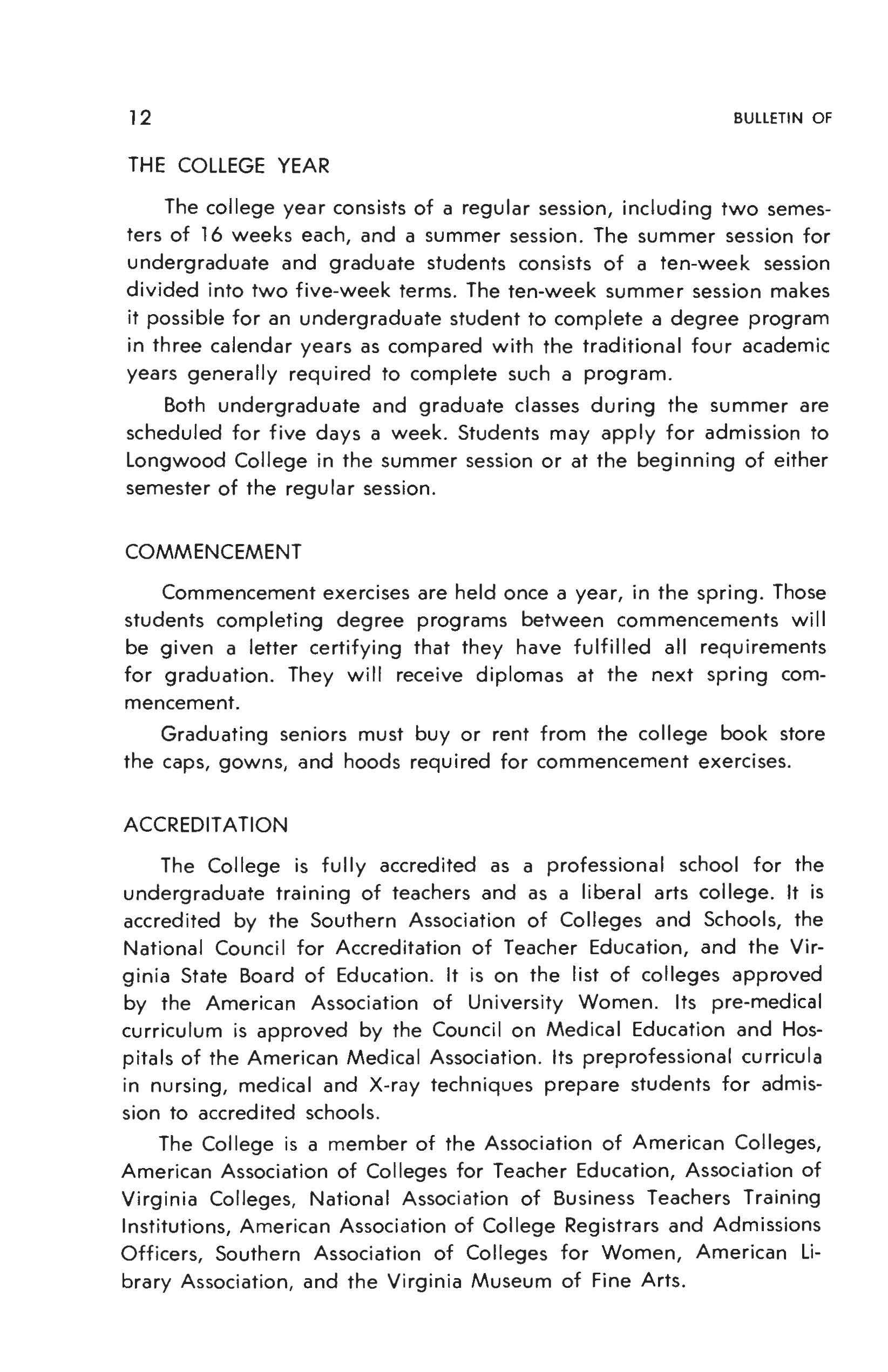
The College is fully accredited as a professional school for the undergraduate training of teachers and as a liberal arts college. It is accredited by the Southern Association of Colleges and Schools, the National Council for Accreditation of Teacher Education, and the Virginia State Board of Education. It is on the list of colleges approved by the American Association of University Women. Its pre-medical curriculum is approved by the Council on Medical Education and Hospitals of the American Medical Association. Its preprofessional curricula in nursing, medical and X-ray techniques prepare students for admission to accredited schools.
The College is a member of the Association of American Colleges, American Association of Colleges for Teacher Education, Association of Virginia Colleges, National Association of Business Teachers Training Institutions, American Association of College Registrars and Admissions Officers, Southern Association of Colleges for Women, American Library Association, and the Virginia Museum of Fine Arts.
The variety of courses available to Longwood students has been increased by a cooperative arrangement with Hampden-Sydney College. Under the terms of the arrangement, ful 1-time students at either institution may enroll for courses at the other institution without added expense Students desiring to take advantage of this program must secure approval from the Dean of the College
Longwood College students may find these academic areas of particular interest: P,ible and religion; classical languages; computer mathematics.
Longwood College is affiliated with the University Center in Virginia, an agency which brings nationally known scholars and lecturers to the Virginia area, and arranges programs of research, cooperative professorships, adult education, and library exchanges among member colleges. Longwood shares directly in the enriched educational activity made possible through the joint efforts of the institutions affiliated with the Center


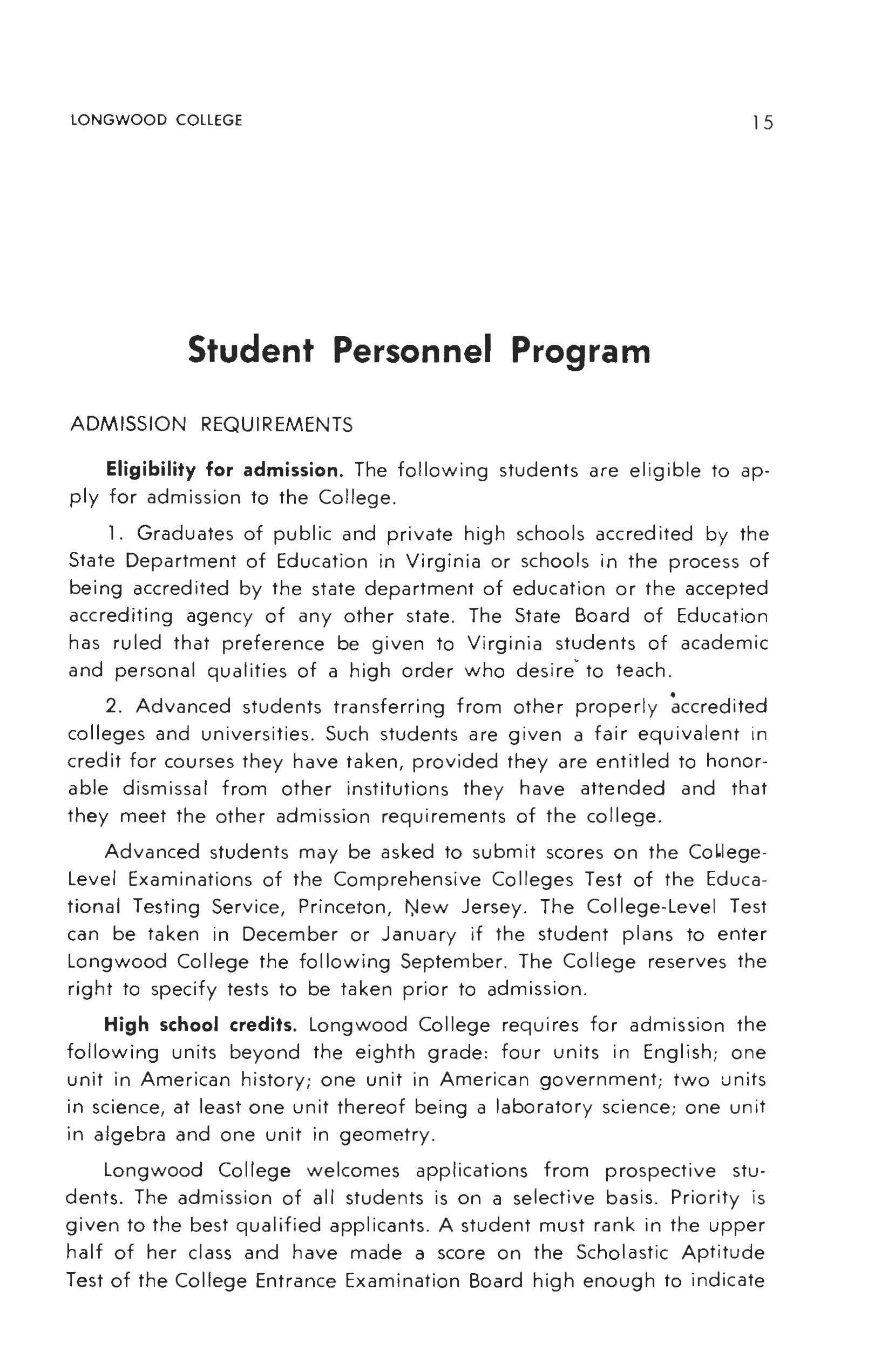
Eligibility for admission. The following students are eligible to apply for admission to the College.
l Graduates of public and private high schools accredited by the State Department of Education in Virginia or schools in the process of being accredited by the state department of education or the accepted accrediting agency of any other state. The State Board of Education has ruled that preference be given to Virginia students of academic and personal qualities of a high order who desire to teach.
2 Advanced students transferring from other properly ~ccredited colleges and universities. Such students are given a fair equivalent in credit for courses they have taken, provided they are entitled to honorable dismissal from other institutions they have attended and that they meet the other admission requirements of the college.
Advanced students may be asked to submit scores on the CoLlegeLevel Examinations of the Comprehensive Colleges Test of the Educational Testing Service, Princeton, r-:,Jew Jersey. The College-Level Test can be taken in December or January if the student plans to enter Longwood College the following September. The College reserves the right to specify tests to be taken prior to admission.
High school credits. Longwood College requires for admission the following units beyond the eighth grade: four units in English; one unit in American history; one unit in American government; two units in science, at least one unit thereof being a laboratory science; one unit in algebra and one unit in geometry.
Longwood College welcomes applications from prospective students. The admission of all students is on a selective basis. Priority is given to the best qualified applicants. A student must rank in the upper half of her class and have made a score on the Scholastic Aptitude Test of the College Entrance Examination Board high enough to indicate
success at Longwood College. In order to apply for admission a student must take the following steps :
1. Submit the preliminary application blank found in the back of this catalogue. This must be accompanied by an application fee of ten dollars, which will not be refunded . Checks and money orders should be made payable to Longwood College
2. Fill out and return to the Director of Admissions a detailed application blank which will be sent to her when the College receives the preliminary application blank.
3 Request that the principal of the high school from which she was (or is to be) graduated submit to the Director of Admissions a transcript of her high school record on a form prov i ded by the College . Students who have attended other colleges and universities must likewise request that the registrars of those institutions send complete transcripts of their records .
All applicants are required to take the Scholastic Aptitude Test of the College Entrance Examination Board and they must request that the test score be sent to the Director of Admissions of Longwood College. Students who are planning to continue the study of a foreign language should take the achievement test in the language of their choice . Data from the Scholastic Aptitude tests administered by the State Department of Education in cooperation with the local school divisions will be reported by the high school principal on the transcript form.
When the College receives the student's application, application fee, the transcripts of her records , and scholastic aptitude test score or scores, its Committee on Admissions examines her qualifications carefully and notifies her as to whether or not her application is accepted.
Students accepted for admission will be required to make a nonrefundable deposit of $50 00 in order to reserve a ~oom in the dormitories . The date this payment is due will be indicated in the admission letter.
The College recognizes that the acquiring of knowledge is only one phase of the student's education It must also assist each student to develop in all areas of life. It must be prepared to assist her in making plans for the future and in solving problems of the present It must be interested in her as a person as well as one of a class group . Therefore,
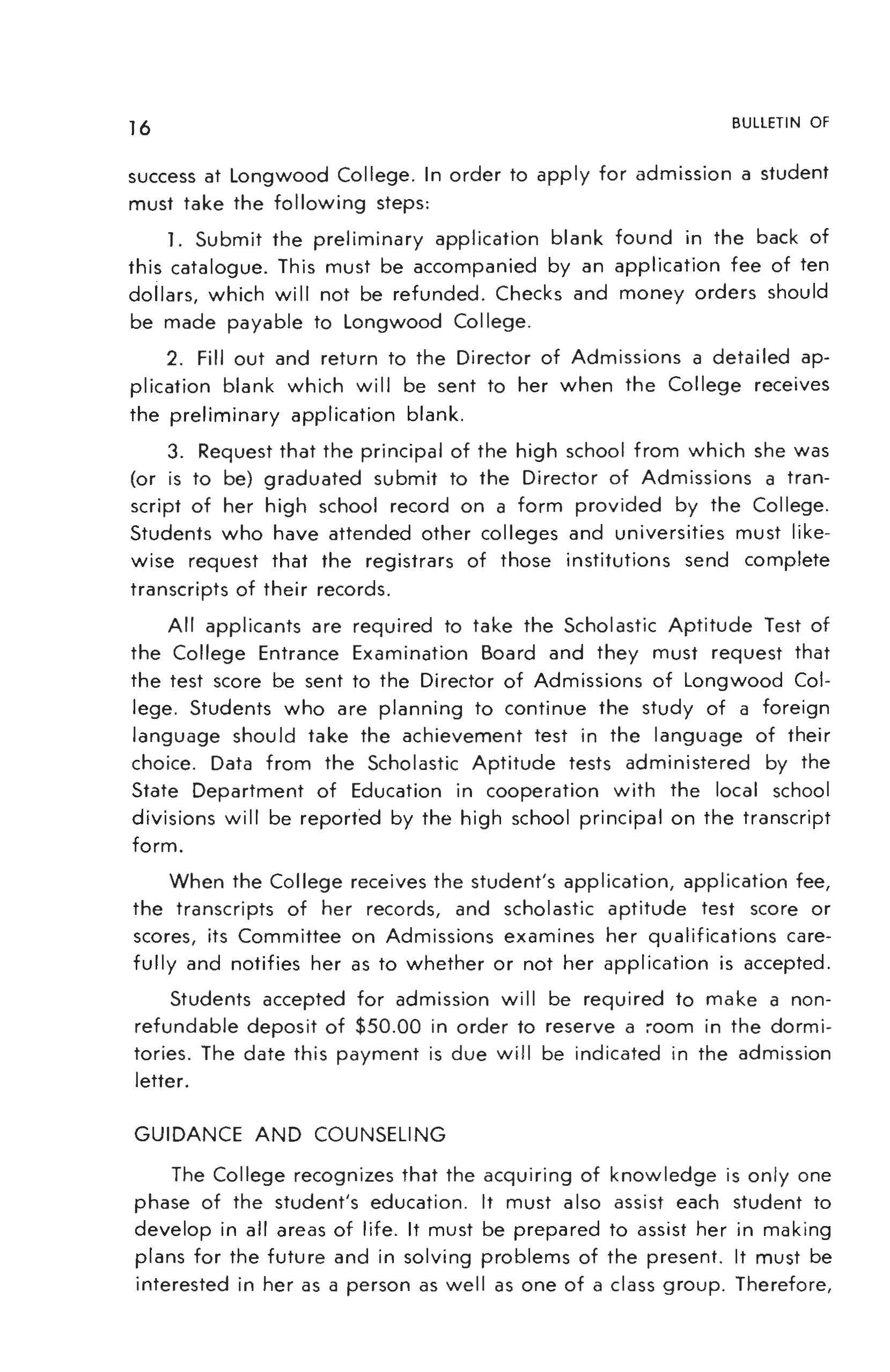
every faculty member has guidance responsibilities involving work with students on an individual basis.
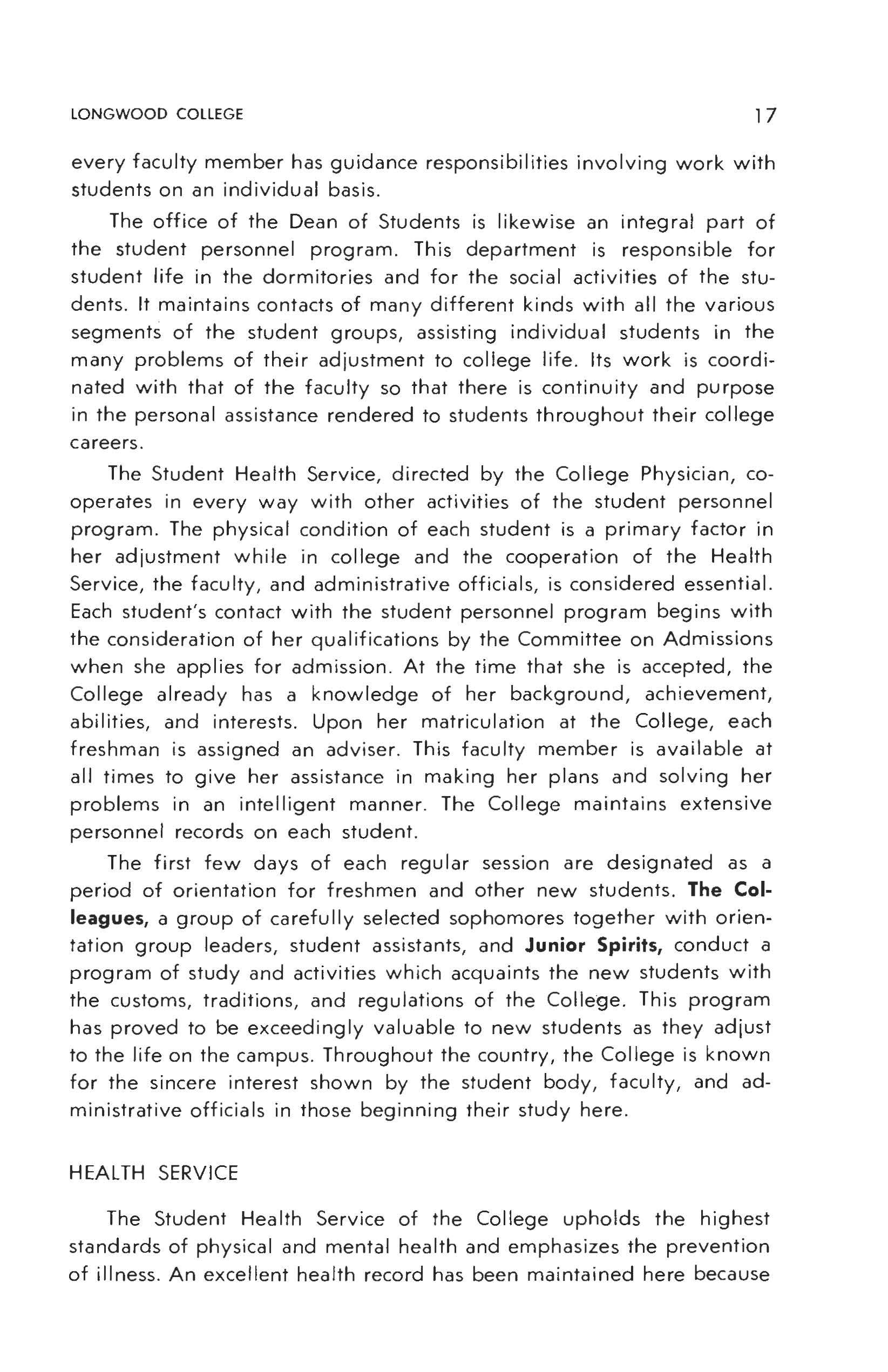
The office of the Dean of Students is likewise an integral part of the student personnel program. This department is responsible for student life in the dormitories and for the social activities of the students. It maintains contacts of many different kinds with all the various segments of the student groups, assisting individual students in the many problems of their adjustment to college life Its work is coordinated with that of the faculty so that there is continuity and purpose in the personal assistance rendered to students throughout their college careers.
The Student Health Service, directed by the College Physician, cooperates in every way with other activities of the student personnel program. The physical condition of each student is a primary factor in her adjustment while in college and the cooperation of the Health Service, the faculty, and administrative officials, is considered essential. Each student's contact with the student personnel program begins with the consideration of her qualifications by the Committee on Admissions when she applies for admission. At the time that she is accepted, the College already has a knowledge of her background, achievement, abilities, and interests. Upon her matriculation at the College, each freshman is assigned an adviser. This faculty member is available at all times to give her assistance in making her plans and solving her problems in an intelligent manner. The College maintains extensive personnel records on each student
The first few days of each regular session are designated as a period of orientation for freshmen and other new students. The Colleagues, a group of carefully selected sophomores together with orientation group leaders, student assistants, and Junior Spirits, conduct a program of study and activities which acquaints the new students with the customs, traditions, and regulations of the College. This program has proved to be exceedingly valuable to new students as they adjust to the life on the campus Throughout the country, the College is known for the sincere interest shown by the student body, faculty, and administrative officials in those beginning their study here.
The Student Health Service of the College upholds the highest standards of physical and mental health and emphasizes the prevention of illness. An excellent health record has been maintained here because
of the close cooperation between the College Physician and other departments that are in a position to ass i st in the promotion of student health.
The Service is staffed by the College Physician who is assisted by five registered nurses The services of a psychiatrist are also available for Longwood College students who desire professional counseling .
Every student must file a Health Record in the Infirmary. This record must include the results of an up-to-date physical examination, signed by the student's physician
Students needing medical attention are treated in the modern, wellequipped infirmary maintained by the College. The infirmary gives twenty-four hours service with a nurse available at all times. The College Physician is available on call at any hour The College does not assume responsibility for any medical attention except that given by the College Physician and by the nurses . Consultants, hospitalization, private nurses, special prescriptions, X-rays, other laboratory work, etc., are at the expense of the student. The College Physician communicates with the parents immediately in case of serious illness .
The Southside Community Hospital is located only a few blocks from the College It is well equipped and is in the charge of a capable staff of physicians and surgeons. The College Physician is a member of the staff.
Longwood College has arranged with a casualty company for the provision of a student accident and sickness insurance plan At the present time, participation in this plan is voluntary, and the premium must be paid by the student . The College furnishes the casualty company with a roster of the students who will enter Longwood College each September enabling the company to furnish each parent with a brochure explaining the benefits of the plan and the cost
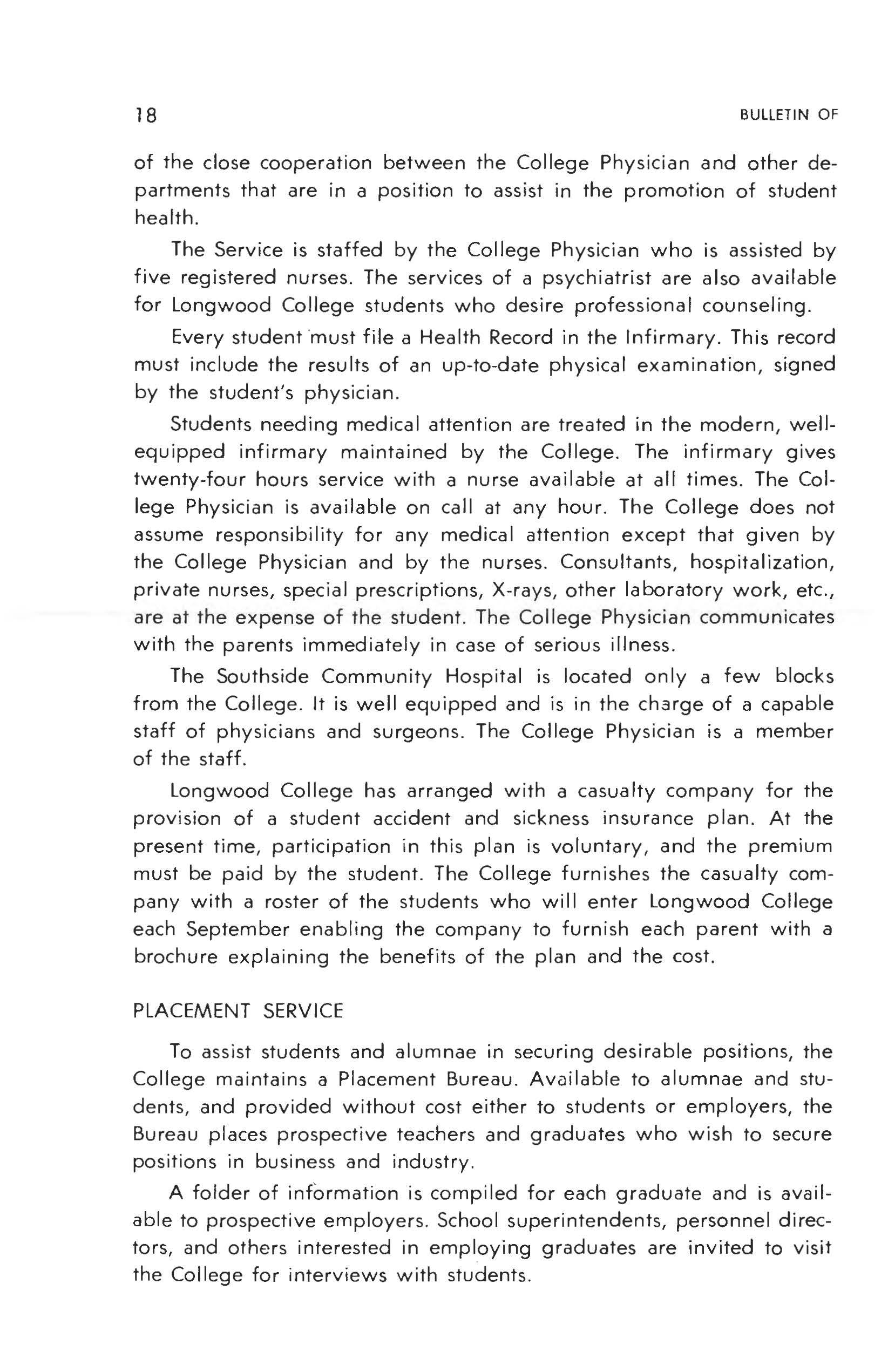
To assist students and alumnae in securing desirable pos1t1ons, the College maintains a Placement Bureau. Available to alumnae and students, and provided without cost either to students or employers, the Bureau places prospective teachers and graduates who wish to secure positions in business and industry.
A folder of information is compiled for each graduate and is available to prospective employers School superintendents, personnel directors, and others interested in employing graduates are invited to visit the College for interviews with students
The faculty and administrative officials of the College believe that their ultimate responsibility is to assist students to be well adjusted, useful citizens in the state and nation. Therefore, attention is given to all aspects of student life on the campus.
The College's activities relating to physical life are outlined in the preceding chapter of the catalogue. Summarized below are other aspects of college life which receive careful attention.
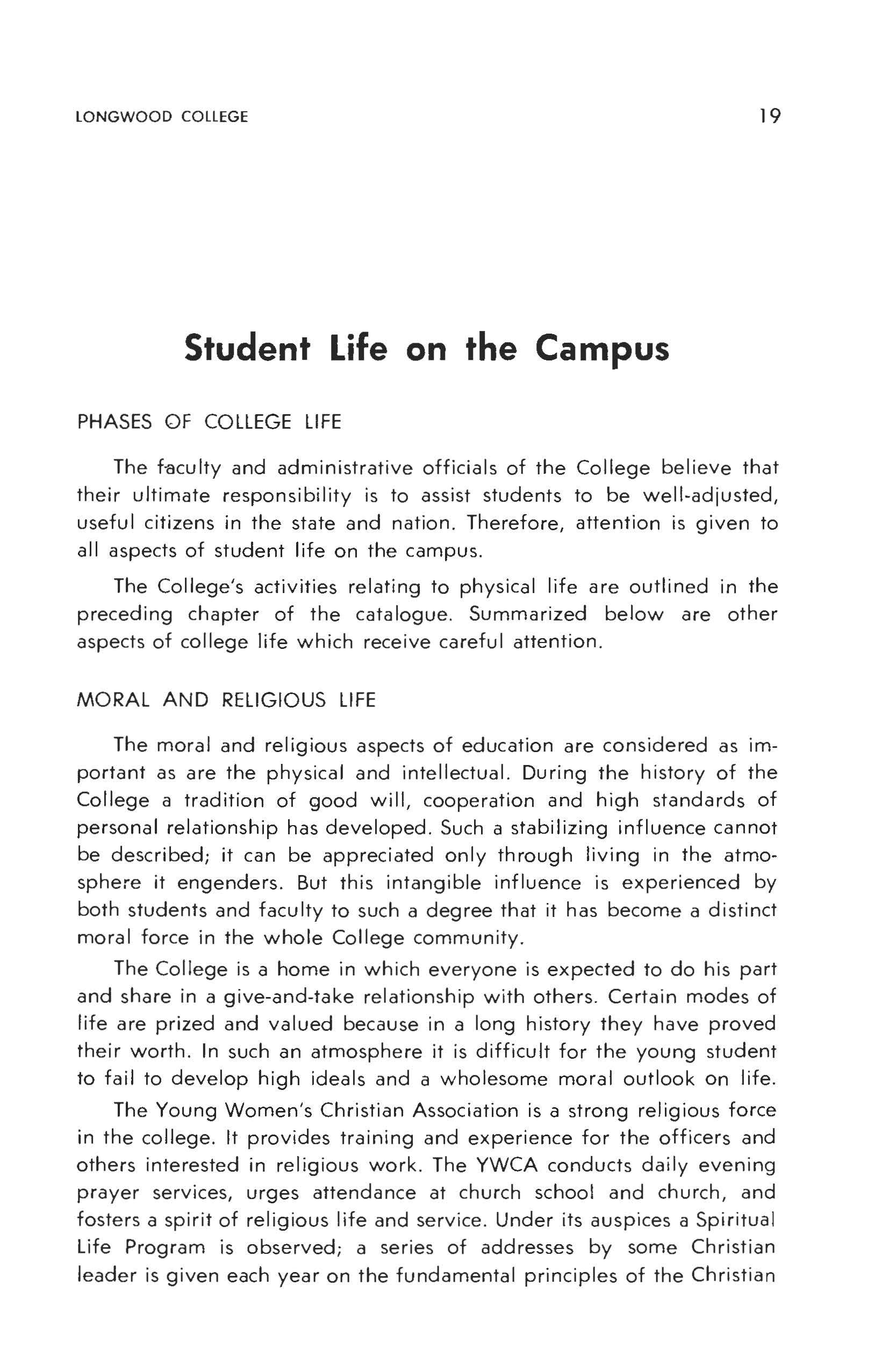
The moral and religious aspects of education are considered as important as are the physical and intellectual. During the history of the College a tradition of good will, cooperation and high standards of personal relationship has developed. Such a stabilizing influence cannot be described; it can be appreciated only through living in the atmosphere it engenders. But this intangible influence is experienced by both students and faculty to such a degree that it has become a distinct moral force in the whole College community.
The College is a home in which everyone is expected to do his part and share in a give-and-take relationship with others Certain modes of life are prized and valued because in a long history they have proved their worth In such an atmosphere it is difficult for the young student to fail to develop high ideals and a wholesome moral outlook on life.
The Young Women's Christian Association is a strong religious force in the college. It provides training and experience for the officers and others interested in religious work The YWCA conducts daily evening prayer services, urges attendance at church school and church , and fosters a spirit of religious life and service Under its auspices a Spiritual Life Program is observed; a series of addresses by some Christian leader is given each year on the fundamental principles of the Christian
religion, and noted speakers representing the international point of view address the students on important current movements.
Students are also encouraged to participate in the religious life of the community. They receive a cordial welcome from the ministers of the town to participate in their church life, which includes regular Sunday services, prayer meetings, Sunday School classes, and social gatherings. Special leaders, working with students through the medium of student organizations, are provided by some of the churches.
Farmville churches include the Baptist, Episcopal, Lutheran, Methodist, Presbyterian, Roman Catholic, Wesleyan Methodist, and Church of God. Where there is no organized church leadership, as in the case of the Christian Scientists, students of the respective faiths usually have contact with local residents having similar church affiliations.
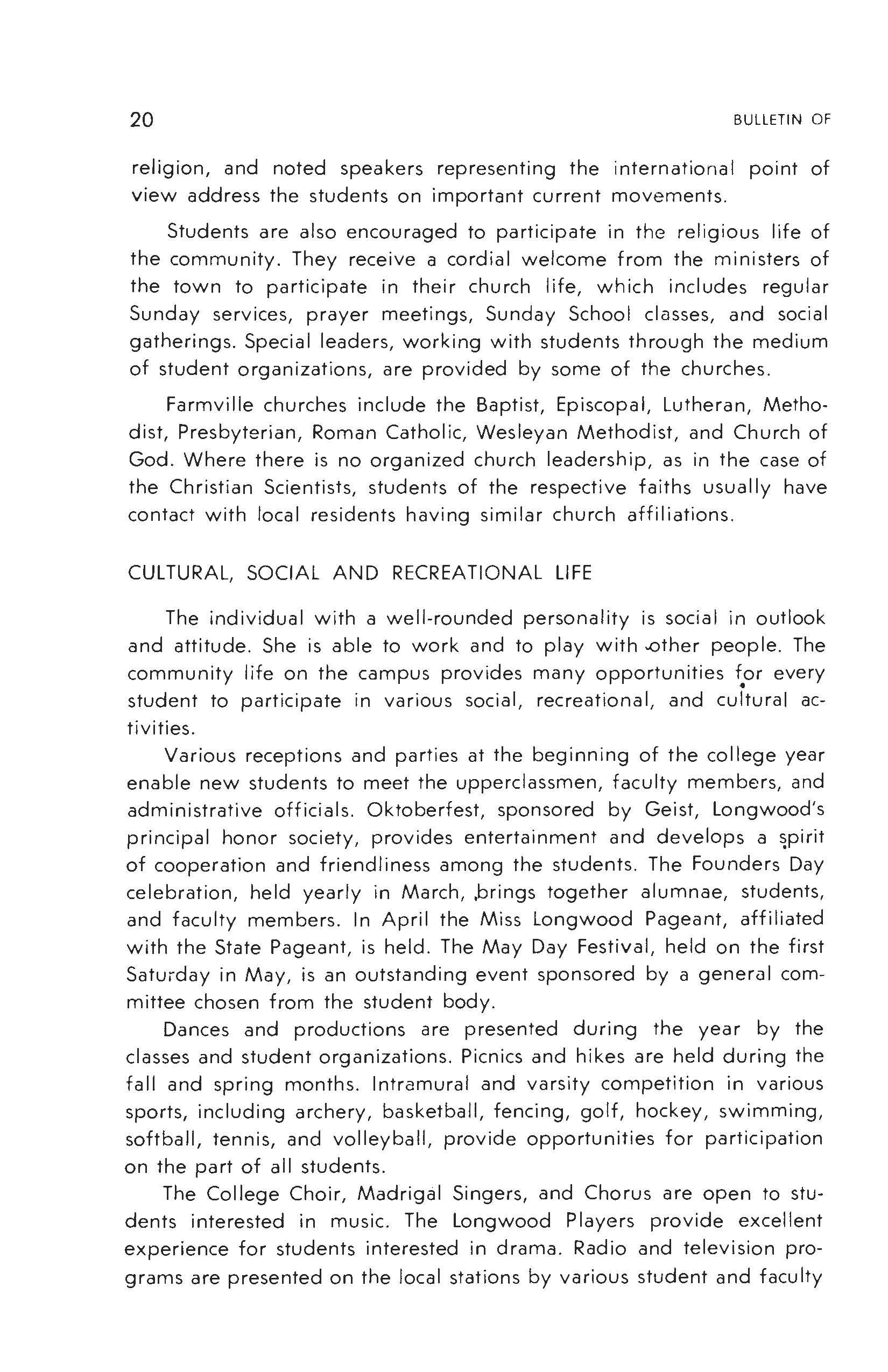
The individual with a well-rounded personality is social in outlook and attitude. She is able to work and to play with -0ther people. The community life on the campus provides many opportunities f.or every student to participate in various social, recreational, and cultural activities.
Various receptions and parties at the beginning of the college year enable new students to meet the upperclassmen, faculty members, and administrative officials. Oktoberfest, sponsored by Geist, Longwood's principal honor society, provides entertainment and develops a ~pirit of cooperation and friendliness among the students. The Founders Day celebration, held yearly in March, ,brings together alumnae, students, and faculty members. In April the Miss Longwood Pageant, affiliated with the State Pageant, is held. The May Day Festival, held on the first Saturday in May, is an outstanding event sponsored by a generul committee chosen from the student body.
Dances and productions are presented during the year by the classes and student organizations. Picnics and hikes are held during the fall and spring months. Intramural and varsity competition in various sports, including archery, basketball, fencing, golf, hockey, swimming, softball, tennis, and volleyball, provide opportunities for participation on the part of all students.
The College Choir, Madrigal Singers, and Chorus are open to students interested in music. The Longwood Players provide excellent experience for students interested in drama. Radio and television programs are presented on the local stations by various student and faculty
groups. The College newspaper, literary magazine, and yearbook are prepared and edited by students interested in writing and editorial work.
Occasional assembly programs, distinguished speakers and other programs of interest are presented. Artist series, outstanding lecturers, and various artists of the entertainment world are scheduled at intervals during the year.
Among the outstanding programs and personalities presented on the Longwood campus during the 1969-70 session were the following: a duo recital by Judith Anthony and Thomas Jamerson of the New York Opera; The Alvin Ailey American Dance Theatre; Cologne Chamber Orchestra; performances by the Longwood Players of John Potter's "The Moths," Elmer Rice's "The Adding Machine," William Inge's "Picnic," and Luigi Pirandello's "Six Characters in Search of an Author." Also appearing on the campus were nine speakers sponsored by the Visiting Scholar Program: Trevor Evans, Walter Sorell, H. W . Janson, Samuel M. Nabrit, Bernard Knox, Robert Scranton, Irving Howe, Henry C. Hatfield, and Giles Constable . The Institute of Southern Culture sponsored lectures by Lewis M . Hammond, Rosamond K. Sprague, and Helen Barnes Savage. The Barter Theater of Virginia presented John Patrick's "The Hasty Heart."
The Institute of Southern Culture was established at Longwood College in 1956 to promote the study of the South through academic course work, special lectures, and through the publication of research in the field. The Institute is currently sponsoring a series of lecturl:!s throughout the year by visiting scholars and members of the faculty. Course work in several departments ,of the College also provides a means for exchange of ideas about various aspects of Southern life. Financial support for the Institute is provided by the Longwood College Alumnae Association.
The academic and professional life of the College constitutes the main emphasis to which all other activities are secondary and contributory. It centers around the courses of instruction offered in the various departments of the College . Some courses are primarily cultural, liberal, and broadening in outlook . Others are primarily professional and are designed specifically to prepare students for teaching in elementary and
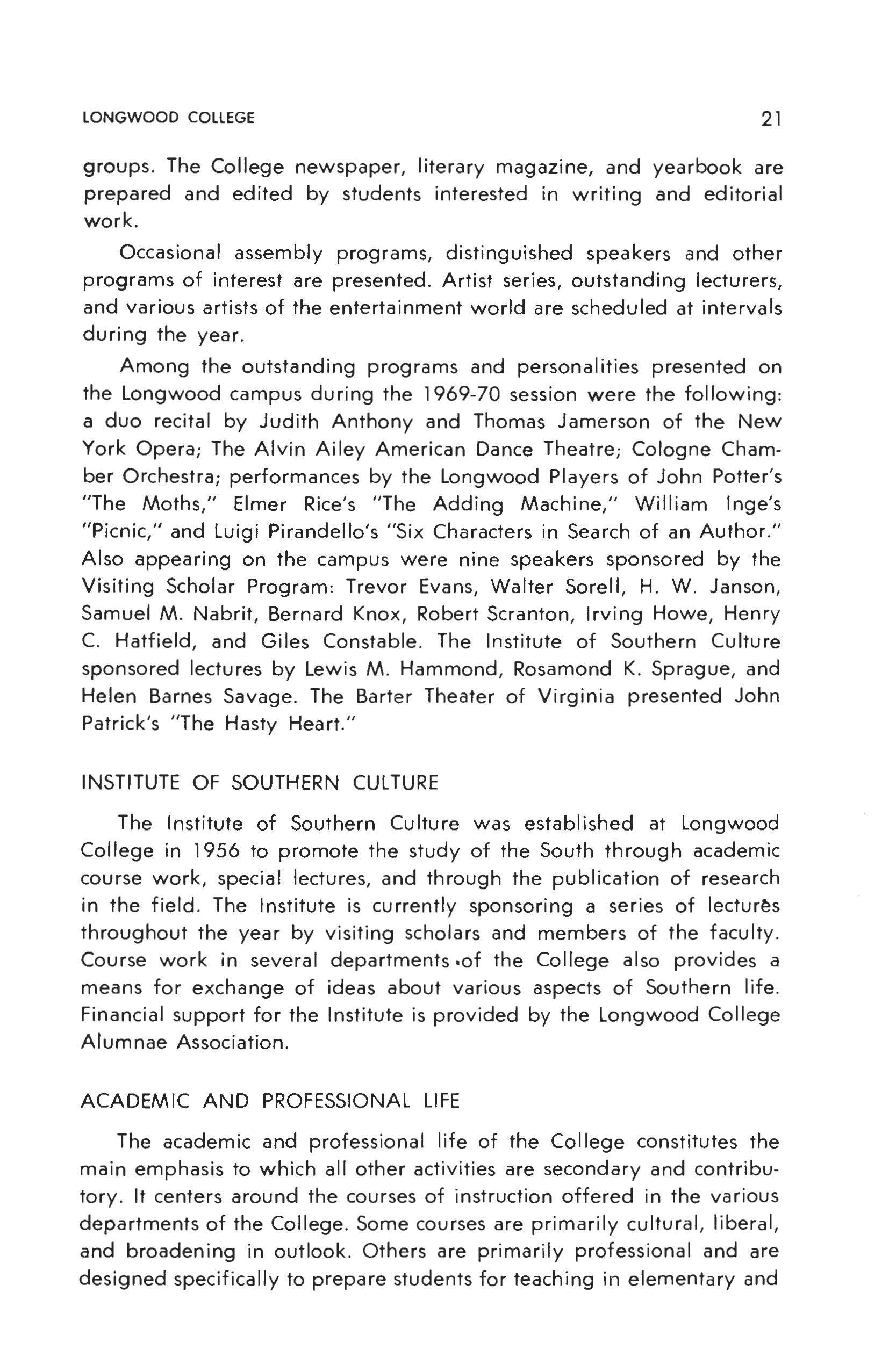
secondary schools or for other vocations. In still others academic scholarship and the professional spirit are very closely combined. The major part of this catalogue is concerned with the factual details of the various curricula of the College.
Students are expected to conduct themselves with propriety while on the campus, in the community, and at other colleges They must keep in mind at all times that they are representatives of the College and that their conduct brings credit or discredit to the College as well as to themselves. Any questionable conduct will be dealt with by the Student Government.
Seniors and out-of-state juniors may have cars on campus, but other boarding students are not permitted to keep cars at the College or in Farmville during the college session without specific authorization from the committee on student cars.
Complete information regarding all social regulations is given in the Student Handbook which is sent to every new student at the end of the summer preceding the opening of the new session.
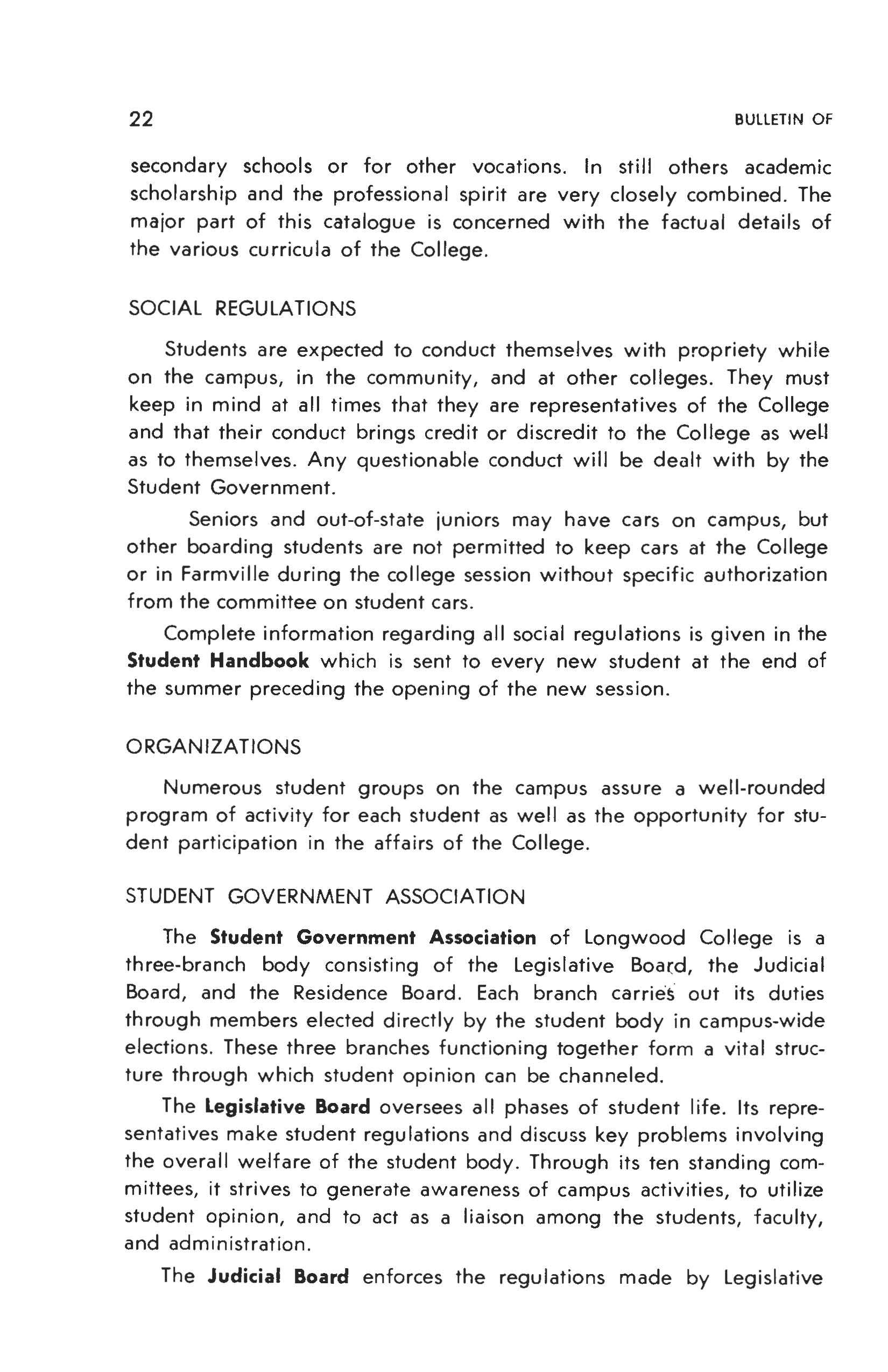
Numerous student groups on the campus assure a well-rounded program of activity for each student as well as the opportunity for student participation in the affairs of the College.
The Student Government Association of Longwood College is a three-branch body consisting of the Legislative Boacd, the Judicial Board, and the Residence Board Each branch carries out its duties through members elected directly by the student body in campus-wide elections These three branches functioning together form a vital structure through which student opinion can be channeled.
The Legislative Board oversees all phases of student I ife Its representatives make student regulations and discuss key problems involving the overall welfare of the student body. Through its ten standing committees, it strives to generate awareness of campus activities, to utilize student opinion, and to act as a liaison among the students, faculty, and administration.
The Judicial Board enforces the regulations made by Legislative
Board and strives to instill the meaning of the Honor Code in the minds of the students of Longwood College. Its members work with the students both openly and confidentially in their concern for the individual and her welfare.
The Residence Board strives to stimulate within the student body refinement in dress and conduct and to promote and enforce favorable study conditions on the campus. The work of the Residence Board is done by the Officers and by the Dormitory Presidents elected from each dormitory. Dormitory Councils in each dormitory function under and work with the Residence Board. The purpose of Residence Board is to make and enforce the dormitory, dining hall, and fire regulations.
The underlying principles of conduct and relationship of the students, faculty members and administrative officials are embodied in the Honor System, a cherished tradition of the College. The way of life on the campus is based on the Honor Code.
The Honor Code serves as a practical example of a truly democratic form of student life and self-government. Students make the rules and violators are tried by a jury of their peers. Because they appreciate the importance and convenience of their agreement to trust one another, they also recognize the need to control the few among them who are either unable or unwilling to accept the responsibilities of their mutual trust. A dishonorable act is a betrayal of the whole student body and is regarded as such. It is an Honor Code offense to lie, to cheat, or to steal in any and all academic and property matters. Lying before the Judicial Board or Residence Board or member thereof in any manner during an investigation or trial is an Honor Code offense. Falsification of records with the intent to give untrue information is also a breach of the Honor Code.
The YWCA in the College is a branch of the national YWCA. The administrative direction is in the hands of the students, assisted by an adviser. It promotes a number of religious activities. Leaders are brought to the campus by the Association to discuss with students questions of religious interest and to help individuals with personal religious problems. The organization through its committees welcomes new students individually. It likewise provides informal entertainment for other groups of students from time to time during the year.
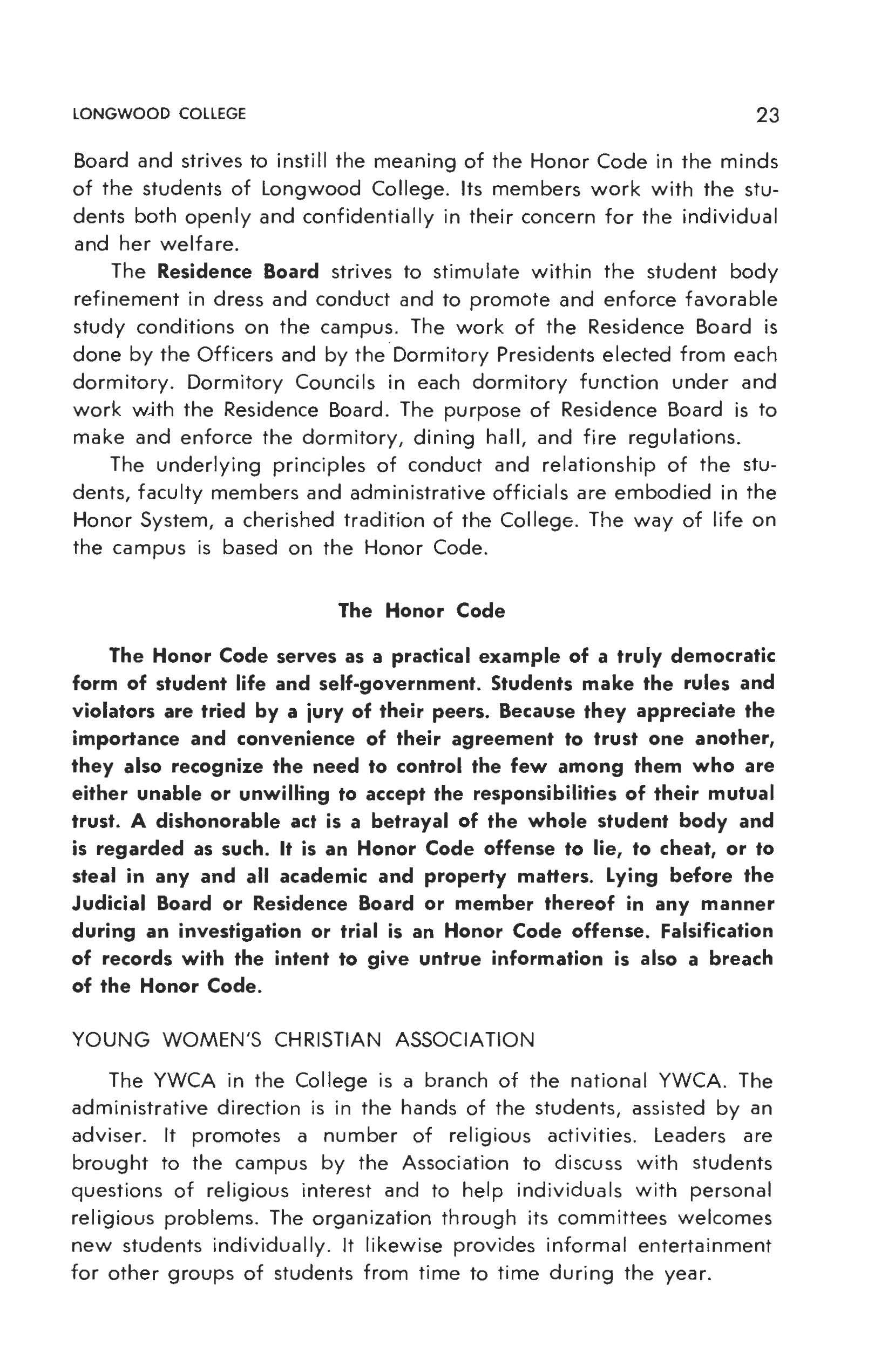
All students have the opportunity to participate in the varied program of the Athletic Association. Every dormitory and sorority has a team which competes in field hockey, volleyball, basketball, and softball, with a trophy given to the winning team Individual sports such as tennis, badminton, ping pong, pool, bowling and archery are open to anyone who wishes to compete on the intramural level.
After the intramural competition, teams compete for class championships with points toward the class cup. Immediately following class competition, sister classes play each other for the color cup.
For the students who wish to participate on a higher level, the Athletic Association supports the following intercollegiate teams: field hockey, swimming, basketball, gymnastics, fencing, tennis, archery, lacrosse, and golf.
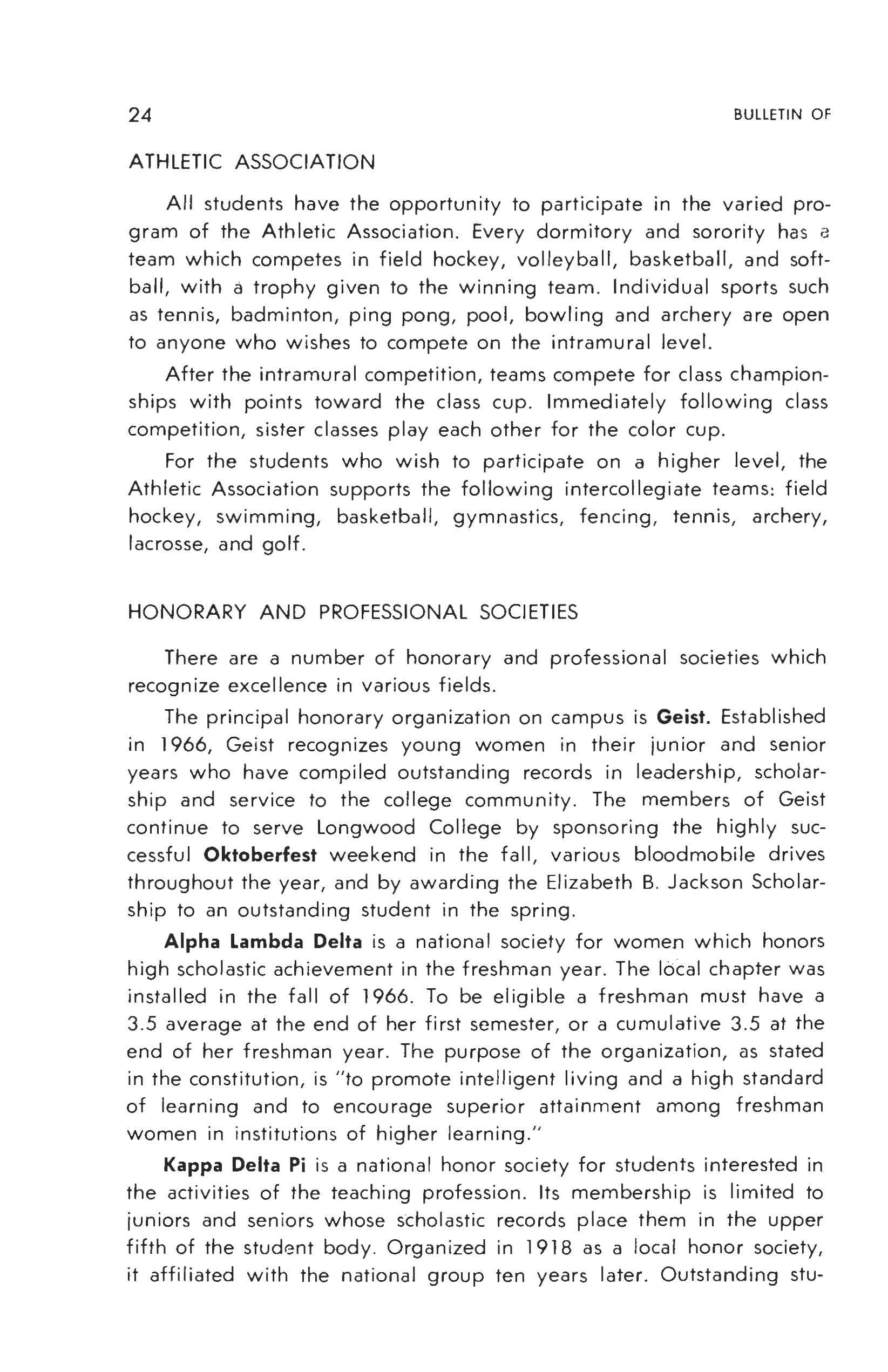
There are a number of honorary and professional societies which recognize excellence in various fields.
The principal honorary organization on campus is Geist. Established in 1966, Geist recognizes young women in their junior and senior years who have compiled outstanding records in leadership, scholarship and service to the college community. The members of Geist continue to serve Longwood College by sponsoring the highly successful Oktoberfest weekend in the fall, various bloodmobile drives throughout the year, and by awarding the Elizabeth B. Jackson Scholarship to an outstanding student in the spring.
Alpha Lambda Delta is a national society for women which honors high scholastic achievement in the freshman year. The local chapter was installed in the fall of 1966. To be eligible a freshman must have a 3.5 average at the end of her first semester, or a cumulative 3 5 at the end of her freshman year. The purpose of the organization, as stated in the constitution, is "to promote intelligent living and a high standard of learning and to encourage superior attainment among freshman women in institutions of higher learning."
Kappa Delta Pi is a national honor society for students interested in the activities of the teaching profession. Its membership is limited to juniors and seniors whose scholastic records place them in the upper fifth of the student body. Organized in 1918 as a local honor society, it affiliated with the national group ten years later. Outstanding stu-
dents in languages are invited to join Lambda Iota Tau, an international literature society; and students with good records in history and social sciences are admitted to Pi Gamma Mu, a national honorary social science society. Alpha Psi Omega, a national dramatics organization, recognizes outstanding dramatic achievement. Editors, business managers, and others in key positions on the student publications, are eligible for membership in Pi Delta Epsilon, a national honorary journalism fraternity. The local chapter was organized in 1950 Pi Omega Pi, the national Business Education fraternity, is a member of the Association of College Honor Societies. fl1 e membership is limited to business majors in teacher education Sigma Alpha Iota is a national professional music fraternity for women Lychnos Society is a local honorar y organizcltion in science and mathematics. Delta Psi Kappa, ,, national professional physical education fraternity for women, re '·')•".) nizes and encourages scholastic achievement and professional ethics Kappa Omicron Phi, an honor society in home economics, was org 2; ized in 1960 . Honors Coum:il , composed of representatives from the twelve academic honor societies, seeks to further the academic atmo sphere of the campus, provide an incentive for academic achievement, recognize those students who have achieved academic excellence, and coordinate the activities of the honor societies. The Council is composed of the president and a junior representative from each of the societies.
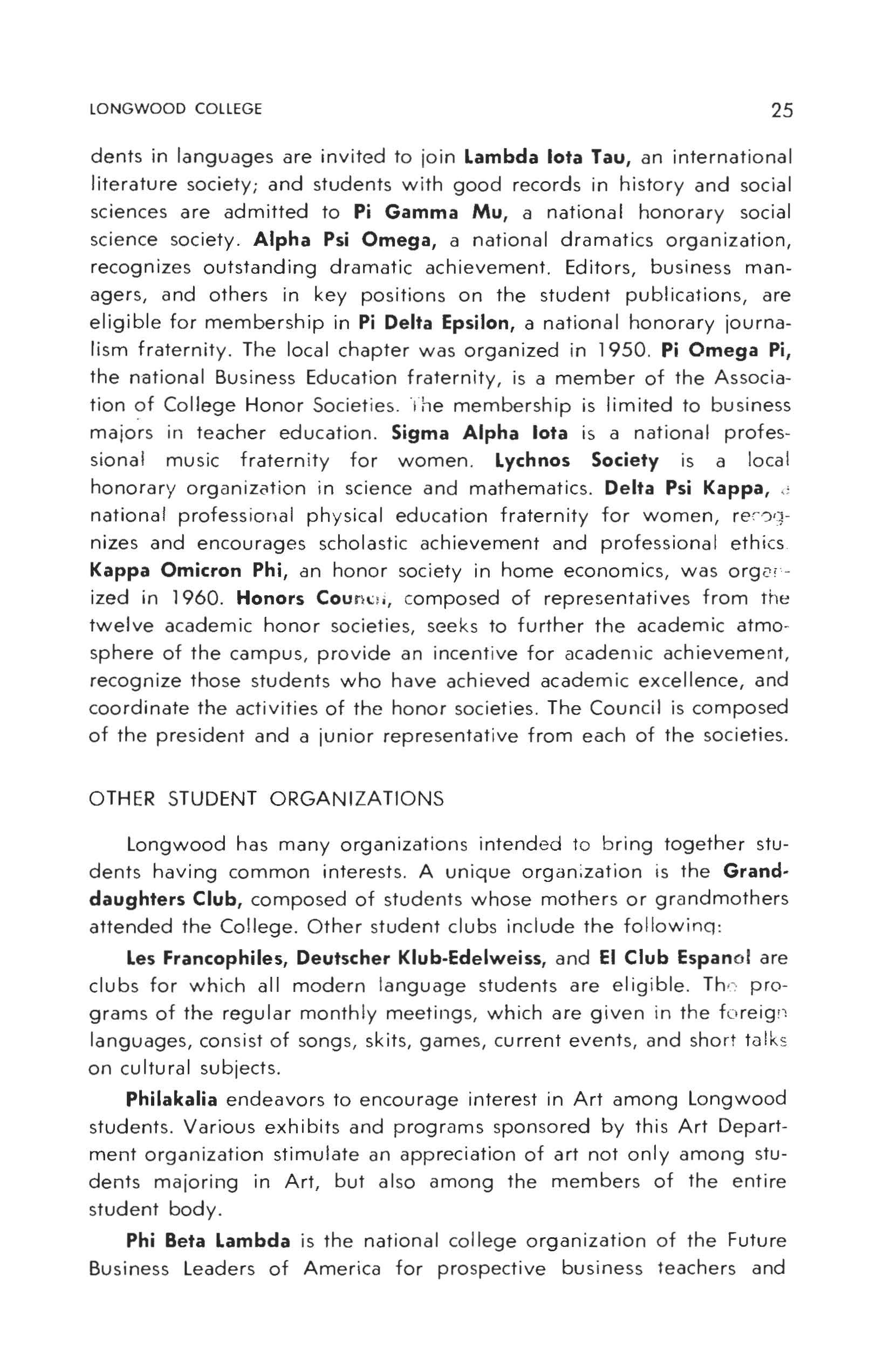
Longwood has many organizations intended to bring together students having common interests A unique organization is the Granddaughters Club, composed of students whose mothers or grandmothers attended the College. Other student clubs include the followinq:
Les Francophiles, Deutscher Klub-Edelweiss, and El Club Espanol are clubs for which all modern language students are eligible Th ,, programs of the regular monthly meetings, which are given i n the fo reig !, languages, consist of songs, skits, games, current events, and short talk s on cultural subjects
Philakalia endeavors to encourage interest in Art among Longwood students. Various exhibits and programs sponsored by this Art Department organization stimulate an appreciation of art not only among students majoring in Art, but also among the members of the entire student body.
Phi Beta Lambda is the national college organization of the Future Business Leaders of America for prospective business teachers and
leaders in the field. Participation in this organization is of great help to Longwood students who will teach business subjects and serve as advisers to this or to similar types of co-curricular activities.
The Home Economics Club strives to develop a better understanding of home economics and its contribution to personal and family living. Membership is open to all students enrolled in the home economics major. The club is affiliated with the state Home Economics Association.
Church groups for College students are represented by the follow-
ing:
Baptist Student Union (Baptist)
The Canterbury Association (Episcopalian)
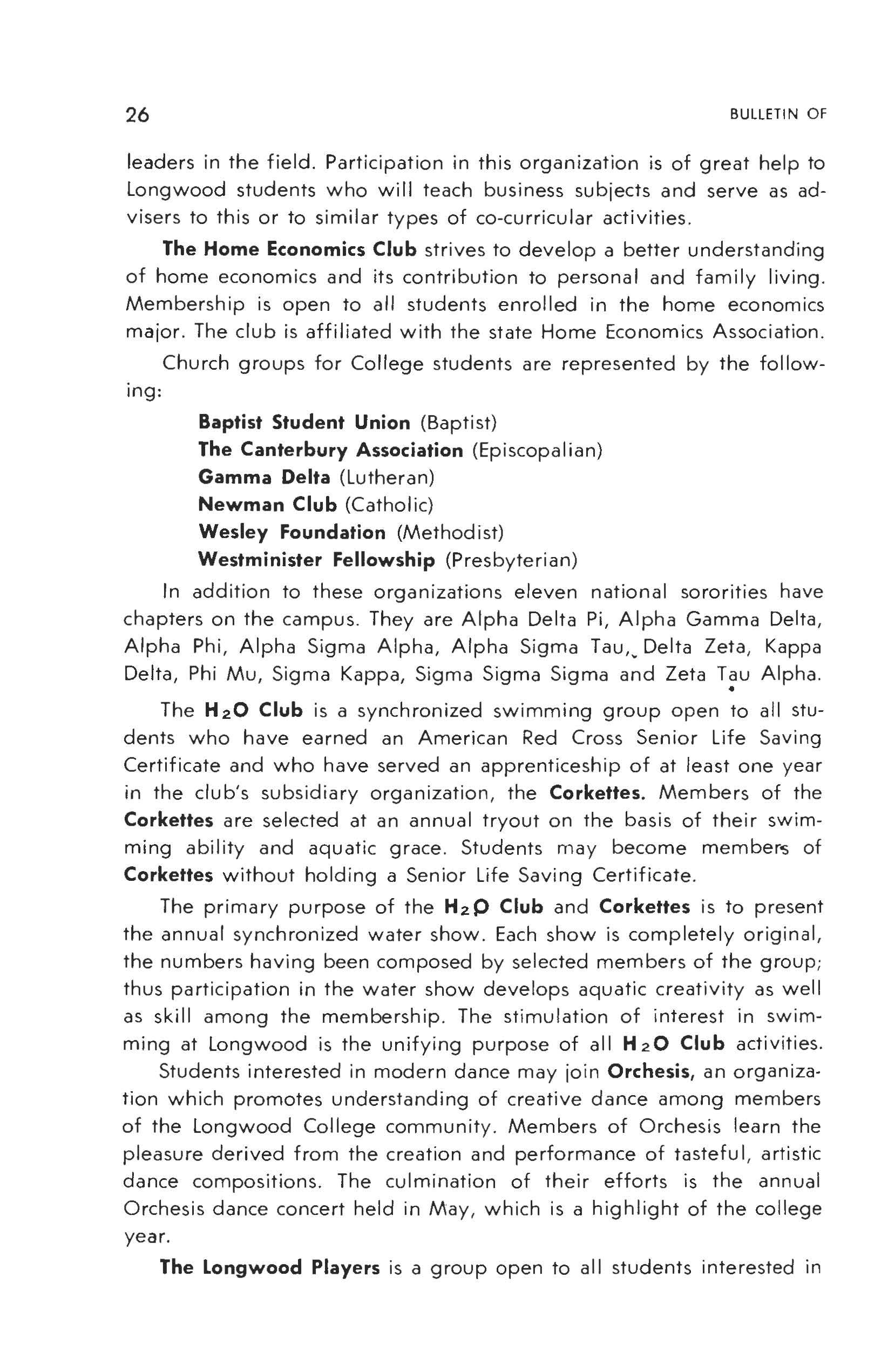
Gamma Delta (Lutheran)
Newman Club (Catholic)
Wesley Foundation (Methodist)
Westminister Fellowship (Presbyterian)
In addition to these organizations eleven national sororities have chapters on the campus. They are Alpha Delta Pi, Alpha Gamma Delta, Alpha Phi, Alpha Sigma Alpha, Alpha Sigma Tau,. Delta Zeta , Kappa Delta, Phi Mu, Sigma Kappa, Sigma Sigma Sigma and Zeta T~u Alpha.
The H20 Club is a synchronized swimming group open to all students who have earned an American Red Cross Senior Life Saving Certificate and who have served an apprenticeship of at least one year in the club's subsidiary organization, the Corkettes. Members of the Corkettes are selected at an annual tryout on the basis of their swimming ability and aquatic grace . Students may become member-.; of Corkettes without holding a Senior Life Saving Certificate .
The primary purpose of the H2P Club and Corkettes is to present the annual synchronized water show. Each show is completely original, the numbers having been composed by selected members of the group; thus participation in the water show develops aquatic creativity as well as skill among the membership . The stimulation of interest in swimming at Longwood is the unifying purpose of al I H 20 Club activities.
Students interested in modern dance may join Orchesis, an organization which promotes understanding of creative dance among members of the Longwood College community Members of Orchesis learn the pleasure derived from the creation and performance of tastefu I, artistic dance compositions. The culmination of their efforts is the annual Orchesis dance concert held in May, which is a highlight of the college year.
The Longwood Players is a group open to all students interested in
drama as a performing art . Any student may register for an apprentice period. At the end of this time the students who have shown an active interest in any phase of the drama will be elected to full membership. Four full-length plays are presented each session. Twice during the school year the Players presents a series of one-act plays and at least one speech assembly is presented to the student body. If the student works with the club's director and the other club members, she will find the Longwood Players an organization worthy of her time and effort The club aims to provide the best in dramatic entertainment for the College students and the people of the community.
Music Educators National Conference is a student branch of the National Professional Organization of Music Educators. It is composed of music educatiqn majors who discuss and attempt to promote professional methods in the teaching field. Other music organizations of the College are the College Choir, Madrigal Singers, and Choral Club. These are important factors in the life of the College. They select their members through tryouts at the beginning of the session and give several concerts each year.
The Student Education Association is a national organization of prospective teachers enrolled in colleges and universities. The J . L. Jarman Chapter was organized at Longwood College in 1939. It is affiliated with the Virginia Education Association and the National Education Association. Its purpose is to foster professional interest in the field of education.
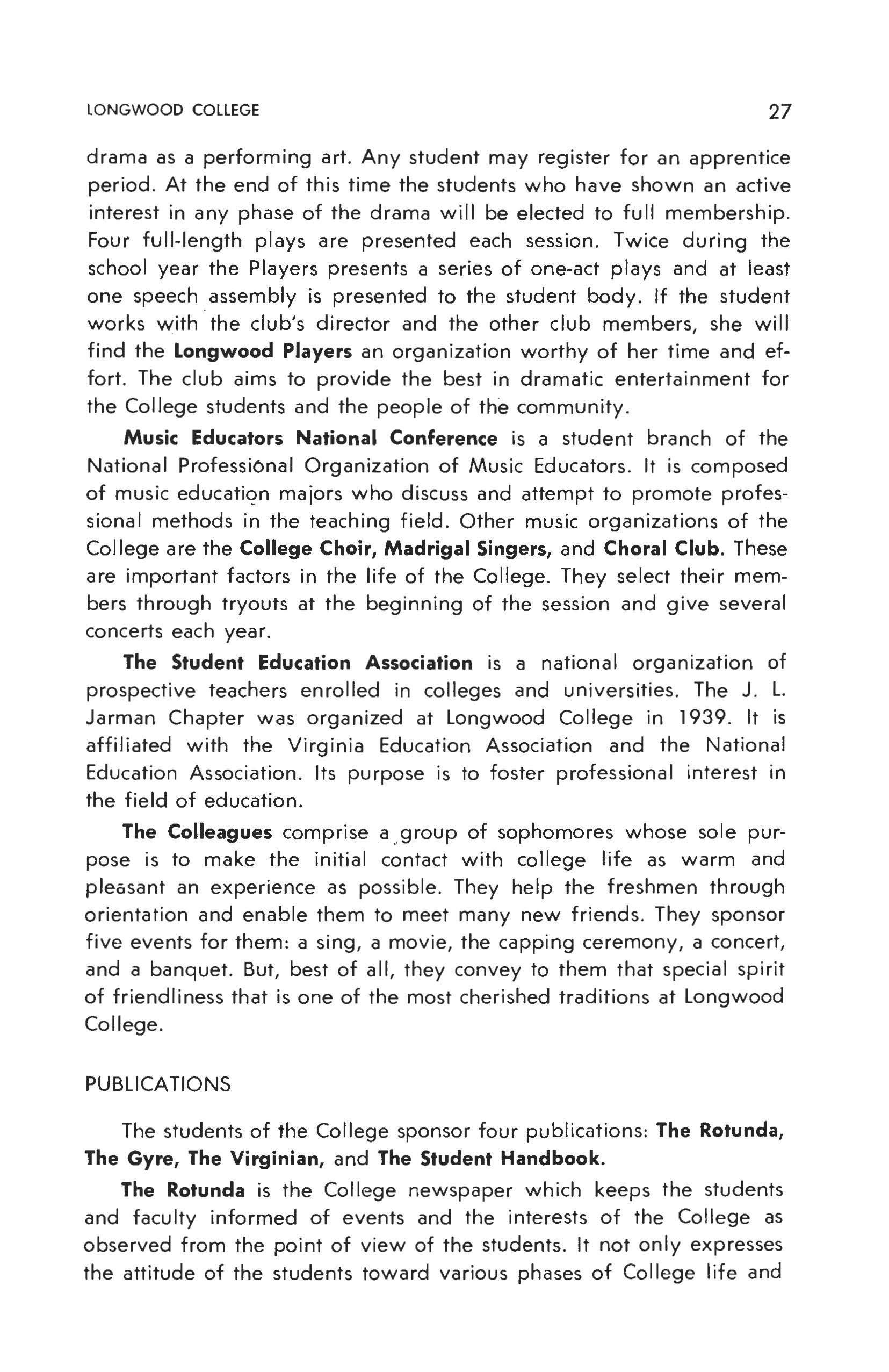
The Colleagues comprise a. group of sophomores whose sole purpose is to make the initial contact with college life as warm and pleasant an experience as possible They help the freshmen through orientation and enable them to meet many new friends. They sponsor five events for them: a sing, a movie, the capping ceremony, a concert, and a banquet. But, best of all, they convey to them that special spirit of friendliness that is one of the most cherished traditions at Longwood College.
The students of the College sponsor four publications: The Rotunda, The Gyre, The Virginian, and The Student Handbook.
The Rotunda is the College newspaper which keeps the students and faculty informed of events and the interests of the College as observed from the point of view of the students. It not only expresses the attitude of the students toward various phases of College life and
current activities, but also exerts an important influence in the development of the ideals of the College community
The Gyre is a literary magazine to which students contribute essays, poetry, short stories, and other writings, as well as art work . It sponsors contests, from time to t ime, to stimulate literary effort .
The Virginian is the yearbook of the College. Students are respons ible for the art work, the editing, and the management of the publication . Each issue represents a cross section of College life for the year . It is, therefore, highly valued by the members of the graduating class .
The Student Handbook is the manual of rules and regulations governing the conduct of the students. In addition , it contains the constitutions and by-laws of the Student Government Association, the Young Women's Christian Association, and the Athletic Association, shorter descriptions of other organizations, and a description of the customs and traditions of the College It serves as the orientation textbook for all new students

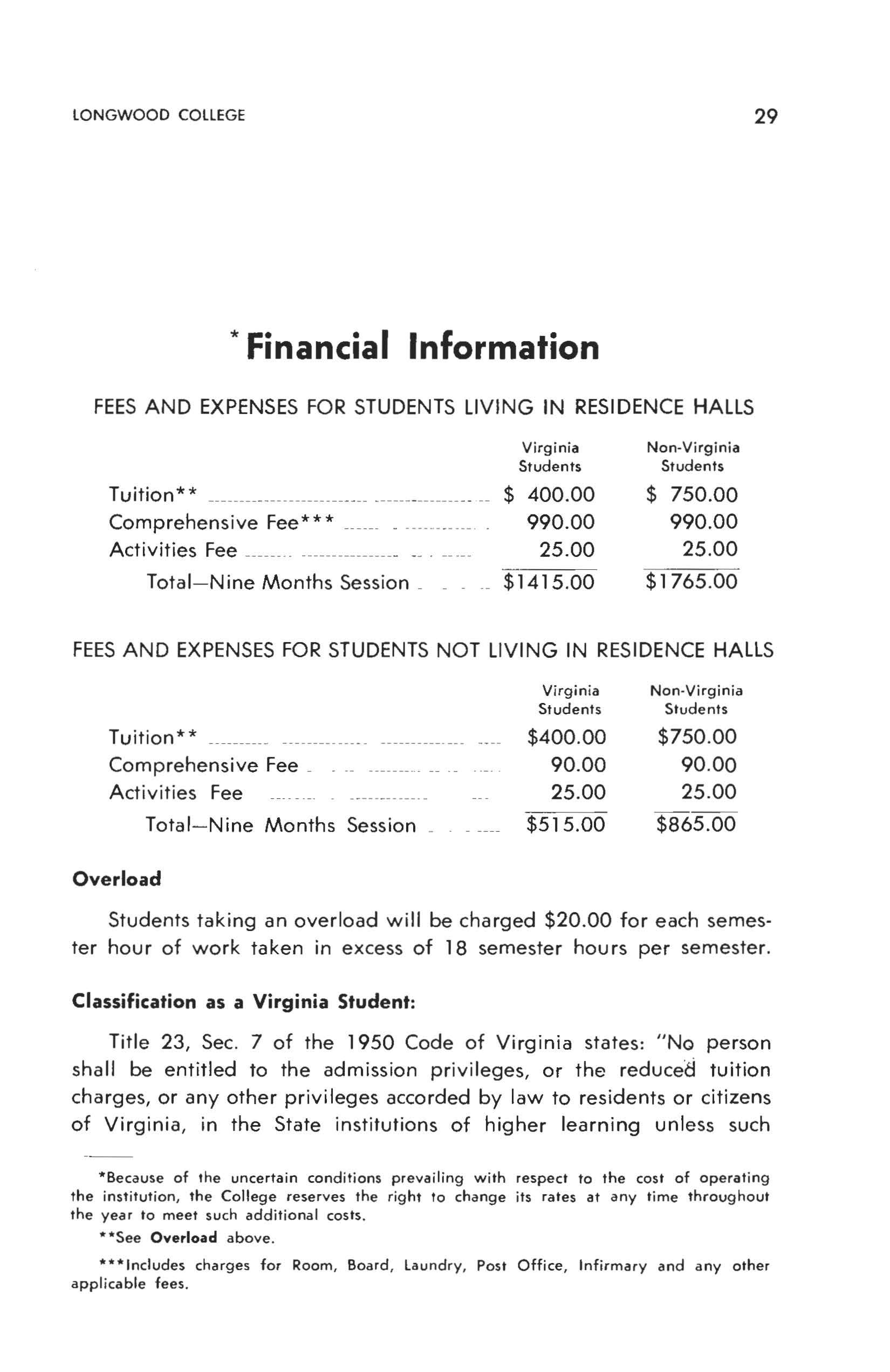
Tuition** __ Comprehensive Fee*** _____ _ Activities Fee _______ _
Total-Nine Months Session _ _ _
Virginia Students $ 400.00 990.00 25.00 $1415.00
Non-Virginia Students $ 750.00 990.00 25.00 $1765 00
Virginia Non-Virginia Students Students
Tuition** ___ _________ ____ _ ___________ ___ ___ _ $400.00 $750 00 Comprehensive Fee _ __ __________ _ 90.00 90.00 Activities Fee 25.00 25.00
Total-Nine Months Session _ ____ _ $515.00 $865.00
Overload
Students taking an overload will be charged $20.00 for each semester hour of work taken in excess of 18 semester hours per semester.
Classification as a Virginia Student:
Title 23, Sec 7 of the 1950 Code of Virginia states : "No person shall be entitled to the admission privileges, or the reduced tuition charges, or any other privileges accorded by law to residents or citizens of Virginia, in the State institutions of higher learning unless such
*Because of the uncertain conditions prevailing with respect to the cost of operating the institution, the College reserves the right to change its rates at any lime throughout the year to meet such additional costs.
**See Overload above_
***Includes charges for Room , Board, Laundry, Post Office, Infirmary and any other applicable fees.
person has been a bona fide citizen or resident of Virginia for a period of at least one year prior to admission to said institution, provided that the governing boards of such institutions may require longer periods of residence and may set up additional requirements for admitting students."
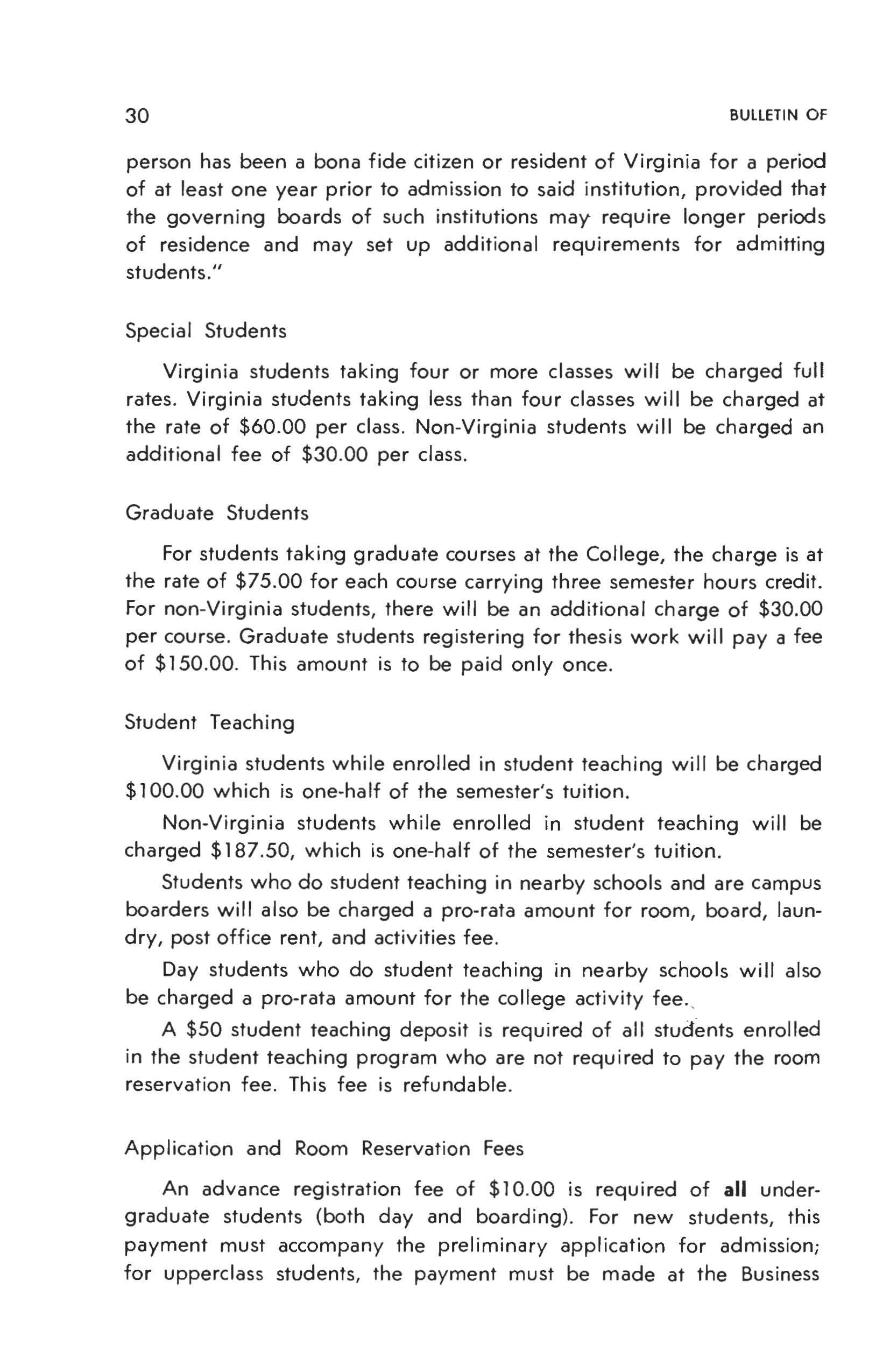
Virginia students taking four or more classes will be charged full rates. Virginia students taking less than four classes will be charged at the rate of $60.00 per class. Non-Virginia students will be charged an additional fee of $30.00 per class .
For students taking graduate courses at the College, the charge is at the rate of $75.00 for each course carrying three semester hours credit. For non-Virginia students, there will be an additional charge of $30 00 per course. Graduate students registering for thesis work will pay a fee of $150.00. This amount is to be paid only once.
Virginia students while enrolled in student teaching will be charged $100.00 which is one-half of the semester's tuition
Non-Virginia students while enrolled in student teaching will be charged $187.50, which is one-half of the semester's tuition.
Students who do student teaching in nearby schools and are campus boarders will also be charged a pro-rata amount for room, board, laundry, post office rent, and activities fee
Day students who do student teaching in nearby schools will also be charged a pro-rata amount for the college activity fee. ,
A $50 student teaching deposit is required of all students enrolled in the student teaching program who are not required to pay the room reservation fee. This fee is refundable.
An advance registration fee of $10.00 is required of all undergraduate students (both day and boarding) . For new students, this payment must accompany the preliminary application for admission; for upperclass students, the payment must be made at the Business
Office before April 15 by those planning to return to College during the following session. This fee is not refundable. For former students, an additional advance payment of $50.00 will be required in order to hold the room reservation, which payment must be made by April 15. New students are required to pay the room reservation fee of $50.00. The date this payment is due will be indicated in the admission letter. The room reservation fee will be credited to the student's account when registration is completed in September. This payment of $50.00 is not refunded except for personal illness certified by a physician or with the approval of the President for unavoidable emergency or for students who do not have the required quality point rating by the end of the session.
All changes made by students in class schedules after registration must be approved by the student's faculty adviser and by the Registrar.
Any course change requested by a student after registration, whether it be an addition, a section change, or a drop, will require the payment of a course change fee of $5.00 plus $2.00 per change.
Exceptions to the above course change fee are as follows:
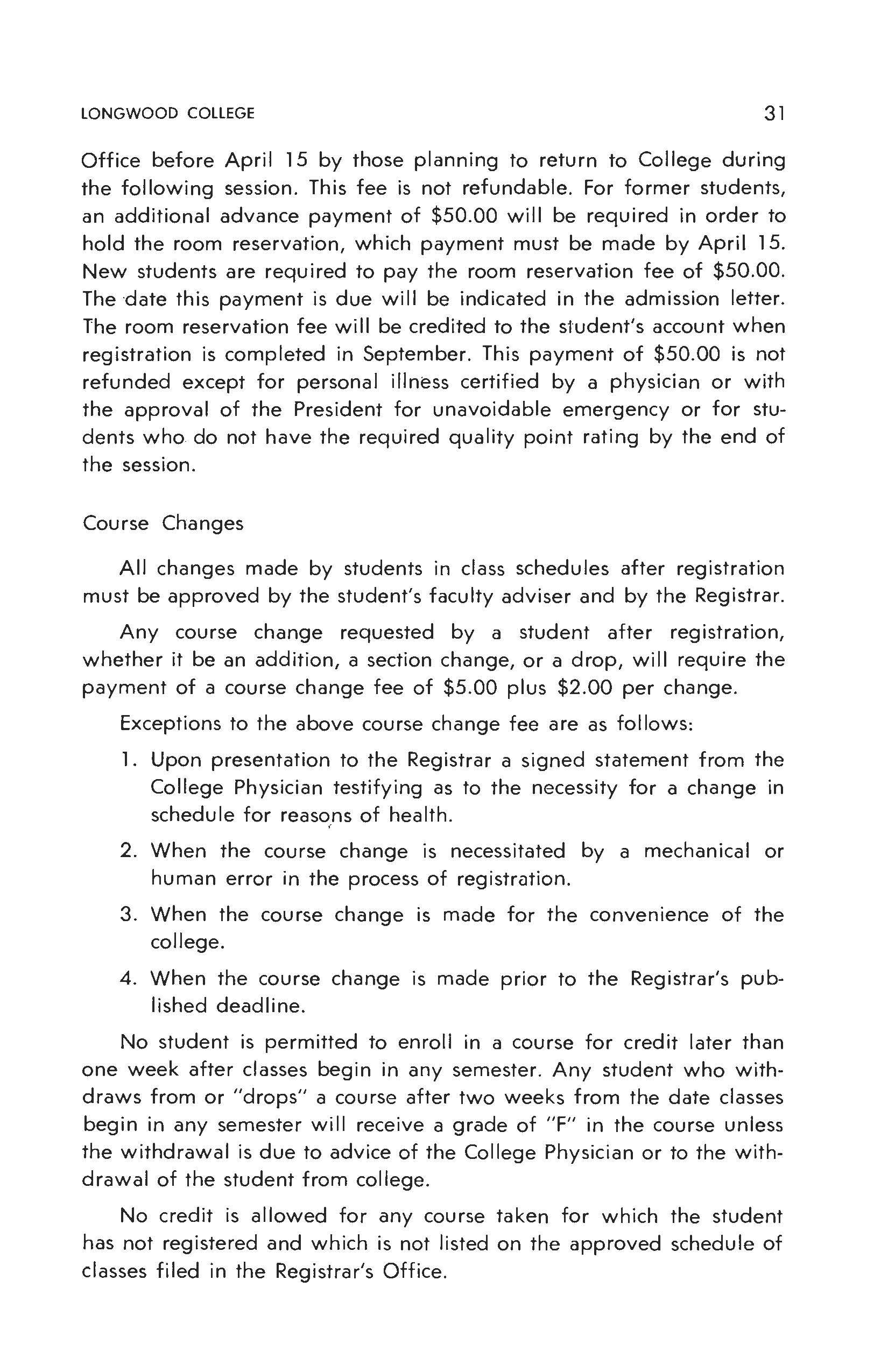
l. Upon presentation to the Registrar a signed statement from the College Physician testifying as to the necessity for a change in schedule for reas~ns of health.
2. When the course change is necessitated by a mechanical or human error in the process of registration.
3. When the course change is made for the convenience of the college.
4. When the course change is made prior to the Registrar's published deadline.
No student is permitted to enroll in a course for credit later than one week after classes begin in any semester. Any student who withdraws from or "drops" a course after two weeks from the date classes begin in any semester will receive a grade of "F" in the course unless the withdrawal is due to advice of the College Physician or to the withdrawal of the student from college.
No credit is allowed for any course taken for which the student has not registered and which is not listed on the approved schedule of classes filed in the Registrar's Office.
All freshmen, and all transfer students who do not have credit for courses in physical education, must purchase an official gymnasium outfit of two suits. The charge for these is approximately $20.00. Order blanks are sent to students after they have been accepted for admission .
A fee of $10.00 will be charged for a Bachelor's diploma and $10.00 for a Master's diploma.
A charge of $5 00 is made for each deferred examination and for the one re-examination permitted each senior
Only seniors and out-of-state juniors will be permitted to have cars on campus. Cars must be registered with the campus police who will issue parking permits A charge of $2.00 will be made for each registration decal.
All tuition and fees are payable by the semester, on or before registration. Students are not allowed to register for any semester at the College until all previously incurred college expenses have been paid or adequately secured. No credit for college work may be given to any student for a diploma, a teacher's certificate, or for transfer purposes until all financial obligations to the College, other than student loans, have been paid.
The following charges and refunds will be made to students withdrawing from college:
Fees. A student withdrawing from the College within ten days after registering will have refunded all fees paid less $75.00, plus a daily prorated charge for the comprehensive fee covering the actual time in residence. This amount not refunded includes $15.00 for registration, $10 00 application fee, and $50 00 room rent A student withdrawing from the College after the first ten days will be refunded only the daily prorated amount for .the unused board fee.
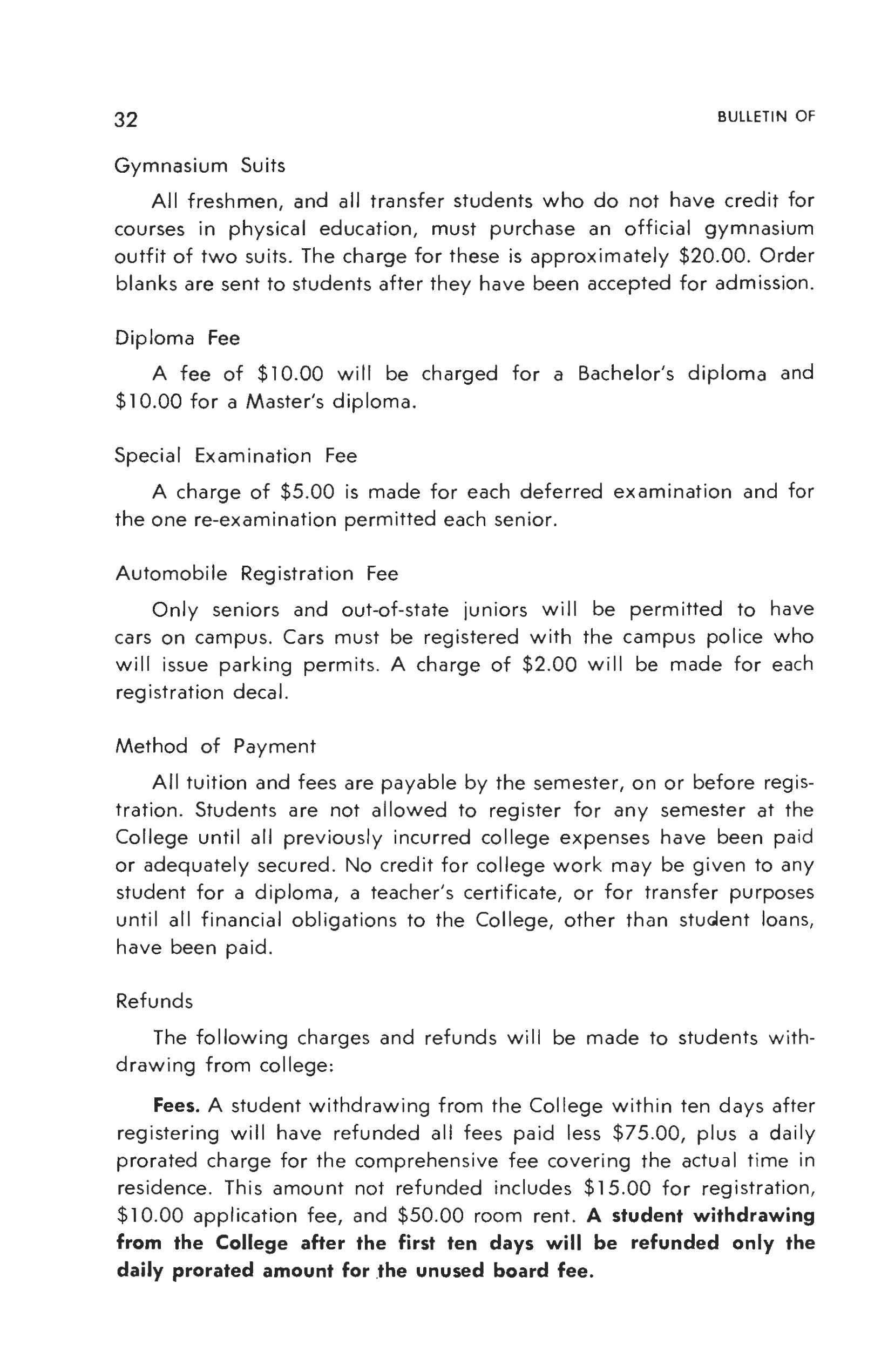
Exceptions. Refunds will be made at the discretion of the President of the College to students whose connection with the College terminates on account of personal illness, certified by the College Physician, unavoidable emergency, or whose connection with the College terminates on account of disciplinary action or enforced withdrawal.
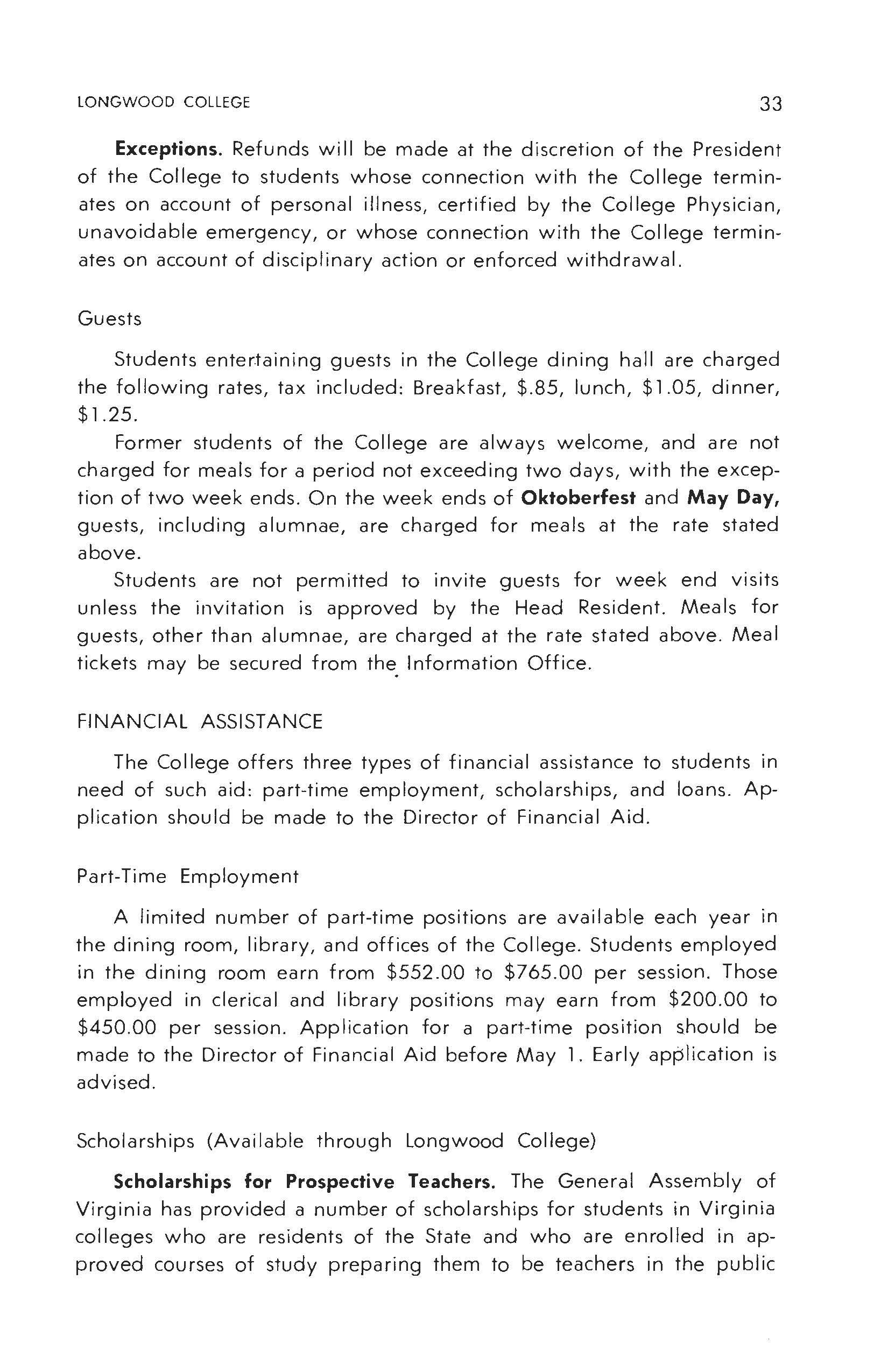
Students entertaining guests in the College dining hall are charged the following rates, tax included: Breakfast, $.85, lunch, $ l .05, dinner, $ l .25.
Former students of the College are always welcome, and are not charged for meals for a period not exceeding two days, with the exception of two week ends. On the week ends of Oktoberfest and May Day, guests, including alumnae, are charged for meals at the rate stated above.
Students are not permitted to invite guests for week end visits unless the invitation is approved by the Head Resident. Meals for guests, other than alumnae, are charged at the rate stated above. Meal tickets may be secured from the Information Office.
The College offers three types of financial assistance to students in need of such aid: part-time employment, scholarships, and loans. Application should be made to the Director of Financial Aid.
A limited number of part-time pos1t1ons are available each year in the dining room, library, and offices of the College. Students employed in the dining room earn from $552.00 to $765.00 per session. Those employed in clerical and library positions may earn from $200.00 to $450.00 per session. Application for a part-time position should be made to the Director of Financial Aid before May l. Early application is advised.
Scholarships (Available through Longwood College)
Scholarships for Prospective Teachers. The General Assembly of Virginia has provided a number of scholarships for students in Virginia colleges who are residents of the State and who are enrol led in approved courses of study preparing them to be teachers in the public
elementary and secondary schools. These scholarship are valued at $350.00 per year. They are open to all qualified students; however, preference is given to applicants proposing to teach in the elementary schools. For each year that the student receives a scholarship, she must agree to teach in Virginia's public schools one year, thereby cancelling the indebtedness and interest. If she does not teach, she must repay the amount received plus interest. All scholarship applications must be endorsed by the College and sent to the State Department of Education, Richmond, prior to May l.
The Elizabeth Burger Jackson Scholarship. Established by Geist in 1967 in appreciation to Dr. Elizabeth B. Jackson, Professor of Natural Science at Longwood College, for her continuing interest in student organizatiens in general and Geist in particular, this scholarship is presented each May to an outstanding sophomore or junior who has rendered dynamic service and exemplified qualities of character and integrity in all her academic and personal endeavors.
The Dabney Stewart Lancaster Scholarship. Established in 1955 by the Student Government Association, this scholarship is awarded annually to a member of the sophomore, junior or senior class. The name of the winner of the award is announced at Honors Assembly in May.
Delta Kappa Gamma Scholarship. Awarded each year to a graduate of Cumberland, Buckingham or Prince Edward County who will be attending Longwood College, the award is based on both merit and need.
The Mary Clay Hiner Scholarship. Established in 1962 by a gift of Mrs. Earl Crafts. Appropriate officials of the College will select each year the student or students who will receive financial assistance.
The Eureka Ashburn Oliver Scholarship. The Mrs. Samuel C. Oliver (Eureka Ashburn, 1891-93) scholarship of $100 each year for four years awarded to lineal descendants. If there should be no lineal descendant, then the scholarship is to be given to students of outstanding ability who need financial assistance from Nansemond County, selected at the discretion of the Admissions Committee of the College. When there are no applicants, the funds shall accumulate until there are applicants from her lineal descendants or from Nansemond County.
The Leola Wheeler Scholarship. Established by the Longwood Players in memory of a former professor of speech and drama. The scholarship will be awarded annually in the spring to a student majoring in
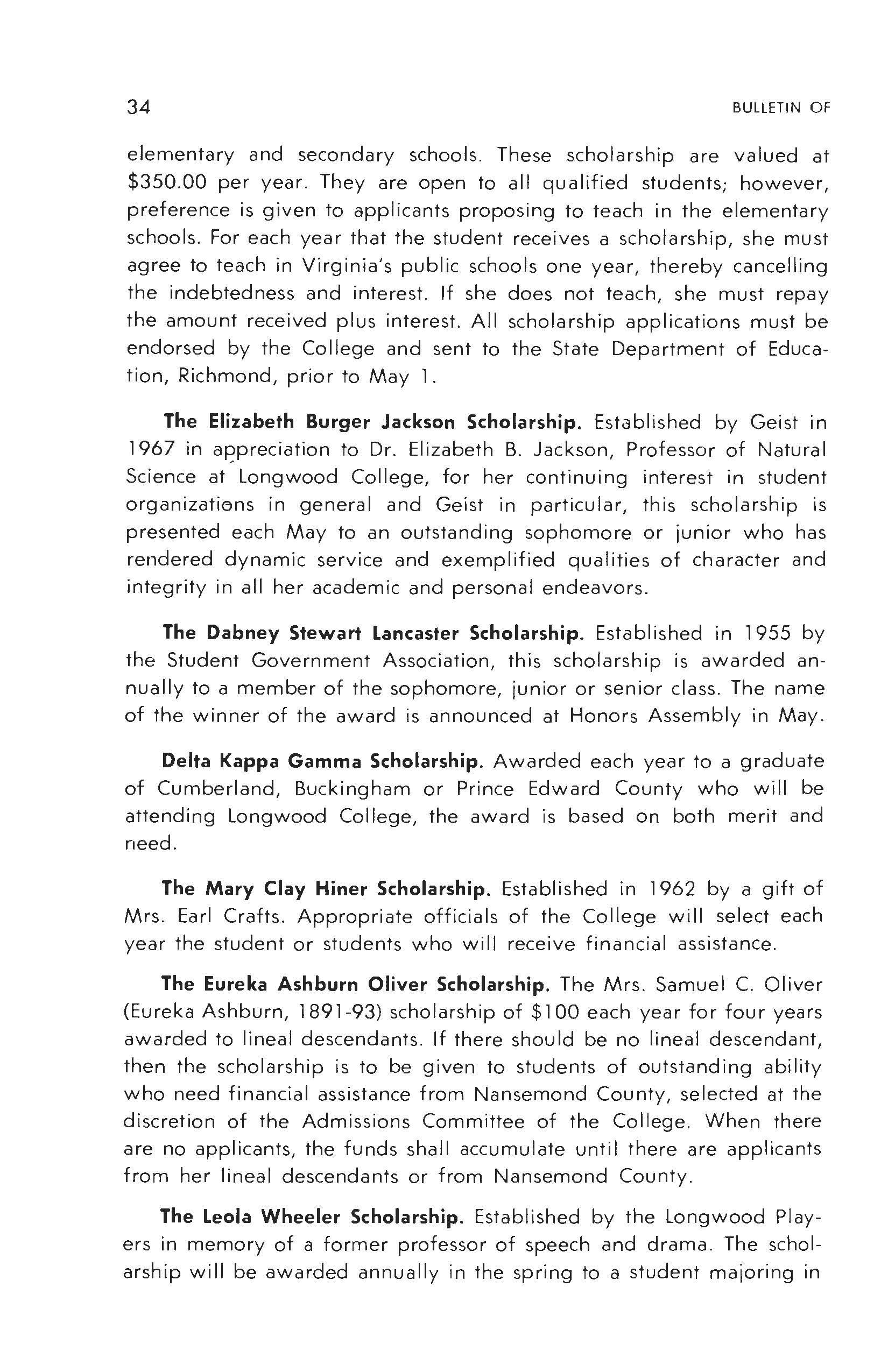
English who has demonstrated particular interest and ability in the field of speech and drama. The stipend will be at least $200.00, and the scholarship is renewable.
The Gamma Theta-Kappa Delta Alumnae Scholarship. In 1949, the Gamma Theta local sorority (1911-1949) became the reactivated Alpha Chapter of Kappa Delta National Sorority. This scholarship is awarded annually to a student on the basis of academic achievement and financial need. The stipend is $200 annually.
The John P. Wynne Scholarship. Established in 1964, this scholarship is awarded annually to a member of the junior class and the Student Education Association for use during the senior year. Selection is based on academic excellence and financial need. Applications should be made to the Executive Board of the Association.
The Alumnae Scholarships. The following Alumnae chapters give scholarships to outstanding graduates of high schools in their respective communities: Farmville (Mary White Cox Memorial Scholarship), Lynchburg (Letty Laughon Scholarship), Norfolk, Peninsula (J. L. Jarman Scholarship), Petersburg, Richmond, and Roanoke.
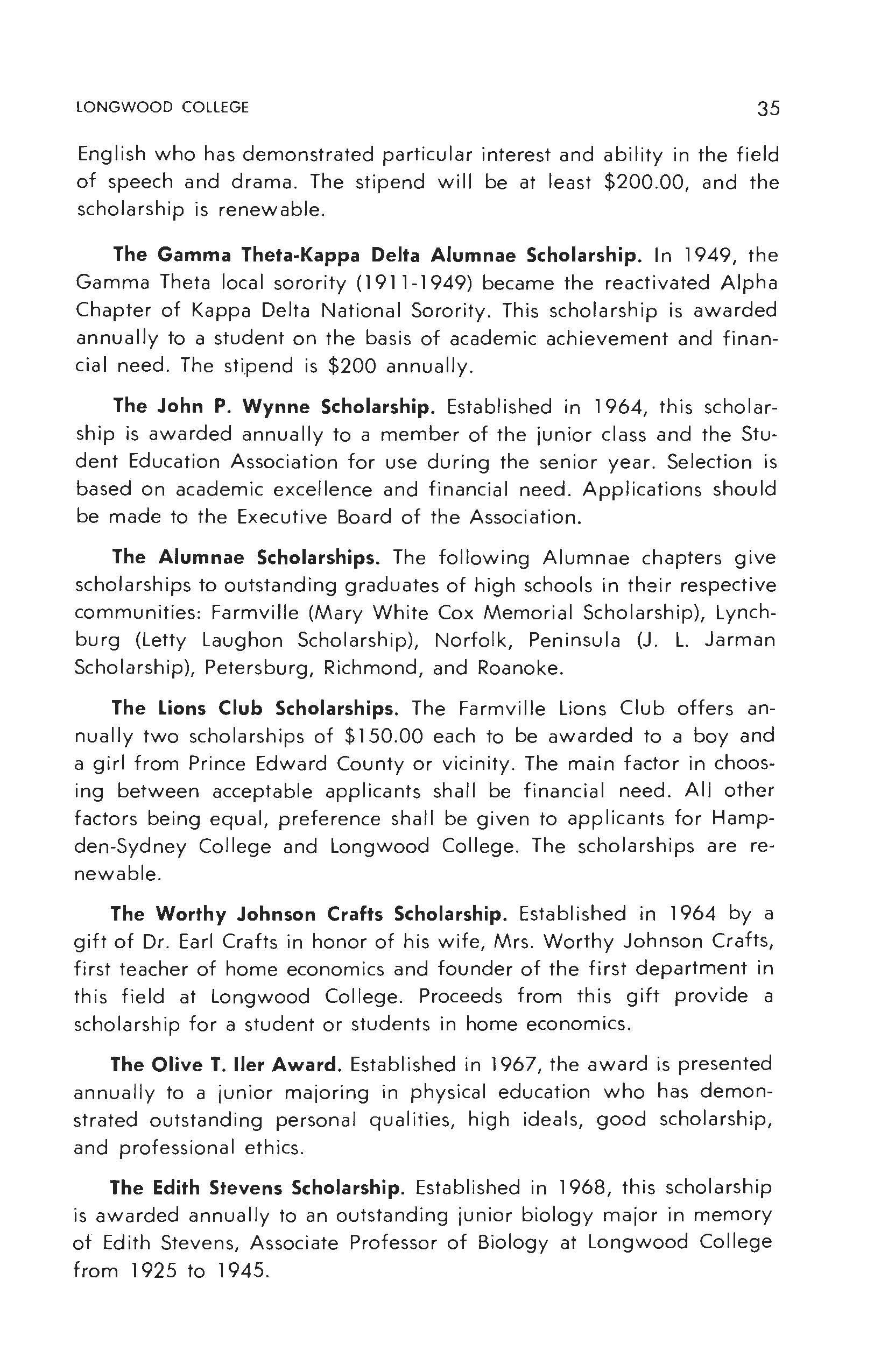
The Lions Club Scholarships. The Farmville Lions Club offers annually two scholarships of $150.00 each to be awarded to a boy and a girl from Prince Edward County or vicinity. The main factor in choosing between acceptable applicants shall be financial need. All other factors being equal, preference shall be given to applicants for Hampden-Sydney College and Longwood College. The scholarships are renewable.
The Worthy Johnson Crafts Scholarship. Established in 1964 by a gift of Dr. Earl Crafts in honor of his wife, Mrs. Worthy Johnson Crafts, first teacher of home economics and founder of the first department in this field at Longwood College. Proceeds from this gift provide a scholarship for a student or students in home economics.
The Olive T. lier Award. Established in 1967, the award is presented annually to a junior majoring in physical education who has demonstrated outstanding personal qualities, high ideals, good scholarship, and professional ethics.
The Edith Stevens Scholarship. Established in 1968, this scholarship is awarded annually to an outstanding junior biology major in memory of Edith Stevens, Associate Professor of Biology at Longwood College from 1925 to 1945.
The Kappa Delta Founders' Scholarship. Established in 1968 , the Kappa Delta Founders ' Scholarship is awarded annually to an initiated member of a National Panhellenic Conference sorority with a chapter located on the Longwood College campus. Selection is based on academic achievement, financial need and service to the College and to the applicant's sorority The amount of the scholarship is $250.00.
Loan Funds (Available through Longwood College)
Unless it is otherwise noted in the description of the funds listed below, applications for loans should be made to the Director of Admissions. Except in cases where a different rate is indicated, all loans bear three per cent interest
The National Defense Student Loan. Longwood College is approved for participation in the National Defense Education Act of Congress. Needy and capable undergraduate and graduate students may borrow from this fund at a low rate of interest. Five years of teaching in public schools cancels fifty per cent of a loan.
The Jennie Masters Tabb Memorial Fund. The alumnae and friends of Jennie Masters Tabb, Registrar of the College and secretary to the President from 1904-1934 , established in 1945 a loan fund in her memory.
The Mary White Cox Memorial Loan Fund. Established in 1945 as a memorial to Miss Mary White Cox by a gift from an alumna of the College.
The J. L. Jarman Loan Fund. The Norfolk Chapter of the Alumnae Asso c iation established in 1942 a loan fund in honor of Dr. J. L. Jarman
The Carrie Fowles Memorial Loan Fund. Established in 1945 by the will of Mrs. Lula Bradshaw Turpin in memory of Carrie Fowles , who was a student at the College in 1899 .
The Robert Frazer Memorial (The Virginia Normal League) Loan Fund. The Virginia Normal League, organized by Dr. Robert Frazer in 1899 as a means of establishing a student loan fund, has been changed in name to the Robert Frazer Memorial Lcun Fund.
The Cunningham Memorial Loan Fund. The alumnae of the College who were graduated during the administration of Dr . John A. Cunningham, from 1886 to 1896, raised a fund, intending to establish a scholarship in memory of his faithful and loving service to them and to the State , feeling that the most fitting tribute that could be paid him

would be the effort to give to those who are unable to obtain it for themselves the training for the wc.rk to which he devoted his life When this fund amounted to $1 , 000 it was changed from a scholarship to a loan fund.
The Fay Byrd Johnson Memorial Loan Fund. Established in 1946 by the Zeta Tau Sorority
The Alpha Phi Sigma Loan Fund. Established in 1931 by Alpha Phi Sigma Society.
The Alpha Sigma Alpha Loan Fund. Established by the Alpha Sigma Alpha Sorority on March 6, 1937.
The Alpha Sigma Tau Loan Fund . Established by the Alpha Sigma Tau Sorority in March, 1942.

The Tri-Sigma Loan Fund. Established by Sigma Sigma Sigma Sorority at 1he Golden Anniversary of the College in March, 1934.
The Zeta Tau Alpha Loan Fund . Zeta Tau Alpha, which was founded at the College in 1898, has established a student loan fund honoring the memory of one of its founders , Maude Jones Horner'. The fund is used to aid deserving seniors. Loans are interest free.
The Longwood Players Loan Fund. Established by the Dramatic Club in March, 1940.
The Prince Edward Chapter Alumnae Loan Fund. This fund was started as a branch of the Virginia Normal League. Loans are interest free Applications for loans should be made to Mrs W. J. Sydnor, Farmville, Virginia
The Methodist Student Loan Fund. Available to qualified Methodist students registered and in attendance at the institution of her choice. Interest at one percent (l %) during school attendance , and three percent (3%) thereafter. Repayment period limited to six years. Application should be made to the Director , Wesley Foundation, Farmville, Virginia
The United Daughters of the Confederacy Loan Fund. The Virginia Division of the United Daughters of the Confederacy has established the Kate Noland Garnett Loan Fund This loan amounts to $150 and is granted to a sophomore, junior, or senior who is a lineal descendant of a Confederate soldier. Applications should be directed to Mrs . J . J.
Robbins, Virginia Division Chairman of Education, United Daughters of the Confederacy, Route 2, Hot Springs, Virginia.
The Daughters of the American Revolution Loan Fund. The Daughters of the American Revolution have established a student loan fund for the aid of worthy students in Virginia colleges. Not more than $300 is available for any one institution, and no student may borrow more than a total of $300 or more than $150 in one session. This loan is available only to juniors and seniors.
The Daughters of the American Revolution Loan Fund. Thomas Nelson Chapter, Arlington, Virginia. A revolving loan fund of $ l 00, without interest, has been made available by the Chapter. Preference will be give1 to applicants from the Arlington area of Virginia.
Longwood College participates in the Education Opportunity Grant Program sponsored by the Federal Government. Application for this aid is made to the Director of Admissions, Longwood College.
The R. C. Simonini Memorial Scholarship. Established in 1968 by the Virginia Association of Teachers of English, this work scholarship is awarded annually to an English major selected by a committee from the English department faculty. The holder of this renewable scholarship will receive up to $300.00 a session for part-time secretarial work. for the Virginia Association of Teachers of English in the office of its executive secretary at Longwood.
The Tuition Plan, Incorporated-For those parents who wish to pay for college costs in installments, the college offers the services of The Tuition Plan, Inc. Parents who apply may have The Tuition Plan, Inc. send to the college those fees which are due the school, and monthly payments may be made to The Tuition Plan. All parents may apply for at least a one-year contract, and most parents may apply for a twothree-, or four-year contract, if they desire.
Not a financial aid program, The Tuition Plan is particularly desirable for parents for whom installment payments are more practical. Money is available from The Tuition Plan only for those expenses for which the student is billed by the college.
A descriptive brochure on the program may be secured from The Tuition Plan, Inc., 575 Madison Avenue, New York, New York l 0022.

Summarized in this section are important regulations related to the academic work of the College. Students should be familiar with these as they undertake their studies in this institution.
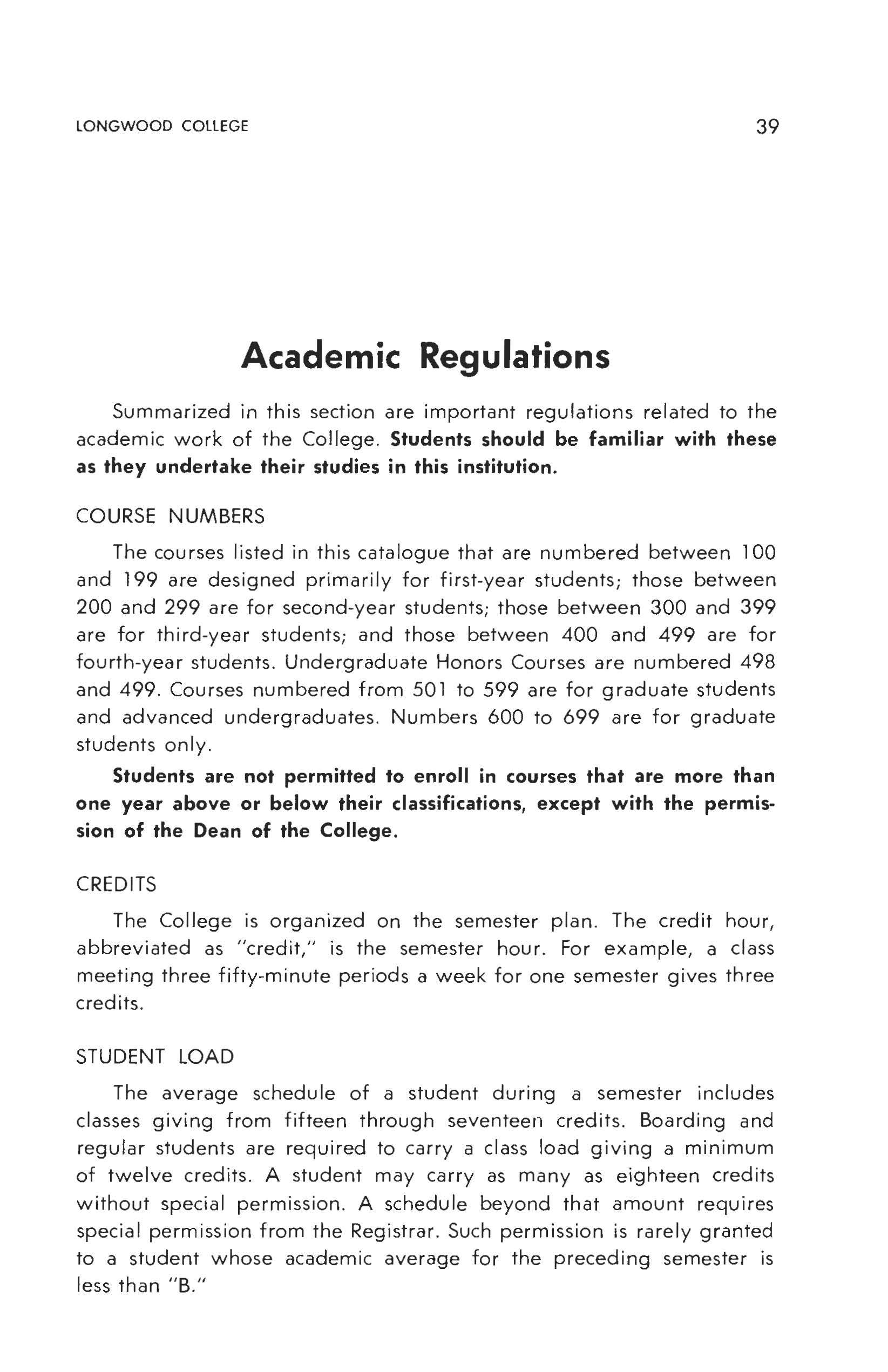
The courses listed in this catalogue that are numbered between l 00 and 199 are designed primarily for first-year students ; those between 200 and 299 are for second-year students; those between 300 and 399 are for third-year students; and those between 400 and 499 are for fourth-year students. Undergraduate Honors Courses are numbered 498 and 499. Courses numbered from 501 to 599 are for graduate students and advanced undergraduates . Numbers 600 to 699 are for graduate students only.
Students are not permitted to enroll in courses that are more than one year above or below their classifications, except with the permission of the Dean of the College
The College is organized on the semester plan The credit hour, abbreviated as "credit," is the semester hour For example, a class meeting three fifty-minute per iods a week for one semester gives three credits.
The average schedule of a student during a semester includes classes giving from fifteen through seventeen credits . Boarding and regular students are required to carry a class load giving a minimum of twelve credits. A student may carry as many as eighteen credits without special permission A schedule beyond that amount requires special permission from the Registrar Such permission is rarely granted to a student whose academic average for the preceding semester is less than " B. "
All changes made by students in their class schedules after registration must be approved by the student's faculty adviser and by the Registrar.
No student is permitted to enroll in a course for credit later than one week after classes begin in any semester . Any student who withdraws from or "drops" a course after two weeks from the date that classes begin in any semester will receive a grade of "F" in the course unless the withdrawal is due to advice of the College Physician or to the withdrawal of the student from college.
No credit is allowed for any course taken for which the student has not registered and which is not listed on the approved schedule of classes filed in the Registrar's office.
The College recognizes that the prior achievement of the students whom it admits varies greatly in the subject matter fields. For example, some are much more proficient in a subject such as English composition than are others. As a result, any requirement that all students must enroll in identical basic courses in the freshman or later years usually results in heterogeneous classes in which the well-prepared student is not challenged or the student with the usual preparation is confronted with exceedingly difficult tasks.
Because of these differences in prior achievement, the College offers every student an opportunity to demonstrate her achievement in a required subject prior to enrolling in it. This may be done by the use of an oral or written examination, or a conference, at the discretion of the faculty member involved. At times, this evaluation may be made after the student has been enrolled in a course for one semester. Unusual proficiency demonstrated in the first semester of a two semester course may indicate that the student should not continue in the same course but enroll in one of a more advanced nature.
In any case wherein the student is found to have a satisfactory knowledge of a subject prior to enrolling in it, or after completing a part of her study in it, the chairman of the department in which the subject is taught will notify the Registrar In such a notification, he will state that the student is excused from taking the subject and will indicate the subject or course that may be taken in its stead. This may be an advanced course in the same subject or an elective course in any field, chosen with the advice of the chairman.
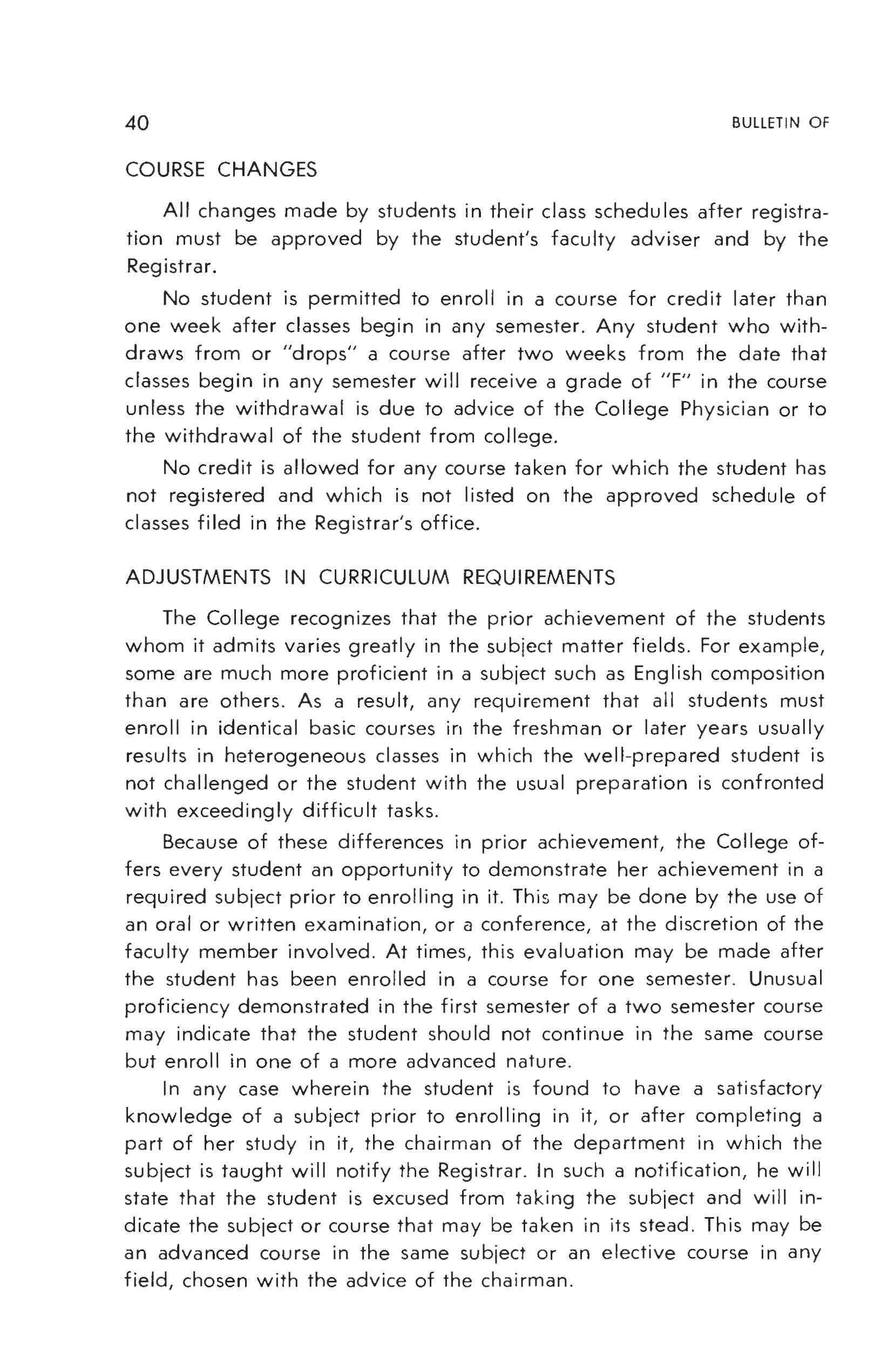
As the above indicates, the student is not granted college credit for prior achievement. However, recognition of such achievement enables her to plan a program of study that is challenging and in accord with her individual needs.
Longwood College offers advanced standing to superior students in the fields of English composition, literature, European history, American history, French, Spanish, biology, chemistry, physics and mathematics. Advanced Placement examinations are given by the COLLEGE ENTRANCE EXAMINATION BOARD
It should be noted that these are different from the usual College entrance examinations given by the same Board. This Board makes available each year in May at regular examination centers, advanced placement examinations in the several fields Any student whose performance on these tests is satisfactory will be allowed to skip the beginning course in the particular field and obtain the semester hours of credit which that course carries toward the bachelor's degree. For example, if the student takes the advanced placement examination in American history and makes a satisfactory score, that student will not be required to take the beginning course in American history, and she will be granted credit toward her degree on the basis of the examination The examinations are administered by the Educational Testing Service Detailed information on testing dates, examination centers, ar.d all other matters relating to the administration of the examinations, is available without cost in the bulletin of information entitled "Advanced Placement Examinations ." This bulletin may be obtained by writing to: College Board Advanced Placement Examinations, Box 592, Princeton, New Jersey.
Examinations for advanced standing in other departments are administered by the Longwood College faculty of the department concerned by appointment.
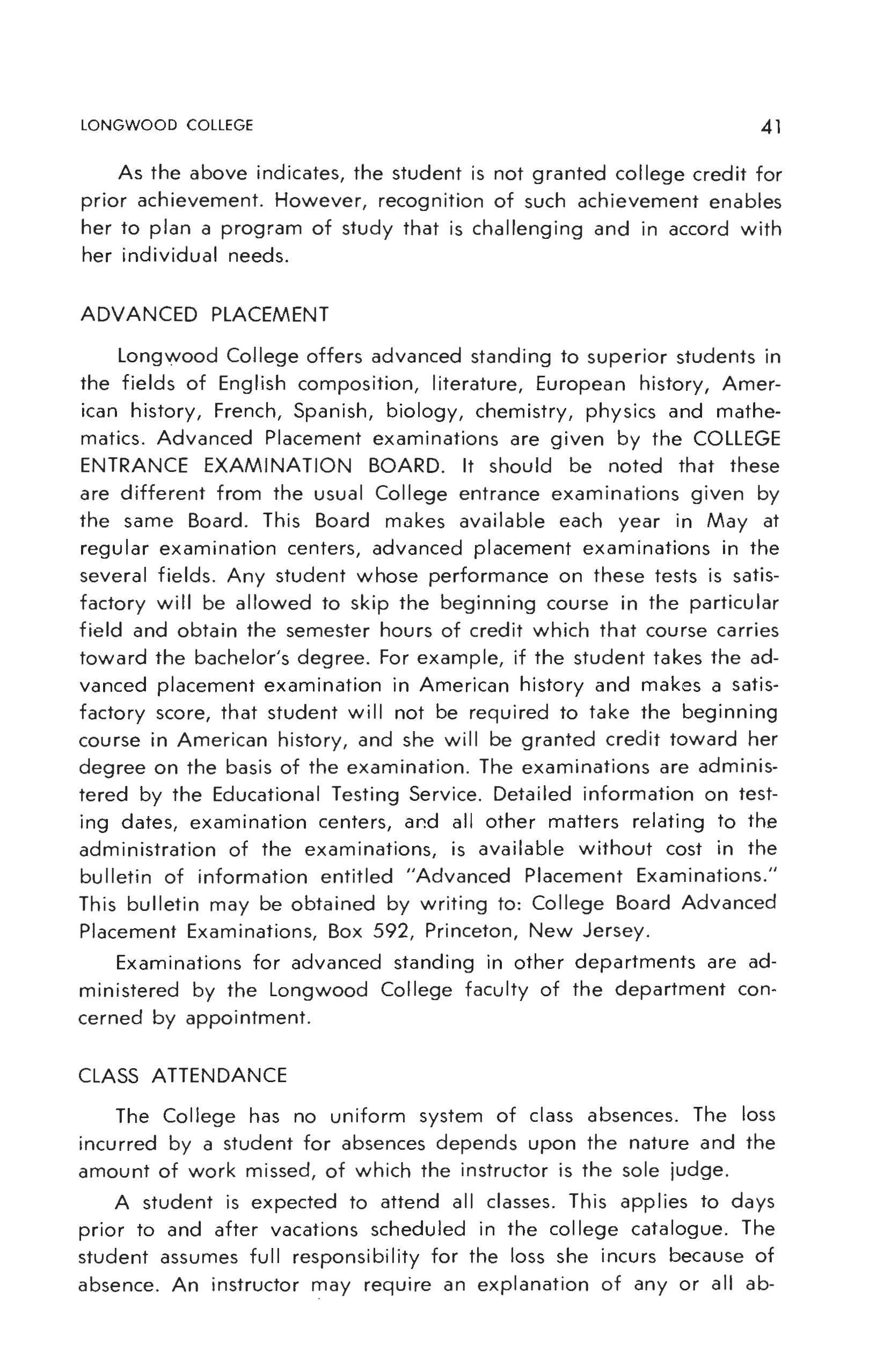
The College has no uniform system of class absences. The loss incurred by a student for absences depends upon the nature and the amount of work missed, of which the instructor is the sole judge
A student is expected to attend all classes. This applies to days prior to and after vacations scheduled in the college catalogue. The student assumes full responsibility for the loss she incurs because of absence An instructor may require an explanation of any or all ab-
sences from his class. He will judge the validity of these explanations and will decide whether or not they justify permission for the student to make up the work missed.
The only exceptions to the above are the cases : (1) of a student's absence because of illness or (2) of a student's participation in a college activity approved by the Dean . Instructors are asked uniformly to permit students to make up work missed when the absence results from either of these causes. He may, however, demand that the student supply him with an excuse signed by the College Physician or some other physician in the case of an illness. Approval of college activities will be posted on the faculty bulletin board.
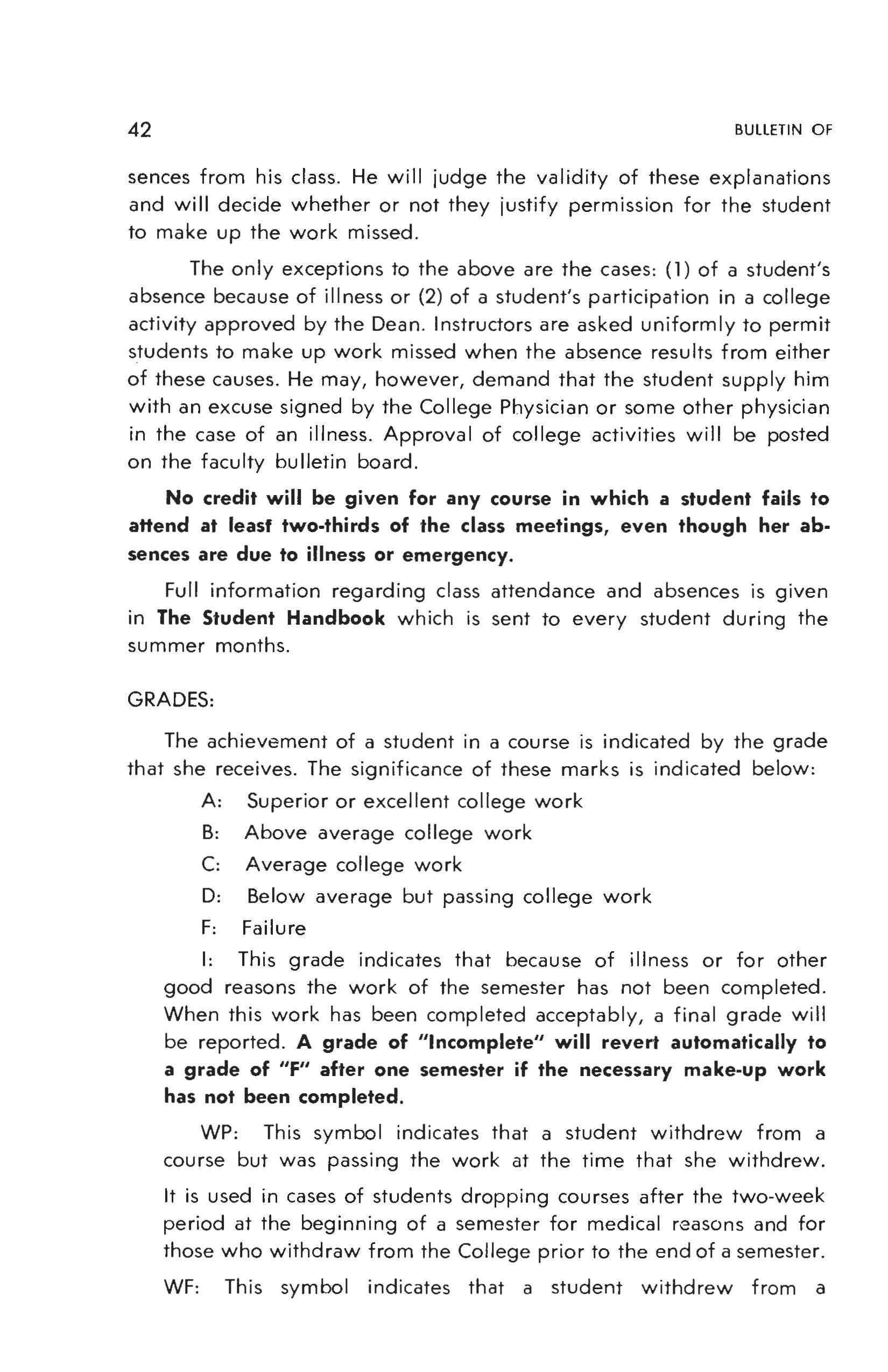
No credit will be given for any course in which a student fails to attend at leasf two-thirds of the class meetings, even though her absences are due to illness or emergency.
Full information regarding class attendance and absences is given in The Student Handbook which is sent to every student during the summer months.
The achievement of a student in a course is indicated by the grade that she receives. The significance of these marks is indicated below:
A: Superior or excellent college work
B: Above average college work
C: Average college work
D: Below average but passing college work
F: Failure
I: This grade indicates that because of illness or for other good reasons the work of the semester has not been completed. When this work has been completed acceptably, a final grade will be reported . A grade of "Incomplete" will revert automatically to a grade of "F" after one semester if the necessary make-up work has not been completed.
WP: This symbol indicates that a student withdrew from a course but was passing the work at the time that she withdrew. It is used in cases of students dropping courses after the two-week period at the beginning of a semester for medical reasons and for those who withdraw from the College prior to the end of a semester.
WF: This symbol indicates that a student withdrew from a
course and was failing the work in it at the time she withdrew It is used in cases of students dropping courses after the two-week period at the beginning of a semester and those who withdraw from the College prior to the end of a semester.
The lowest passing grade is "D." However, for a degree a student must earn a general average of "C" (a quality point average of 2 .00) on all of her college work . Also she must have a general average of "C" in those courses constituting her major subject or field. At times, it is necessary for a student to repeat certain courses or enroll in additional courses in order to raise her average to these requirements . However, credit toward graduation will be granted only one time for any course.

At the end of the first half of each semester of the regular session, mid-semester grade estimates are issued to freshmen and their parents or guardians . Estimates are also issued at this time to upperclassmen who are on academic probation or who have a grade of "D" or "F" in any course . These are not official grades . Instead, they represent the instructors' estimates of the students' progress up to that point. At the end of each semester, reports are issued to students and their parents or guardians showing the final grade earned in each course in which they are enrolled.
The quality of work completed by a student is recognized by the assignment of points to various grades
For each credit of: A grade-4 points
B grade-3 points
C grade-2 points
D grade- I points
F grade-0 points
Under the "Four Point" system, all grades made on courses will be permanently retained in computing a student ' s
On the basis of this point system, a student ' s qual i ty point average may be computed by dividing the number of quality points that she has earned by the total number of credits assigned to the courses in which she has been enrolled. A student's quality point average is based only on work taken at Longwood College.
Academic probation is a state of warning and indicates that the student's academic work is not satisfactory. Students, with the exception of freshmen, whose cumulative quality point average is below 2.00 at the end of any semester, are placed on academic probation. Freshmen must achieve a quality point average at the end of the first semester of 1.60; at the end of the second semester, 1.80. Academic probation may be removed by increasing the quality of academic performance during the regular session and /or attending summer session at Longwood College.
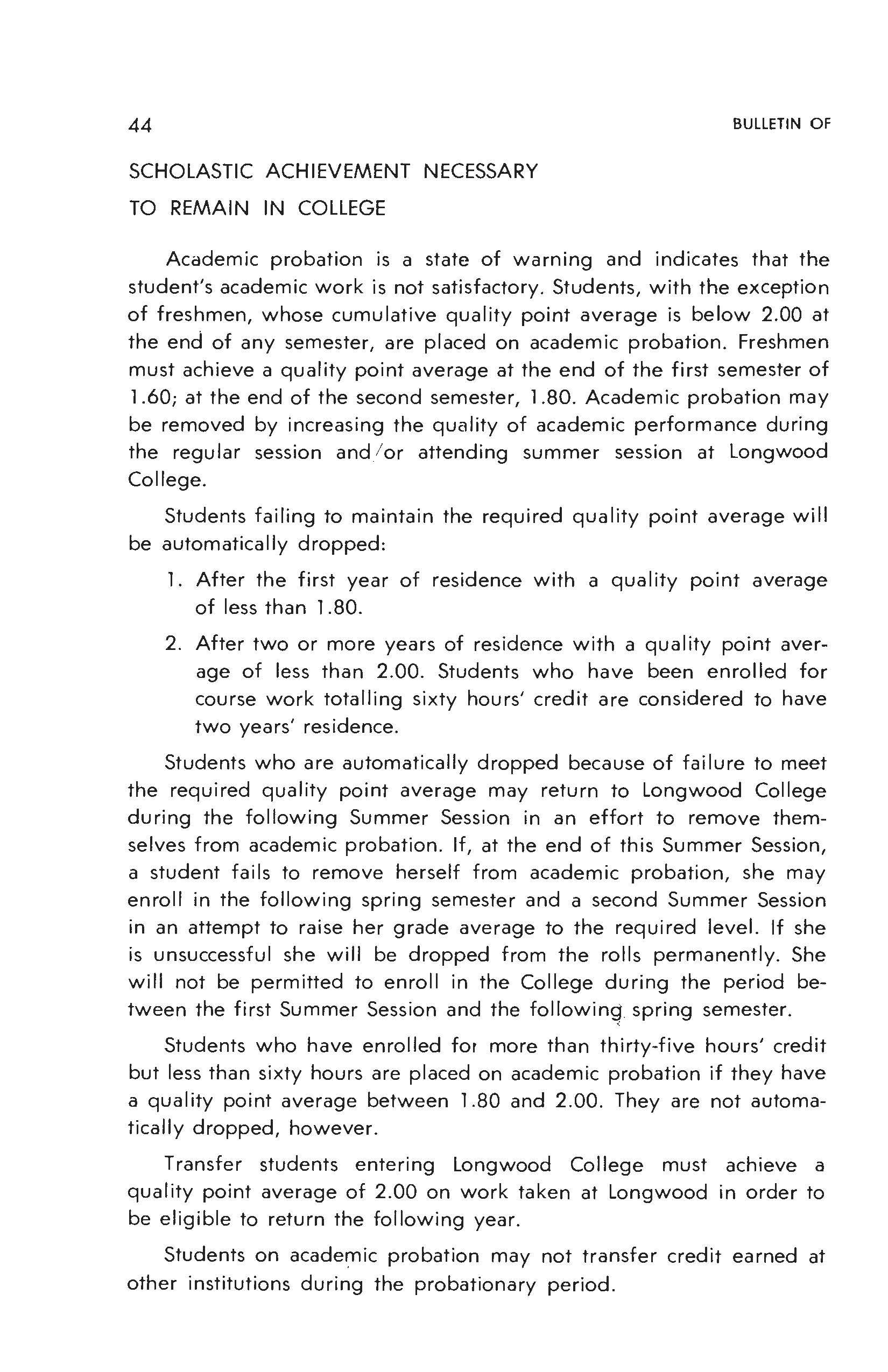
Students failing to maintain the required quality point average will be automatically dropped:
l. After the first year of residence with a quality point average of less than l .80.
2. After two or more years of residence with a quality point average of less than 2.00. Students who have been enrolled for course work totalling sixty hours' credit are considered to have two years' residence.
Students who are automatically dropped because of failure to meet the required quality point average may return to Longwood College during the following Summer Session in an effort to remove themselves from academic probation. If, at the end of this Summer Session, a student fails to remove herself from academic probation, she may enroll in the following spring semester and a second Summer Session in an attempt to raise her grade average to the required level. If she is unsuccessful she will be dropped from the rolls permanently. She will not be permitted to enroll in the College during the period between the first Summer Session and the followinq spring semester.
Students who have enrolled for more than thirty-five hours' credit but less than sixty hours are placed on academic probation if they have a quality point average between l .80 and 2.00. They are not automatically dropped, however.
Transfer students entering Longwood College must achieve a quality point average of 2.00 on work taken at Longwood in order to be eligible to return the following year.
Students on academic probation may not transfer credit earned at other institutions during the probationary period.
All students enrolled in teacher education curricula undertake supervised teaching during their senior year. Each student is assigned to work with a regular teacher in a public school located off the campus. The student teaching period consists of a concentrated block of fulltime teaching and observation. This involves a minimum of 175 clock hours of directed teaching and 25 hours of directed observation. Six or eight semester hours of credit are earned in student teaching for the period. No additional work may be taken during the student teaching period.
A student may, at the time of admission to college, declare an intent to enter a curriculum leading to teacher education and be eligible for a Virginia State Teaching Scholarship. In addition to the prescribed prerequisites for admission, special consideration to health, scholarship, character, and teaching potentialities is made of the applicant. The Director of Student Teaching serves as a consultant to the Committee on Admissions on all applications of students declaring an intent to pursue a teacher education program. Applicants who possess physical defects or histories o(emotional disorders are required to submit to a personal interview at which time a committee passes on each case prior to admission to college. This committee is composed of the Director of Admissions and the Director of Student Teaching.
Admission to the college does not constitute admission to the program of teacher education. Final admission to the teacher education program is given normally during the fifth semester of the student's program or to students that have earned at least sixty semester hours credit. The Committee on Teacher Education serves as the screening committee for admission.
The Committee on Teacher Education consists of six members: The Chairman of the Department of Education, The Director of Student Teaching, two College Supervisors of Student Teaching, and the Chairman of the Department and Departmental consultant in which the student is majoring. The Director of Student Teaching serves as Chairman.
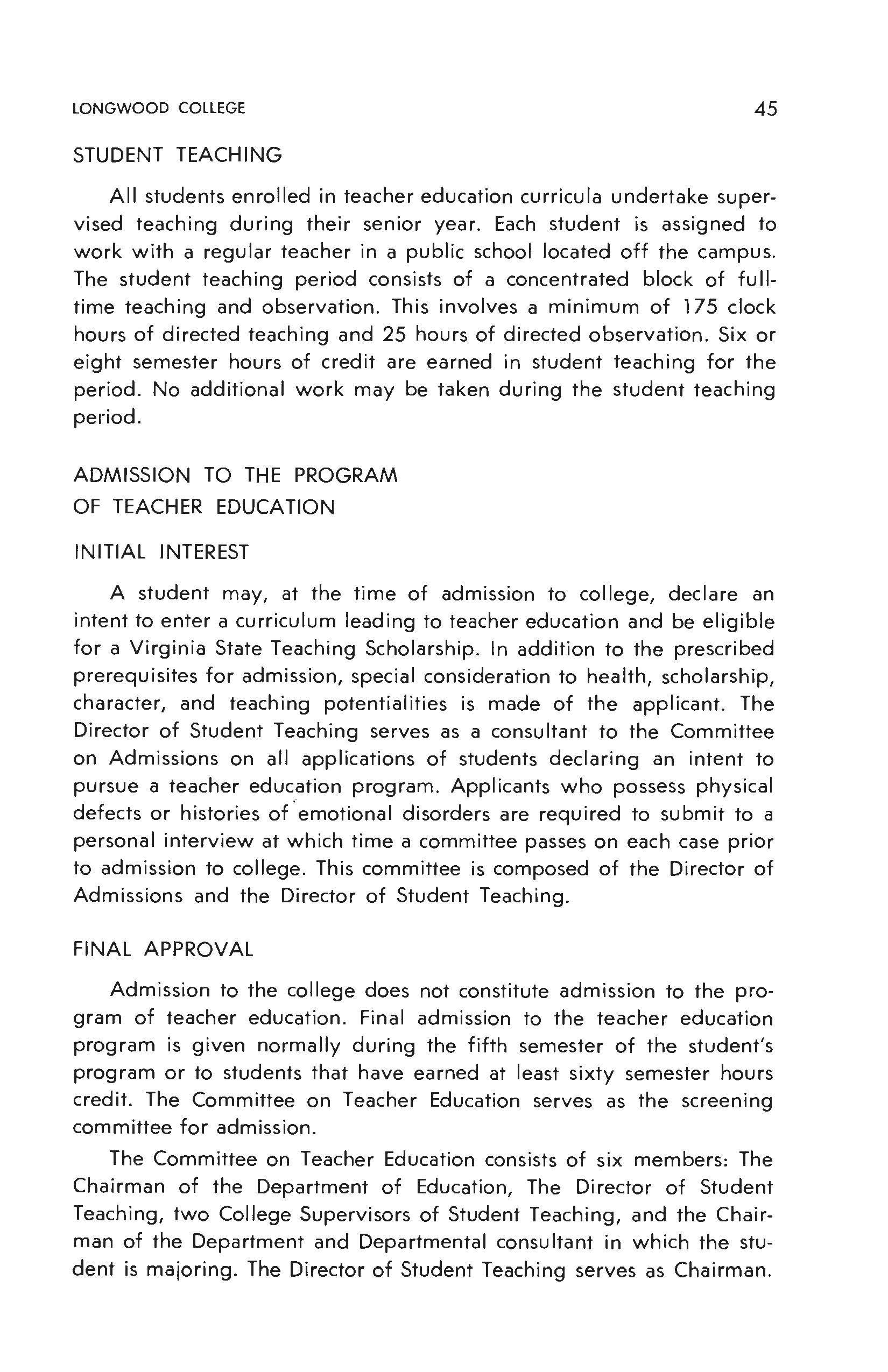
Applications for approval in a teacher education program may be filed after a student has completed at least sixty semester hours credit. The student files an "Application for Acceptance in Teacher Education and Student Teaching." Included in the application form is a formal recommendation signed by the departmental chairman of the student's major.
The Committee on Teacher Education employs the following criteria and procedures in its screening program for final admission:
l. The student must be a senior and shall have completed 90 semester hours of work.
2. The student must present evidence of the satisfactory completion of a broad background in general education.
3. The student must have adequate preparation in her major field or fields of concentration with a cumulative average of "C" on work taken at Longwood College.
4. The student must demonstrate adequate preparation in his professional courses with a minimum grade of "C" on each course or a "C" average. For secondary majors this shall include Developmental Psychology, Educational Psychology and Principles of Secondary Education. For elementary majors this shall include Developmental Psychology, Educational Psychology, Lagguage Arts, Principles of Reading, and Principles of Elementary Education.
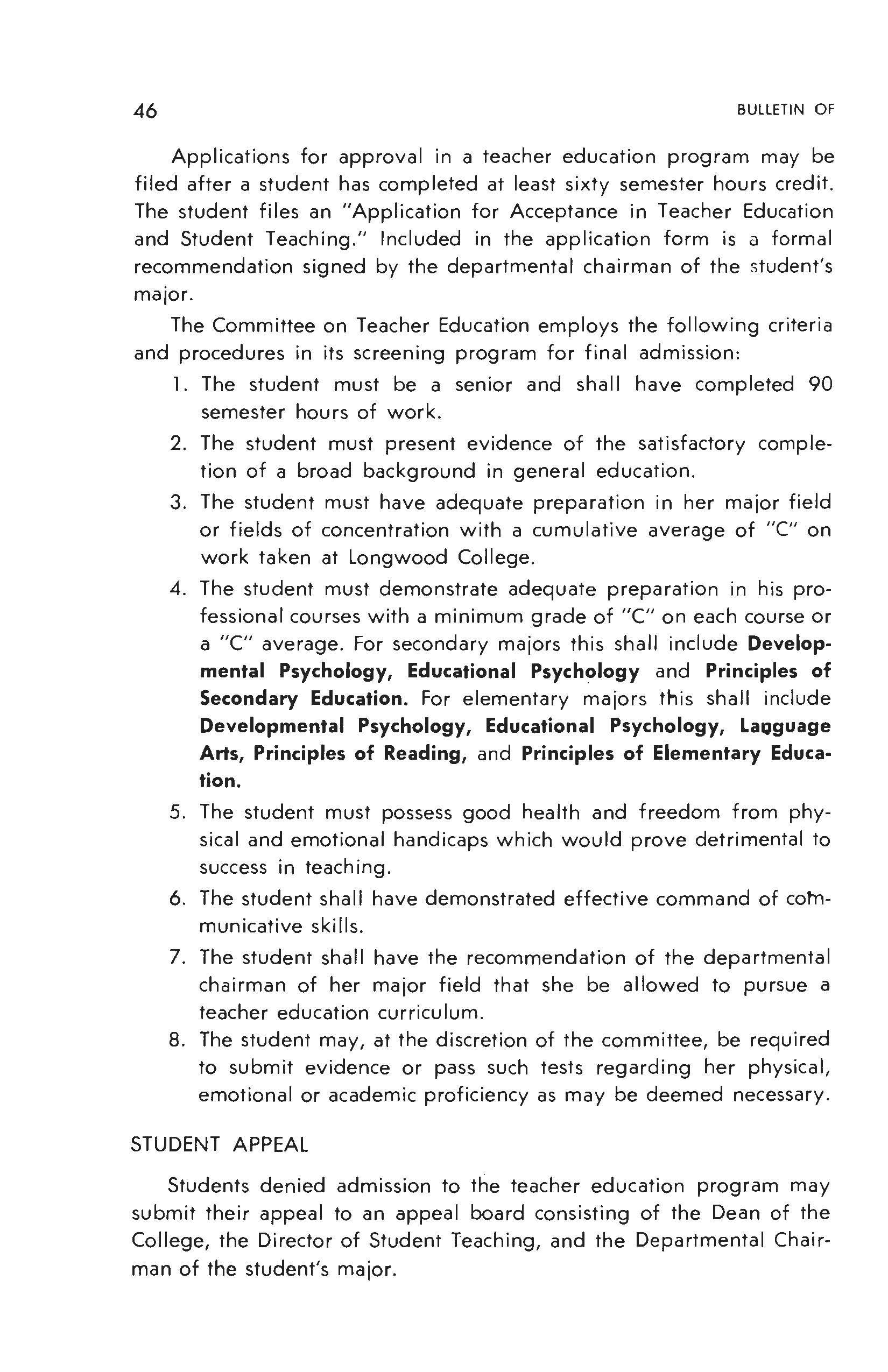
5. The student must possess good health and freedom from physical and emotional handicaps which would prove detrimental to success in teaching.
6. The student shall have demonstrated effective command of communicative skills.
7. The student shall have the recommendation of the departmental chairman of her major field that she be allowed to pursue a teacher education curriculum.
8. The student may, at the discretion of the committee, be required to submit evidence or pass such tests regarding her physical, emotional or academic proficiency as may be deemed necessary.
Students denied admission to the teacher education program may submit their appeal to an appeal board consisting of the Dean of the College, the Director of Student Teaching, and the Departmental Chairman of the student's major.
In order to satisfy certification requirements of the Virginia State Board of Education, the student must complete the appropriate student teaching program described below:
l The elementary major seeking endorsement in Kindergarten and Grades l, 2 and 3 is required to engage in student teaching for a ten-week period during the Fall Semester of her senior year.
2 The elementary major seeking endorsement in Grades 4, 5, 6 and 7 is required to engage in student teaching for an eightweek period during either the Fall or Spring Semester of her senior year.
3. The student seeking endorsement in a subject area at the high school level is required to engage in student teaching for an eight-week period during either the Fall or Spring Semester of her senior year. A summer student teaching program is also provided for endorsement at this level. This program is open only to degree candidates at Longwood College and is limited with respect to size of enrollment and subject areas.
Longwood College does not recommend a student for certification as a teacher if her grade in student teaching is below " C."
The College recognizes superior scholarship through its Dean's List and the announcement of an honor list at each commencement. The Dean's List is published at the end of each semester. Students whose names appear on it are those who have earned an academic average of 3.50 or above on a minimum of 12 semester hours of work taken in the semester with no grade below "C." Students eligible for the Dean's List must complete all courses in the semester for which they are registered. A grade of "I" on a student's record prevents consideration of her for this honor
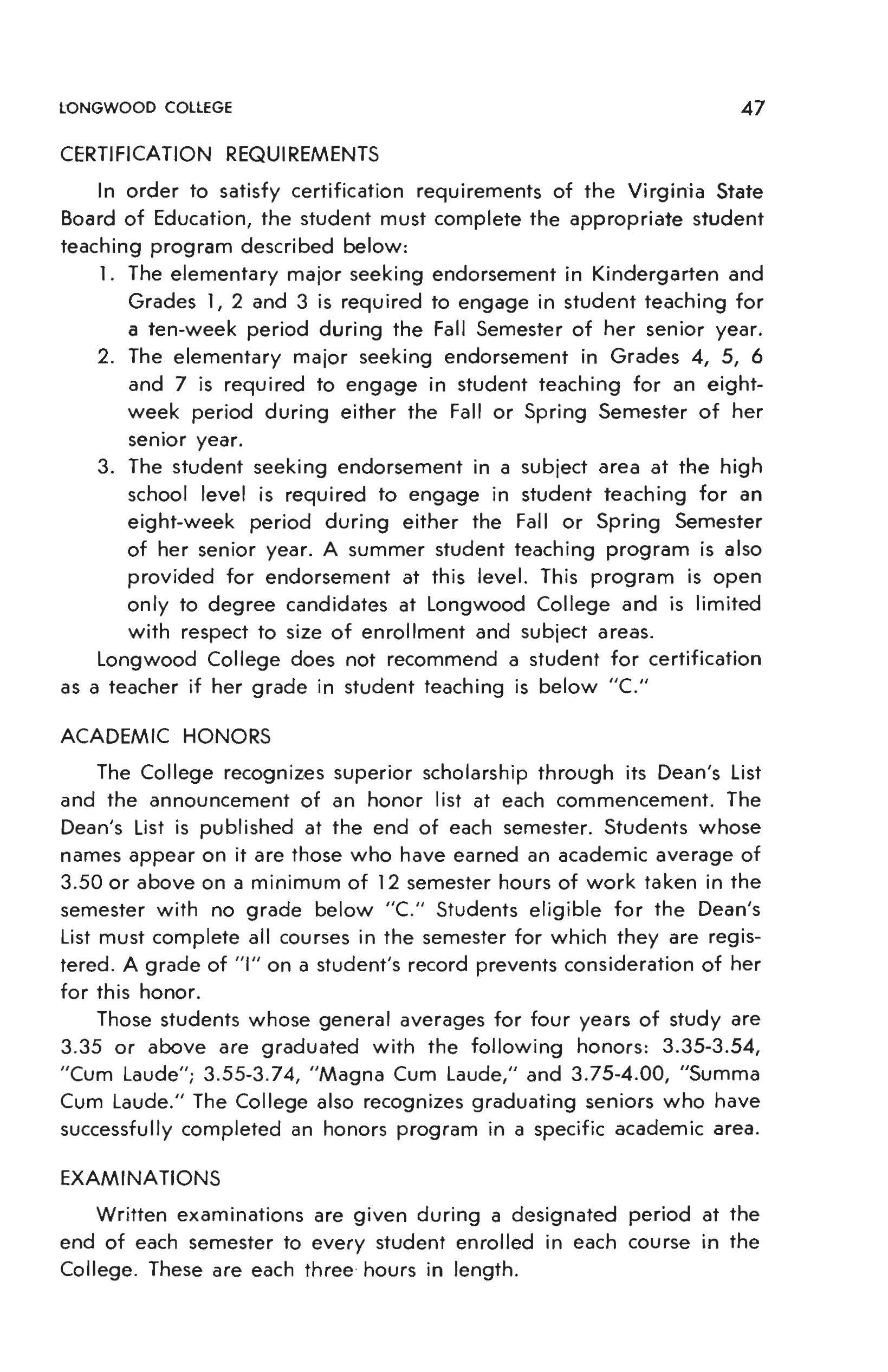
Those students whose general averages for four years of study are 3.35 or above are graduated with the following honors: 3.35-3.54, "Cum Laude"; 3.55-3.74, "Magna Cum Laude," and 3.75-4.00, "Summa Cum Laude " The College also recognizes graduating seniors who have successfully completed an honors program in a specific academic area.
Written examinations are given during a designated period at the end of each semester to every student enrolled in each course in the College. These are each three hours in length .
Re-examinations are not permitted for freshmen, sophomores, or juniors. A senior student is permitted one re-examination during her senior year. This may be in either the first or second semester. A fee of five dollars is assessed for this re-examination.
Students may repeat courses in which they have unsatisfactory grades in an effort to raise such grades; however, credit will be granted only one time for any course. Both the original and the repeated grade will be retained on the student's permanent record and contribute to the student's average . Approval from the appropriate departmental chairman and the Dean must be secured before a student attempts to raise a grade on a course at an institution other than Longwood.
The College accepts, on transfer, credits of acceptable grade earned in other accredited colleges and universities provided such credits may be applied toward the requirements for a degree in this institution. Grades earned at other institutions will be recorded at Longwood College in terms of semester hours of credit earned if the transfer grade is "C" or better. Transfer credits of a grade quality of below "C" are not accepted.
Permission to take off-campus work in other institutions which will be transferred as credit to Longwood College must be obtained prior to the taking of such work from the Office of the Dean.
The cumulative quality point average of each student will be calculated on work taken only at Longwood. Transfer credit accepted from other institutions will be used to reduce the number of credits required for graduation but will not enter into the calculation of the quality point average
Not more than fourteen semester hours of correspondence course credit and not more than thirty semester hours of extension class and correspondence study combined may be credited toward a degree. The College does not accept, on transfer, credits earned through correspondence courses in the natural and physical sciences and certain other subjects. Students must obtain approval to include in their degree program correspondence and extension courses prior to enrolling in them. Otherwise, the College can assume no responsibility for accepting such credits on transfer .
The College cannot grant a student permission to enroll in a cor-
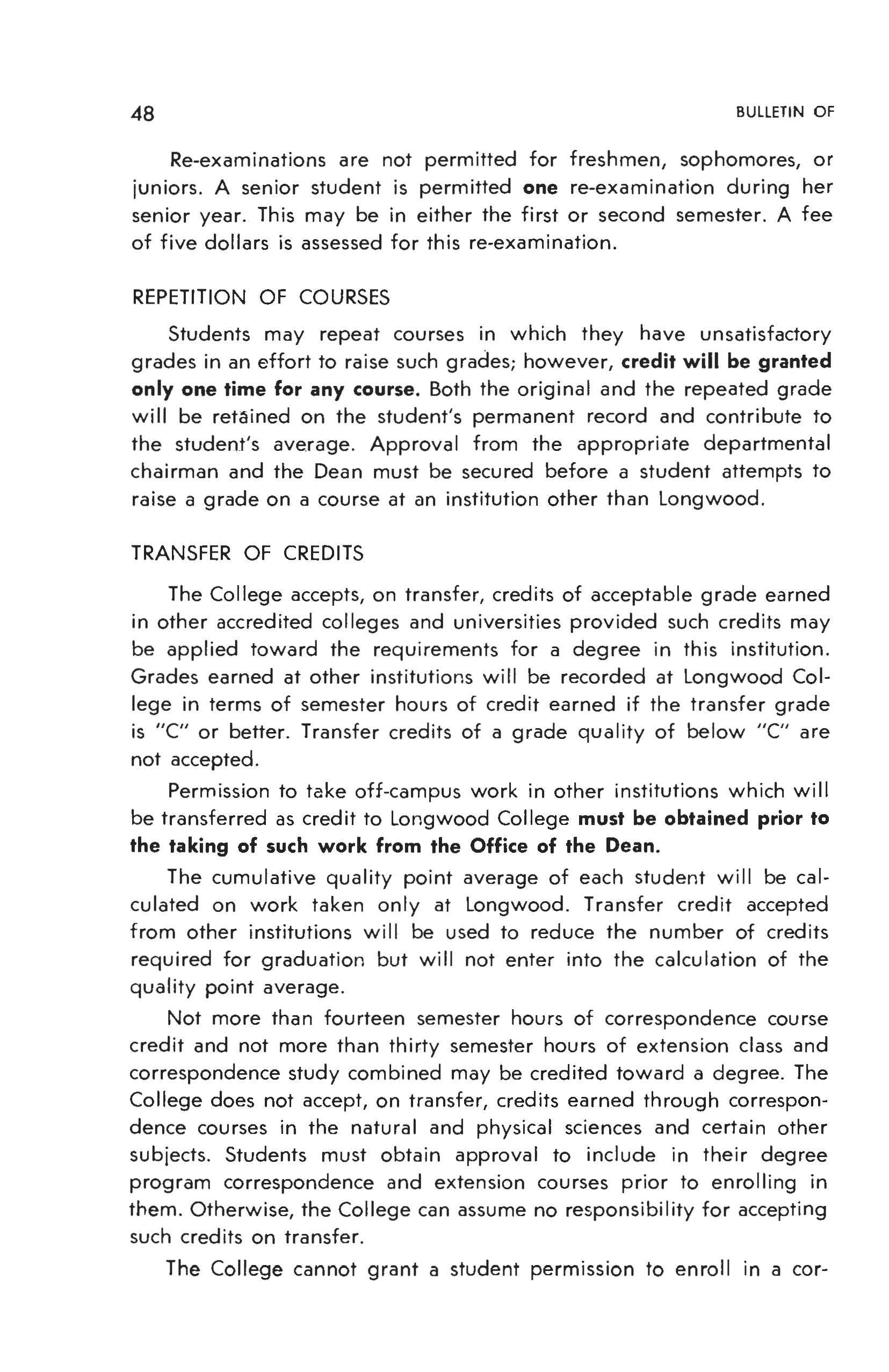
respondence or extension course until after the student has attended this institution for at least one full summer session or a semester of the regular session .
When a student is enrolled in the College and enrolls also in a correspondence or extension course, the credit to be earned in the course will be counted in the total load of work that she is permitted to carry.
The College awards the bachelor's degree to a student who has fulfilled the following requirements:
1 . Completion of all study required in one of the four degree programs offered by the College
2. Completion of a course of study giving a minimum of 126 semester hours of credit with a minimum general average of "C" in all work taken and a minimum general average of "C" in courses taken in the major subject or field .
3. Successful completion of an English proficiency examination to be taken during the junior year. The nature of the examination will be prescribed by the student's major department, which may permit the student to take an advanced course in English compos i tion in lieu of the proficiency examination When such a course is taken, the depart ment may require a minimum grade of "C."
4. All students must demonstrate swimming proficiency. Students may either pass the College swimming test, or pass a swimming course to fulfill this requirement .
5. Attendance as a student for at least one session consisting of two semesters,* including the last semester immediately preceding graduation. (One ten-week summer session in which the student carries a full load of courses may be substituted for one semester, but no student can be graduated on the basis of summer work alone )
6. Not more than fourteen hours by correspondence nor more than thirty hours by correspondence and / or extension.
7. The maximum length of residence within which the requirements for a degree must be met is ten semesters
8. Approval of the individual by the general faculty as a worthy candidate for graduation.
*The term "semester" for residence purposes normally involves classes giving from f ifteen to seventeen credits
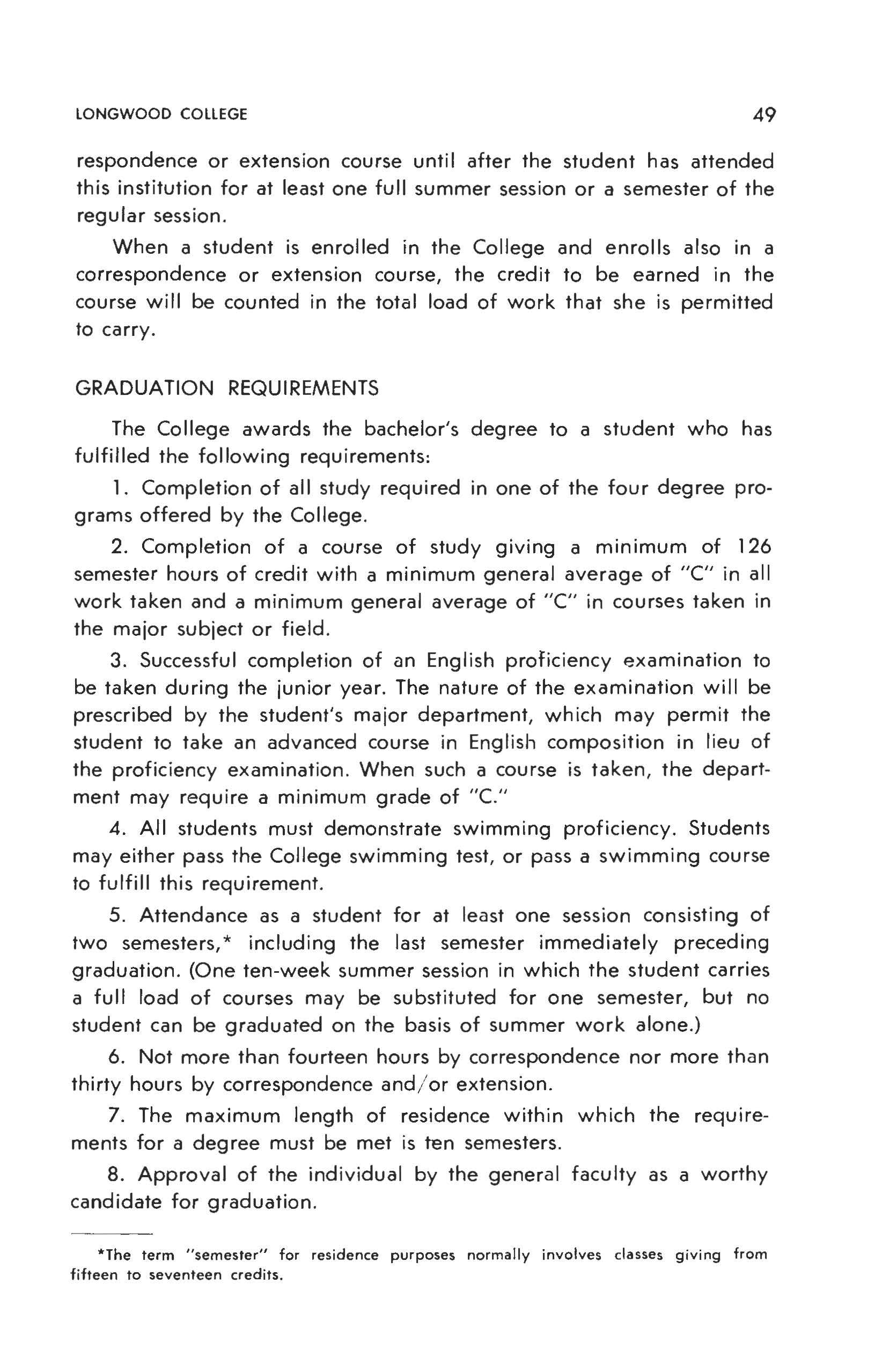
9. An Application for Graduation must be filed with the Registrar at least 60 days prior to the date of graduation.
It is the sole responsibility of the candidate for graduation to meet all of the above requirements, including the completion of 126 semester hours of work
Progressive development in the College forces frequent revision of curricula. In every new catalogue some improvements are indicated. When no hardship is imposed on the student because of changes, and when the facilities of the College permit, the student is expected to meet the requirements of the latest catalogue. In this way, the student may realize the benefits of improvements in her curriculum that she would be unable to realize were she to follow the curriculum in effect at the time that she entered the College. If the student finds it impossible to meet the requirements of the latest catalogue, the catalogue for the year in which she entered becomes the binding one in terms of requirements for her graduation, subject to the stipulation in the succeeding paragraph.
Students returning to the College after an interruption of four or more years of their college study are required to conform to the requirements of the latest catalogue.
The College will suspend or expel any student who fails to meet the standards of the College and the Student Government Association. In such a case, there will be a refund to the student as stated on page 32. No College personnel, including members of the faculty, administration and Student Government Association, shall be held liable for such exclusion.
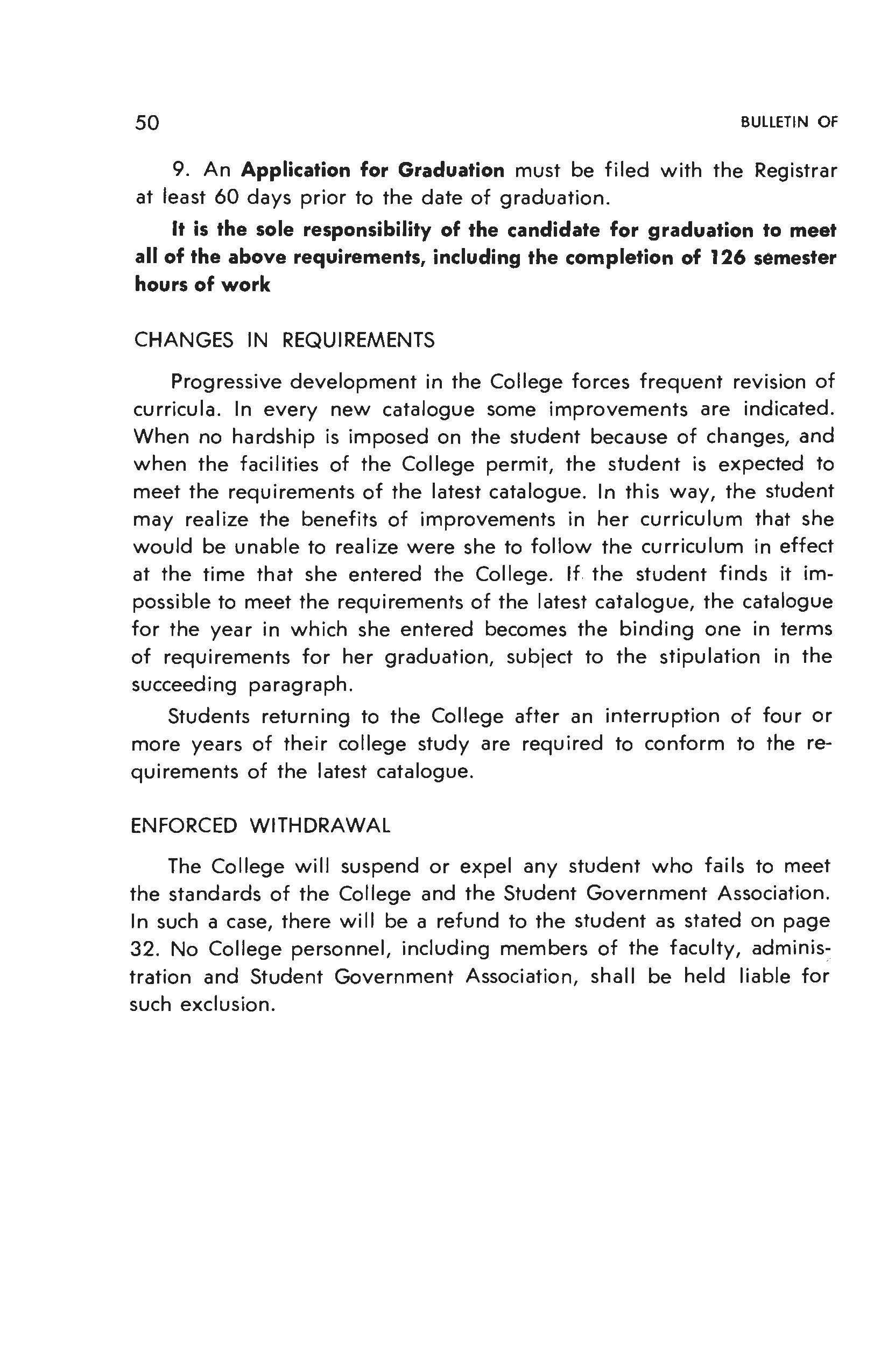
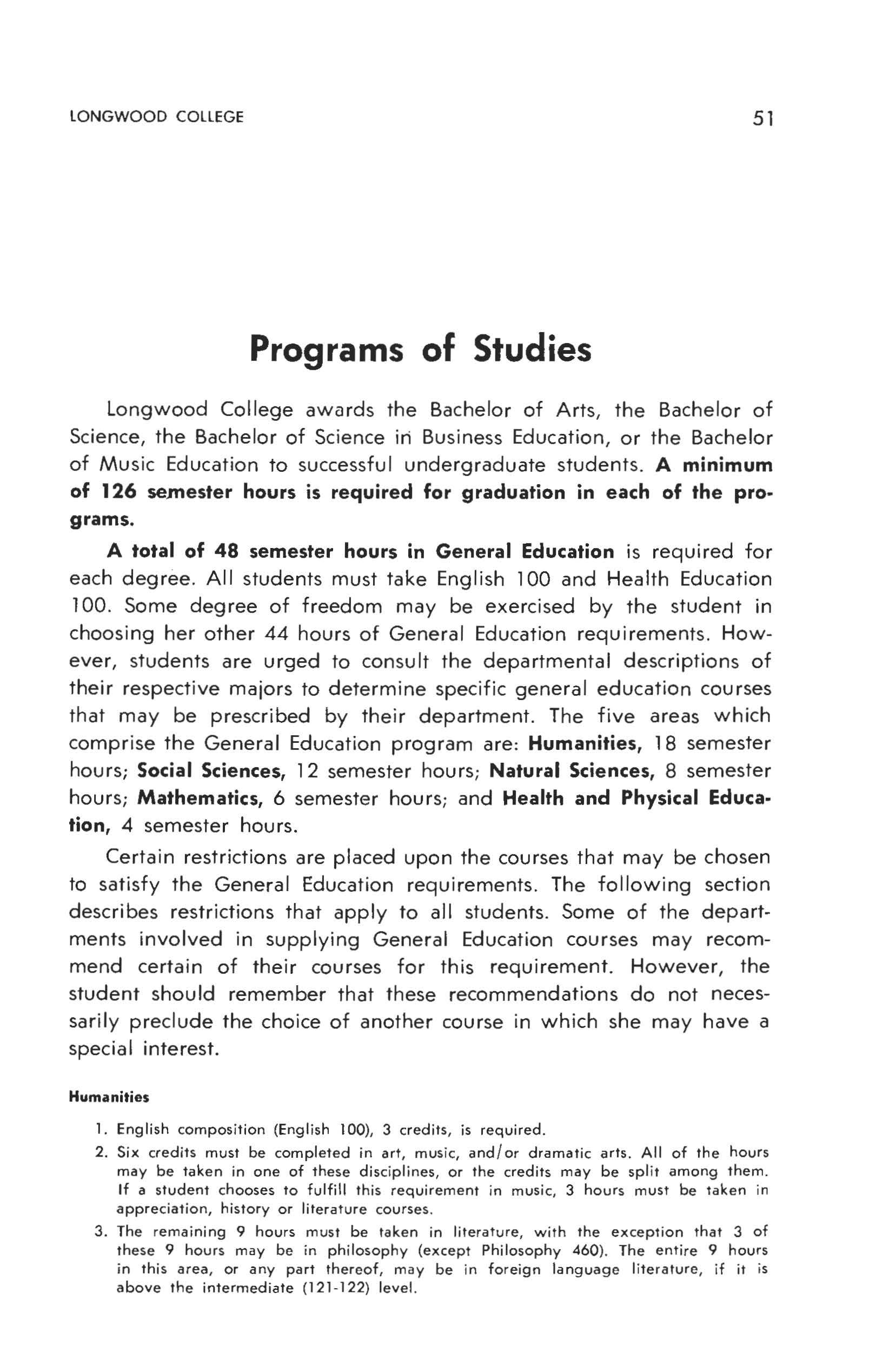
Longwood College awards the Bachelor of Arts, the Bachelor of Science, the Bachelor of Science iri Business Education, or the Bachelor of Music Education to successful undergraduate students. A minimum of 126 semester hours is required for graduation in each of the programs.
A total of 48 semester hours in General Education is required for each degree. All students must take English 100 and Health Education 100. Some degree of freedom may be exercised by the student in choosing her other 44 hours of General Education requirements. However, students are urged to consu It the departmental descriptions of their respective majors to determine specific general education courses that may be prescribed by their department. The five areas which comprise the General Education program are: Humanities, 18 semester hours; Social Sciences, 12 semester hours; Natural Sciences, 8 semester hours; Mathematics, 6 semester hours; and Health and Physical Education, 4 semester hours.
Certain restrictions are placed upon the courses that may be chosen to satisfy the General Education requirements. The following section describes restrictions that apply to all students. Some of the departments involved in supplying General Education courses may recommend certain of their courses for this requirement. However, the student should remember that these recommendations do not necessarily preclude the choice of another course in which she may have a special interest.
1 English composition (English 100), 3 credits, is required.
2. Six credits must be completed in art, music, and/ or dramatic arts All of the hours may be taken in one of these disciplines, or the credits may be spl it among them. If a student chooses to fulfill this requirement in music, 3 hours must be taken in appreciation, history or literature courses.
3 The remaining 9 hours must be taken in literature, with the exception that 3 of these 9 hours may be in philosophy (except Philosophy 460) . The entire 9 hours in this area , or any part thereof, may be in foreign language literature, if it is above the intermediate (121-122) level.
1. American History (History 221 or 222), 3 credits, is required.
2. Nine hours of work must be completed in at least two of the following areas: Anthropology, Economics, Geography, Government, History and Sociology.
1. A four•hour laboratory course in two of the following areas is required: Biology , Chemistry, Geology, Physical Science and Physics
2. Certain combinations are not recommended because of duplication of content. They are: Geology 111 or 112 and Science 102; Physics 101 and Science 101 ; and Chemistry 101 and Science 102
1. Students majoring in elementary education must take Mathematics 123, 124.
2 Mathematics 111•112, Mathematics 161, 162 or Mathematics 261, 262 are available to majors in all other curricula Students majoring in mathematics or one of the Natural Sciences must take Mathematics 161, 162 or 261, 262
1. Health Education 100, 1 credit , is required
2 . Students may complete this requiremen t by taking 3 credits in any physical educa· l ion activ ity course offered by the department. Since ·all studem,; are required to demonstrate their proficiency in swimming for graduation, individuals weak i n this area should elect beginning sw imming as part of the i r physical education r~uire · ment .
Students are urged to consult with their major advisers, their department chairmen, or the Dean of the College before selecting courses to meet these requirements Students are reminded that they may not select courses that have prerequisites without taking the prerequisites; that they may not take courses designated for a particular major unless that is their major; and that they may not take courses bearing numbers more than one class above or below th'eir present class standing (see page 39) .
Those students preparing to teach will take the sequence of courses in Teacher Education. The specific courses to be completed by all prospective teachers are as fo I lows :
Psychology 251, 256 6 semester hours
Education 352, 353, or 354 3 semester hours
Education 357 3 semester hours
Philosophy 460 ··-- 3 semester hours
Education 400,401, or 402 6 semester hours
Total ···-- ·· 21 semester hours
Furthermore, the student majoring in elementary education must take the additional courses indicated by the Department of Education, Psychology and Philosophy in the next section of this catalogue .
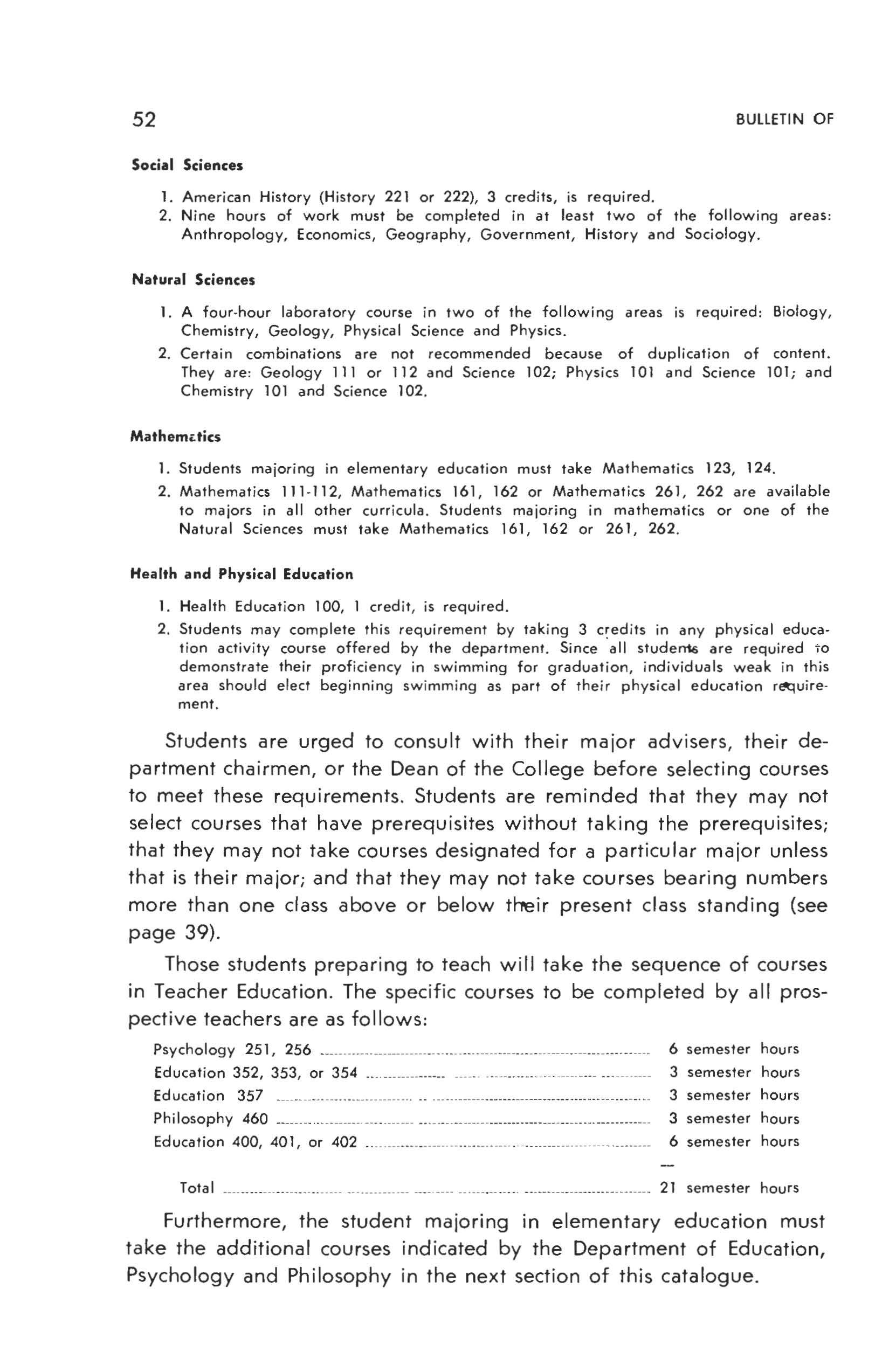
This degree is available to students completing a major program in art, biology, chemistry, economics, English, French, general science, geography, German, government, history, Latin, mathematics, music, physics, social science, sociology, Spanish or speech and dramatic arts.
For those students preparing to teach in one of these areas 12 semester hours in one foreign language must be taken. Other students seeking this degree must take 18 semester hours in one foreign language or 12 semester hours beyond the introductory course and Philosophy 360.
The requirements for a major program vary from 30 to 45 semester hours according to the department being considered. They may be found in the section of the catalogue entitled Departments of Instruction.
The Bachelor of Science degree is available to students who complete a major program in art, biology, chemistry, economics, elementary education, English, general science, geography, government, history, home economics, mathematics, physical education, psychology, physics, social science, sociology or speech and dramatic arts.
For the student preparing to teach there are no additional requirements beyond those in general education and teacher education except as prescribed by the department in which the major program is taken
Students majoring in psychology must include in their general education program 12 semester hours in a foreign language and 8 semester hours in biology.
Other students seeking this degree must take 30 semester hours in the science fields (24 semester hours required of mathematics majors) and 12 semester hours in one foreign language.
The requirements for a major program vary from 30 to 45 semester hours according to the department being considered. They may be found in the section of the catalogue entitled Departments of Instruction.
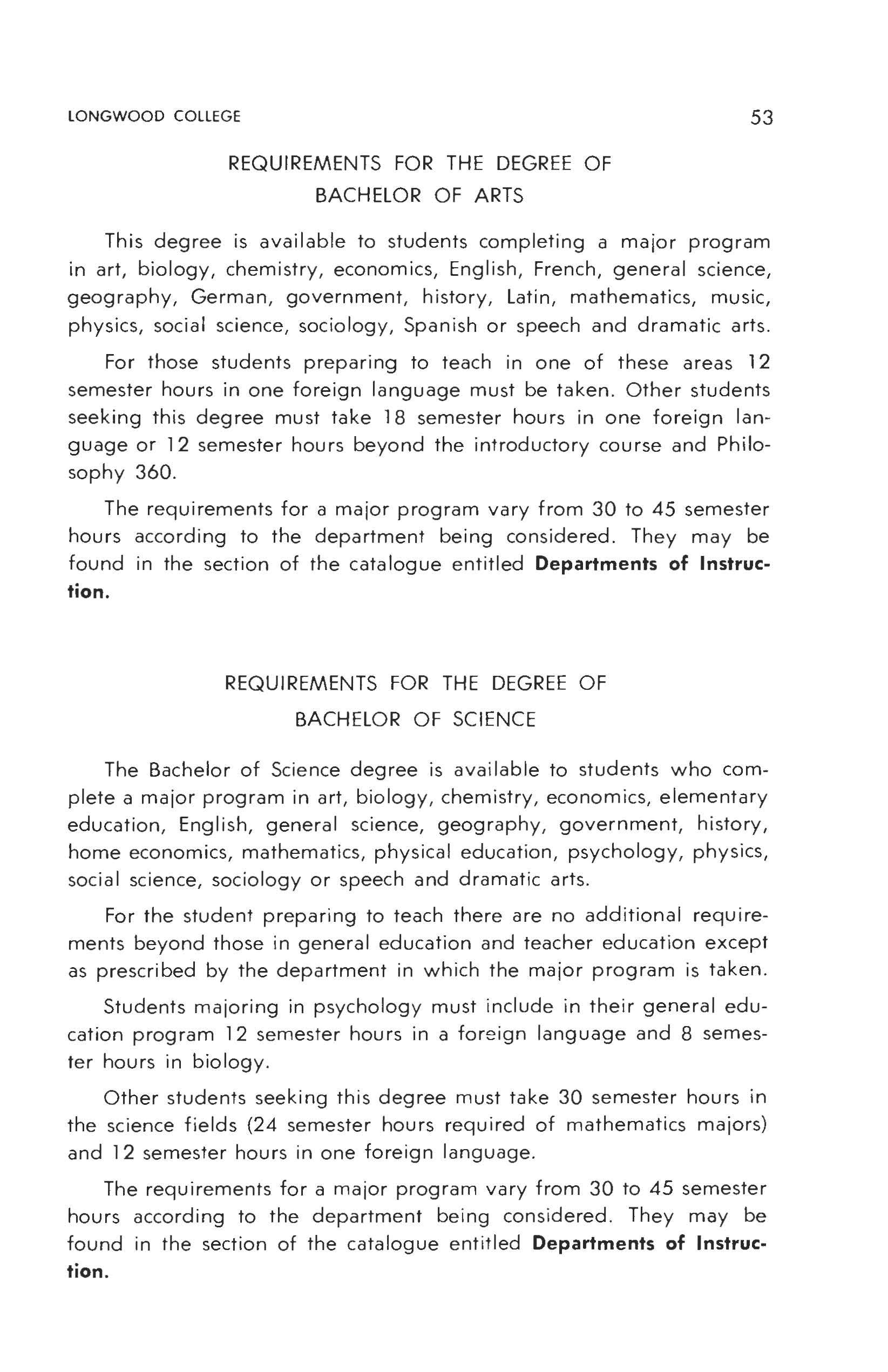
This degree is awarded to students completing a major program in this field as described on page 68 The general education and teacher education requirement s are the same as those for the Bachelor of Science or the Bachelor of Arts degree for those students preparing to teach
The Bachelor of Music Education degree is awarded to students completing a major program in this field as described on page l 03. The general education and teacher education requirements are the same as tho se for the Bachelor of Science or Bachelor of Arts degree for those students preparing to teach
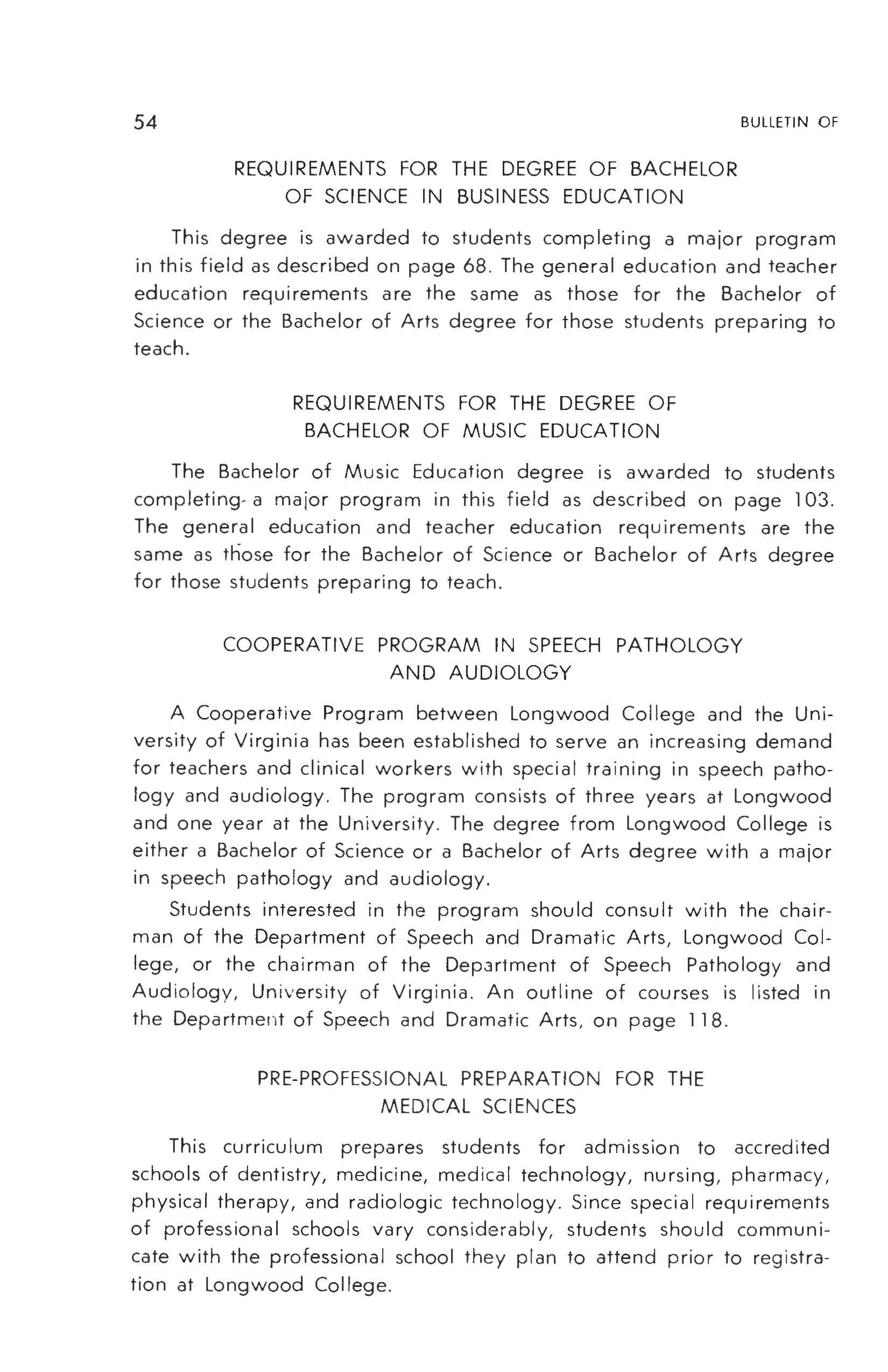
A Cooperative Program between Longwood College and the University of Virginia has been established to serve an increasing demand for teachers and clinical workers with special tra i ning in speech pathology and audiology The program consists of three years at Longwood and one year at the University . The degree from Longwood College is either a Bachelor of Science or a Bachelor of Arts degree with a major in speech pathology and audiology
Students interested in the program should consult with the chairman of the Department of Speech and Dramatic Arts, Longwood College, or the chairman of the DepJrtment of Speech Pathology and Audi o logy, University of Virginia An outline of courses is listed in the Dep a rtme n t of Speech and Dramatic Arts , on page 118
This curriculum prepares students for admission to accredited schools of dentistry, medicine, medical technology, nursing, pharmacy, physical therapy, and radiologic technology. Since special requirements of professional schools vary considerably , students should communicate with the professional school they plan to attend prior to registration at Longwood College.
Longwood College offers several programs in cooperation with medical schools in Virginia. Pre-nursing programs at Longwood fulfill the requirements for the first two years in the degree program at the Medical College of Virginia and the University of Virginia. The threeyear pre-medical technology program fulfills the baccalaureate requirements in this field and the fourth year of professional training may be taken from the medical schools. If the fourth year in medical technology is completed at the University of Virginia, the student is entitled to a B.S. degree from Longwood College . When the fourth year in medical technology is taken at the Med ical College of Virginia , a B.S. degree in Medical Technology is awarded by that institution
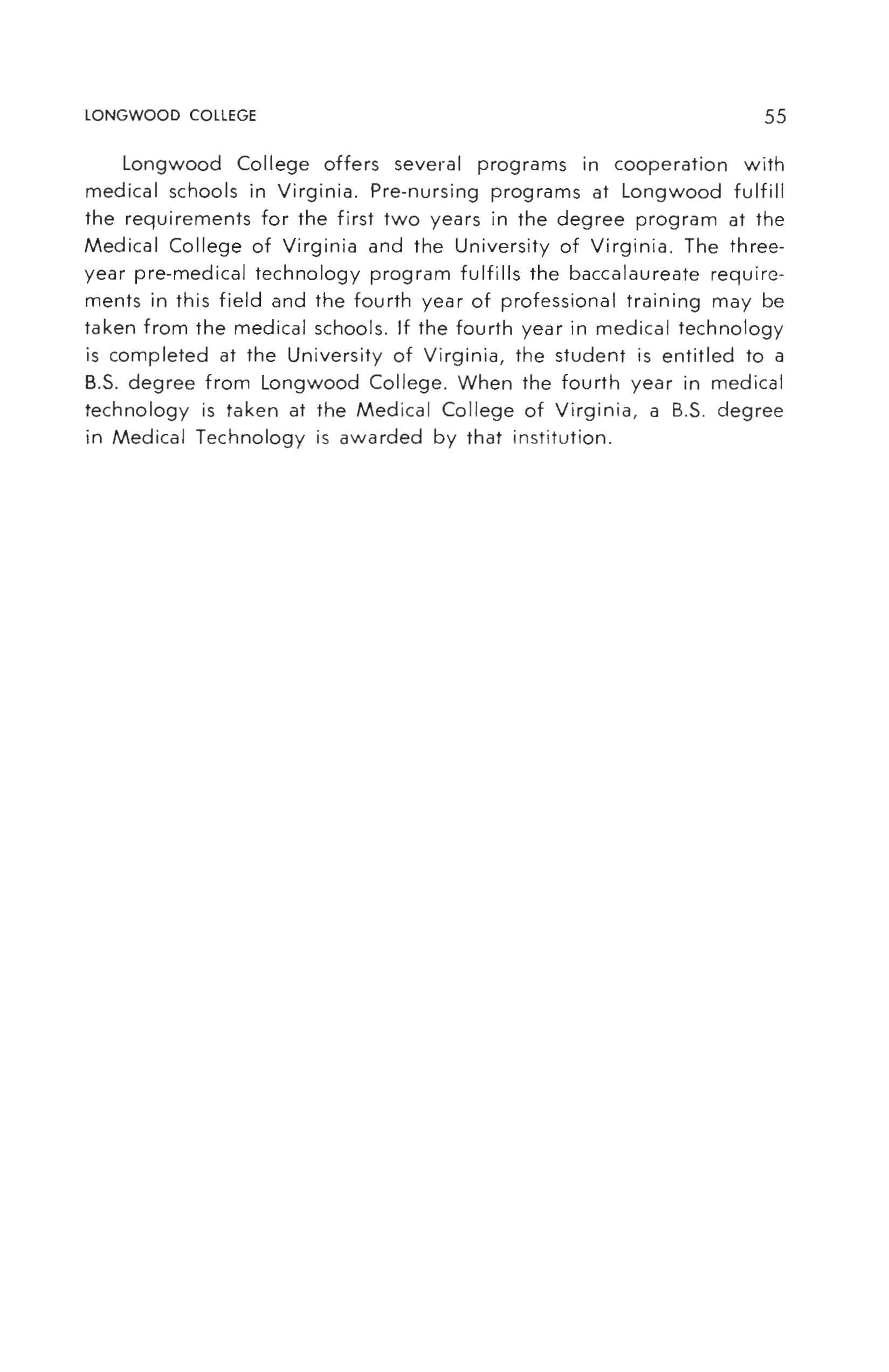

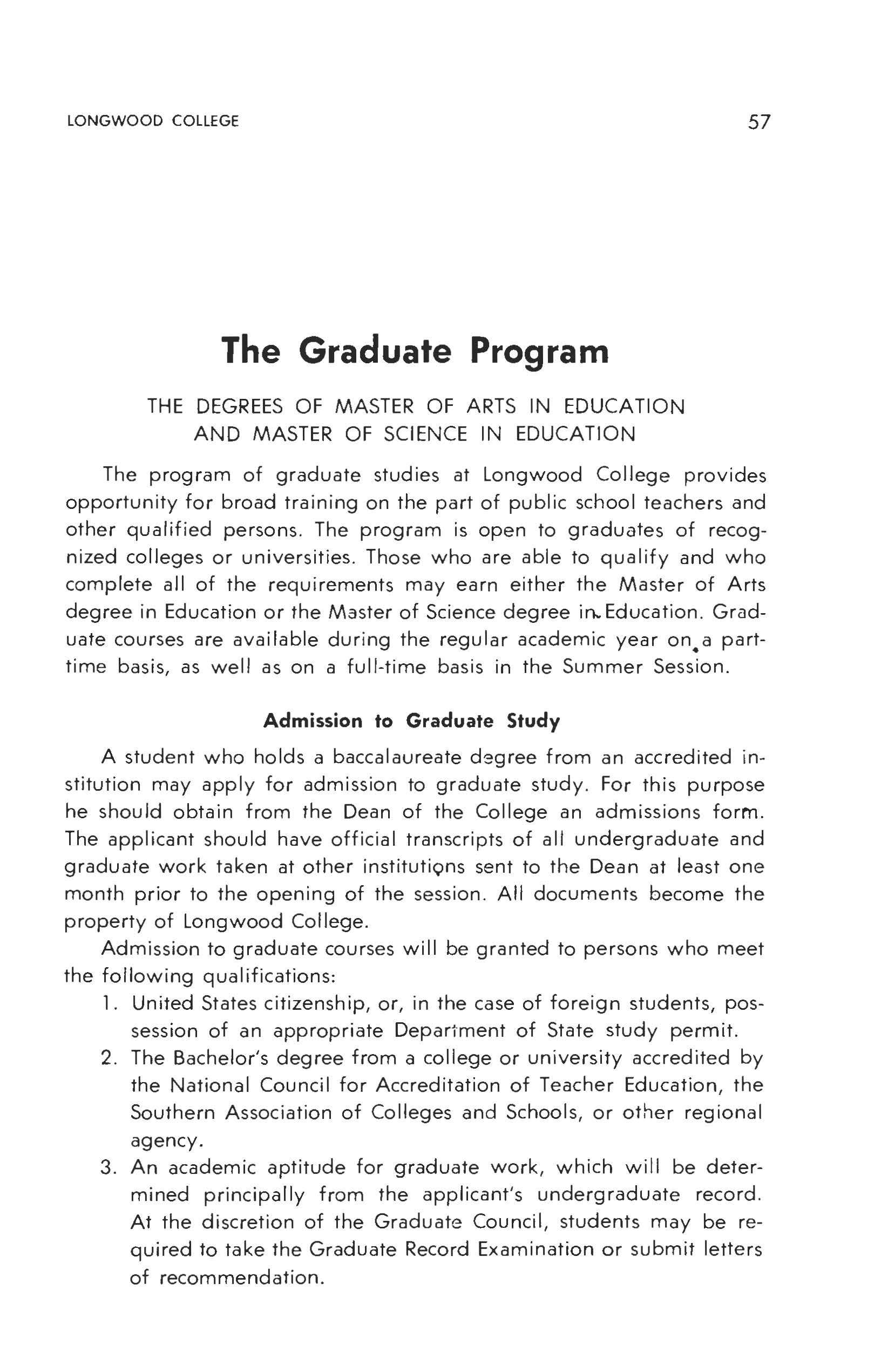
The program of graduate studies at Longwood College provides opportunity for broad training on the part of public school teachers and other qualified persons. The program is open to graduates of recognized colleges or universities. Those who are able to qualify and who complete all of the requirements may earn either the Master of Arts degree in Education or the Master of Science degree in. Education. Graduate courses are available during the regular academic year on.a parttime basis, as well as on a full-time basis in the Summer Session.
A student who holds a baccalaureate degree from an accredited institution may apply for admission to graduate study. For this purpose he should obtain from the Dean of the College an admissions form. The applicant should have official transcripts of all undergraduate and graduate work taken at other instituti<;>ns sent to the Dean at least one month prior to the opening of the session. All documents become the property of Longwood College.
Admission to graduate courses will be granted to persons who meet the following qualifications:
1. United States citizenship, or, in the case of foreign students, possession of an appropriate Department of State study permit.
2. The Bachelor's degree from a college or university accredited by the National Council for Accreditation of Teacher Education, the Southern Association of Colleges and Schools, or other regional agency.
3. An academic aptitude for graduate work, which will be determined principally from the applicant's undergraduate record. At the discretion of the Graduate Council, students may be required to take the Graduate Record Examination or submit letters of recommendation.
The following applicants may be admitted conditionally:
a. Applicants for whom all of the necessary entrance information has not yet been received and approved by the Graduate Council.
b . Students whose undergraduate records are not entirely satisfactory or who show minor deficiencies in their major fields.
c Capable students in their senior year at Longwood College, who may take up to six hours of graduate level courses over and above their undergraduate degree requirements
d. Mature persons who have special or personal interest not covered by the above
The conditional status, however, should be regarded as temporary, and the students should seek to remove all conditions as soon as possible .
The special requirements of the several College depar~ments are designed to insure that the student is able to take advantage of the opportunities provided for advanced study These requirements relate as a rule to the completion of certain undergraduate "prerequisites" but may include satisfactory performance on aptitude or achievement tests. Details will be furnished by the department.
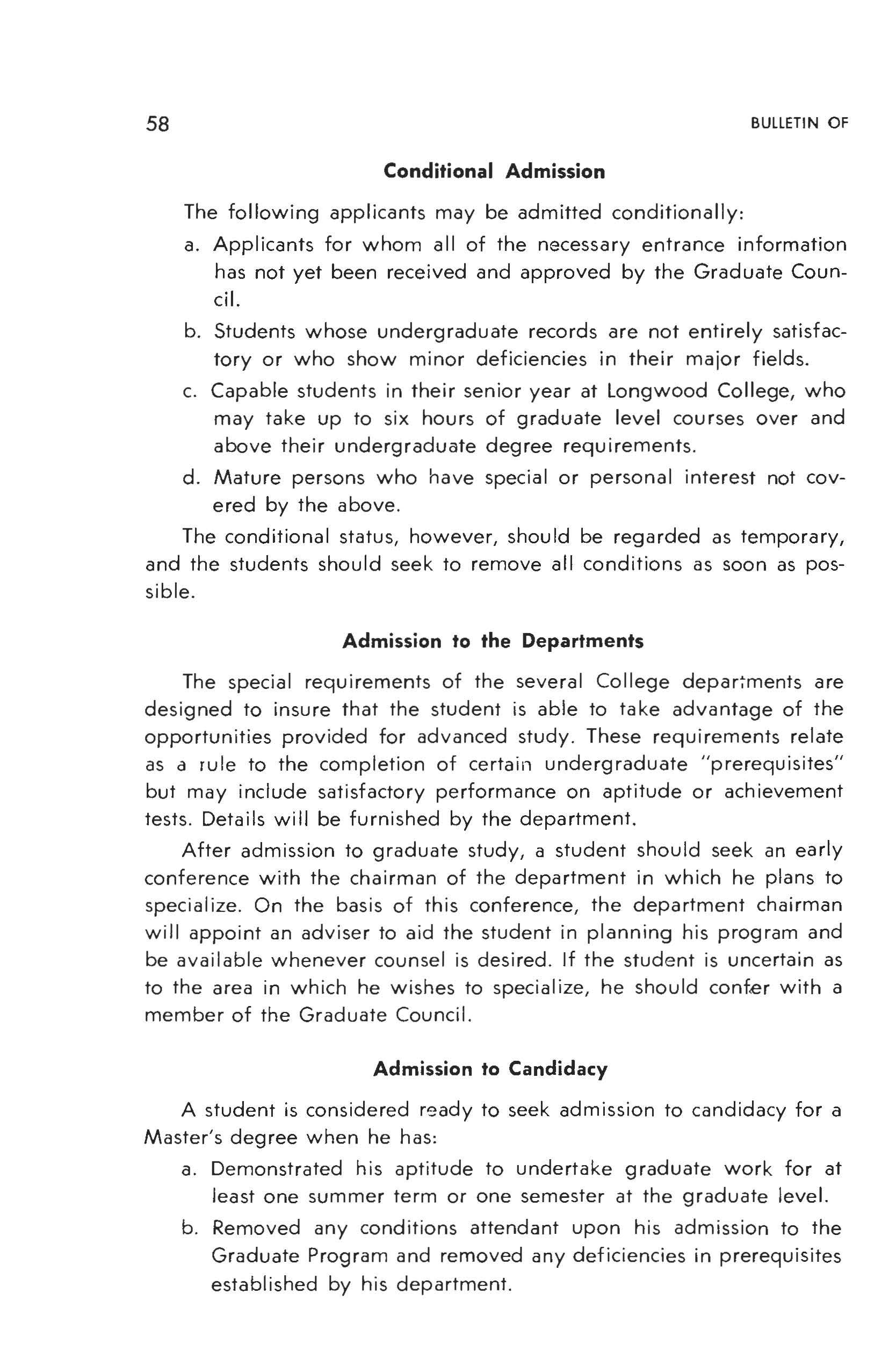
After admission to graduate study, a student should seek an early conference with the chairman of the department in which he plans to specialize. On the basis of this conference, the department chairman will appoint an adviser to aid the student in planning his program and be available whenever counsel is desired If the student is uncertain as to the area in which he wishes to specialize, he should confer with a member of the Graduate Council.
A student is considered ready to seek admission to candidacy for a Master's degree when he has :
a Demonstrated his aptitude to undertake graduate work for at least one summer term or one semester at the graduate level.
b. Removed any conditions attendant upon his admission to the Graduate Program and removed any deficiencies in prerequisites established by his department.
c. Formulated a program of study approved by the student's adviser .
d. Satisfied other requirements of the College.
The Master's degree program in certain areas provides that a candidate may either:
A. Complete 24 semester hours and a thesis (required by the Department of English), or
B. Complete 30 semester hours of credit without a thesis.
In plan "B," the candidate must hold, or be eligible for, the Collegiate Professional Certificate.
A major consists of 18 semester hours in a field of concentration, or 12 semester hours of work and a thesis Nine semester hours of work in teacher education are required in all degree programs. These nine semester hours of work include Education 571, Education 68 l and Psychology 622. The additional three hours credit may be elected from any subject of the student's choice. However, if the candidate is a teacher in an elementary school and holds, or is eligible for, the Collegiate Professional Certificate, courses in the major will be distributed among the areas of language arts, mathematics, general science, social studies, and fine and applied arts. Elementary teachers not holding the Collegiate Professional Certificate must earn an additional six semester hours through an internship at the elementary level. The candidate for a degree must attain a B average on all courses taken . A grade below C will not be accepted toward a graduate degree but will count toward the grade point average.

The number of departments prepared to offer a graduate majo;will be expanded as rapidly as possible For the present, courses leading to the degree of Master of Arts in Education may be taken when the major is English or history
For the degree of Master of Science in Education, the corresponding choice is restricted to Education.
Students interested in commencing work in any of the foregoing fields should confer with the Head of the Department concerned.
Students expecting to graduate without submitting a thesis take an essay form of written examination, not to exceed 3 hours' duration, covering the student's major field of study . A student must have completed 24 semester hours of work with a "B" average before taking this examination This examination is designed to evaluate competency in written expression, ability to reason within an area, and the ability to apply information This examination will be administered by the Graduate Council in January, May and August
A student failing this examination may take it a second time at the next regularly scheduled time. Failure for the second time will be final, and the student will be dropped from the graduate program.
A student electing to do a thesis (Plan A) is, in general, exempted from taking the comprehensive written examination. An oral examination is required as a defense of the thesis. The Graduate Council may require a written comprehensive examination if it is recommended by the Head of the Department of the student's major field.
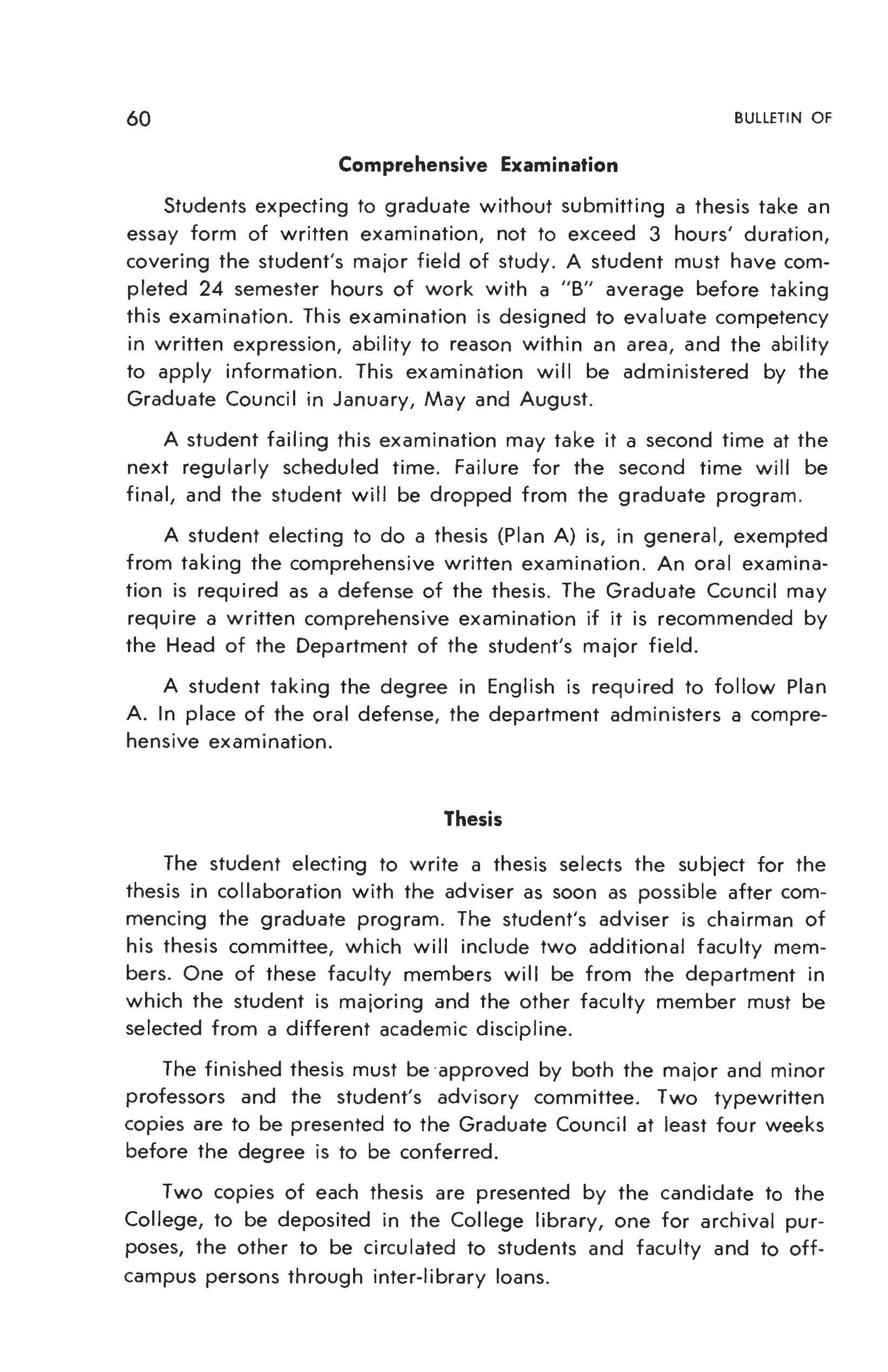
A student taking the degree in English is required to follow Plan A. In place of the oral defense, the department administers a comprehensive examination.
The student electing to write a thesis selects the subject for the thesis in collaboration with the adviser as soon as possible after commencing the graduate program. The student's adviser is chairman of his thesis committee, which will include two additional faculty members. One of these faculty members will be from the department in which the student is majoring and the other faculty member must be selected from a different academic discipline.
The finished thesis must be approved by both the major and minor professors and the student's advisory committee. Two typewritten copies are to be presented to the Graduate Council at least four weeks before the degree is to be conferred.
Two copies of each thesis are presented by the candidate to the College, to be deposited in the College library, one for archival purposes, the other to be circulated to students and faculty and to offcampus persons through inter-library loans.
The candidate for the graduate degree pays the binding fee for the two copies of the thesis in the Business Office at the time the diploma fee is paid. Arrangements for these bindings are made by the Librarian.
Normal residence requirements of one academic year or its equivalent may be reduced by transfer to a minimum of twenty-four semester hours.
Students with undergraduate deficiencies may find it necessary to take more than the normal time to complete requirements .
Transfer of credit from another institution is permitted up to 6 credit hours, provided the courses have been taken in residence at the institution

Graduate courses are of two categories: 500-courses are for graduate and advanced undergraduate students while 600-courses are for graduate students only.
Twelve credit hours per semester constitute a normal load during the academic year For permission to carry more than this the student may pet i tion the Graduate Council. If the student is already employed, the normal load is 3 semester hours : permission to carry more than 3 semester hours during one semester must therefore be obtained from the Graduate Council.
The work for a graduate degree is to be completed within seven years after commencing such work An extension of this time-limit is permissible only upon the consent in writing of the Graduate Council.
A student planning to graduate on a certain date must file with the Dean of the College an application for a graduate degree at least 60 days before the degree is to be conferred.
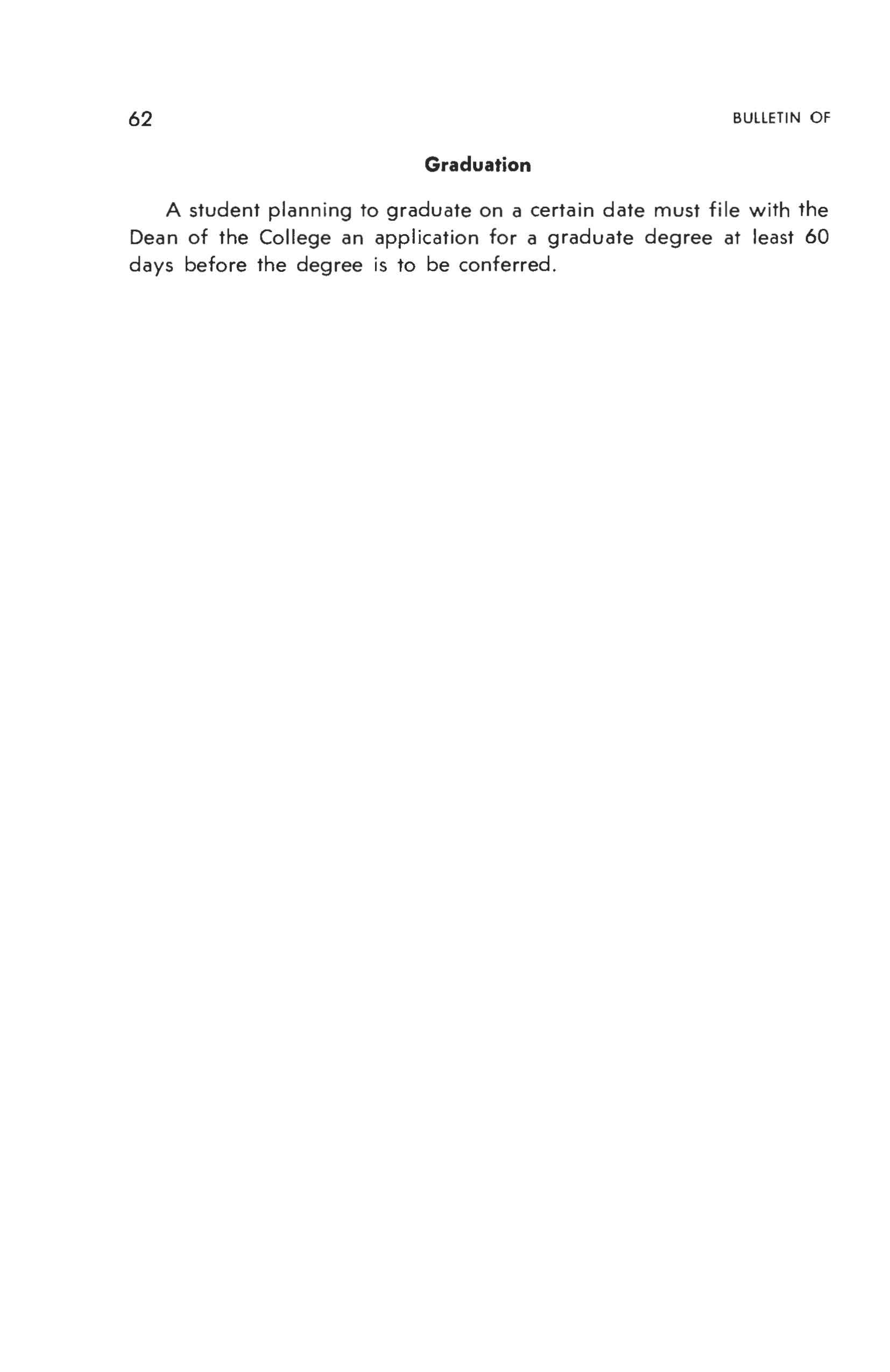
Instruction in the College is offered by the departments described in this section of the catalogue. Included in the description of each department are the requirements for a major therein and the courses which it offers.

Numerous cou~='='~ in most departments have prerequisites. These will be noted in ihe descriptions of the courses. For the method of course numbering see page 39. Courses with numbers divided by commas, such as l l l, 11 2 are semester courses. This means that the College gives credit toward a degree for the satisfactory completion of one semester of the course even though the student may not enroll in it for the other semester. Courses in which the numbers are hyphenated, such as 111-112 are year courses. In these, the College grants credit toward a degree only upon the successful completion of both semesters of work. There are no exceptions to this regulation.
The honors program was inaugurated by the College in 1930 to enable capable students to study intensively a subject of their choice, thereby becoming acquainted with methods of research, organization of materials, and the presentation of results in a scholarly manner. Such intensive study st i mu I ates initiative, resourcefulness, and original thought. Students in all departments are eligible to participate in this program. The program is administered by the Honors Committee.
Under this plan, the student is directed in creative research by an instructor who has specialized in the field and who acts as her sponsor. A student interested in honors courses should submit a brief outline describing her projected research to the chairman of the department in which the work is to be done. The project sponsor will present her application together with written permission from the department chairman to the Honors Committee for approval.
With the approval of the Honors Committee, the student may enroll in honors courses numbered 498 and 499 in the department in which
the honors work is done (i.e., an honors course in English would be registered as English 498). Three semester hours credit are granted for each course. Approval of the Honors Committee normally is given in the first semester of the junior year, and the student formally registers for the honors courses in the next two semesters. However. other schedules may be approved.
Upon completion of the research, the student compiles the results in a formal paper. The sponsor then assigns a grade for the work done. A student earning no less than B is eligible to appear before an examining board well qualified to judge the excellence of her work. The Committee, assisted by the sponsor, selects a three-member examining board which conducts an oral examination or such other examination as may be appropriate for the subject, e.g., in art or music. The examinations are approximately one hour in length and are usually scheduledfor the second semester of the senior year.
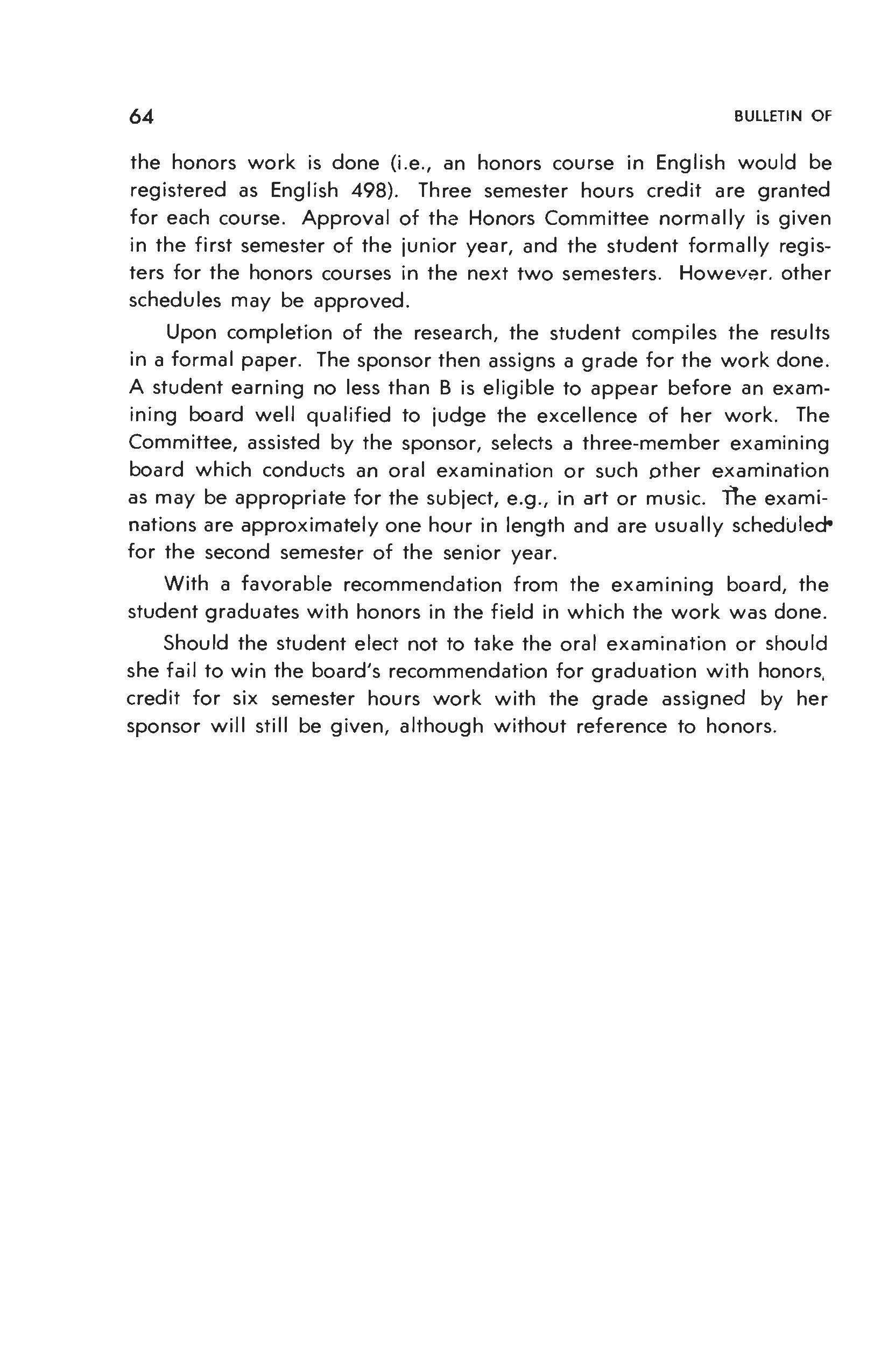
With a favorable recommendation from the examining board, the student graduates with honors in the field in which the work was done.
Should the student elect not to take the oral examination or should she fail to win the board's recommendation for graduation with honors, credit for six semester hours work with the grade assigned by her sponsor will still be given, although without reference to honors.
Barbara L. Bishop, Chairman
Miss Bedford, Miss Flynn, Miss Leitch, Mrs. Lemen, Miss Ross, Mr Rouillard, Mr. Springer
The Department of Art offers courses for General Education and for Art Majors including all of the major and minor studio arts and Art History.
A ma1or in Art leading to the Collegiate Professional Certificate for teaching at the secondary level requires the following :
Design 120 ___ 3 credits
Drawing 130 __ 3 credits
Graphics 150 __ 3 credits Ceramics 213 _ 3 credits Painting 270 _ 3 credits
Crafts 311 or 313 _____________ 3 credits Sculpture 381,382 ___ _ _ 6 credits
Art History 261, 262, 361, 362 _ _ ___ 6 credits Art Education 441 _ _ __ _ __ _ ___ 2 credits
Six additional credits are to be chosen from courses offered in Design, Drawing, Graphics, Painting, and Art History, making a total of 38 credits . Art Majors in the Liberal Arts program may omit Art 441 in favor of an Art elective. It is desirable that majors elect Philosophy 381, Aesthetics.
The following courses are acceptable in General Education: Art 110, 120, 130, 150, 160, 220, 261, 262, 270, 361, 362; all others are also acceptable when prerequisites are met as specified in course descriptions, except Art 341-342, 355, 441, and 49 l.
Beginning in the spring semester of 1971, Junior Art Majors will be required to present an annual exhibition of work completed at Longwood College. The Art Department Staff reserves the privilege of retaining student work for educational purposes.
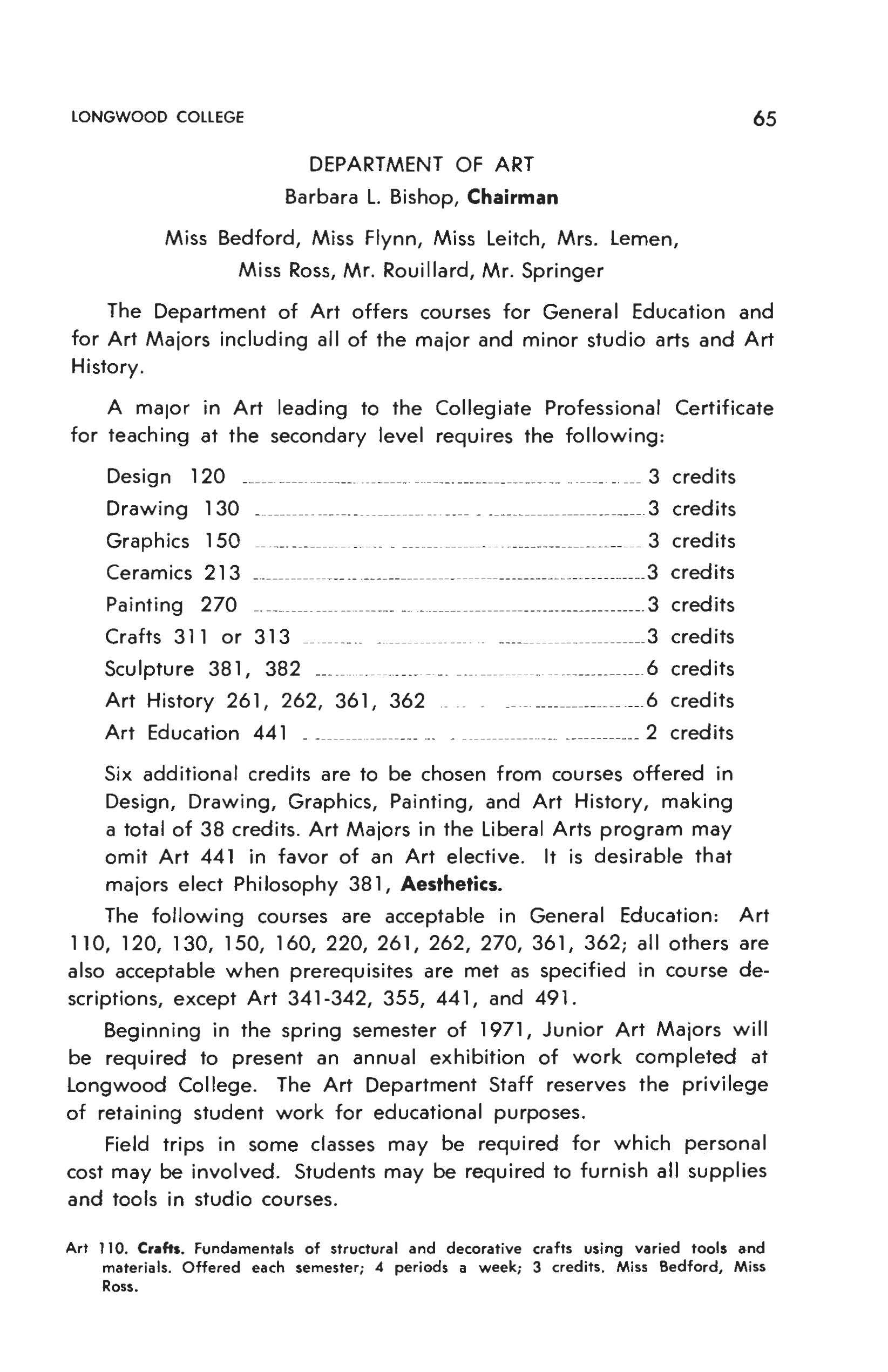
Field trips in some classes may be required for which personal cost may be involved. Students may be required to furnish all supplies and tools in studio courses
Art 110. Crafts. Fundamentals of structural and decorative crafts using varied tools and mater ials . Offered each semester ; 4 periods a week; 3 credits. Miss Bedford, Miss Ross
Art 120. Basic Design. Understanding the basic principles ~nd elements of design through inquiry into the sources and terms of creative expression in two and three dimensions. Offered each semester; 6 periods a week; 3 credits. Miss Bishop, Mr. Springer.
Art 130. Drawing and Composition . Fundamentals of drawing, composition and illustration in various media and techniques. Offered each semester; 4 periods a week; 3 credits. Miss Leitch, Mr. Rouillard, Mr. Springer.
Art 150. ·Fundamental of Printmaking. Exploration of tradition and experimental printmaking concepts, processes and materials. Offered each semester; 4 periods a week; 3 credits. Miss Bishop.
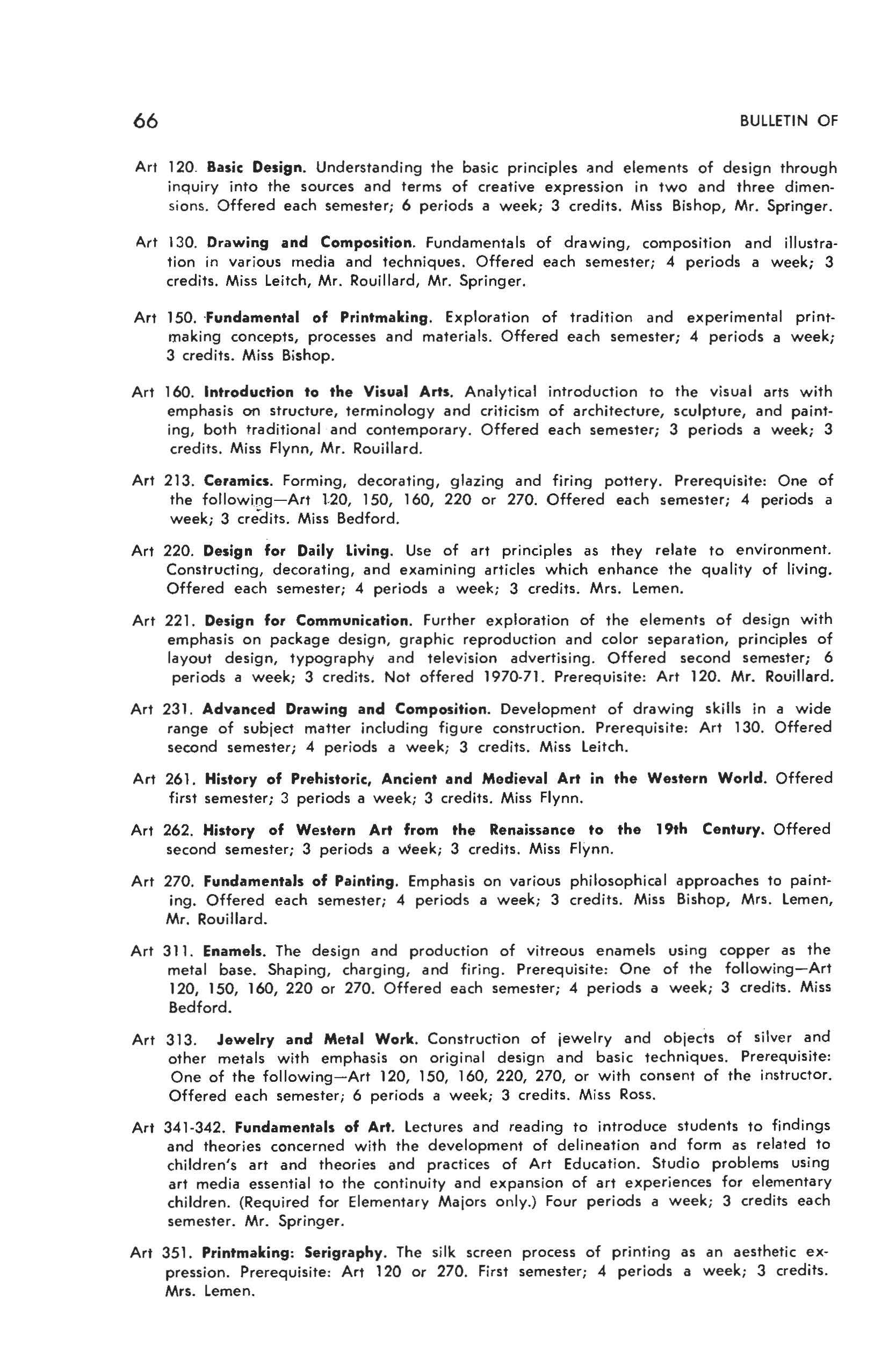
Art 160. Introduction to the Visual Arts. Analytical introduction to the visual arts with emphasis on structure, terminology and criticism of architecture, sculpture, and painting, both traditional and contemporary Offered each semester; 3 periods a week; 3 credits. Miss Flynn, Mr. Rouillard
Art 213. Ceramics. Forming, decorating, glazing and firing pottery. Prerequisite: One of the following-Art 1.20, 150, 160, 220 or 270. Offered each semester; 4 periods a week; 3 credits. Miss Bedford.
Art 220. Design for Daily living. Use of art principles as they relate to environment. Constructing, decorating, and examining articles which enhance the quality of living. Offered each semester; 4 periods a week; 3 credits. Mrs. Lemen.
Art 221 Design for Communication. Further exploration of the elements of design with emphasis on package design, graphic reproduction and color separation, principles of layout design, typography and television advertising. Offered second semester; 6 periods a week; 3 credits. Not offered 1970-71. Prerequisite: Art 120. Mr. Rouillard
Art 231. Advanced Drawing and Composition. Development of drawing skills in a wide range of subject matter including figure construction. Prerequisite: Art 130 Offered second semester; 4 periods a week; 3 credits. Miss Leitch.
Art 261. History of Prehistoric, Ancient and Medieval Art in the Western World. Offered first semester; 3 periods a week; 3 credits. Miss Flynn.
Art 262. History of Western Art from the Renaissance to the 19th Century. Offered second semester; 3 periods a week; 3 credits. Miss Flynn.
Art 270 . Fundamentals of Painting. Emphasis on various philosophical approaches to painting. Offered each semester; 4 periods a week; 3 credits. Miss Bishop, Mrs. Lemen, Mr. Rouillard.
Art 311 . Enamels. The design and production of vitreous enamels using copper as the metal base. Shaping, charging, and firing. Prerequisite: One of the following-Art 120, 150, 160, 220 or 270. Offered each semester; 4 periods a week; 3 credits. Miss Bedford
Art 313. Jewelry and Metal Work. Construction of jewelry and objecis of silver and other metals with emphasis on original design and basic techniques. Prerequisite: One of the following-Art 120, 150, 160, 220, 270, or with consent of the instructor. Offered each semester; 6 periods a week; 3 credits. Miss Ross
Art 341-342. Fundamentals of Ari. Lectures and reading to introduce students to findings and theories concerned with the development of delineation and form as related to children's art and theories and practices of Art Education. Studio problems using art media essential to the continuity and expansion of art experiences for elementary children . (Required for Elementary Majors only .) Four periods a week ; 3 credits each semester. Mr. Springer
Art 351 Printmaking: Serigraphy. The silk screen process of printing as an aesthetic expression. Prerequisite : Art 120 or 270. First semester; 4 periods a week; 3 credits. Mrs. Lemen.
Art 352. Printmaking : Relief and Intaglio. Print production as a medium of original ex pression involving processes of relief and intaglio . Prerequis ite : Art 120 or 130 . Second semester ; 6 periods a week ; 3 credits Miss Ross.
Art 355. Fundamentals of Photography. Study of the fundamental techniques of the camera and its relation to the field of design and visual communications. Offered second semester One lecture and one studio period a week; 2 credits. Open to art majors only.
Art 361 . History of Western Art of the 19th and 20th Centuries. Offered first semester ; 3 periods a week ; 3 credits . Miss Flynn .
Art 362. History of American Art Offered second semester; 3 periods a week; 3 credits . Miss Flynn .
Art 371. Painting : Oil. Prerequisite: Art 270 or equivalent. Offered each semester ; 6 periods a week; 3 credits, Mrs. Lemen.
Art 372 , Painting : Watercolor . Prerequisite : Art 270 or equivalent . Offered second semester ; 6 periods a week ; 3 credits Mrs Lemen
Art 381. Sculpture . Fundamental problems in the understanding of sculptural form through laboratory experiences and related visual study . Use of varied media and tools . Prerequisite : Art 130. Offered each semester; 6 periods a week ; 3 credits Miss Leitch
Art 382 Advanced Sculpture Further exploration of materials and form One problem requiring greater depth of study Emphasis on adaption of course content to second ary art teach i ng . Sl ides and film supplements. Offered second semester; 4 periods a week; 2 credits Mr. Springer.
Art 441. The Teaching of Art. A study of contemporary practices and the examination of secondary art curriculum materials . Second eight weeks of each semester; 4 periods a week; 2 credits Mr. Hathaway
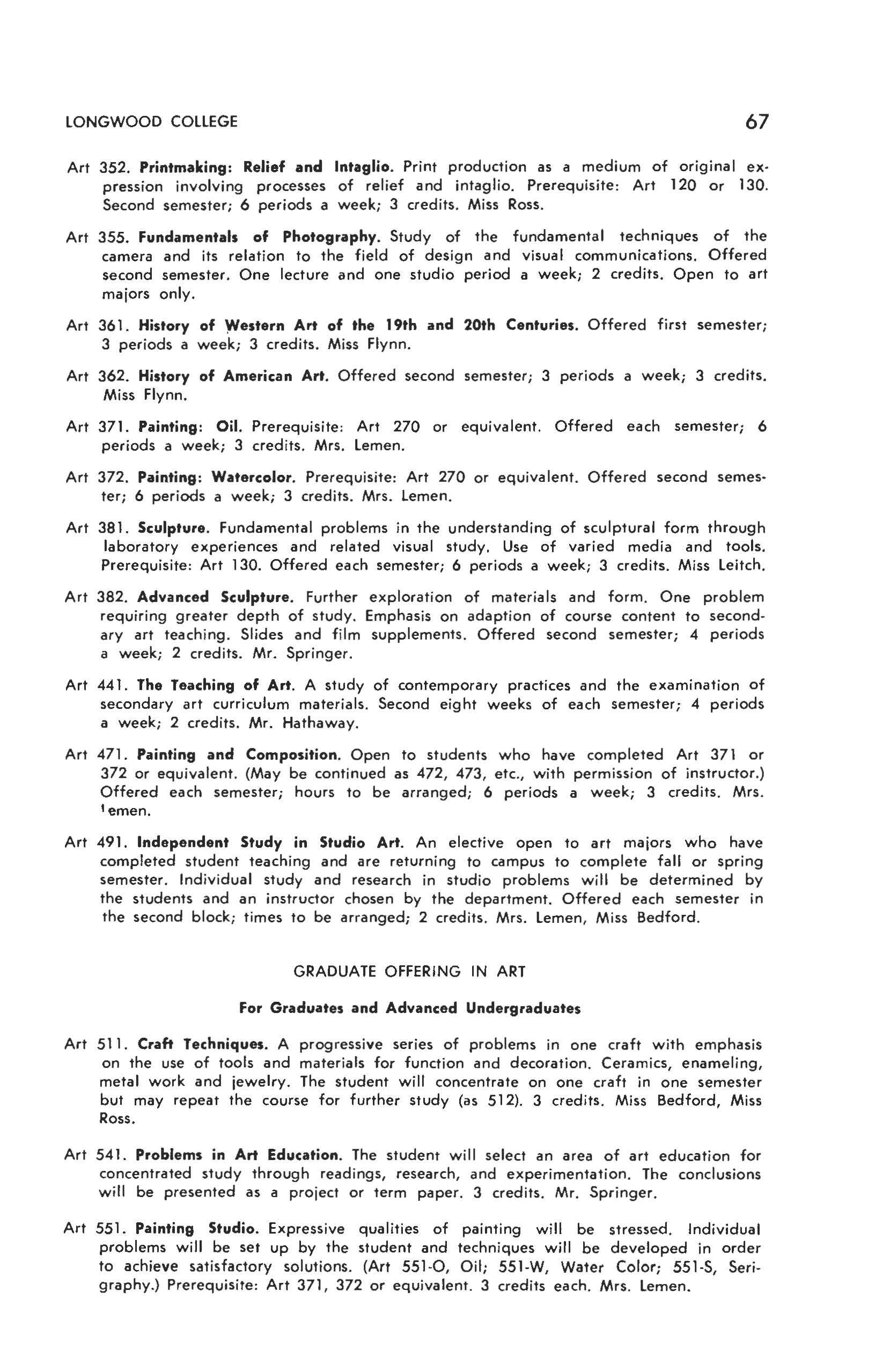
Art 471 . Painting and Composition . Open to students who have completed Art 371 or 372 or equivalent. (May be continued as 472 , 473 , etc., w ith permission of instructor ) Offered each semester; hours to be arranged ; 6 periods a week; 3 credits Mrs 1 emen.
Art 491. Independent Study in Studio Art. An elective open to art majors who have completed student teaching and are returning to campus to complete fall or spring semester Individual study and research in stud io problems will be determined by the students and an instructor chosen by the department Offered each semester in the second block ; times to be arranged; 2 credits . Mrs. Lemen, M iss Bedford .
Art 511 Craft Techniques . A progress ive series of problems in one craft with emphasis on the use of tools and mater ials for function and decoration. Ceramics, enameling, metal work and jewelry. The student will concentrate on one craft in one semester but may repeat the course for further study (as 512). 3 credits Miss Bedford, Miss Ross.
Art 541. Problems in Art Education . The student w ill select an area of art education for concentrated study through r eadings, research, and experimentation The conclus ions will be presented as a project or term paper. 3 credits Mr Springer
Art 551. Painting Studio. Expressive qualities of painting will be stressed. Individual problems will be set up by the student and techniques will be developed in order to achieve satisfactory solutions (Art 551-0, Oil; 551-W, Water Color; 551-S , Seri graphy ) Prerequisite: Art 371 , 372 or equivalent 3 credits each Mrs. Lemen.
Art 621. Special Studies in History of Art. A seminar consisting of individual research and group presentation and discussion. Concentration will be on a particular artist, period, school or movement in art and art theory according to the need and interest of the student. Prerequisite: One year of history of western art or equivalent. 3 credits. Miss Flynn.
Willard G. Leeper, Acting Chairman
Mrs. Hamlett, Mr. Myers, Mrs. Taliaferro
The Department of Business Education offers courses leading to the Bachelor of Science in Business Education which qualifies graduates to teach business subjects in secondary schools and to hold positions in office administration. The requirements for this degree are as follows:
Business Education 45 semester hours General Education (see p. 51) _________ 48 semester hours
* Professional education (see p. 52) 27 semester hours Electives 6 semester hours
Total hours required __ 126
The Department offers courses that lead to specific endorsements in the following areas: Stenography, General Office Procedures, Accounting, Economics, and Basic Business.
Business Education 121. Elementary Typewriting. Emphasis on accuracy, carriage throw, and other correct techniques Introduction to basic correspondence and elementary statistical copy. First and second semesters; 3 periods a week; 3 credits. Mr. Myers.
Business Education 131. Elementary Shorthand. Mastery of Gregg Shorthand principles; reading and writing practice necessary for skill development in taking dictation. Introduction to letter transcription at the typewriter. Prerequisite: Bus. Ed. 121 or equivalent. Second semester; 5 periods a week; 3 credits. Mr. Myers.
Business Education 221. Intermediate Typewriting. Prerequisite: Business Education 121 or equivalent. Development of proficiency in producing business .correspondence, statistical reports, and legal documents through the use of modern laboratory materials. First and second semesters; 3 periods a week; 3 credits. Mrs. Hamlett, Mrs. Taliaferro.
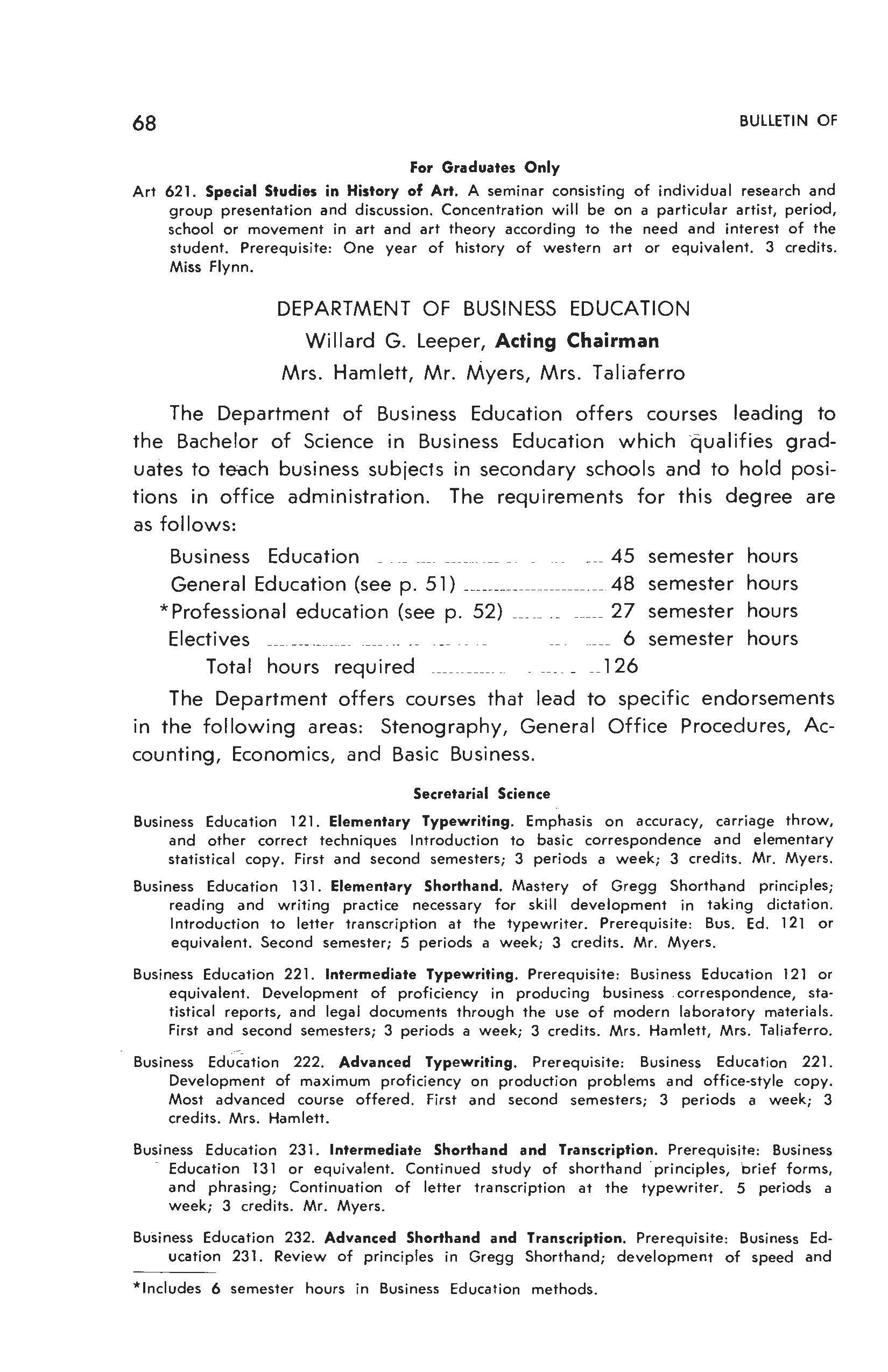
Business Education 222. Advanced Typewriting. Prerequisite: Business Education 221. Development of maximum proficiency on production problems and office-style copy. Most advanced course offered. First and second semesters; 3 periods a week; 3 credits. Mrs. Hamlett.
Business Education 231. Intermediate Shorthand and Transcription. Prerequisite: Business Education 131 or equivalent. Continued study of shorthand principles, brief forms, and phrasing; Continuation of letter transcription at the typewriter. 5 periods a week; 3 credits. Mr. Myers.
Business Education 232. Advanced Shorthand and Transcription. Prerequisite: Business Education 231. Review of principles in Gregg Shorthand; development of speed and *Includes 6 semester hours in Business Education methods.
accuracy in taking dictation. Brief forms, phrasing, and enlargement of shorthand vocabulary are stressed; students motivated to attain maximum levels of achievement. Most advanced course offered. First and second semesters; 5 periods a week; 3 credits Mrs Hamlett.
Business Education 453 Secretarial Procedures. Designed to coordinate the various secretarial skills into a high-level secretarial proficiency ; special emphasis on the coordination of these skills with the human relations aspect of office procedures First semester; 3 periods a week ; 3 cred its . Mrs . Hamlett .
Business Education 241-242. Elementary Accounting. Theory of debits and credits; journalizing and posting Use of special journals and ledgers. The trial balance, work sheet, business statements, and adjusting and closing entries. Accounting for notes and interest, prepaid, unearned and accrued items, asset valuation, payrolls, and taxes Partnership and corporation accounts. Practice sets. First and second semesters; 4 periods a week; 3 credits each semester. Mr Leeper.
Business Education 343 Intermediate Accounting . Survey of basic accounting principles ; working capitdl , noncurrent items, and corporate capital. Concepts of profit and loss measurement and analytical processes of statement pn;,paration Prerequisite : Business Education 241-242 . First semester; 3 periods a week; 3 credits . 'Mr . Leeper .
Business Education 344 . Income Taxes and Payroll Accounting . Practical problem~ leading to filing of acceptable income tax returns to the United States Internal Revenue Service and to the State of Virginia Practical problems for social security benefits and payroll tax deductions, required accounting records. Prerequisite : Business Education 241-242. Second semester; 3 periods a week; 3 credits. Mr. Leeper
Business Education 151 General Business. Intended to provide a broad but firm foundation in business, upon which advanced business courses can build. The course ai111s to help the student understand the business world, to outline the philosophy , objectives and responsibilities of business in relation to its environment , and to give some direction and motivation in making a ,vocational choice Offered first semester; 3 periods a week ; 3 credits. Mrs Taliaferro.
Business Education 251. Retailing Principles and Practices . Retail store organization and management, personnel, buying, selling, sales campaigns, and inventories Offered second semester; 3 periods a week; 3 credits
Business Education 252. Business Machines . Provides operative training on common types of ten-key and full-keyboard, manual and electric, key-driven, rotary and modern electronic computing machines. Emphasis on speed and accuracy to establish vocational competency. Offered both semesters ; 5 periods a week; 3 credits. Mr Myers.
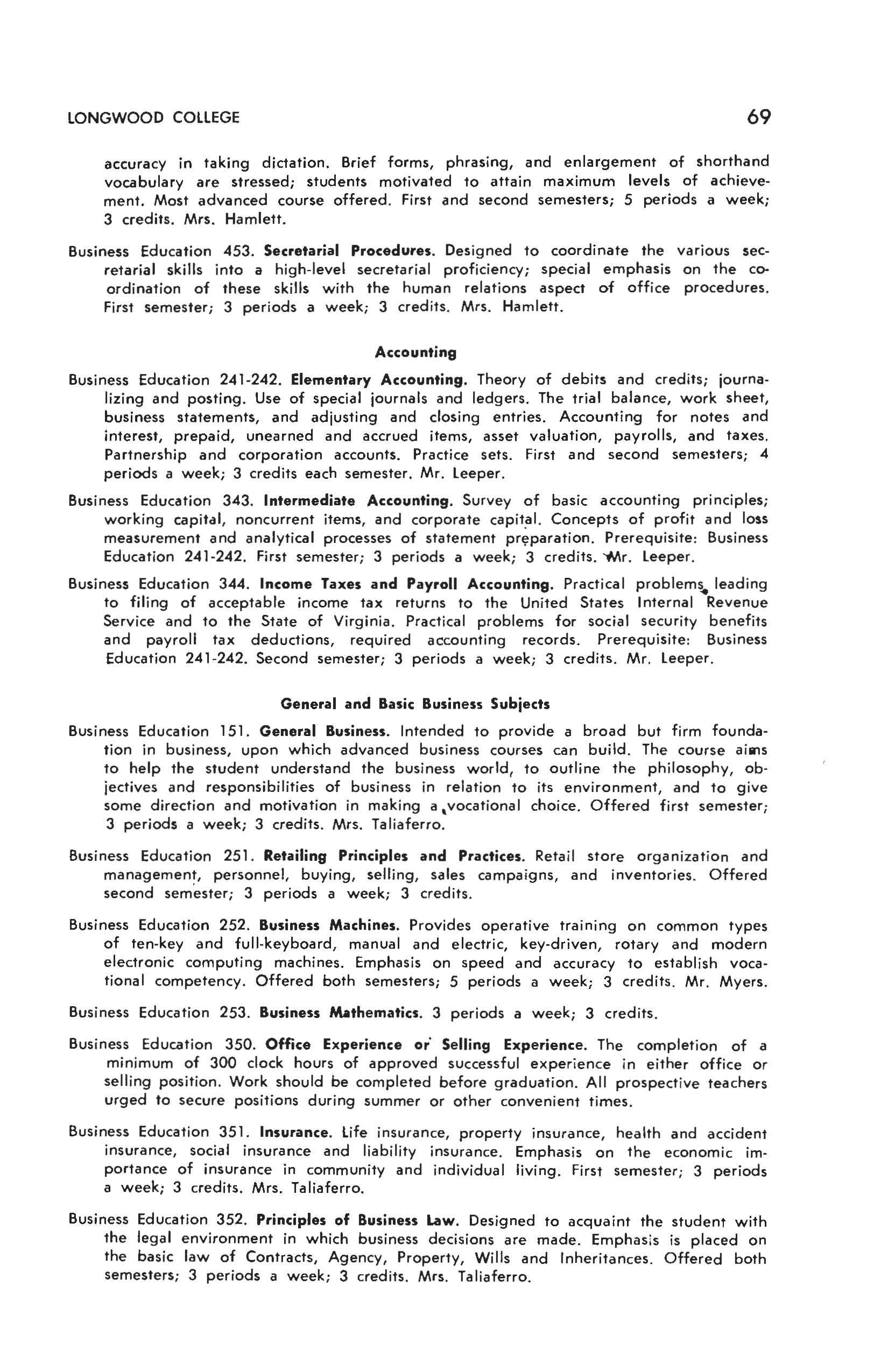
Business Education 253. Business Mathematics. 3 periods a week; 3 credits
Business Educat ion 350 Office Experience or' Selling Experience. The completion of a minimum of 300 clock hours of approved successful experience in either office or selling position Work should be completed before graduation All prospective teachers urged to secure positions during summer or other convenient times .
Business Education 351. Insurance. Life insurance, property insurance , health and accident insurance, social insurance and liability insurance. Emphasis on the economic importance of insurance in community and individual living. First semester; 3 periods a week; 3 credits. Mrs. Taliaferro.
Business Education 352. Principles of Business Law. Designed to acquaint the student with the legal environment in which business decisions are made. Emphasis is placed on the basic law of Contracts, Agency, Property, Wills and Inheritances . Offered both semesters ; 3 periods a week; 3 credits Mrs Taliaferro.
Business Education 353. Advanced Business Principles. A general business education course designed to give a broader understanding of the practices of present-day business society. (Offered only in the summer session.) 3 credits. Mrs. Taliaferro.
Businss Education 354. Law and Society. A general education course designed to give a broad and philosophical understanding of the general law essential to a person living in our environment and to acquaint the student with the processes by which law is applied to resolve human conflicts in organized society. Emphasis is placed on issues and trends in contemporary law. Suitable as an elective for all students. First semester; 3 periods a week; 3 credits. Mrs Taliaferro.
Business Education 355. Personal Finance. A social business course designed to acquaint the student with the basic fundamentals in selected areas of personal finance; role of the individual as a consumer and as an investor. Suitable as an elective for all students. Second semester; 3 periods a week; 3 credits. Mrs. Taliaferro.
Business Education 356. Data Processing. Systems fundamentals; machine orientation and essential operations; methods of coding and condensing data; data prdcessing application and procedures. Both semesters; 3 periods a week; 3 credits. Mr. Leeper.
Business Education 436. Office Management and Procedures. A study of the management function in the modern office; problem solving through job and systems analysis; methods of office procedures and records control. First semester; 3 periods a week; 3 credits. Mrs. Taliaferro.
Business Education 451. Methods of Teaching Secretarial Subjects. Instructional materials, teaching aids and techniques for effective development of skills involved in typewriting, shorthand and transcription, business machines and clerical practices. Second semester; 3 credits. Mrs. Hamlett.
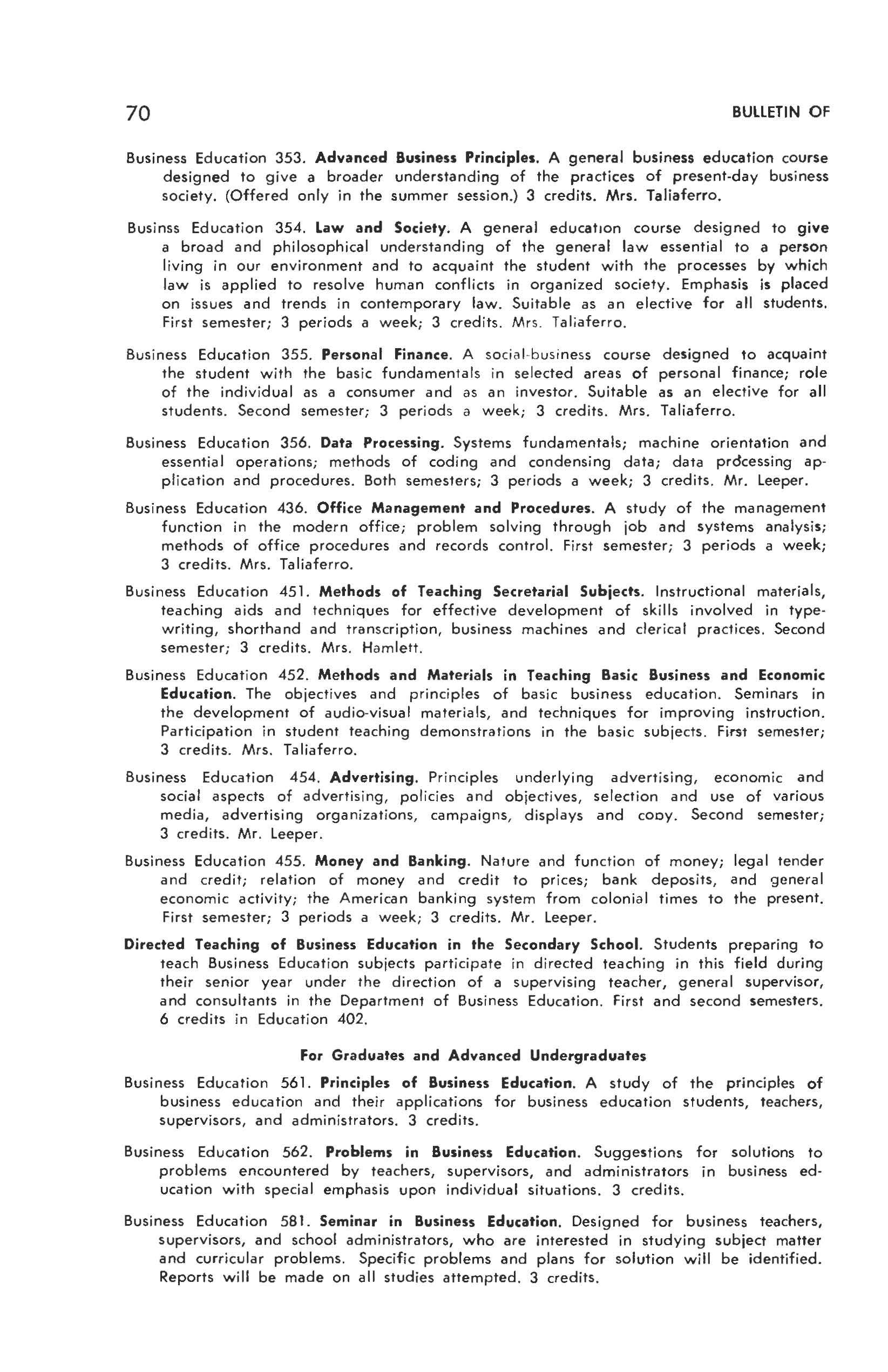
Business Education 452. Methods and Materials in Teaching Basic Business and Economic Education. The objectives and principles of basic business education Seminars in the development of audio-visual materials, and techniques for improving instruction. Participation in student teaching demonstrations in the basic subjects. First semester; 3 credits. Mrs. Taliaferro.
Business Education 454. Advertising. Principles underlying advertising, economic and social aspects of advertising, policies and objectives, selection and use of various media, advertising organizations, campaigns, displays and cooy. Second semester; 3 credits. Mr. Leeper.
Business Education 455. Money and Banking. Nature and function of money; legal tender and credit; relation of money and credit to prices; bank deposits, and general economic activity; the American banking system from colonial times to the present, First semester; 3 periods a week; 3 credits. Mr. Leeper.
Directed Teaching of Business Education in the Secondary School. Students preparing to teach Business Education subjects participate in directed teaching in this field during their senior year under the direction of a supervising teacher, general supervisor, and consultants in the Department of Business Education. First and second semesters. 6 credits in Education 402.
Business Education 561. Principles of Business Education. A study of the principles of business education and their applications for business education students, teachers, supervisors, and administrators. 3 credits.
Business Education 562. Problem• in Business Education . Suggestions for solutions to problems encountered by teachers, supervisors, and administrators in business education with special emphasis upon individual situations. 3 credits.
Business Education 581. Seminar in Business Education. Designed for business teachers, supervisors, and school administrators, who are interested in studying subject matter and curricular problems. Specific problems and plans for solution will be identified. Reports will be made on all studies attempted. 3 credits
Mr. Banton, Miss Bingner , Miss Bland, Mr . Dalton , Mr . Daubner, Mrs. Daubner, Mr. DeWitt, Mr Elliott, Mr Gibbons, Mr Kent, Mr Kovacs , Mrs. Kovacs, Mrs. Ra, Mr. Rosecrans, Mrs. Savage, Mrs Sneller, Mr. Swertfeger, Miss Trent , Mr. Vassar, *Mrs Wacker, Mr Weatherly, Mrs . Woodburn
The Department of Education, Psychology and Philosophy offers undergraduate majors in two fields, elementary education and psychology. Graduate programs are available in elementary education and supervision
The undergraduate major in elementary education is divided into two patterns, Pattern A leads to specializat ion and certification in the Kindergarten and Grades 1, 2 , and 3 . Pattern B leads to specialization and certification in Grades 4, 5, 6, and 7 The student will normally make a final decision regarding her area of specialization at the beginning of the sophomore year .
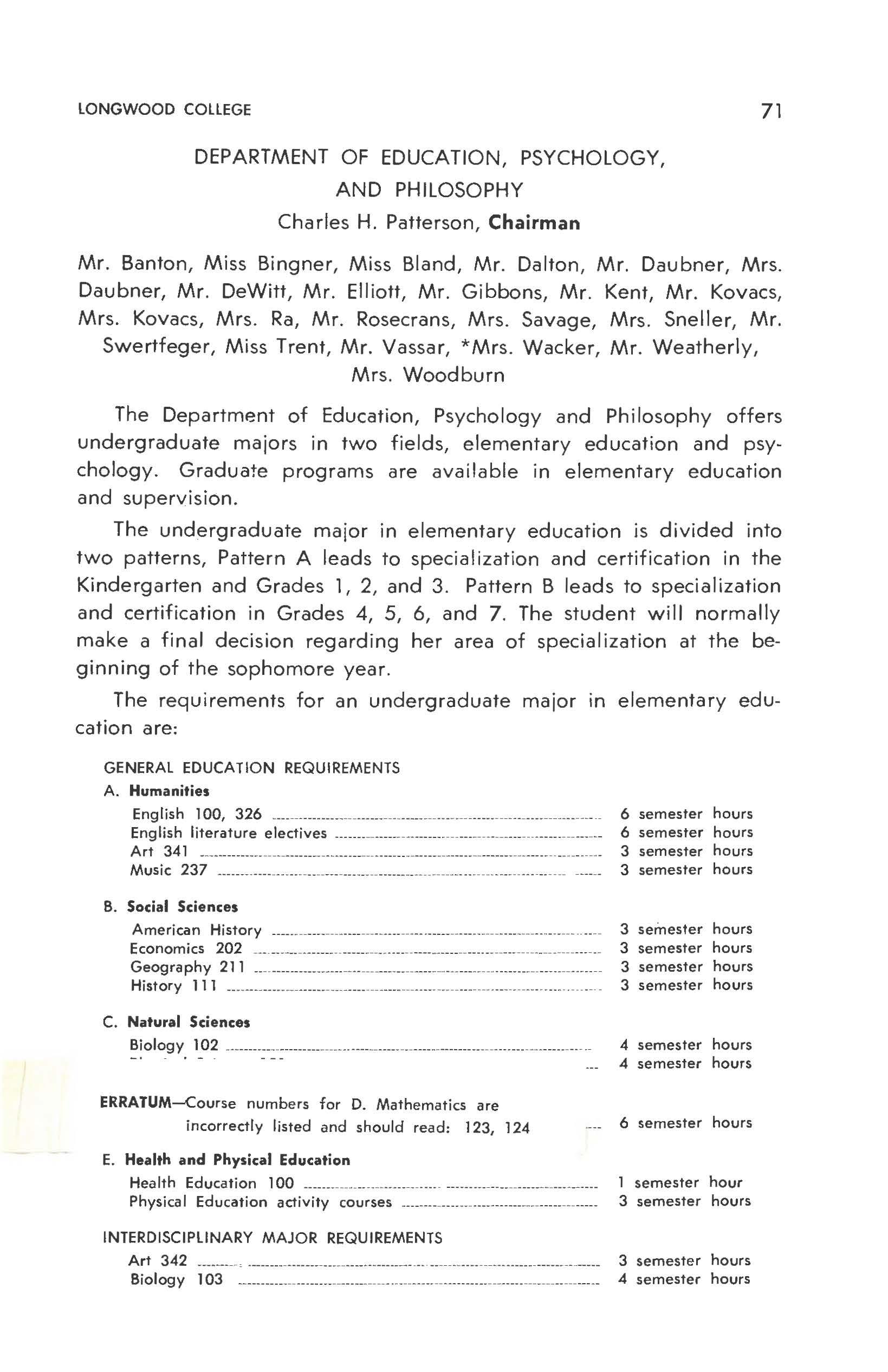
The requirements for an undergraduate major in elementary education are:
A. Humanities
English 100, 326 ., ___ __ _ _ _ English literature electives _ __ Art 341 ·-
8 . Social Sciences
6 semester hours 6 semester hours 3 semester hours 3 semester hours American History 3 semester hours Economics 202 _.. _______ .. _.. _.. _ 3 semester hours Geography 211 ____ _ _ 3 semester hours History 111 ___ .. _.. _.. __ 3 semester hours
C Natural Sciences Biology 102 ___ _
ERRATUM-Course numb e rs for D. Mathematics are incorrectly listed and should read : 123, 124
E. Health and Physical Education
4 semester hours 4 semester hours _ 6 semester hours
Health Education 100 -·-- • ·-· 1 semester hour Physica I Education activity courses ·- 3 semester hours
Ari 342 , 3 semester hours Biology 103 __ ., _ __ 4 semester hours
Education
Pattern A (Kindergarten and Grades 1, 2, 3) Education 353, 357, 400, 460 ·-····- ··- -----·· ·-···-······ Psychology 251, 256 , 451 ·········-······-········-·······
Pattern B (Upper Elementary : Grades 4, 5 , 6, 7)
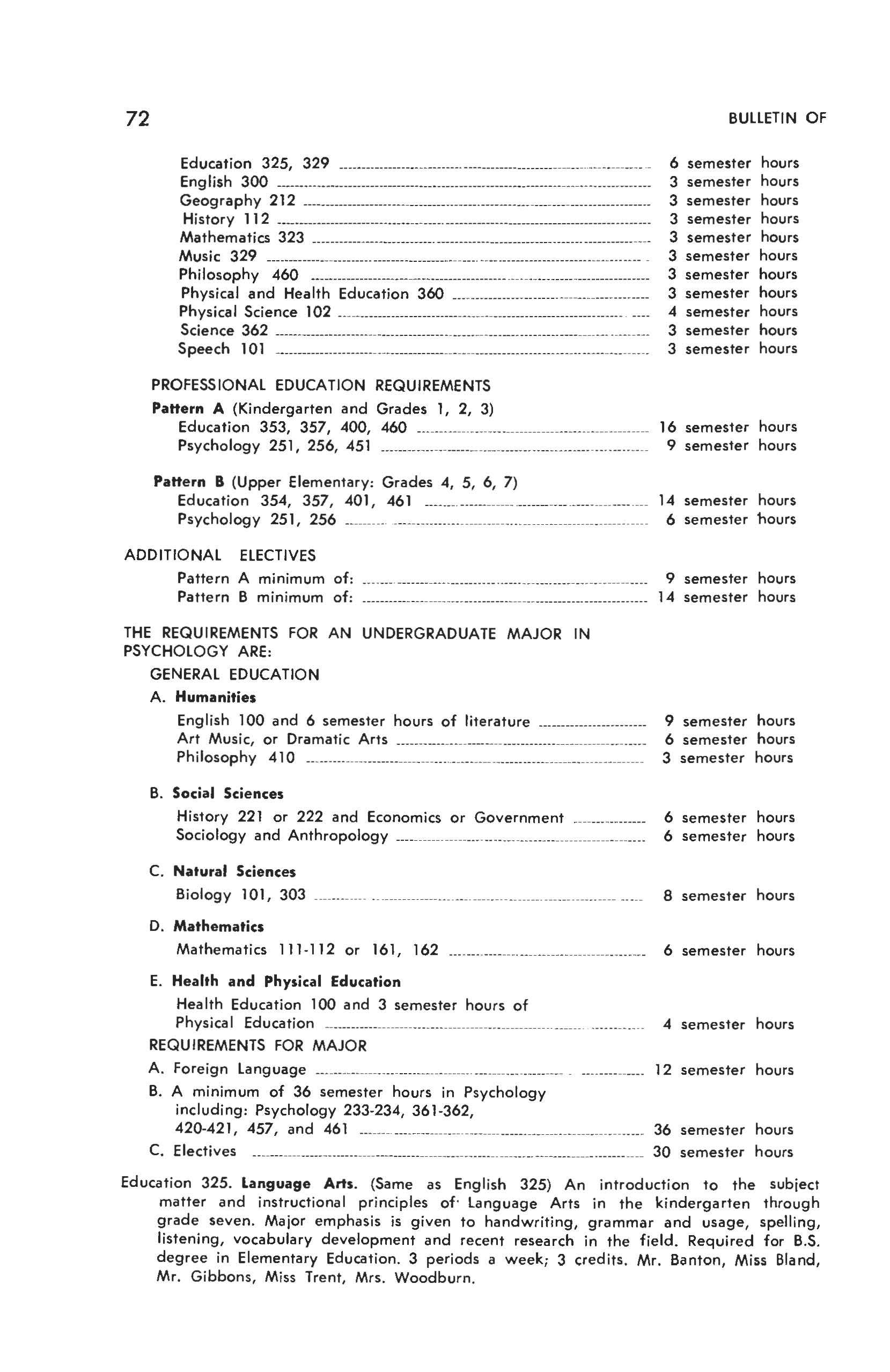
6 semester hours 3 semester hours 3 semester hours 3 semester hours 3 semester hours 3 semester hours 3 semester hours 3 semester hours 4 semester hours 3 semester hours 3 semester hours 16 semester hours 9 semester hours
Education 354 , 357, 401 , 461 ··············-···-·······--··- ················· 14 semester hours Psychology 251, 256 -··-···· •· 6 semester hours
Pattern A minimum of : Pattern B minimum of :
THE REQUIREMENTS FOR AN UNDERGRADUATE MAJOR IN PSYCHOLOGY ARE: GENERAL EDUCATION
A. Humanities
English 100 and 6 semester hours of literature ···-·· ······ Art Music, or Dramat ic Arts ····-·· -·· · ·-······-········ Philosophy 410 ---·---··· ··-·· ·-·····
B. Social Sciences History 221 or 222 and Economics or Government ·Sociology and Anthropology ················-·········· ················ C. Natural Sciences Biology 101, 303 D. Mathematics Mathematics 111-112 or 161, 162 ··················- ·--···-················
E. Health and Physical Education Hea Ith Education 100 and 3 semester hours of Physica I Education ··- ·······--·
REQUIREMENTS FOR MAJOR
9 semester hours 14 semester hours 9 semester hours 6 semester hours 3 semest e r hours 6 semester hours 6 semester hours 8 semester hours 6 semester hours 4 semester hours
A. Fore ign Language ···-· ··- ·-·· ·- 12 semester hours B. A minimum of 36 semester hours in Ps ychology including: Psychology 233-234, 361-362, 420-421 , 457, and 461 ······-·······-······················-·- ··-····-·········· ·· 36 semester hours C. Electives ···-··· ······ · ·····················--·················-··············-············- 30 semester hours
Education 325 Language Arts . (Same as English 325 ) An introduction to the subject matter and instructional pr i nciples of· Language Arts in the kindergarten through grade seven. Major emphasis is given to handwriting, grammar and usage, spelling, listening, vocabulary development and recent research in the field. Required for B.S. degree in Elementary Education. 3 periods a week; 3 credits. Mr. Banton, Miss Bland, Mr Gibbons, Mis s Trent , Mrs. Woodburn
Education 329. Principles and Techniques of Reading Instruction. An introduction to the principles and techniques of reading instruction in the elementary school Special emphasis is given to the mechanics of reading, approaches to teaching reading and methods of providing for individual differences . Prerequisites: twelve semester hours of English and Education 325. Three periods a week; 3 credits. Mr. Banton, Miss Bland, Mr Gibbons, Miss Trent, Mrs Woodburn.
Education 347 AudioNisual Education. The improvement of instruction through the use of audio-visual equipment, techniques and materials Offered each semester; 3 periods a week; 3 credits Mr Rosecrans.
Education 349. Education Television. A detailed study of educational television with special emphasis on the roles of the studio and classroom teacher. Includes laboratory practice in the planning and production of televised instruction. Three credits. Mr. Rosecrans.
Education 353. Principles of Kindergarten and Elementary Education. Principles and methods of curriculum and instruction in the kindergarten-primary unit {K-3). Prerequisites: Education 325, 329. Three periods a week; 3 credits Staff.
Education 354. Principles of Elementary Education. Principles and methods of curriculum and instruction in the upper elementary grades (4-7). Prerequisites: Education 325, 329 Three periods a week; 3 credits. Staff.
Education 355. Principles of Secondary Education Principles and methods of curriculum and instruction in the secondary school. Required of all majors seeking the Collegiate Certificate at the secondary level. Open to juniors only . Offered each semester ; 3 periods a week; 3 credits. Mr Kent, Mr. Kovacs, Mr Vassar.
Education 357. Educational Measurement. Theory and practice in construction of teacher made tests and in the selection, administration, scoring, and interpretation of standardized tests used in elementary and high schools. Required in all curricula leading to the Collegiate Professional Certificate. Offered each semester; 3 periods a week; 3 credits Miss Bingner, Mr. Daubner, Mr. DeWitt, Mr Patterson, Mrs Ra, Mrs. Sneller
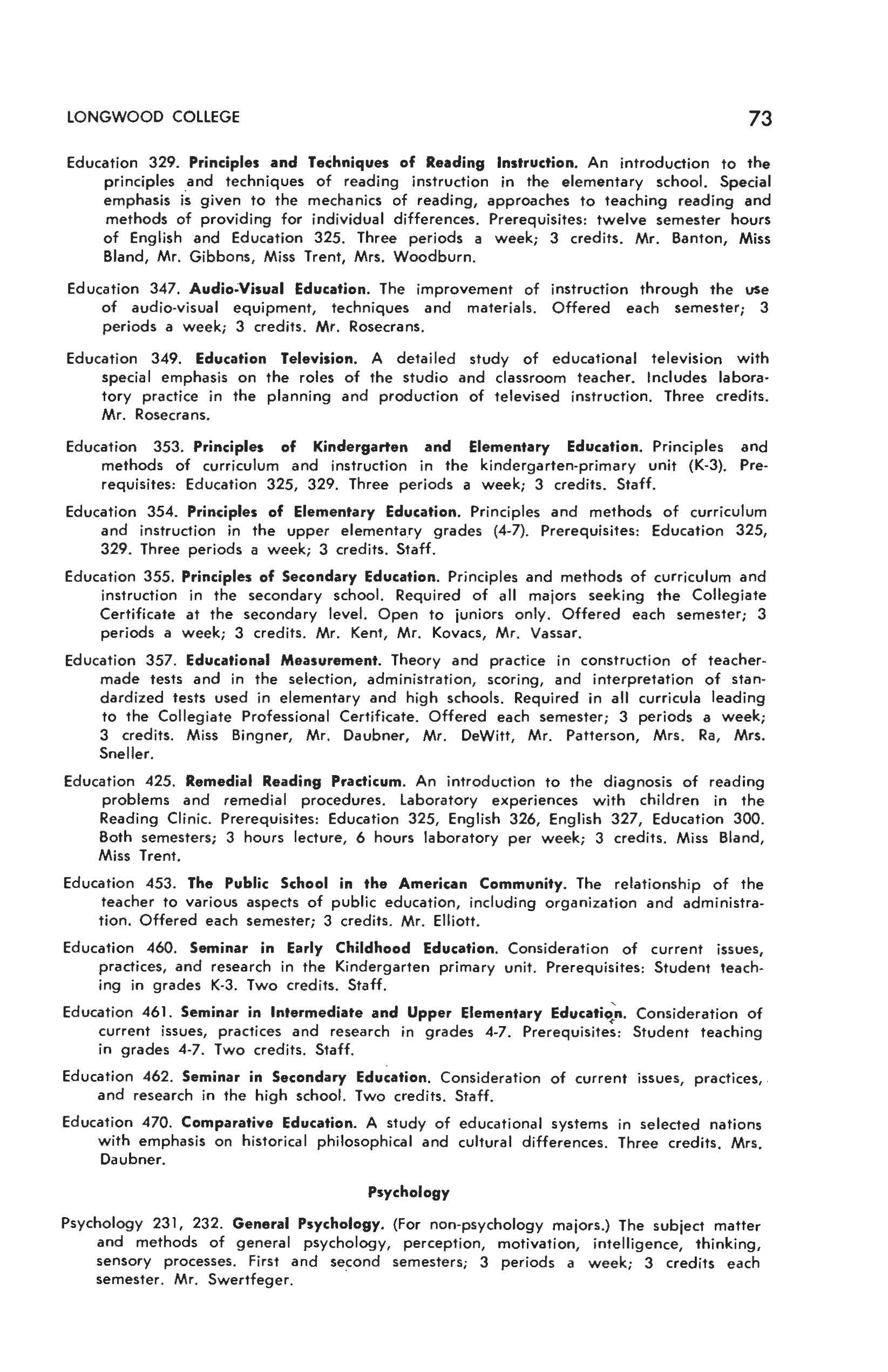
Education 425 . Remedial Reading Practicum . An introduction to the diagnosis of reading problems and remedial procedures. Laboratory experiences with children in the Reading Clinic. Prerequisites: Education 325, English 326, English 327, Education 300. Both semesters; 3 hours lecture, 6 hours laboratory per week; 3 credits. Miss Bland, Miss Trent.
Education 453. The Public School in the American Community. The relationsh ip of the teacher to various aspects of public education, including organization and administration. Offered each semester; 3 credits Mr Elliott.
Education 460 Seminar in Early Childhood Education. Consideration of current issues, practices, and research in the Kindergarten primary unit Prerequisites: Student teaching in grades K-3. Two credits Staff.
Education 461. Seminar in Intermediate and Upper Elementary Educatio,'n . Consideration of current issues, practices and research in grades 4-7. Prerequisites: Student teaching in grades 4-7 Two credits. Staff
Education 462 Seminar in Secondary Edu~ation. Consideration of current issues, practices, and research in the high school. Two credits. Staff .
Education 470. Comparative Education. A study of educational systems in selected nations with emphasis on historical philosophical and cultural differences Three credits Mrs. Daubner.
Psychology 231, 232. General Psychology. {For non-psychology majors.) The subject matter and methods of general psychology, perception, motivation, intelligence, thinking, sensory processes . First and second semesters; 3 periods a week; 3 credits each semester Mr Swertfeger.
Psychology 233-234. General Psychology and Quantitative Methods in Psychology. 6 credits. (Open only to psychology majors.)
Psychology 233 General Psychology. The principles of behavior and the application of psychology to practical problems concerning ability, sensory and perceptual processes, motivation, thinking and learning and the organic bases of behavior First semester; 3 periods a week Mrs Wacker
Psychology 234 Ouantitativ11 Methods in Psychology. An introduction to the principles and techniques of exper imental design and statistical analysis. Second semester; 3 periods a week. Mrs . Ra.
Psychology 25 1. '£ducational Psychology. The application of general psychology to education Emphasis is placed on the study of the learning process Required in all curricula leading to the Collegiate Professional Certificate. First semester ; 3 periods a week; 3 credits. Miss Bingner, Mr DeWitt, Mr Patterson , Mr Rosecrans, Mr. Swertf~ger, Mrs Wacker.
Psychology 256. Developmental Psychology. Development of physical traits , learning and intelligence, social and emotional behavior, personality and adjustment from conception to senescence. Emphasis upon childhood and adolescence Second semester; 3 periods a week; 3 credits M iss Bingner, Mr. DeWitt, Mr Patterson, Mr Rosecrans, Mr. Swertfeger, Mrs Wacker
Psychology 331. Social Psychology (Same as Sociology 331 ). Open to Juniors and Seniors only. Prerequisite: six hours of sociology and six hours of psychology. First semester; 3 periods a week; 3 credits Misss Bingner, Mrs. Ra.
Pychology 353 The Psychology of Adjustment. A dynamic and experimental approach to the study of a personality Prerequisite : 6 hours of psychology Second semester; 3 periods a week; 3 credits . Mr . DeWitt , Mr . Patterson .
Psychology 355 Individual Differences . Nature and significance of individual differences. Prerequis ite : 6 hours of psycholog y . First semester; 3 periods a week ; 3 cred its. Mr. DeWitt
Psychology 361-262 Experimental Psychology A detailed exam i nation of the major problems of psychology and the experimental procedures available for their investigation. First and second semesters; 2 periods lecture and one double period lab per week; 3 credits each semester . Mrs . Wacker .
Psychology 420 421. Psychological Tests and Measureme11ts. A survey of methods , techniques, and instruments for measuring individual differences in behavior with spec:al emphasis on the Binet and Wechsler Scales First and second semesters; 2 periods lecture and one double period lab per week . 3 credits each semester . Mr . DeWitt.
Psychology 422 . Learning and Motivation . Theories of behavior and experimental literature on learning and motivation in man and animals. Offered alternate years ; 3 periods a week; 3 credits . Mrs . Wacker .
Psychology 423 Physiological Psychology . A study of the physiological correlates of behavior including the sensory receptors , central brain mechanisms , and coordination of the motor systems. Offered alternate year s; 3 periods a week; 3 credits. Mr. Swertfeger, Mrs. Wacker .
Psychology 451 Survey of Exceptional Children . Survey of essential chara cteristics of the exceptional child in an educational setting . Major emphas:s is given to the educable mentally retarded, the slow learner , the g ifted child, visually handicapped , crippled, and children with hearing impairments Three periods a week ; 3 credits Mr. Banton
Psy chology 455. Abnormal Psychology. Description and explanation of the psychological aspects of behavior disorders including abnormalities of sensory and perceptual process , memory , emot ion and the phenomena and interpretat ion of psychoses and neuroses . Prerequisites : Ps y chology 233 234 , 420-421. Offered alternate years; 3 periods a week ; 3 credits Mr DeWitt , Mrs Wacker.
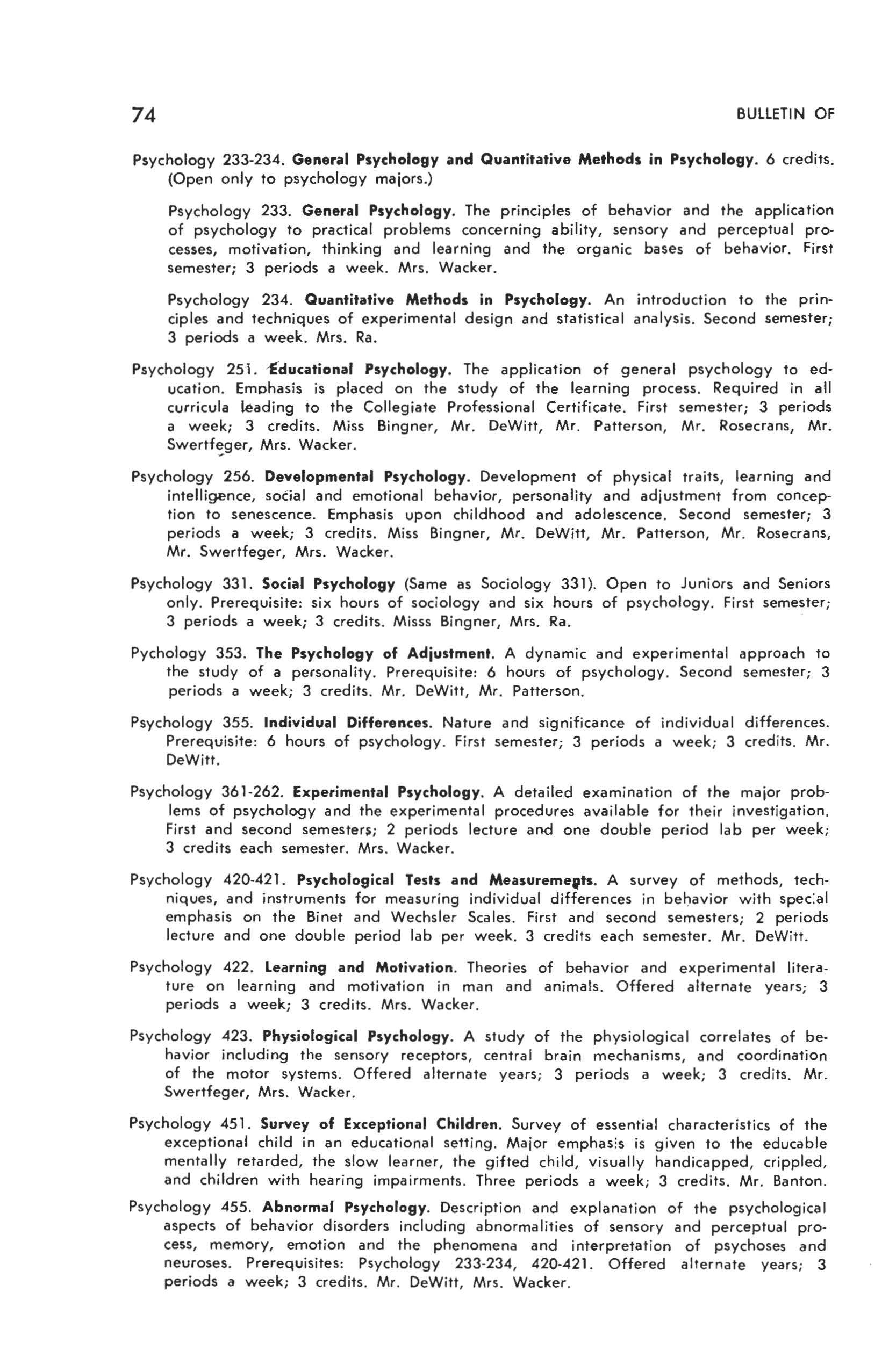
Psychology 457 History and Systems of Psychology. The development of psychology from ancient to modern times Consideration of important men and significant ideas contributing to current systematic psychology. Prerequisite: 6 hours of psychology. 3 periods a week; 3 credits. Mr Swertfeger, Mrs. Wacker.
Psychology 459 Industrial Psychology. The facts, theories and techniques of psychology in relation to problems of employee selection and training, performance appraisal, worker motivation and morale, industrial leadership and safety, human engineering and space psychology. Offered alternate years; 3 periods a week; 3 credits Mr. DeWitt, Mrs. Wacker.
Psychology 461 Seminar in Advanced General Psychology. A seminar for the senior psychology major, designed to integrate his knowledge of specific fields into a comprehensive view of psychology , and to review the current research in various areas of psychology. (Open only to sen iors ) Second semester; 3 periods a week ; 3 credits. The Staff
Philosophy 351. Logic. The fundamentals of deduction and induction which aid the student in developing habits of valid thinking and in understanding the scientific method. First semester; 3 periods a week; 3 credits. Mrs. Savage.
Philosophy 360. Philosophy of Life. Critical examination of the foundations and development of historical and current systems of thought Offered each semester ; 3 periods a week ; 3 credits. Mrs. Savage.
Philosophy 361 History of Western Philosophy: Ancient and Medieval. A survey •f the development of European thought from its early Greek origins to the seventeenth century First semester; 3 periods a week ; 3 credits Mrs. Savage
Philosophy 362 History of Western Philosophy : Modern and Contemporary . A survey of the history of European and American philosophy from the seventeenth century to the present. Second semester; 3 periods a week; 3 credits. Mrs. Savage .
Philosophy 381 Aesthetics. A study of some problems in aesthetics, including the relation between beauty and the arts, the function and value of the arts in culture, and a• consideration of standards for criticism and judgments of beauty Offered first semester; 3 periods a week; 3 credits . Mrs . Daubner.
Philosophy 401. Philosophy of Science. The historical origins, and modern and contempory influences on science. First semester: 3 periods a week; 3 credits . Mrs . Savage .
Philosophy 430 American Thought . The development of American philosophy from its colonial beginnings to the present , with emphasis on the thinkers most significant to the creation and perpetuation of our religious , social, and political he r itage and ideals . Second semester; 3 periods a week ; 3 credits. Mrs. Savage .
Philosophy 460. Philosophy of Education . Critical analysis of foundation , implications and applications of the different philosophies of education exemplified in current practice. Required in all curricula leading to the Collegiate Professional Certificate Open to seniors only. Offered each semester; 3 periods a week; 3 credits. Mr. Daubner, Mrs Daubner, Mr. Kovacs, Mr. Swertfeger.
Philosophy 473 Ethics. A study of the significant moral and ethical principles developed in European and American philosophy. Second semester; 3 periods a week ; 3 credits. Mrs Daubner
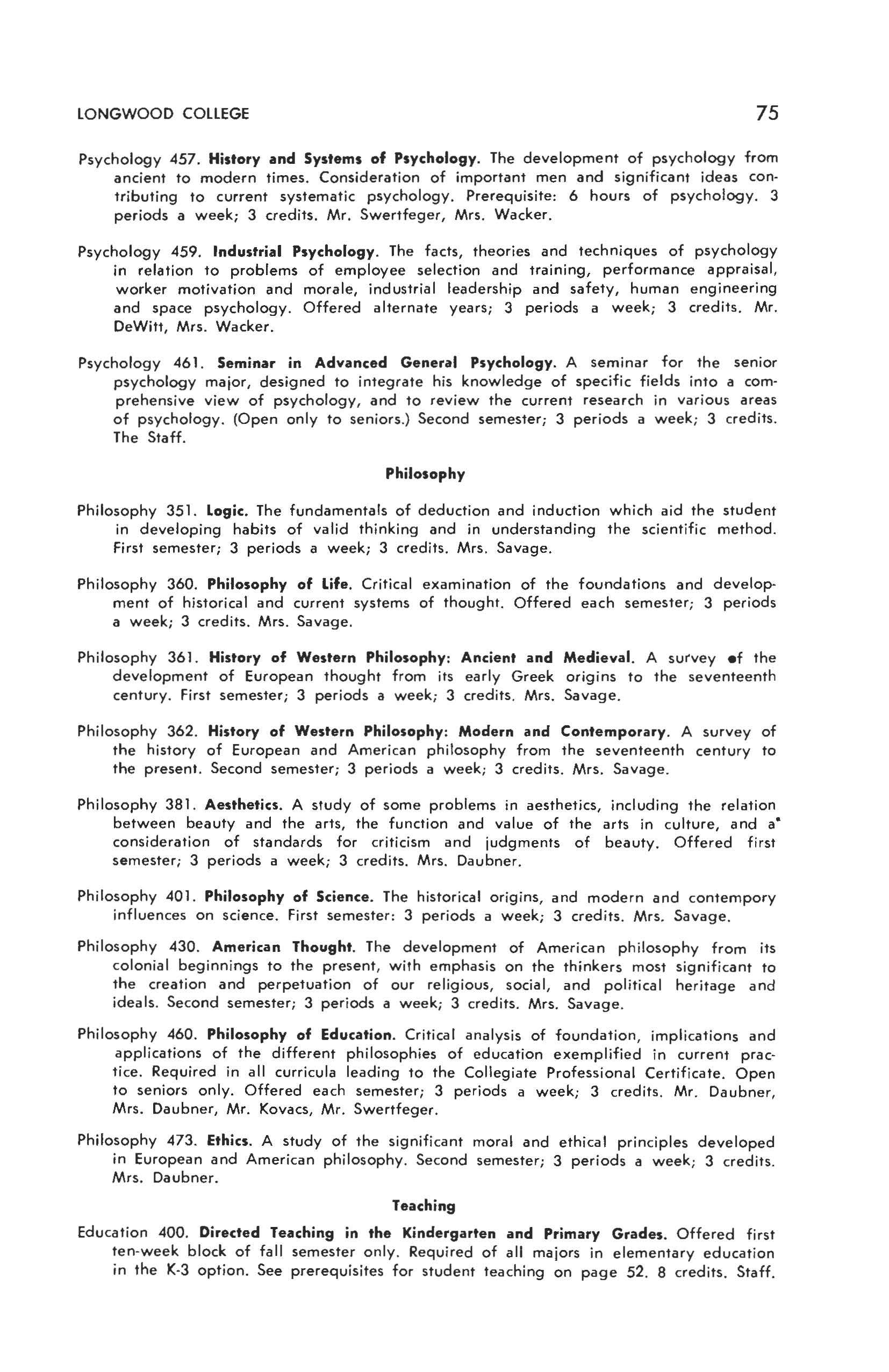
Education 400 Directed Teaching in the Kindergarten and Primary Grades . Offered first ten-week block of fall semester only. Required of all majors in elementary education in the K-3 option. See prerequisites for student teaching on page 52 8 credits Staff.
Education 401. Directed Teaching in the Upper Elementary Grades . Offered first eightweek block during both fall and spring semesters. Required of all elementary majors in the Upper Elementary option See prerequisites for student teaching on page 52 6 credits. Staff
Education 402 Directed Teaching in the Secondary School. Offered first eight week block during both fall and spring semesters Required of all students in the secondary educat ion curricula See prerequisites for student teaching on page 52 6 credits. Staff.
The Department of Education, Psychology and Philosophy is responsible for the organization and administration of two graduate programs One of these programs requires the student to major in Educat ion in a curriculum designed to prepare the student for supervisory work in the public schools The other program is interdisciplinary in nature and affords the elementary classroom teacher an opportunity to take additional or advanced work in subject-matter fields related to teaching at the elementary level. This program has an option which allows the student to gain certificat ion to teach at the kindergarten level if he so desires
All graduate students i n the Longwood College Graduate Program either major or m i nor in education. The minor in Education consists of nine semester hours of work taken in Psychology 622, Education 571 and Education 681 . Th is major in Education also meets the state certification requirements providing for a teacher holding the Collegiate Certif icate to raise that certificate to the level of Colleg iate Profess ional Cert if icate.
Requirements for the major in Education leading to a degree in Supervision are: Psychology 622, Education 571, Education 681, Education 541 , Education 561 and Education 661, a total of eighteen semester hours The minor in th is degree program will consist of six semester hours of work taken in Mathematics 523, and Education 525 . Elect ives totalling six semester hours will complete the thirty hour program for th is curriculum .
Requirements for the interdisciplinary major in elementary classroom teaching are: Psychology 622 , Education 525 , Education 541, Education 571, Education 681 , Mathematics 523 and nine semester hours of add itional work taken from the fields of Art, English , Music , Physical Education, Science or Social Science plus an elective course of three hours. The student seeking the kindergarten option w ith take Psychology 530 and Education 531 in lieu of six semester hours in the above ele c tives
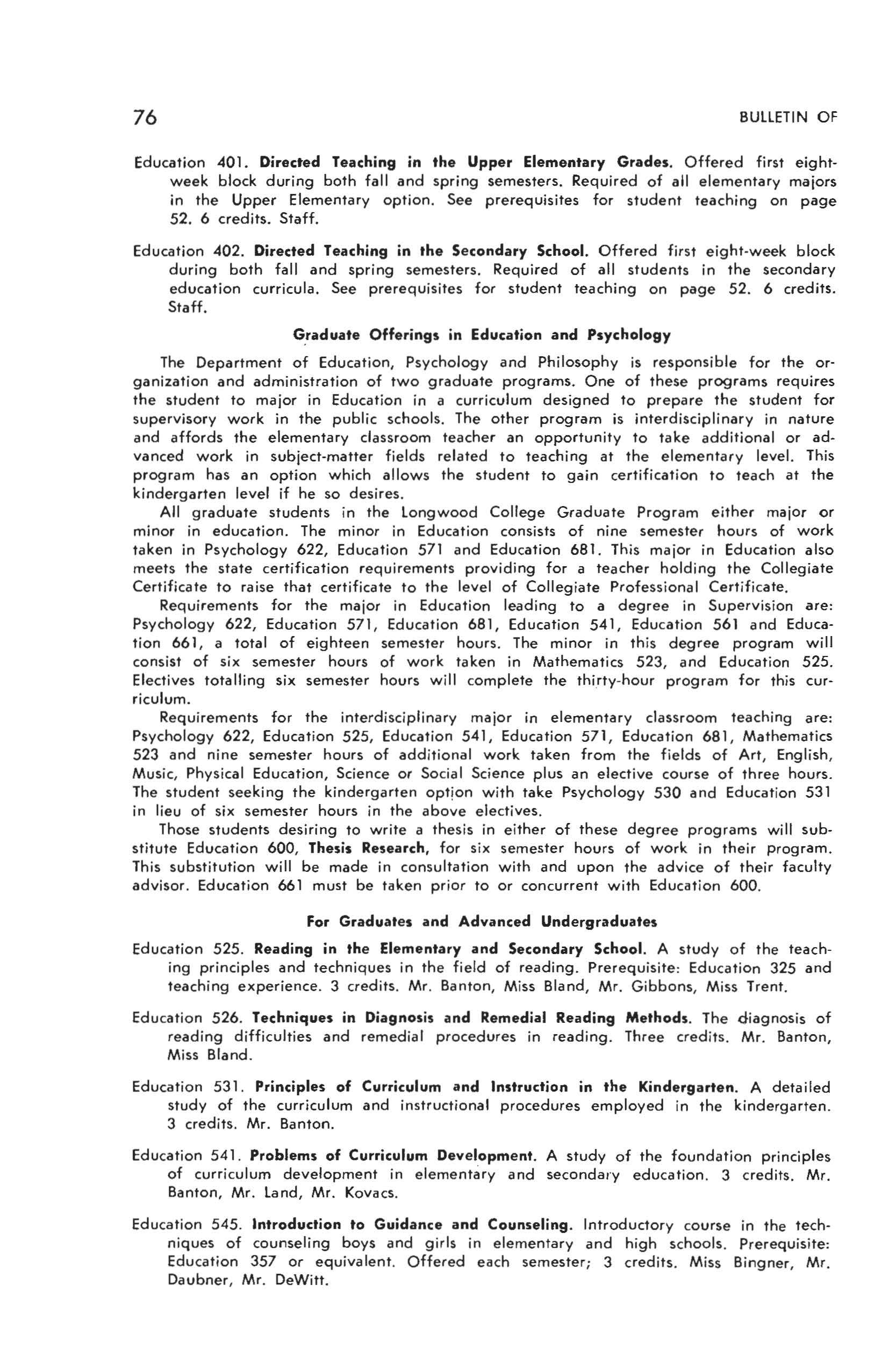
Those students desiring to write a thes is in either of these degree programs will subst itute Education 600 , Thesis Research, for s ix semester hours of work in their program. This substitution will be made in consultation with and upon the advice of their faculty advisor . Education 661 must be taken prior to or concurrent with Educat ion 600 .
Education 525 Reading in the Elementary and Secondary School. A study o f the teaching principles and techniques in th e field of reading . Prerequisite: Education 325 and teaching experience 3 cred its Mr Banton, Miss Bland, Mr Gibbons , Mis s Trent
Edu cation 526 . Techniques in Diagnosis and Remedial Reading Methods . The diagnosis of reading difficulties and remedial procedures in reading Three cred its. Mr Banton, Miss Bland
Education 531. Principles of Curriculum and Instruction in the Kindergarten . A detailed s tudy of the curriculum and instructional procedures employed in the kindergarten. 3 credits Mr Banton.
Edu cation 541 Problems of Curriculum Development . A study of the foundation principles of curriculum development in elementary and secondary education . 3 credits . Mr. Banton, Mr Land , Mr. Kova cs
Education 545 . Introduction to Guidance and Counseling Introductory course in the techniques of counseling boys and girls in elemen t ary and high schools Prerequisite: Education 357 or equivalent . Offered each semester; 3 credits . Miss Bingner, Mr . Daubner, Mr . DeWitt.
Education 547 . Sensory Materials. The philosophy and psychology of sensory learning and the techniques and materials of audio-visual instruction. 3 credits. Mr. Rosecrans
Education 561 Supervision of Instruction. A course for teachers, principals, supervisors and administrators. The nature and scope of supervision as education leadership in the improvement of instruction. 3 credits Mr Elliott, Mr Vassar.
Education 571. Principles of Instruction. A study and appraisal of different methods of teaching in modern education. 3 credits. Mr Banton, Mr Vassar
Education 575 Public School Administration. An introduction to school administration including: the organization and structure of the school system; legal basis for school administration; authority, responsibility and control of different levels of government for education; problems related to financial support of education, and the administration and supervision of the instructional program; techniques of communication, personnel . administration, and record keeping. 3 credits. Mr. Dalton, Mr. Gibbons.
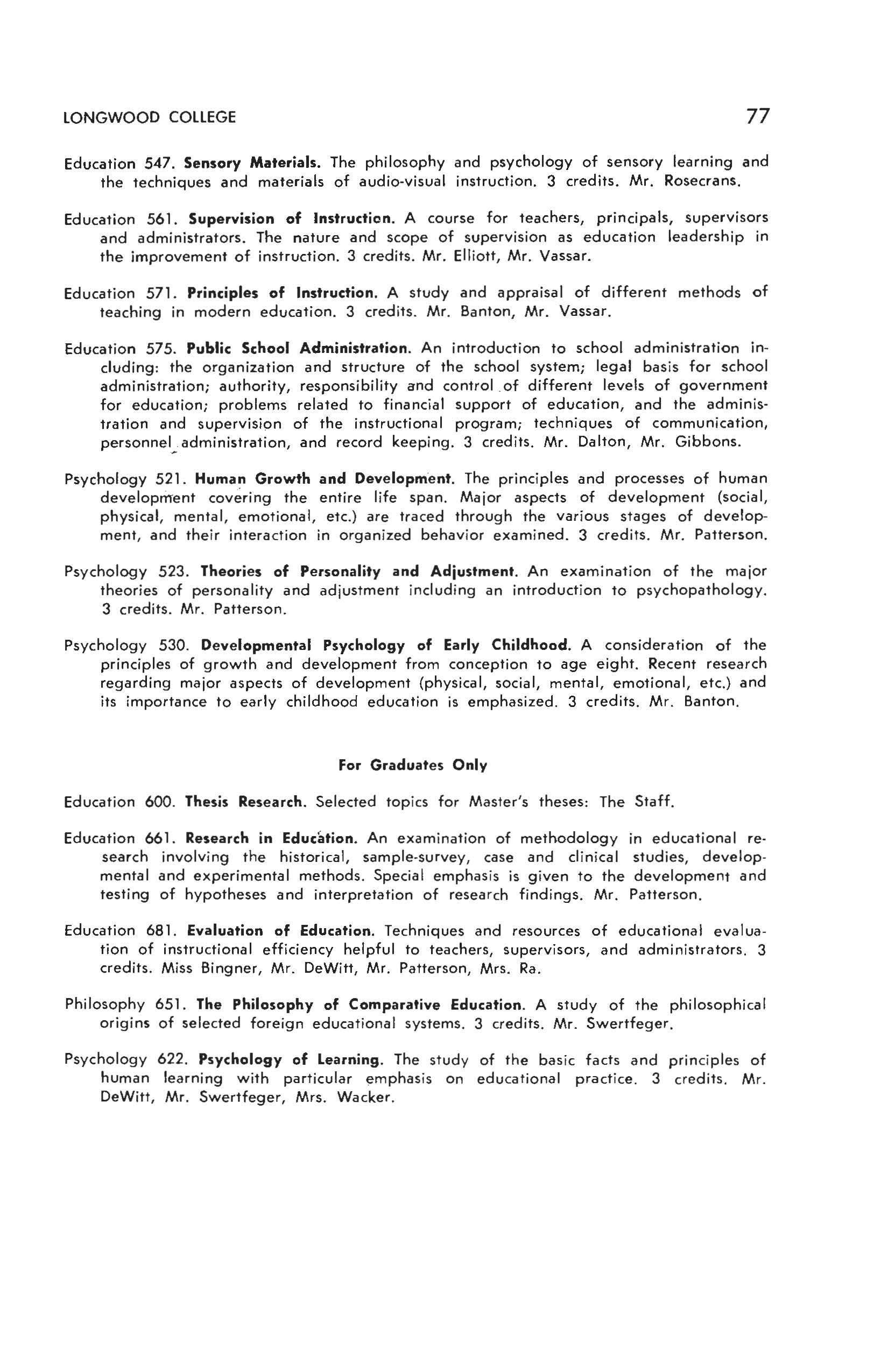
Psychology 521 Human Growth and Development . The principles and processes of human development covering the entire life span. Major aspects of development (social , physical, mental , emotional, etc.) are traced through the various stages of development, and their interaction in organ ized behavior examined 3 credits Mr Patterson.
Psychology 523. Theories of Personality and Adjustment . An examination of the major theories of personality and adjustment i ncluding an introduction to psychopathology 3 credits. Mr. Patterson.
Psychology 530. Developmental Psychology of Early Childhood. A consideration of the principles of growth and development from conception to age eight Recent research regarding major aspects of development (physical, social, mental, emotional , etc.) and its importance to early childhood education is emphasized. 3 credits. Mr. Banton.
Education 600 Thesis Research. Selected topics for Master's theses: The Staff
Education 661. Research in Education . An examination of methodology in educational research involving the historical, sample-survey, case and clinical studies , developmental and experimental methods . Special emphasis is given to the development and testing of hypotheses and interpretation of research findings. Mr. Patterson
Education 6B1. Evaluation of Education. Techniques and resources of educational evaluation of instructional efficiency helpful to teachers, supervisors, and administrators. 3 credits. Miss Bingner, Mr. DeWitt, Mr . Patterson, Mrs. Ra.
Philosophy 651 The Philosophy of Comparative Education. A study of the philosophical origins of selected foreign educational systems. 3 credits. Mr. Swertfeger
Psychology 622 , Psychology of Learning . The study of the basic facts and principles of human learning with particular emphasis on educational practice. 3 credits. Mr DeWitt, Mr Swertfeger, Mrs. Wacker

Mrs. Beaumont, Mr. Blackwell, Miss Brown, Miss Craft, Miss ::louglass, Mr. Gresham, Mrs. Heavilin, Mr. Herndon, *Mr. Hevener, Mrs . Hooker, Miss Hosey, Miss May, Mrs. Sneller, Mr. Sowder, Miss Sprague, Mr. Stuart, Mr. Theroux, Mrs Tinnell, Mr. Vest, Mr. Wier
The Department of English seeks to provide its majors a philosophy of language, a philosophy of literature, and skill in communication. Students may take courses leading to the A . B. and S.S. degrees in English and to the M.A. degree in Education. In cooperation with the De partment of Speech and Dramatic Arts, it offers a major in English and Dramatic Arts and in English and Speech. Requirements for the undergraduate majors are as follows:
Major in English in curricula for the AB. and B.S. degrees-39 semester hours: (l) English 100; (2) English 211,212; (3) English 300 or 510; (4) English 321, 322; (5) English 533 or 534; (6) Philosophy 361 or 362; and (7) fifteen hours of approved elective courses from Departmental offerings in writing, literature, and linguistics. Students working for the Collegiate Professional Certificate must also take English 400 and English 432.
Major in English and Dramatic Arts in curricula for the A.B. and B.S. degrees-4 l semester hours: (l) English l 00;, (2) English 211, 212; (3) English 300 or 51 O; (4) English 321 or 322; (5) nine hours of drama1ic literature, including Dramatic Arts 368; (6) Dramatic Arts l 01, l 02; (7) Dramatic Arts 301; (8) Dramatic Arts 302; (9) Dramatic Arts 402; and (l 0) Speech 403. Majors in English and Dramatic Arts who are working for the Collegiate Professional Certificate must also take English 400 and English 432.
Major in English and Speech in curricula for the A.B. and S.S. degrees-42 semester hours: (1) English l 00; (2) English 21 l, 212; (3) English 300 or 510; (4) English 321 or 322; (5) nine hours of approved elective courses from Departmental offerings in writing, literature, and linguisitics; (6) Speech 100; (7) Speech 101; (8) Speech 201; (9) Speech 311; (10) Speech 401; (11) Speech 403.; Majors in English and Speech who are working for the Collegiate Professional Certificate must also take English 400 and English 432.
The requirements for a major in English satisfy the Virginia Certifi-
*On leave of absence.
cation Regulations for Teachers, effective July 1, 1968, which state: "The requirement of a minimum of 30 semester hours shall include courses in English literature, American literature, language, and composition and should also include a course in advanced composition writing and a course in modern English grammar."
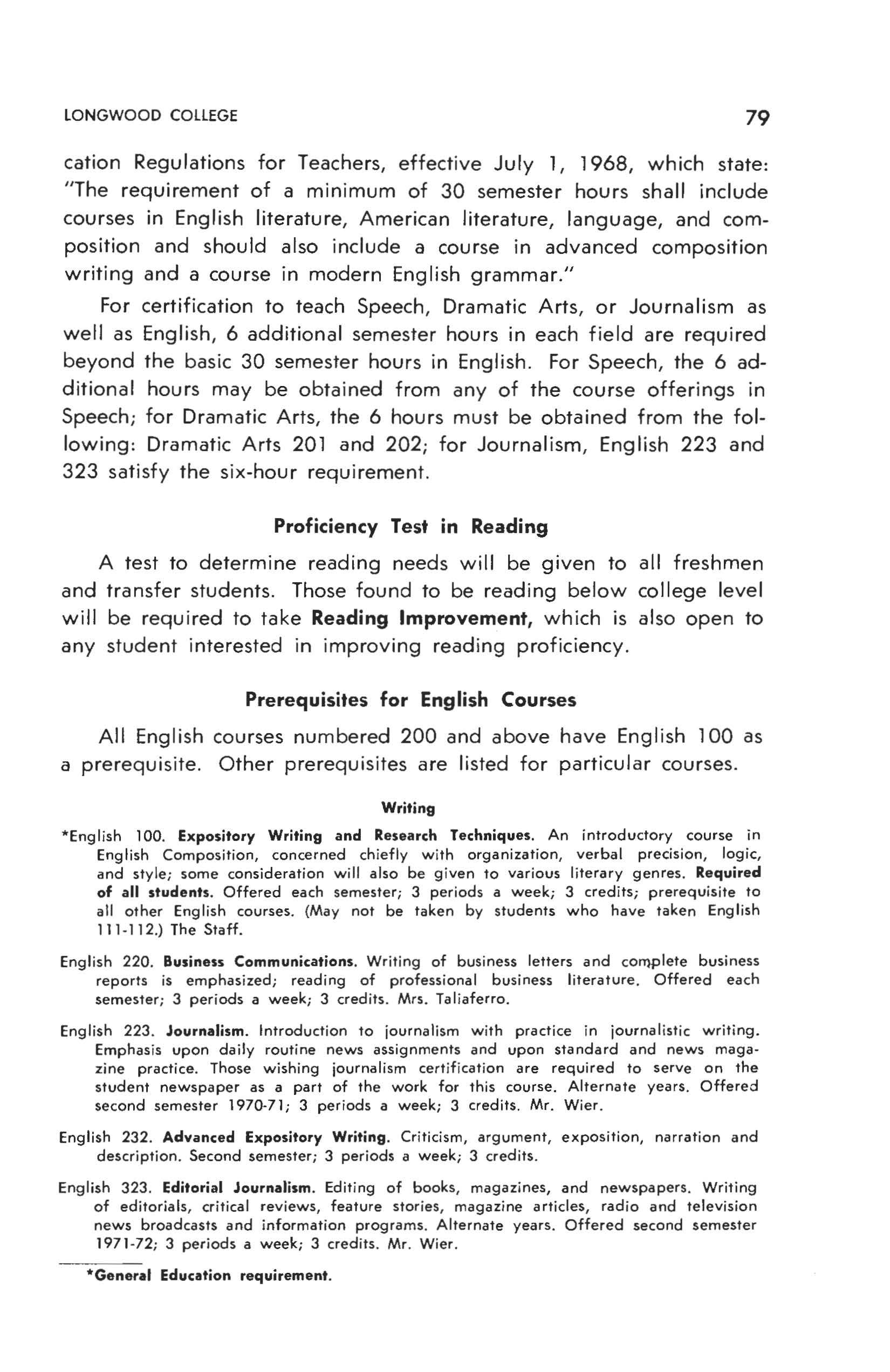
For certification to teach Speech, Dramatic Arts, or Journalism as well as English, 6 additional semester hours in each field are required beyond the basic 30 semester hours in English. For Speech, the 6 additional hours may be obtained from any of the course offerings in Speech; for Dramatic Arts, the 6 hours must be obtained from the following: Dramatic Arts 201 and 202; for Journalism, English 223 and 323 satisfy the six-hour requirement.
A test to determine reading needs will be given to all freshmen and transfer students. Those found to be reading below college level will be required to take Reading Improvement, which is also open to any student interested in improving reading proficiency.
All English courses numbered 200 and above have English 100 as a prerequisite Other prerequisites are listed for particular courses.
*English 100. Expository Writing and Research Techniques. An introductory course in English Composition, concerned chiefly with organization, verbal precision, logic, and style; some consideration will also be given to various literary genres. Required of all students . Offered each semester; 3 periods a week; 3 credits; prerequisite to all other English courses (May not be taken by students who have taken English 111-112.) The Staff
English 220. Business Communications . Writing of business letters and complete business reports is emphasized ; reading of professional business literature Offered each semester ; 3 periods a week; 3 credits . Mrs. Taliaferro .
English 223 Journalism. Introduction to journalism with practice in journalistic writing. Emphasis upon daily routine news assignments and upon standard and news magazine practice. Those wishing journalism certification are required to serve on the student newspaper as a part of the work for this course. Alternate years. Offered second semester 1970-71; 3 periods a week; 3 credits Mr Wier.
English 232 Advanced Expository Writing. Criticism, argument, exposition, narration and description Second semester; 3 periods a week; 3 credits
English 323 Editorial Journalism . Editing of books, magazines, and newspapers. Writing of editorials, critical reviews, feature stories , magazine articles, radio and television news broadcasts and information programs Alternate years. Offered second semester 1971-72 ; 3 periods a week; 3 credits Mr Wier
*General Education requirement.
English 351. Creative Writing. Poetry, the short story, the novel, and narrative description First semester; 3 periods a week; 3 credits. Mr Wier.
English 432. Advanced Composition and Analysis of Literary Genres. An indepth course in written composition, organized along seminar lines, the courses will cater to the particular weakness of the individual student, with an equal emphasis on literature and composition. Offered second semester; 3 periods a week; 3 credits. (The English Department reserves to itself the right to waive this requirement for individual majors.) The Staff
English 211, 212 . Survey of English Literature. The literafure of England from the Old English e-eriod into the Twentieth Century First and second semester; 3 periods a week; 3 credits each semester. Mr. Blackwell, Miss Brown, Miss Craft, Miss Douglass, Mr. Frank, Mrs ...Heavilin, Mr . Herndon , Miss May, Miss Sprague, Mr. Stuart, Mr. Theroux.
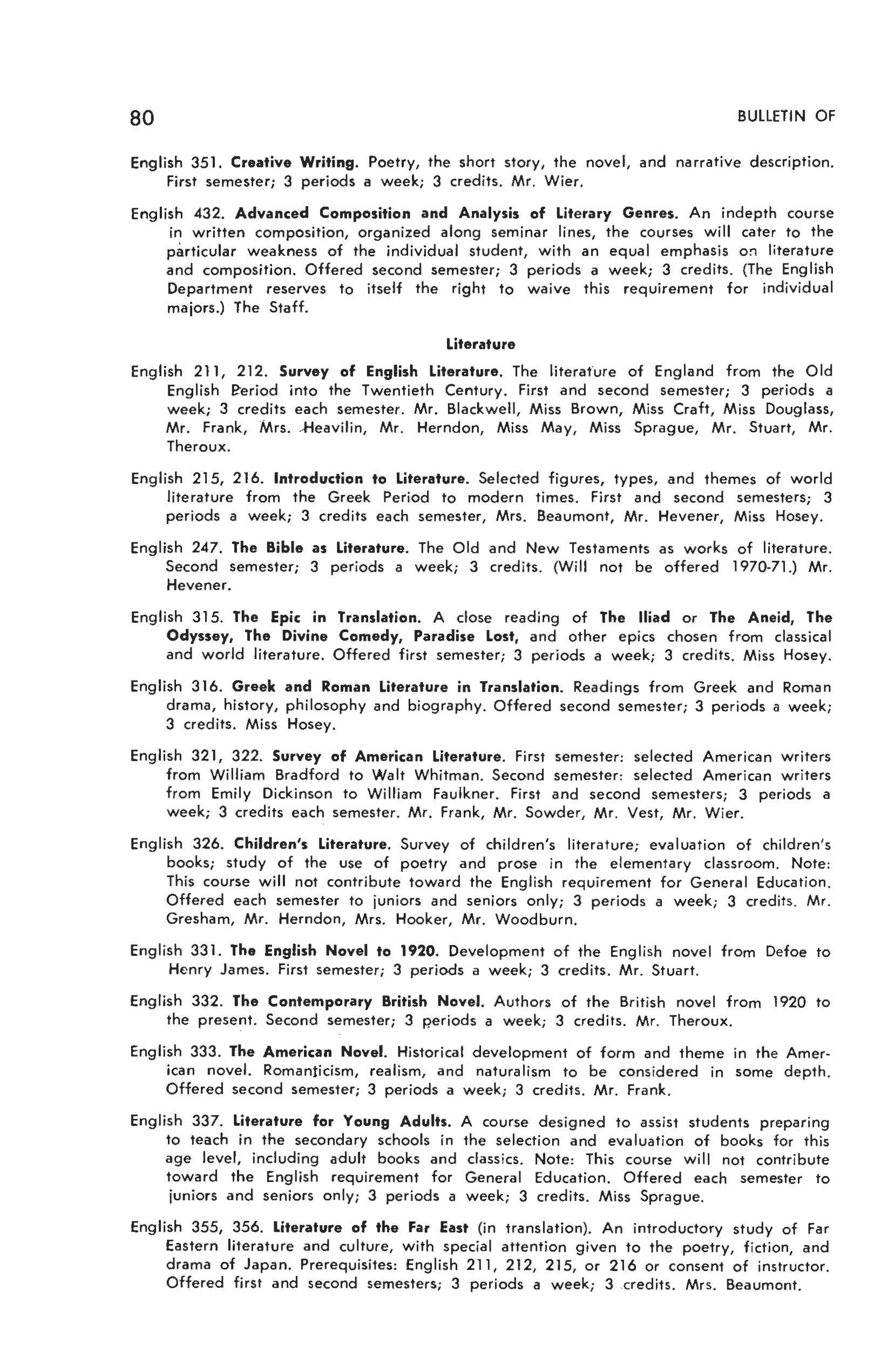
English 215, 216. Introduction to Literature . Selected figures, types, and themes of world literature from the Greek Period to modern times First and second semesters; 3 periods a week; 3 credits each semester, Mrs. Beaumont, Mr. Hevener, Miss Hosey
English 247. The Bible as Literature. The Old and New Testaments as works of literature. Second semester; 3 periods a week; 3 credits. (Will not be offered 1970-71.) Mr. Hevener
English 315. The Epic in Translation. A close reading of The Iliad or The Aneid, The Odyssey, The Divine Comedy, Paradise Lost, and other epics chosen from classical and world literature. Offered first semester; 3 periods a week; 3 credits. Miss Hosey.
English 316. Greek and Roman Literature in Translation. Readings from Greek and Roman drama, history, philosophy and biography. Offered second semester; 3 periods a week; 3 credits. Miss Hosey
English 321, 322 Survey of American Literature. First semester: selected American writers from William Bradford to Walt Whitman. Second semester, selected American writers from Emily Dickinson to William Faulkner. First and second semesters; 3 periods a week; 3 credits each semester Mr. Frank, Mr. Sowder, Mr. Vest, Mr. Wier
English 326. Children's Literature. Survey of children's literature; evaluation of children's books; study of the use of poetry and prose in the elementary classroom. Note : This course will not contribute toward the English requirement for General Education. Offered each semester to juniors and seniors only; 3 periods a week; 3 credits. Mr. Gresham, Mr Herndon, Mrs. Hooker, Mr. Woodburn.
English 331. The English Novel to 1920. Development of the English novel from Defoe to Henry James. First semester; 3 periods a week; 3 credits. Mr. Stuart.
English 332. The Contemporary British Novel. Authors of the British novel from 1920 to the present. Second semester; 3 periods a week; 3 credits. Mr Theroux.
English 333. The American Novel. Historical development of form and theme in the American novel. Romanticism, realism, and naturalism to be considered in some depth Offered second semester; 3 periods a week; 3 credits. Mr. Frank
English 337. Literature for Young Adults. A course designed to assist students preparing to teach in the secondary schools in the selection and evaluation of books for this age level, including adult books and classics. Note: This course will not contribute toward the English requirement for General Education Offered each semester to juniors and seniors only; 3 periods a week; 3 credits. Miss Sprague .
English 355, 356. literature of the Far East (in translation) An introductory study of Far Eastern literature and culture, with special attention given to the poetry, fiction, and drama of Japan. Prerequisites: English 211, 212, 215, or 216 or consent of instructor Offered first and second semesters; 3 periods a week; 3 credits. Mrs. Beaumont
English 361. Sixteenth Century Poetry and Prose. A survey of non-dramatic poetry and prose. Offered alternate years. Second semester l 970-71; 3 periods a week; 3 credits. Miss May.
English 362. Seventeenth Century Poetry and Prose, exclusive of Milton. Donne, Jonson, Herrick, Herbert, Marvell, and other poets, with selected prose writers. Prerequisite: English 21 l, 212 or consent of instructor. Alternate years. Offered first semester 197172; 3 periods a week; 3 credits. Mr. Blackwell.
English 363. English Literature of the 18th Century. A survey of nee-classical poetry and prose with emphasis on Defoe, Addison and Steele, Swift, Pope, Richardson, Fielding, Johnson, and Goldsmith. Alternate years. Prerequisite: English 211, 212 or consent of instructor. First semester 1970-71; 3 periods a week; 3 credits. Miss Craft.
English 364. Major British Romantic Poets. Wordsworth, Coleridge, Byron, Keats, Shelley. Prerequisite: English 100 and 21 l or 212; junior standing. First semester; 3 periods a week; 3 credits. Mrs. Hooker.
English 366. The Short Story. A study of the modern short story as a literary form. First semester; 3 periods a week; 3 credits. Mr. Wier.
English 367. Modern Poetry. American and British_ poetry of the twentieth century with emphasis upon modern American poets. First and secl'lnd semesters; 3 periods a week; 3 credits. Mr. Theroux.
English 368. World Drama. A study of the forms and types of representative plays in the main current of world drama from its beginning to Goethe. (Same as Dramatic Arts 368.) In sequence with English 369 and 370. Offered first semester 1971-72; 3 periods a week; 3 credits. Mr. Lockwood.
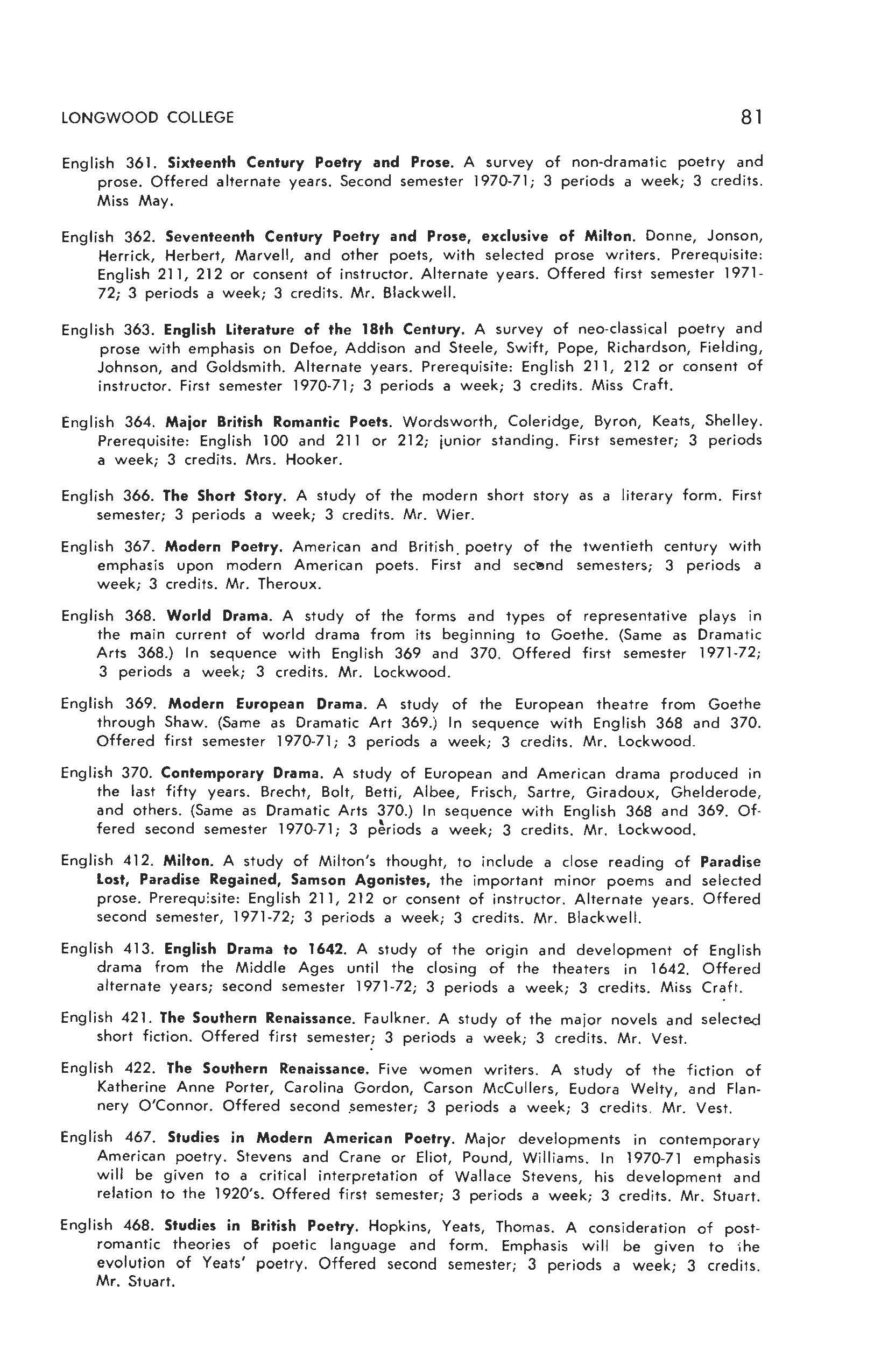
English 369. Modern European Drama. A study of the European theatre from Goethe through Shaw. (Same as Dramatic Art 369.) In sequence with English 368 and 370. Offered first semester 1970-71; 3 periods a week; 3 credits. Mr. Lockwood.
English 370. Contemporary Drama. A study of European and American drama produced in the last fifty years. Brecht, Bolt, Betti, Albee, Frisch, Sartre, Giradoux, Ghelderode, and others. (Same as Dramatic Arts 370.) In sequence with English 368 and 369. Offered second semester 1970-71; 3 p~riods a week; 3 credits. Mr. Lockwood.
English 412. Milton. A study of Milton's thought, to include a close reading of Paradise Lost, Paradise Regained, Samson Agonistes, the important minor poems and selected prose. Prerequ:site: English 211, 212 or consent of instructor. Alternate years. Offered second semester, 1971-72; 3 periods a week; 3 credits. Mr. Blackwell.
English 413. English Drama to 1642. A study of the origin and development of English drama from the Middle Ages until the closing of the theaters in 1642. Offered alternate years; second semester 1971-72; 3 periods a week; 3 credits. Miss Craft.
English 421. The Southern Renaissance. Faulkner. A study of the major novels and selected short fiction. Offered first semester! 3 periods a week; 3 credits. Mr. Vest.
English 422. The Southern Renaissance. Five women writers. A study of the fiction of Katherine Anne Porter, Carolina Gordon, Carson McCullers, Eudora Welty, and Flannery O'Connor. Offered second _semester; 3 periods a week; 3 credits. Mr. Vest.
English 467. Studies in Modern American Poetry. Major developments in contemporary American poetry. Stevens and Crane or Eliot, Pound, Williams. In 1970-71 emphasis will be given to a critical interpretation of Wallace Stevens, his development and relation to the l920's. Offered first semester; 3 periods a week; 3 credits. Mr. Stuart.
English 468. Studies in British Poetry. Hopkins, Yeats, Thomas. A consideration of postromantic theories of poetic language and form. Emphasis will be given to ·;he evolution of Yeats' poetry. Offered second semester; 3 periods a week; 3 credits. Mr. Stuart.
English 300. Traditional Grammar and Modern English Grammar. Offered each semester; 3 periods a week; 3 credits. Mr. Herndon, Mrs. Tinnell.
English 325. language Arts and Reading in the Elementary School. (Same as Education 325.) Required for the B.S. degree in Elementary Education. Offered each semester; 3 periods a week; 3 credits. Mr. Banton, Miss Bland; Mrs. Page, Mrs. Simmons, Miss Trent.
English 400. The Teaching of English. A study of current practices with emphasis on specific techniques and materials. Offered each semester; 3 periods a week; 3 credits. Mr. Gresham, Mrs. Sneller.
English 401. Reading and Evaluation of Written Work. A tutorial course designed to prepare the teaching candidate to determine the effectiveness of English Composition. One period a week; l credit Permission of instructor required. The Staff.
Directed Teaching of English in the High School. Students majoring in English, preparing to teach English in the high school, carry on directed teaching in this field during their senior year as Education 400, under a general supervisor, supervising teacher, and a consultant in the Department of English. Consultant: Mr. Gresham, Mrs. Sneller.
Reading Improvement. Individualized programs designed to improve reading speed, comprehension, vocabulary, and study habits. Offered first semester; 2 periods a week; no credit. Mr. Gresham
An English major in the program for the degree of Master of Arts in Education must fulfill the following requirements totaling 30 semester hours:
English 510, 522, 600; Education 571 and 681; Pyschology 622; and nine semester hours of electives in English including at least one additional 600-level course.
For a student whose circumstances are exceptional, the department chairman may waive the requirement of English 600 and six hours of English courses may be substituted for it. In addition, the chairman may waive any requirements for which equivalents can be presented.
All courses numbered 500 and above have as a prerequisite at least two years of English.
English 510 . Introductory linguistics. An introduction to current topics in linguistics, primarily descriptive and historical, with emphasis upon various modern grammars and upon the development of the English language. Offered first semester; 3 periods a week; 3 credits (Replaces English 505 and 506). Miss Craft.

English 511, 512. Chaucer. A study of Chaucer's major poetry, with emphasis on Troilus and Criseyda in one semester, and on The Canterbury Tales in the other. Offered first and second semesters, alternate years; offered 1970-71; 3 periods a week; 3 credits each semester. Prerequisite: English 211, 212 or consent of instructor. Miss Sprague.
English 513. Middle English literature . A study of English literature from the Norman Conquest to Malory exclusive of Chaucer. Offered first semester; 3 periods a week; 3 credits. Miss Craft.
English 514. Arthurian literature. A comparative study of Arthurian materials of various countries from the medieval through the modern periods. Offered second semester; 3 periods a week; 3 credits. Miss Craft.
English 522. Practical Literary Criticism. A study of the various methods of evaluating literature. Historical, humanistic, philosophical, and formalistic approaches demonstrated in the criticism of the selected works. Second semester; 3 periods a week; 3 credits. Mr. Hevener.
English 532. Literature of the South. A survey of literature produced in the South from 1607 to the present, with emphasis on Poe, the Nashville Agrarians, and Faulkner. First and second semesters; 3 periods a week; 3 credits. Mr. Sowder.
English 533, 534. Comparative Literature. First semester: ancient, medieval, and Renaissance European classics in translation. Second semester: European literature of the neoclassical romantic, and modern periods in translation. Prerequisite: 6 hours of credit in English or foreign language literature beyond the freshman level; senior or graduate standing. Recommended to be taken concurrently with Philosophy 361 or 362. First and second semesters; 3 periods a week; 3 credits each semester. Mrs. Hooker.
English 560, 561. Shakespeare. A chronological study of Shakespeare's works (Same as Dramatic Arts 560, 561). First and second semesters; 3 periods a week; 3 credits each semester. Miss May.
English 565, 566. Literature of the Victorian Age. A study of the major literary figures of the Victorian Age, with emphasis on Tennyson, Browning, Arnold, Rossetti, Swinburne, Carlyle, Macaulay, Ruskin and Pater; some attention to be given to the major novelists. First and second semesters. Alternate years; offered 1971-72, three periods a week; 3 credits each semester. Prerequisite: English 211, 212 or consent of instructor. Miss Sprague.
English 568. Yeats and Joyce. A study of the complete poems of Yeats and the novels of Joyce, primarily Portrait and Ulysses, with a consideration of the general Irish Revival. Second semester; 3 periods a week; 3 credits. Mr. Theroux.
English 600. Thesis Research. Study of a selected topic for the Master's thesis under the the direction of a departmental advisor. 6 credits.

English 631. Study of a Literary Figure: Shakespeare. Alternate years. Offered first semester 1971-72 one 2½-hour period a week; 3 credits. Mr. Blackwell, Miss May.
English 632. Study of a Literary Figure: Keats. Alternate years. Offered second semester 1972-73; one 2½-hour period a week; 3 credits. Mrs. Hooker.
English 633. Studies in 19th Century American Literature. Hawthorne and Melville, or Whitman and Dickinson, or Twain, Howells, and James. May be taken twice with consent of instructor. Offered second semester and summer school; 2 periods a week; 3 credits. Mr. Frank.
English 634, 635. Study of a Literary Figure: Browning or Tennyson. 1969-70, Browning; 1970-71, Tennyson. Offered second semester; one 2-hour period a week; 3 credits. Miss Sprague.
English 636. Study of a Literary Figure: James Joyce. Offered summer, 1970; one 2-hour period a week; 3 credits. Mr. Theroux.
English 651. Seminar in English Composition. Procedures and problems of composition, including readings in current literature on rhetoric and style. 3 credits. Staff.
Mrs. Ernouf, Mrs Narkinsky, Mr. Nunn, Mr. Sandidge, Mrs. Silveira
Majors in French, German or Spanish must complete 24 hours in the language beyond the Intermediate course. Majors in French and Spanish must include courses numbered 241-242, 401 and 402, and 12 additional hours Majors in German must include courses numbered 241-242 and 315 and 15 addit ional hours Courses numbered 241-242 are prerequisite to other literature courses in the language Those preparing to teach must take the Methods course. Supporting courses are recommended in the other Humanities. Study of a second foreign language is strongly recommended. Majors in Elementary Education are encouraged to certify in the language of their choice .
Majors in Latin, through the cooperative program with HampdenSydney Co l lege, must complete 18 semester hours in the language beyond the Intermediate course and 6 semester hours in either a modern foreign language beyond the beginning level at Longwood Collge , or Greek at Hampden-Sydney. At least one semester of Ancient History is recommended for Latin majors. Those preparing to t~ach must meet the usual requirements in Education.
Longwood in Europe, through the facilities of the University of Poitiers (Institute of Touraine) and the University of Barcelona, awards six credits in French or Spanish upon successful completion of its summer program. Credit may be earned in all French and Spanish courses, excluding methods (400), the general survey of literature (241-242), and the period survey courses
A student who plans to take courses abroad , other than through the Longwood in Europe program, is required, in order to receive credit, to submit well in advance to the chairman of the department and to the Dean of the College a written statement describing the plan under which the student expect.s to study.

French 111-112. Beginning French . A b al an ced p ro g ra m in unders t and i ng , speaki ng, reading and writing proficienc y w ithin the frame w ork of a first-year college program _ Tw o hours of laborator y practice required w eekl y ; 3 period s a w eek; 4 c redits each semester. No credit given to a stu d ent w ith two ye a rs or m ore of se condar y school stud y in the language. Mrs. Ernouf.
French 121-122. Intermediate French. Readings in aspects of French civilization and introductory literary texts. Review of grammar. Laboratory practice. Prerequisite: French 111-112 or equivalent. 3 periods a week; 3 credits each semester. Does not fulfill the general education requirement in literature. Mrs. Ernouf.
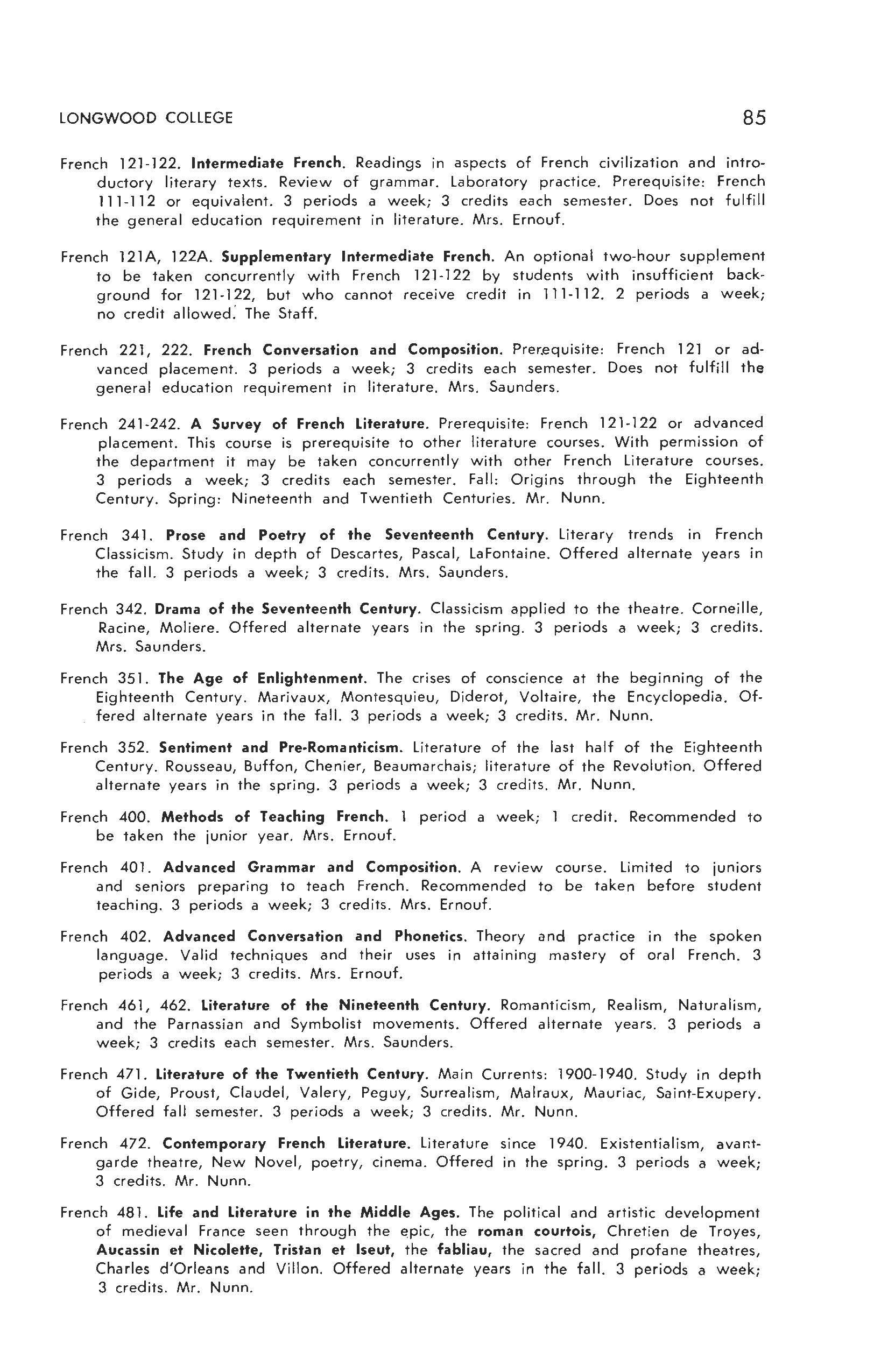
French 121 A, 122A. Supplementary Intermediate French. An optional two-hour supplement to be taken concurrently with French 121-122 by students with insufficient background for 121-122, but who cannot receive credit in 111-112. 2 periods a week; no credit allowed: The Staff.
French 221, 222. French Conversation and Composition. Prer.equisite: French 121 or advanced placement. 3 periods a week; 3 credits each semester. Does not fulfill the general education requirement in literature. Mrs. Saunders.
French 241-242. A Survey of French Literature. Prerequisite: French 121-122 or advanced placement. This course is prerequisite to other literature courses. With permission of the department it may be taken concurrently with other French Literature courses. 3 periods a week; 3 credits each semester. Fall: Origins through the Eighteenth Century. Spring: Nineteenth and Twentieth Centuries. Mr. Nunn.
French 341. Prose and Poetry of the Seventeenth Century. Literary trends in French Classicism. Study in depth of Descartes, Pascal, Lafontaine. Offered alternate years in the fall. 3 periods a week; 3 credits. Mrs. Saunders.
French 342. Drama of the Seventeenth Century. Classicism applied to the theatre. Corneille, Racine, Moliere. Offered alternate years in the spring. 3 periods a week; 3 credits. Mrs. Saunders.
French 351. The Age of Enlightenment. The crises of conscience at the beginning of the Eighteenth Century. Marivaux, Montesquieu, Diderot, Voltaire, the Encyclopedia. Offered alternate years in the fall. 3 periods a week; 3 credits. Mr. Nunn.
French 352. Sentiment and Pre-Romanticism. Literature of the last half of the Eighteenth Century. Rousseau, Buffon, Chenier, Beaumarchais; literature of the Revolution. Offered alternate years in the spring. 3 periods a week; 3 credits. Mr. Nunn.
French 400. Methods of Teaching French. l period a week; l credit. Recommended to be taken the junior year. Mrs. Ernouf.
French 401. Advanced Grammar and Composition. A review course. Limited to juniors and seniors preparing to teach French. Recommended to be taken before student teaching. 3 periods a week; 3 credits. Mrs. Ernouf.
French 402. Advanced Conversation and Phonetics. Theory and practice in the spoken language. Valid techniques and their uses in attaining mastery of oral French. 3 periods a week; 3 credits. Mrs. Ernouf.
French 461, 462. Literature of the Nineteenth Century. Romanticism, Realism, Naturalism, and the Parnassian and Symbolist movements. Offered alternate years. 3 periods a week; 3 credits each semester. Mrs. Saunders.
French 471. Literature of the Twentieth Century. Main Currents: 1900-1940. Study in depth of Gide, Proust, Claudel, Valery, Peguy, Surrealism, Malraux, Mauriac, Saint-Exupery. Offered fall semester. 3 periods a week; 3 credits. Mr. Nunn.
French 472. Contemporary French Literature. Literature since l 940. Existentialism, avantgarde theatre, New Novel, poetry, cinema. Offered in the spring. 3 periods a week; 3 credits. Mr. Nunn.
French 481. Life and Literature in the Middle Ages. The political and artistic development of medieval France seen through the epic, the roman courtois, Chretien de Troyes, Aucassin et Nicolette, Tristan et lseut, the fabliau, the sacred and profane theatres, Charles d'Orleans and Villon. Offered alternate years in the fall. 3 periods a week; 3 credits. Mr. Nunn.
French 482 Life and Literature in the Sixteenth Century . The age of the Rena issance and the Reformation. The mood and philosophy of the time and its expression in the works of leading authors such as Rabelais, the members of the Pleiade, DuBellay, Ronsard, and Montaigne. Offered alternate years in the spring 3 periods a week; 3 creqits. Mr. Nunn.
French 491, 492. Special Topics in Literature and Civilization. The topics will rotate on a regular basis from semester to semester. Prerequisite: senior standing or perm1ss1on of the instructor. 3 periods a week ; 3 credits each semester Taught on the Block. The Staff.
French 521. Directed Study . Individualized study in literature. Recommended only when mater ial cannot be studied in scheduled courses. By permission of department chairman. 3 credits. No more than 6 credits may be earned in 521 The Staff
German 111-112. Beginning German. A balanced program in understanding, speaking, reading and writing proficiency within the framework of a first-year college program. 3 periods lecture, 2 periods laboratory per week; 4 credits each semester. No credit given to a student with 2 years or more of secondary school study of the language. Mr. Sandidge.

German 121-122. Intermediate German. Readings from contemporary German literature. Review of grammar. Laboratory practice. Prerequisite: German 111-112 or equivalent. Does not fulfill the general education requirement in literature. 3 periods a week; 3 credits. Mr. Sandidge.
German 241-242. Introduction to German Literature. Survey of German Literature from the Enlightenment to the present Prerequisite : German 121-122 or advanced placement. This course is prerequisite to all other literature courses With permission of the department, it may be taken concurrently with other German Literature courses. 3 periods a week; 3 credits . Mr. Sandidge.
German 311, 312. Advanced Co'lversation and Composition. First semester: Extensive practice in speaking and writing German through dialogues, discussions and compositions. Second semester: German stylistics. Does not satisfy the general education requirement in literature 3 periods a week; 3 credits each semester. Mr Sandidge.
German 315 The Structure and Sounds of German. A lingu:stic analysis of the German Language: phonetics, phonemics , morphology and syntax. 3 periods a week ; 3 credits. Mr Sandidge.
German 400. Methods of Teaching German. 1 period a week ; 1 credit. Recommended to be taken in the junior year Mrs Ernouf
German 411, 412. Topics in German Literature. The topic will depend on the needs of advanced students of German dur i ng a given semester Topics include : the age of Goethe, the 19th and 20th Centurie s, German Literature prior to 1750, drama , the Novelle, the novel and lyric poetry 3 periods a week; 3 credits e ach semester. Mr. Sandidge.
German 521. Directed Study. Individualized study in literature. Recommended only when material cannot be studied in scheduled courses. By permission of department chairman. 3 credits. The Staff.
Spanish 111-112. Beginning Spanish . A balanced program in understanding , speaking, reading and writing proficiency within the framework of a first-year college program . 2 hours laboratory pract ice required weekly. 3 periods a week ; 4 credits each semester No credit given to a student with two years or more of secondary school study in the language Mrs Narkinsky
Spanish 121-122. Intermediate Spanish . Read i ngs in aspects of Spanish and Latin American civilization. Review of grammar Laboratory practice. Prerequisite : Spanish 111-112
or equivalent. 3 periods a week; 3 credits each semester. Does not fulfill the general education requirement in literature Mrs Glascock
Spanish 121 A, 122A. Supplementary Intermediate Spanish. An optional two-hour supplement lo be taken concurrently with Spanish 121-122 by students with insufficient background for 121-122, but who cannot receive credit in 111-112. 2 periods a week; no credit allowed. The Staff.
Spanish 221, 222 Spanish Convenation and Composition . Prerequisite : Spanish 121 or advanced placement. 3 periods a week; 3 credits each semester. Does not fulfill the general education requirement in literature. Mrs Silveira.
Spanish 241-242. A Survey of Spanish literature. Prerequisite: Spanish 121-122 or advanced placement. This course is prerequisite lo other literature courses With permission of the department ii may be taken concurrently with other Spanish literature courses . 3 periods a week; 3 credits each semester. Mrs. Narkinsky.
Spanish 331, 332 Spanish American literature. A study of representative authors from the colonial period lo the present. 3 periods a week; 3 credits each semester. Mrs. Silveira
Spanish 400. Methods of Teaching Spanish. 1 period a week; 1 credit. Recommended lo be taken in the junior year. Mrs. Ernouf.
Spanish 401. Advanced Grammar and Composition. A review course. Limited lo juniors and seniors preparing lo teach Spanish . Recommended lo be taken before student leaching 3 periods a week; 3 credits. Mrs. Silveira
Spanish 402 Advanced Conversation and Phonetics . Theory- and practice in the spoken language . Valid techniques and their uses in attaining a master~ of oral Spanish . 3 periods a week; 3 credits. The Staff.
Spanish 431. Spanish American Novel. A study of representative authors of Spanish America. 3 periods a week; 3 credits. Offered alternate years. Mrs. Silveira.
Spanish 441, 442. Golden Age Drama and Poetry . A study of representative poets and dramatists of the Sixteenth and Seventeenth Centuries. First semester: Romances, Renaissance poetry, and the precursors of Lope de Vega. Second semester: The comedia nueva and baroque poetry . 3 periods a week; 3 credits each semester . Offered alternate years Mrs. Narkinsky
Spanish 451. Cervantes The Quijote and selections from the minor works of the author~ 3 periods a week; 3 credits. Offered alternate years. Mrs. Narkinsky
Spanish 452 Golden Age Prose. Representative g~nres and authors of the Sixteenth and Seventeenth Centuries, excluding Cervantes . 3 periods a week; 3 credits. Offered alternate years Mrs. Narkinsky
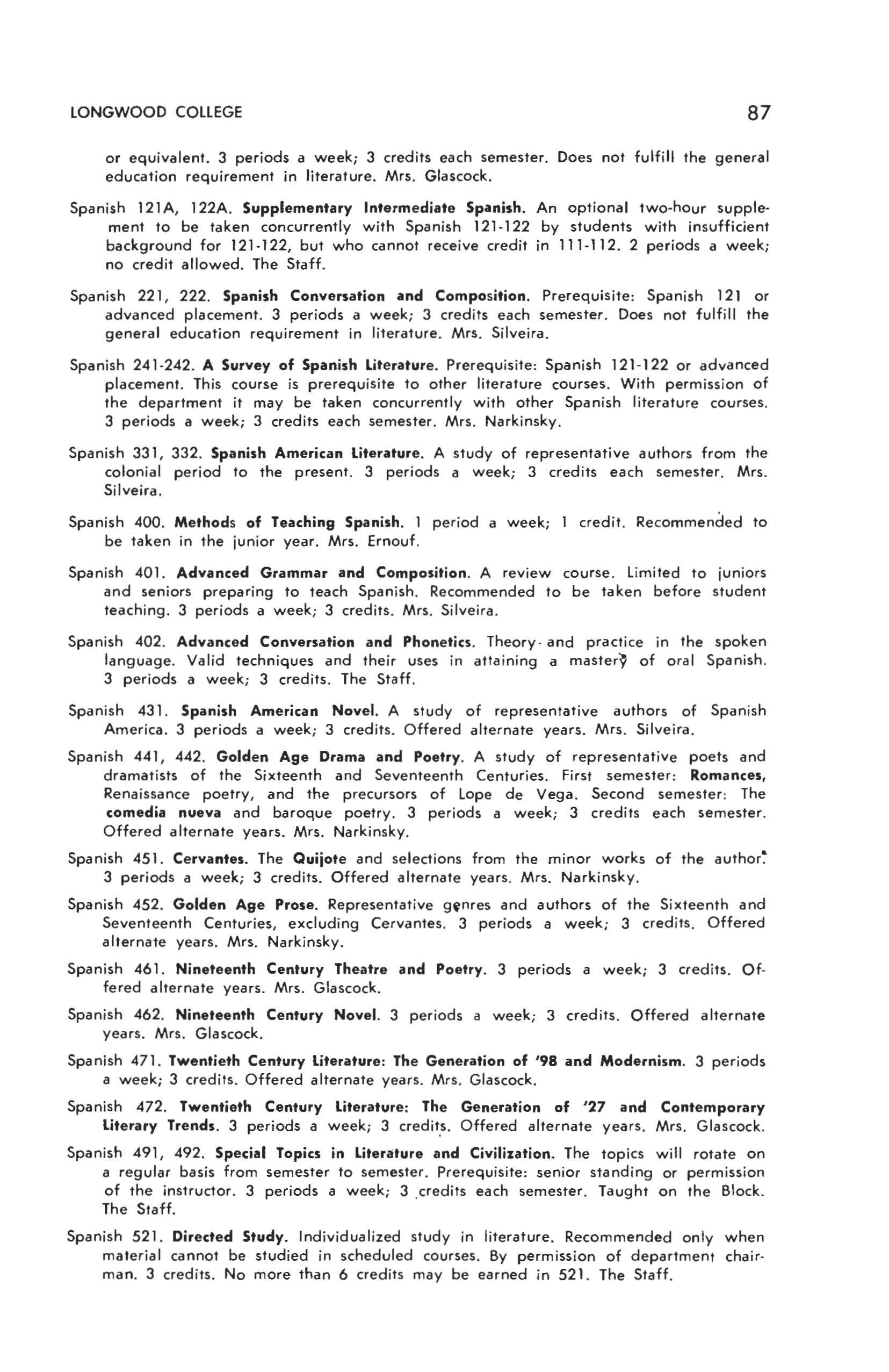
Spanish 461 Nineteenth Century Theatre and Poetry . 3 periods a week; 3 credits. Offered alternate years. Mrs. Glascock .
Spanish 462. Nineteenth Century Novel . 3 periods a week; 3 credits . Offered alternate years. Mrs. Glascock.
Spanish 471 Twentieth Century literature: The Generation of '98 and Modernism. 3 periods a week; 3 credits . Offered alternate years. Mrs. Glascock.
Spanish 472. Twentieth Century literature : The Generation of '27 and Contemporary literary Trends. 3 periods a week; 3 credit s. Offered alternate years. Mrs. Glascock.
Spanish 491, 492 Special Topics in literature and Civilization. The topics will rotate on a regular basis from semester to semester. Prerequisite: senior standing or perm1ss1on of the instructor. 3 periods a week; 3 credits each semester. Taught on the Block. The Staff
Spanish 521. Directed Study. Individualized study in literature. Recommended only when material cannot be studied in scheduled courses By permission of department chairman. 3 credits. No more than 6 credits may be earned in 521. The Staff.
Mr. Berkis, Mr Burke, Mr Couture, Mrs. Cover, Mr Cristo, Mr Crowl, Mr. Dent, Mr. Duke, Mrs. Ergler, Miss Etheridge, Mr Gilchrist, Mr Glascock , Mr. Hall, Mr. Helms, Mr. Magnusson, Mr. Millar, Mr. Ra, Mr. Rubley, Mr. Sneller, Mr. Stoi'likinis, Miss White
The Department of History and the Social Sciences offers courses in anthropology, economics, geography, government, history, and sociology. Majors may be 1aken in History, Economics, Geography, Government, Sociology, or Social Science . All of these majors meet the Collegiate Professional Certification standards for teaching in Virginia . For a state endorsement in history, geography, government, or sociology, a course in basic economics is required.
The following courses totaling 48 semester hours are required for a Social Science major
History 111 , 112 6 hours
Geography 141 , 142 6 hours History 22 l, 222 6 hours
Government 225, 226 6 hours Histor y 334 3 hours
Government elective 6 hours History 343 3 hours Economics 331 332 6 hours History 452 3 hours Sociology 22 l 3 hours
The major in History requires 30 semester hours in History beyond one of the survey courses (History l l l, 112, or History 22 l, 222), and 12 hours in related Social Sciences (3 hours must be in economics) . Students majoring in History are required to complet~ , in sequence, Plan l or Plan 2 listed below.

Plan Plan 2
H i story 111, 112 6 hours
History 221 , · 222 6 hours History 305 3 hours
History 339 3 hours History 334 3 hours History 340 3 hours H i story 402 3 hours
H i story 34 l 3 hours History 447 3 hours
History 342 3 hours History 449 3 hours History 343 3 hours Hi story 452 3 hours
H i story 452 3 hours Eu r opean His t ory
American History ele ctive 6 hour s elective 6 hours Histor y e le ctives 6 hours History ele c tives 6 hours 36 hours 36 hours
Students must fulfill their General Education requirements by taking History 221 or 222, and by taking nine hours in at least two of the following areas: Anthropology, Economics, Geography, Government, History, or Sociology. Speeific courses recommended by the department are indicated by an asterisk in the course descriptions. Elementary Education majors must take History 111, 112 and Economics 202.
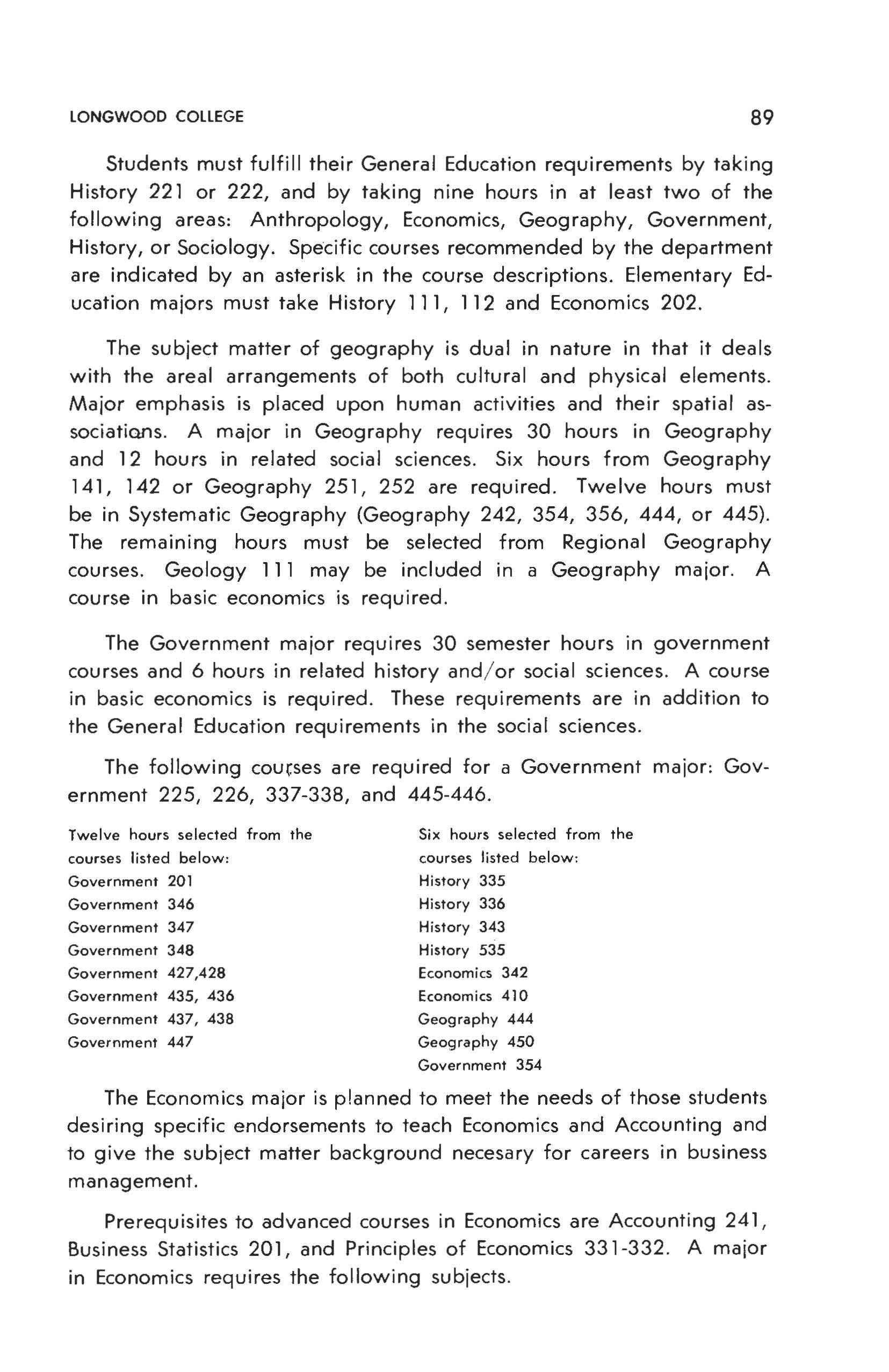
The subject matter of geography is dual in nature in that it deals with the areal arrangements of both cultural and physical elements . Major emphasis is placed upon human activities and their spatial associations . A major in Geography requires 30 hours in Geography and 12 hours in related social sciences . Six hours from Geography 141, 142 or Geography 251, 252 are required. Twelve hours must be in Systematic Geography (Geography 242, 354, 356, 444, or 445). The remaining hours must be selected from Regional Geography courses . Geology 111 may be included in a Geography major . A course in basic economics is required.
The Government major requires 30 semester hours in government courses and 6 hours in related history and / or social sciences. A course in basic economics is required . These requirements are in addition to the General Education requirements in the social sciences .
The following cour.ses are required for a Government major: Government 225, 226, 337-338, and 445-446.
Twelve hours selected from the course s listed below: Government 201 Government 346 Government 347 Government 348 Government 427,428 Government 435, 436 Government 437, 438 Government 447
Six hours selected from the courses listed below: History 335 History 336 History 343 History 535 Economics 342 Economics 410 Geography 444 Geography 450 Government 354
The Economics major is p!anned to meet the needs of those students desiring specific endorsements to teach Economics and Accounting and to give the subject matter background necesary for careers in business management.
Prerequisites to advanced courses in Economics are Accounting 241, Business Statistics 201, and Principles of Economics 331-332 A major in Economics requires the following subjects .
Principles of Economics
Approved elective Economics courses Business Statistics Elementary Accounting ___________________ __________________ _ Inte rmedi ate Accounting ____________ _____________________________ _ Income taxes and payroll accounting _______________________________________________________ _
Business Law
TOTAL
BULLETIN OF 6 hours 9 hours 3 hours 6 hours 3 hours 3 hours 3 hours 33 hours
The major in Sociology is planned to meet the needs of those students desiring to enter the field of social work or desiring to enter a graduate school of sociology. These students may take either the Bachelor of Arts or the Bachelor of Science degree. Students who plan to teach on the secondary level should major in one of the other social sciences and take eighteen hours in Sociology in order to receive an endorsement to teach Sociology.
The requirements for a major in Sociology with a concentration in social welfare are as follows:
A. Humanities English 100 ___________ English and/ or American Literature Art, Music, Dramatic Arts _______ _ Philosophy P.lective
B. Social Sciences History 221, 222 _________________________________________ _ Economics 331, 332 ________________ _________________________ _
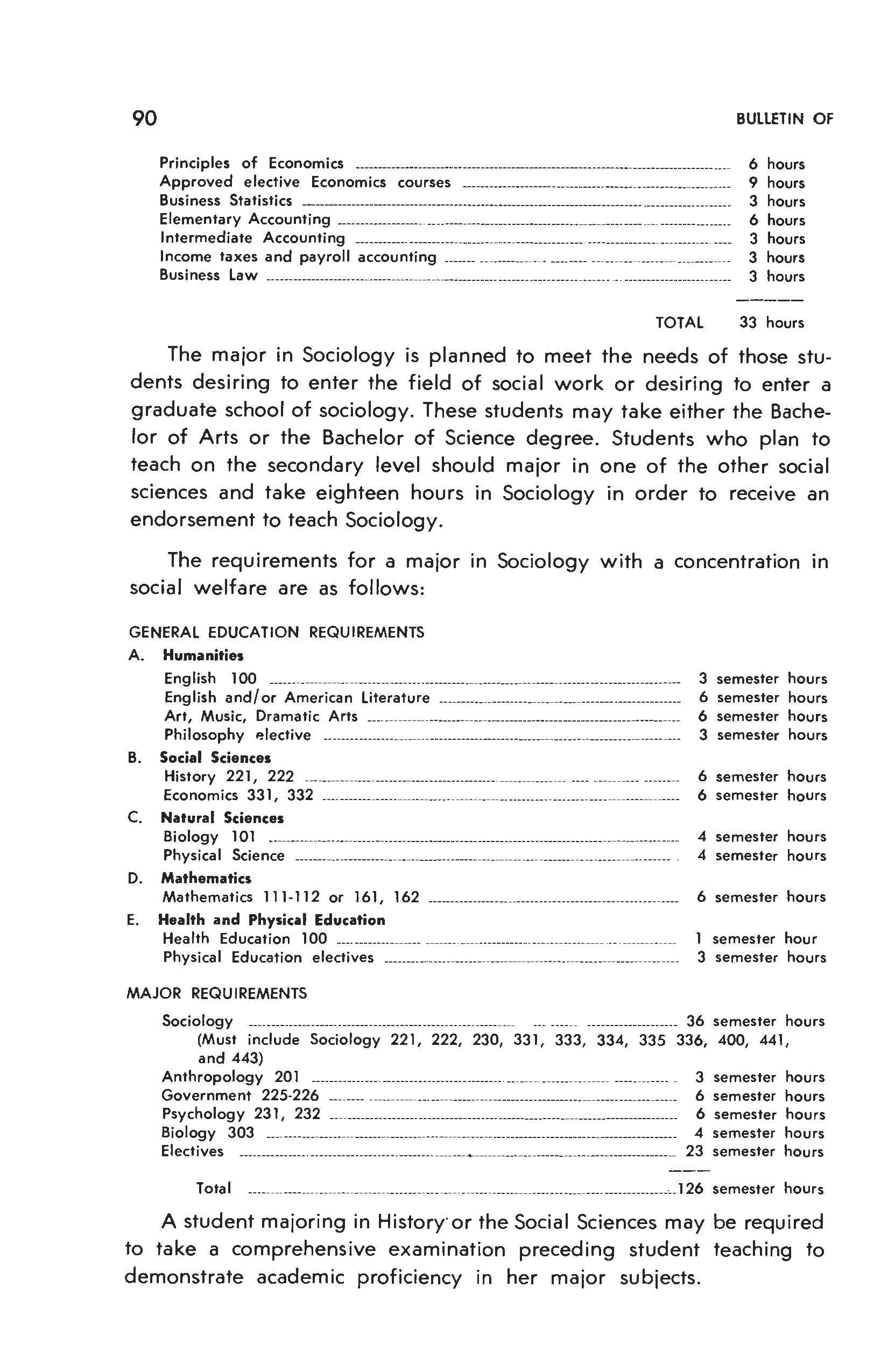
C. Natural Sciences Biology 101 Physical Science D. Mathematics Mathematics 111-112 or 161, 162 E. Health and Physical Education Health Education 100 ___________________ _ ___________________________ _ Physical Education electives ______________________________________________ _
3 semester hours 6 semester hours 6 semester hours 3 semester hours 6 semester hours 6 semester hours 4 semester hours 4 semester hours 6 semester hours l semester hour 3 semester hours
Sociology _____________________________ 36 semester hours (Must include Sociology 221, 222, 230, 331, 333, 334, 335 336, 400, 441, and 443) Anthropology 201 _______ _________ _____ ____________ _ 3 semester hours Government 225-226 ________________ ____________________ 6 semester hours Psychology 231, 232 6 semester hours Biology 303 ----------------•---------------------------------------------------------- 4 semester hours Electives ____________________________ 23 semester hours
Total ___________________________________________________________________________________________ c_ l 26 semester hours
A student majoring in History-or the Social Sciences may be required to take a comprehensive examination preceding student teaching to demonstrate academic proficiency in her major subjects.
History 221, 222 ** American History . An introductory survey course in American history First semester: Colonial Period to 1865; second semester : 1865 to present ; 3 periods a week; 3 credits each semester. The Staff
History 334. Domestic United States History Since 1900. Prerequisite : History 221 or 222 Offered first semester; 3 periods a week; 3 cred its Mr Sneller
History 335 American Diplomatic History Since the Civil War. Prerequisite : History 222 Offered second semester ; 3 periods a week ; 3 credits . Mr . Sneller .
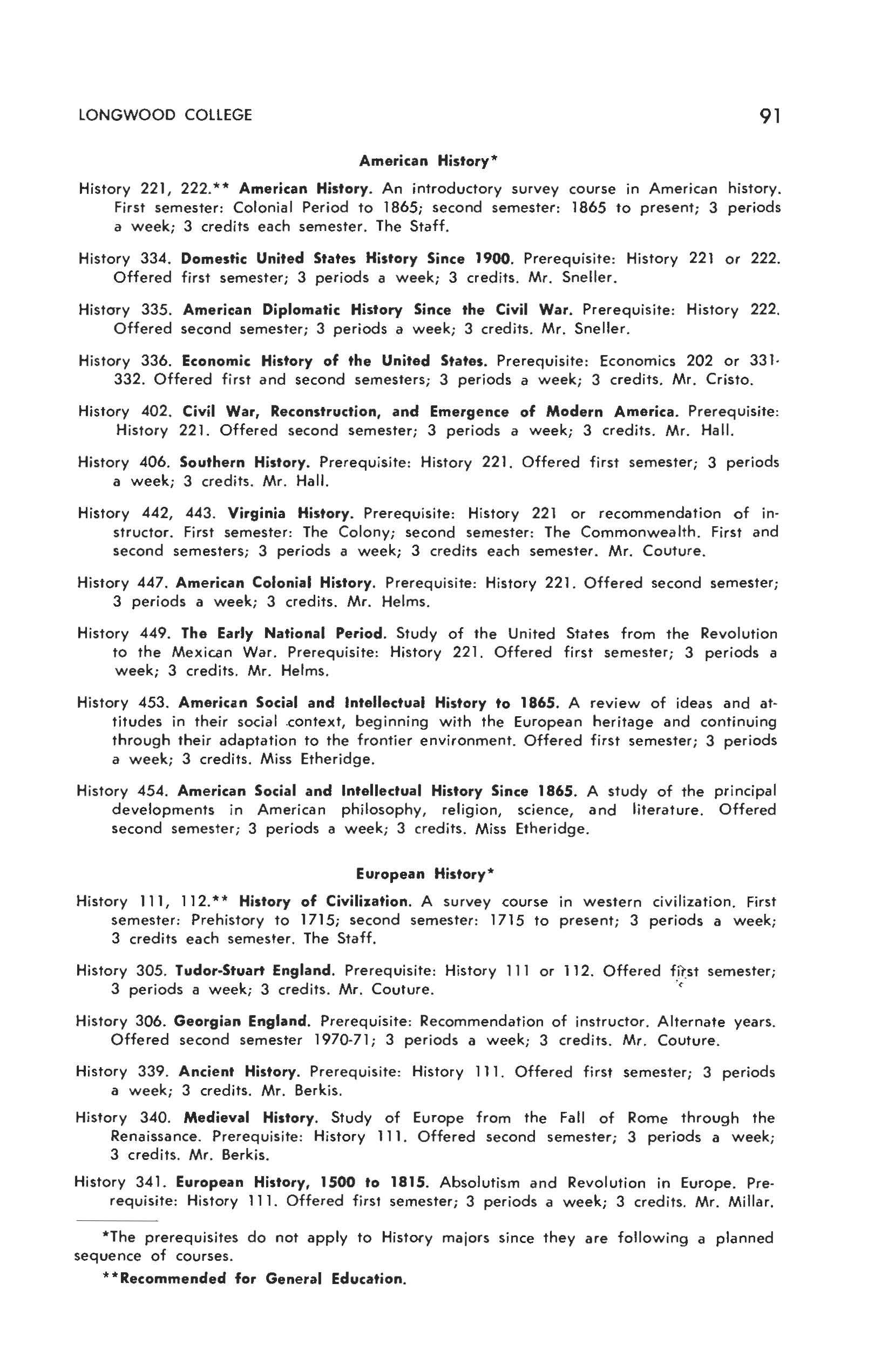
History 336. Economic History of the United States. Prerequisite : Economics 202 or 331 332 . Offered first and second semesters; 3 periods a week ; 3 credits . Mr . Cristo .
History 402 Civil War, Reconstruction, and Emergence of Modern America. Prerequisite: History 221. Offered second semester; 3 periods a week; 3 credits. Mr . Hall .
History 406 . Southern History . Prerequisite : History 221. Offered first semester; 3 periods a week; 3 cred i ts . Mr . Hall .
History 442, 443 Virginia History. Prerequisite : History 221 or recommendation of in · structor First semester: The Colony; second semester: The Commonweal t h. First and second semesters ; 3 periods a week; 3 cred its each semester . Mr. Couture .
History 447. American Colonial History . Prerequisite : History 221 Offered second semester ; 3 periods a week ; 3 credits Mr Helms
History 449 The Early National Period. Study of the United States from the Revolution to the Mexican War . Prerequisite: History 221. Offered first semester ; 3 per iods a week; 3 credits Mr Helms
History 453. American Social and Intellectual History to 1865. A review of ideas and at· titudes in their social .context, beginning with the European heritage and continuing through their adaptation to the frontier environment. Offered first semester ; 3 periods a week; 3 credits. Miss Etheridge.
History 454 American Social and Intellectual History Since 1865 . A study of the principal developments in Amer ican philosophy, religion, science, and literature. Offered second semester ; 3 periods a week ; 3 credits. Miss Etheridge
History 111, 112.** History of Civilization . A survey course in western civilization First seme s ter : Prehistory to 1715; second semester : 1715 to present ; 3 periods a week ; 3 cred its each semester The Staff
History 305 Tudor-Stuart England . Prerequ isite: History 111 or 112. Offered first semester; 3 periods a week; 3 credits . Mr. Couture . ·~·
History 306. Georgian England . Prerequisite: Recommendation of instructor Alternate years Offered second semester 1970-71 ; 3 periods a week; 3 credits. Mr Couture.
History 339 Ancient History. Prer e qu isite: History 111 Offered first semester ; 3 periods a week; 3 credits . Mr . Berk is .
History 340 Medieval History . Study of Europe from the Fall of Rome through the Renaissance Prerequisite : History 111 Offered second semester ; 3 periods a week ; 3 credits Mr Berkis
History 341. European History, 1500 to 1815 . Absolutism and Revolution in Europe. Prerequis ite : History 111. Off er ed first semester; 3 periods a week; 3 credits . Mr . Millar. *The prerequisites do not apply to History majors since they are following a planned sequence of courses **Recommended for General Educati on .
History 342. European History, 1815 to 1870. Nineteenth century European history. Prerequisite: History 111 or 112. Offered second semester; 3 periods a week; 3 credits. Mr. Millar.
History 343. European History, 1870 to the Present. Twentieth century European history. Prerequisite: History 111 or 112. Offered second semester; 3 periods a week; 3 credits. Mr. Berkis.
History 407. Victorian England (1815-1920). A study of the social, political, and cultural development of England from Castlereagh to the end of World War I. Prerequisite: History 111 or 112 or recommendation of instructor. Offered alternate years; 3 periods a week; 3 credits. Mr. Couture.
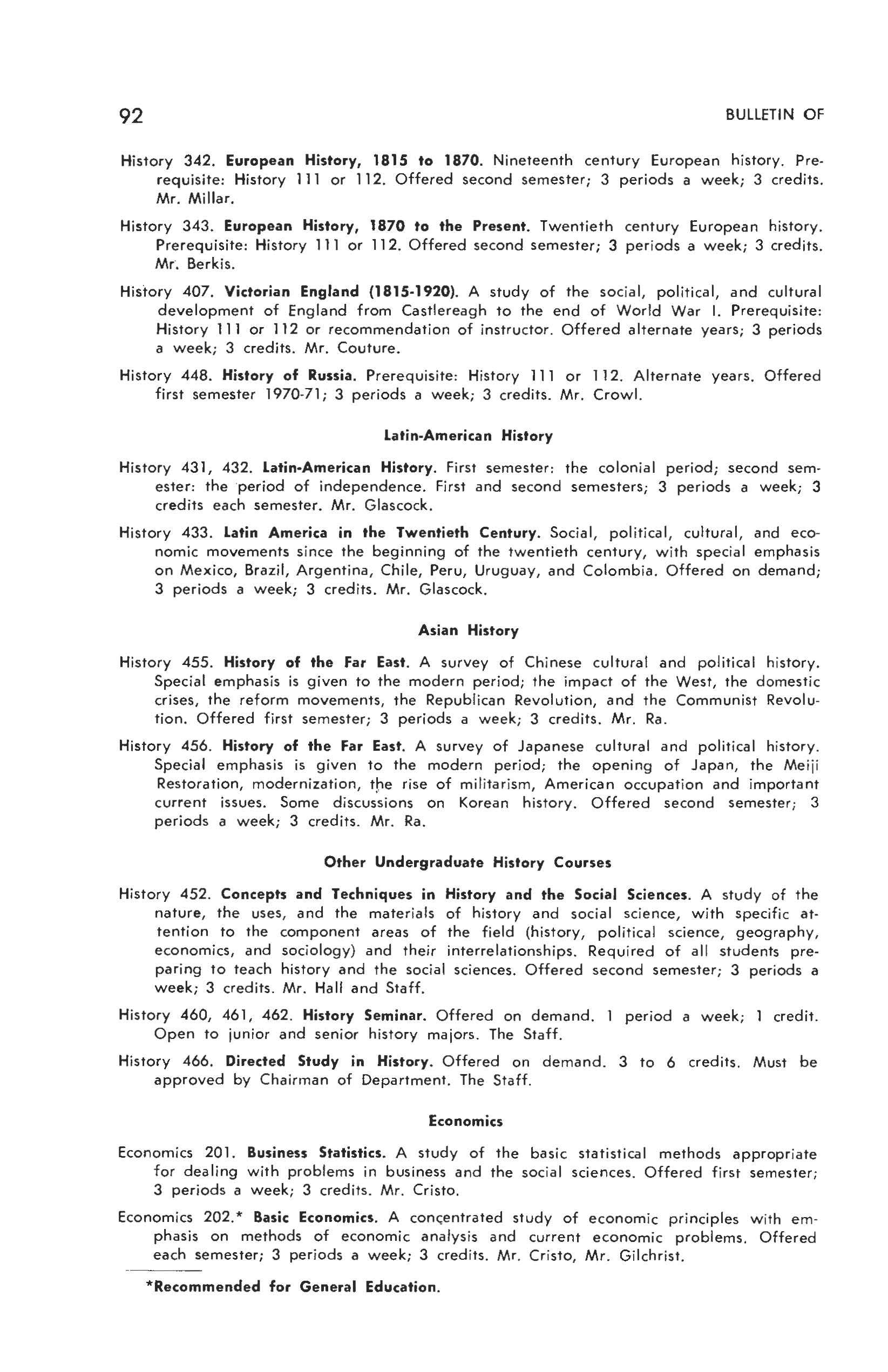
History 448. History of Russia. Prerequisite: History 111 or 112. Alternate years. Offered first semester 1970-71; 3 periods a week; 3 credits. Mr. Crowl.
History 431, 432. Latin-American History. First semester: the colonial period; second semester: the period of independence. First and second semesters; 3 periods a week; 3 credits each semester. Mr. Glascock.
History 433. Latin America in the Twentieth Century. Social, political, cultural, and economic movements since the beginning of the twentieth century, with special emphasis on Mexico, Brazil, Argentina, Chile, Peru, Uruguay, and Colombia. Offered on demand; 3 periods a week; 3 credits. Mr . Glascock.
History 455. History of the Far East. A survey of Chinese cultural and political history. Special emphasis is given to the modern period; the impact of the West, the domestic crises, the reform movements, the Republican Revolution, and the Communist Revolution. Offered first semester; 3 periods a week; 3 credits. Mr. Ra.
History 456. History of the Far East. A survey of Japanese cultural and political history. Special emphasis is given to the modern period; the opening of Japan, the Meiji Restoration, modernization, the rise of militarism, American occupation and important current issues. Some discu;sions on Korean history. Offered second semester; 3 periods a week; 3 credits. Mr Ra.
History 452. Concepts and Techniques in History and the Social Sciences. A study of the nature, the uses, and the materials of history and social science, with specific attention to the component areas of the field (history, political science, geography, economics, and sociology) and their interrelationships. Required of all students preparing to teach history and the social sciences. Offered second semester; 3 periods a week; 3 credits. Mr. Hall and Staff.
History 460, 461, 462. History Seminar. Offered on demand. 1 period a week; 1 credit. Open to junior and senior history majors. The Staff.
History 466. Directed Study in History. Offered on demand 3 to 6 credits. Must be approved by Chairman of Department The Staff.
Economics 201. Business Statistics. A study of the basic statistical methods appropriate for dealing with problems in business and the social sciences. Offered first semester; 3 periods a week; 3 credits. Mr Cristo
Economics 202. • Basic Economics. A con~enlrated study of economic principles with emphasis on methods of economic analysis and current economic problems. Offered each semester; 3 periods a week; 3 credits. Mr. Cristo, Mr. Gilchrist.
*Recommended for General Education.
Economics 331-331 • Principles of Economics . First and second semesters; 3 periods a week ; 3 cred its each semester Mr Cristo
Economics 336 Economic History of the United States . Prerequisite : Economics 202 or 331-332 Offered second semester 1970 71 ; 3 periods a week; 3 credits Mr. Cristo
Economics 342 . Comparative Economic Systems . A critical study of capitalism, socialism and autocrat ic systems. Offered on demand 3 per iods a week; 3 credits. Mr Cristo
Economics 406. Public Policies in Relation to Business and Labor. A study of the labor movement in the Un ited States and the changing public policy and regulation of both business and labor. Offered on demand ; 3 periods a week; 3 credits Mr Cristo
Economics 408 . History of Economic Throught . A study of the economic thought and theories from Aristotle to the present. Offered on demand ; 3 periods a week ; 3 credits Mr. Cristo
Economics 410 Problems of American Capitalism. A study of the structure and character istics of the Amer ican economic system, including an analysis of problems related to monopolies, collective bargaining , agriculture , poverty, foreign trade, inflation , and economic growth. Offered on demand 3 periods a week; 3 credits M r. Cristo
Economics 455 Money and Banking . First semester ; 3 periods week ; 3. credit s. Mr Leeper.
Economics 460 , 461, 462. Economics Seminar . Offered on demand ; 1 period a week ; credit. Mr. Cristo
Economics 465. International Trade . A study of the fundamental principles of international trade , balance of payments problems and problems of foreign exchange Offered on demand; 3 per iods a week ; 3 credits Mr Cristo
Geography 141, 142 • Principles of Geography. Fundamentals of geography as a founda , lion to the understanding of man's environment . f irst and second semesters ; 3 periods a week ; 3 credits each semester Mr Magnusson
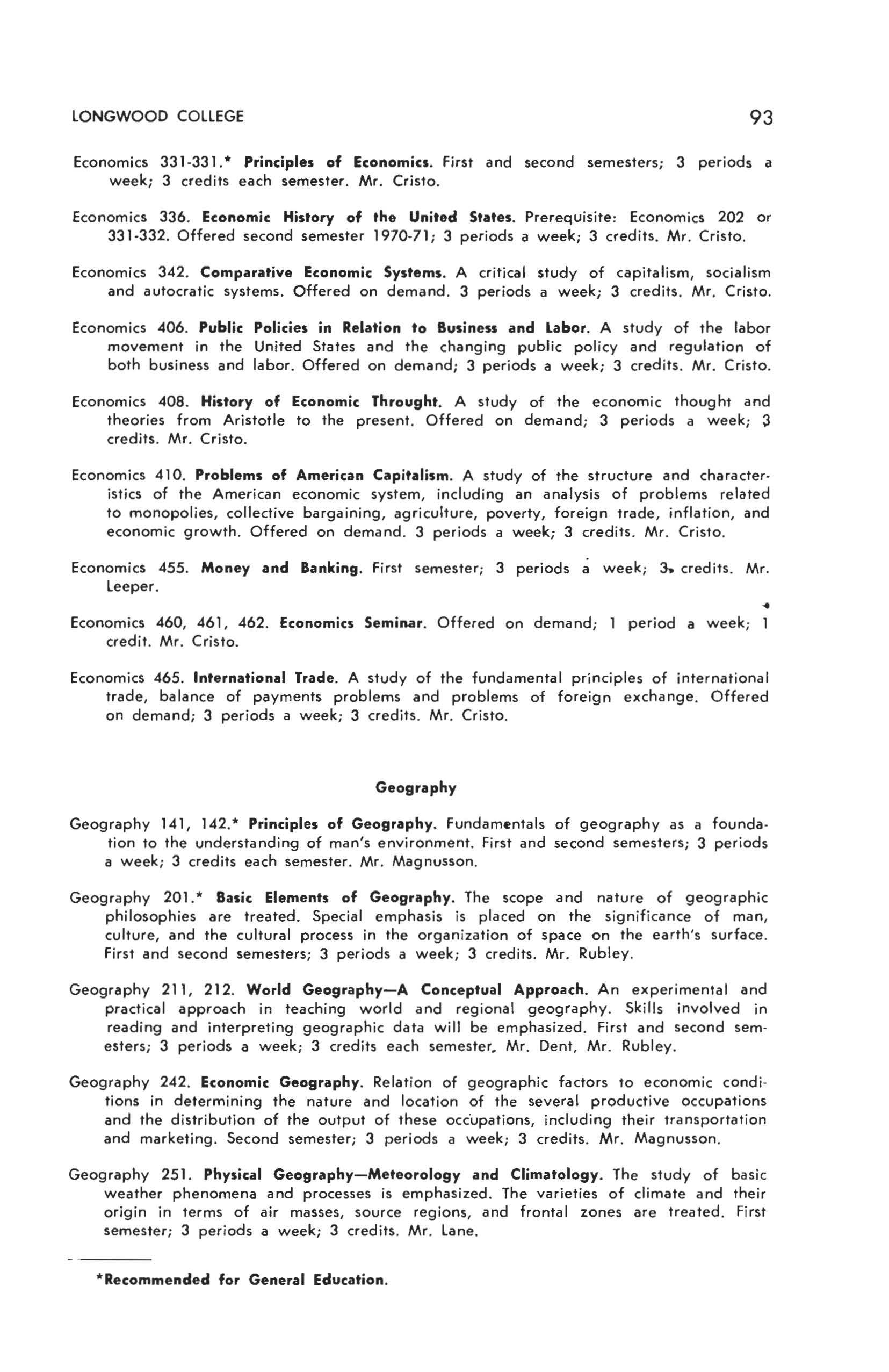
Geography 201.* Basic Elements of Geography. The scope and nature of geographic philosophies are treated. Special emphasis is pla ced on the s ign if ic ance of man , culture , and the cultural process in the organ iz ation of space on the earth 's surface First and second semesters ; 3 periods a week ; 3 credits. Mr. Rubley
Geography 211, 212 World Geography-A Conceptual Approach . An experimental and practical approach in teaching world and regional geography Sk i lls i nvolved in reading and interpreting geographic data will be emphasized. Fi rst and second sem esters ; 3 periods a week ; 3 credits each semester. Mr Dent , Mr. Rubley.
Geography 242 . Economic Geography . Relation of geographic factors to economic cond itions in determining the nature and location of the several productive occupations and the distribution of the output of these occ'upations, including their tran sp orta ti on and marketing. Second semester ; 3 periods a week; 3 credits Mr Magnusson
Geography 251. Physical Geography-Meteorology and Climatology. The study of basi c weather phenomena and processes is emphasized The varieties of climate and their origin in terms of air masses , source regions , and frontal zones are treated Fi rst semester; 3 per iods a week ; 3 credits. Mr Lane
*Recommended for General Education
Geography 252. Physical Geography-Pedology, Hydrology, Plant Geography and Earth Resources. A study of the physical environment in which terrestrial elements are analyzed and interrelated The natural resource base is emphasized. Second semester; 3 periods a week; 3 credits . Mr . Lane.
Geography 353. Geography of Virginia. Geographical appraisal of Virginia, including the geology, landforms , soils, climate, economic minerals, orig i nal vegetation, and the human geography of Virginia , emphasizing settlement and population, agriculture, industries, and transportat ion First and second semesters ; 3 periods a week; 3 credits . Mr . Lane .
Geography 354. Weather, Climate, and Man. An elementary background of various weather phenomena and climatic patterns. Particular emphasis is given to the effects of weather and climate upon man and his activities Alternate years. Offered first semester 1971-72; 3 periods a week; 3 credits. Mr. Lane
Geography 356. Conservation · of Natural Resources . Survey of resource problems and related conservation techniques in the United States Particular emphasis is placed upon the resource conservation problems of the Southeastern States. Alternate years. Offered second semester 1971-72; 3 periods a week; 3 credits Staff
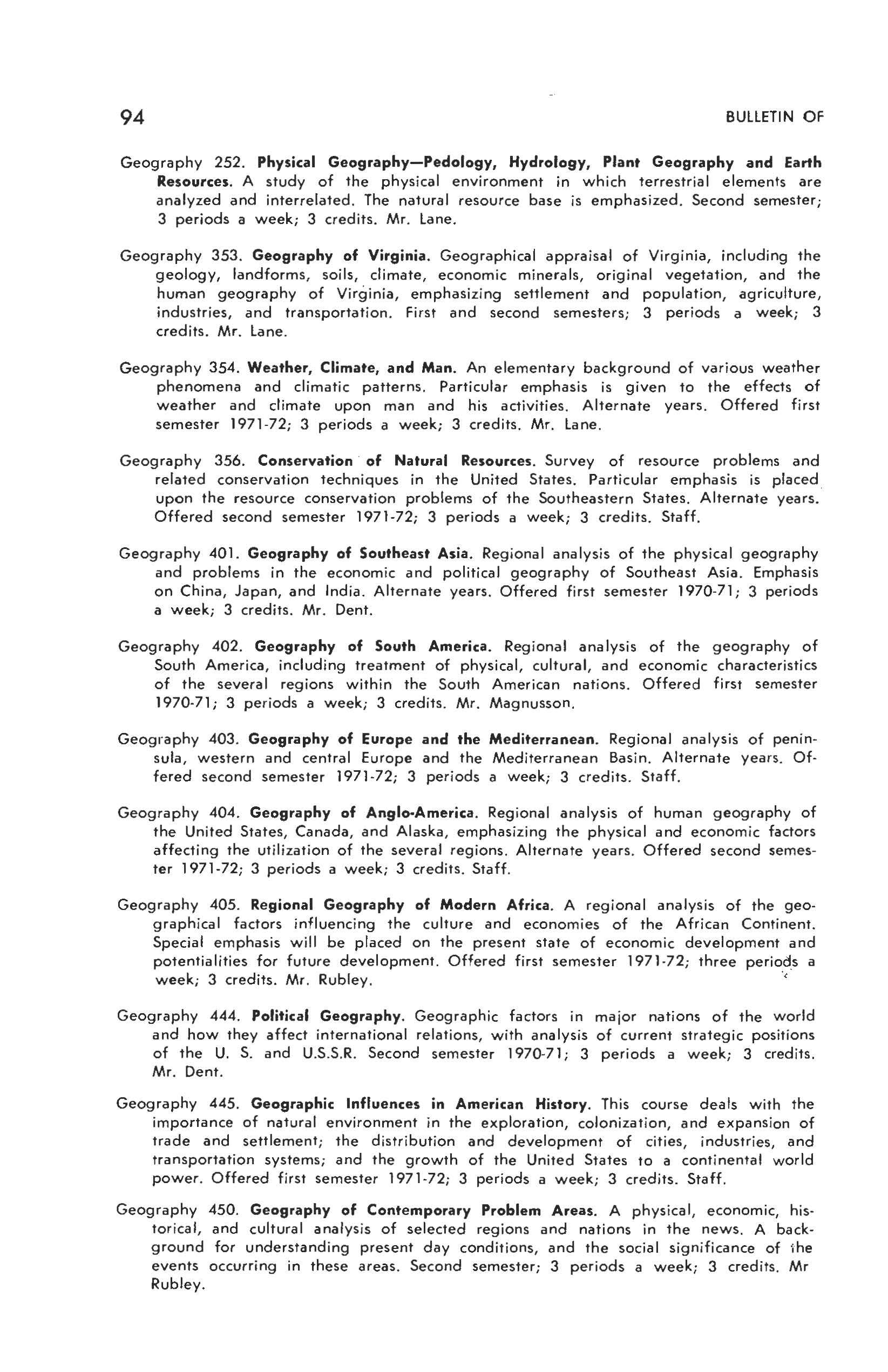
Geography 401. Geography of Southeast Asia. Reg ional analysis of the phys ical geography and problems in the economic and political geography of Southeast Asia Emphasis on China, Japan, and India. Alternate years Offered first semester 1970-71 ; 3 periods a week; 3 credits . Mr . Deni.
Geography 402. Geography of South America. Regional analysis of the geography of South America, including treatment of physical, cultural , and economic characteristics of the several regions within the South American nations Offered first semester 1970-71; 3 periods a week ; 3 credits. Mr. Magnusson.
Geography 403 . Geography of Europe and the Mediterranean . Regional analysis of peninsula, western and central Europe and the Mediterranean Basin. Alternate year s Offered second semester 1971-72; 3 periods a week; 3 credits Staff
Geography 404. Geography of Anglo-America. Regional analysis of human geography of the United States, Canada, and Alaska, emphasizing the physical and economic factors affecting the utilization of the several regions. Alternate years . Offered second semes ter 1971-72; 3 periods a week; 3 credits Staff
Geog r aphy 405. Regional Geography of Modern Africa. A regional analysis of the geographical factors influencing the culture and economies of the African Continent. Special emphasis will be placed on the present state of economic development and potentialities for future development. Offered first semester 1971 72 ; three period.s a week; 3 credits. Mr Rubley.
Geography 444. Political Geography. Geographic factors in major nations of the world and how they affect international relations, with analysis of current strategic positions of the U. S. and U.S S R Second semester 1970-71; 3 periods a week; 3 credits. Mr. Dent.
Geography 445 Geographic Influences in American History. This course deals with the importance of natural environment in the exploration, colonization, and expansion of trade and settlement ; the distribution and development of cities, industries, and transportation systems; and the growth of the United States to a continental world power Offered first semester 1971-72; 3 periods a week ; 3 credits. Staff.
Geography 450. Geography of Contemporary Problem Areas. A physical, economic, his torical, and cultural analys is of selected regions and nations in the news. A background for understanding present day conditions, and the social sign ificance of t he events occurring in these areas Second semester; 3 periods a week; 3 credits. Mr Rubley.
Geography 453. Geographical Appraisal of the Soviet Union. An evaluation of people, land, climate, resources, and space as they bear on economic developments and political prospects of the Soviet Union. First semester 1971-72; 3 periods a week; 3 credits. Mr. Rubley
Geography 454 Man's Role in Changing the Face of the Earth. A review of the diverse · ways cultures have transformed the natural landscapes of the world. Comparative studies of the land use by primitive and technologically advanced peoples Offered on demand; 3 periods a week; 3 credits. Mr. Lane .
Geography 455 The South: Landscapes and Folk Culture . Investigation of changes in the natural landscapes · wrought by man . Elements of material culture that give character to areas will be considered. Alternate years. Offered first semester 1970-71; 3 periods a week; 3 credits. Mr Rubley.
Geography 47.0, 471. ·'Geography Seminar. Offered on demand ; 3 periods a week; 3 credits. Instructor: Staff.
Government 201.* Introduction to Political Science. An introductory study of fundamental political principles and institutions. First and s econd semesters; 3 periods a week ; 3 credits. Mr Ra.
Government 225.* Federal, State, and Local Government. The introductory course in United Stated political institutions, utilizing a structural-functional examination of th is country's government and political processes. Offered f irst semester; 3 periods a week; 3 credits . Mr. Duke .
Government 226.* Federal, State, and Local Government. A problematical study of current problems, issues, and trends of United States politics . Such topics as Civil Rights, First Amendment freedoms, dissent and politi cal prote s t , and political violence are considered Offered second semester; 3 periods a week ; 3 credits. Mr. Duke.
Government 337. Political Thought to the Nineteenth Century. A stud y of the major western thinkers from classi'cal Greece to Rousseau. Offered first semesler 1970-71; 3 periods a week ; 3 credits Mr. Ra.
Government 338 . Contemporary Political Theory. Political Theory in the Nineteenth and Twentieth centuries with some attention to American pol it ical thought Offered second semester 1970-71; 3 periods a week; 3 cred its Mr. Ra
Government 346. American Political Theory. A critical examinat ion of the thought wh ich has conditioned the political life and institutions of the United States. Second semester 1971-72; 3 periods a week ; 3 credits. Mr. Duke.
Government 347. The Presidency, Parties, Politics and Pressure Groups in the United States . The nature and evolution of political parties; party o r ganizations; campaign techniques, suffrage, and elections. Offered second semester 1971 72; 3 p e riods a week; 3 credits. Mr. Duke.
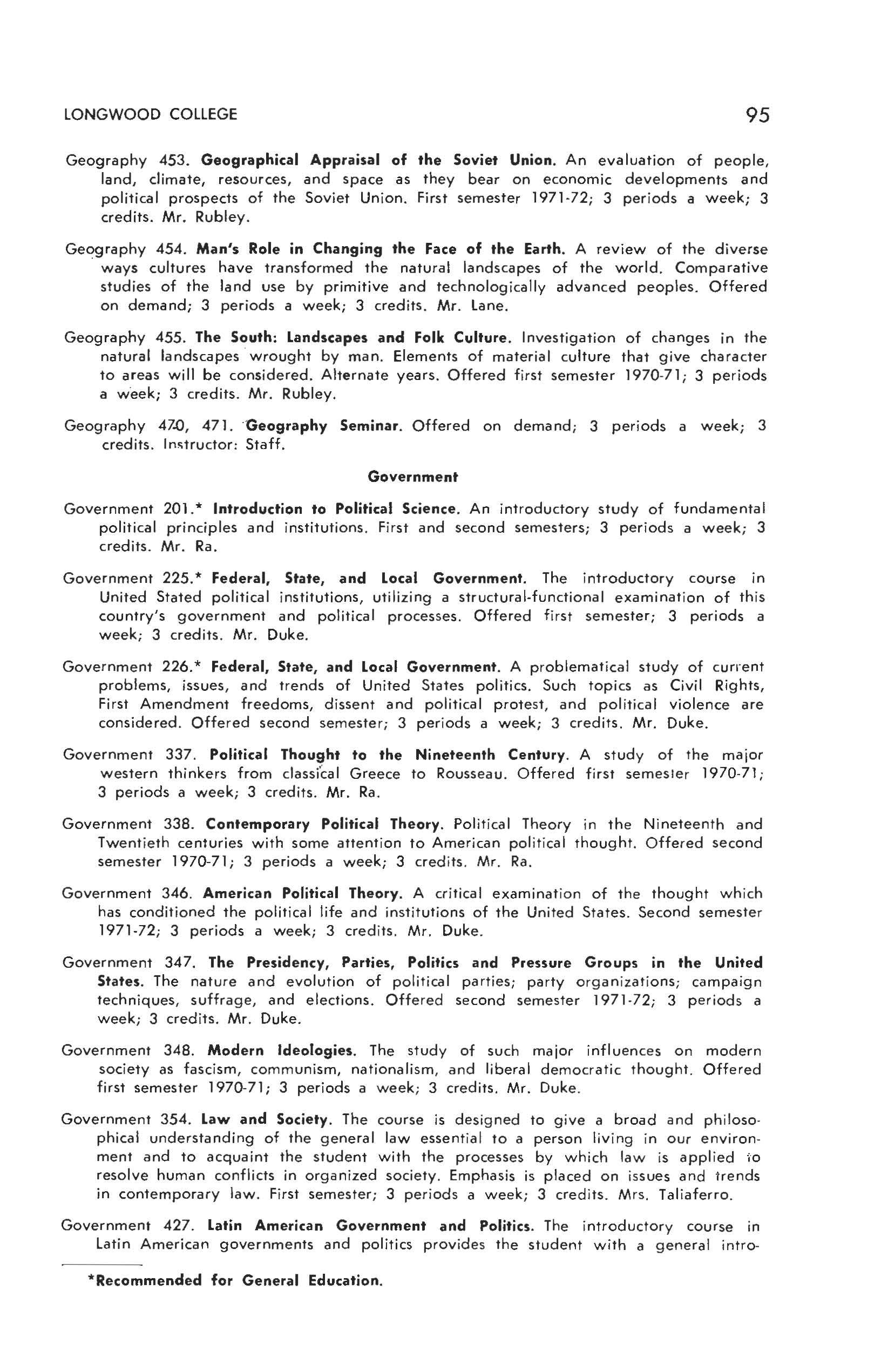
Government 348. Modern Ideologies. The study of such major influences on modern society as fascism , communism, nationalism, and liberal democ r atic thought. Offered first semester 1970-71; 3 periods a week ; 3 credits. Mr. Duke .
Government 354 Law and Society . The course is designed to give a broad and philoso phical understanding of the general law essent ia l to a person living i n our environment and to acquaint the student with the processes by which la w is applied io resolve human conflicts in organized society Emphasis is placed on issues and trends in contemporary law First semester ; 3 per iods a week; 3 credits. Mr s Taliaferro.
Government 427. Latin American Government and Politics The introductory course in Latin American governments and politics provides the student with a general intro-
*Recommended for General Education.
duction into Latin American political culture, politics , and governments. General characteristics of Latin American governments are noted, along with an examination of primary and secondary political groups (e.g., political parties , the military, and the Church). First semester 1970-71; 3 periods a week; 3 credits Mr. Duke.
Government 42B. Latin American Government and Politics . The second course ;r, Latin American governments and politics presents the student a concentration of the governments and politics of selected Latin American countries. (A typical semester's survey might include such countries as Mexico, Colombia, Argentina , etc.) Second semester 1970-71; 3 periods a week; 3 credits . Mr. Duke.
Government 435, 436. Comparative Government and Politics . The political system of England, France, Russia, and other selected countries: a survey of constitutional development, organization, and practices First and second semester ; 3 periods a week; 3 credits. Mr. Ra.
Government 437, 438 Asian Governments and Politics. Offered 1971-72; 3 periods a week; 3 credits each semester. Mr. Ra.
Government 445. Introduction to International Politics. The geographic, demographic , eco nomic, ideological, and other factors conditioning the policies of states a nd the methods and institutions of conflict and of adjustment among states , including the functions of power, diplomacy, international law and organization First semester 1970-71; 3 periods a week; 3 credits. Mr. Duke.
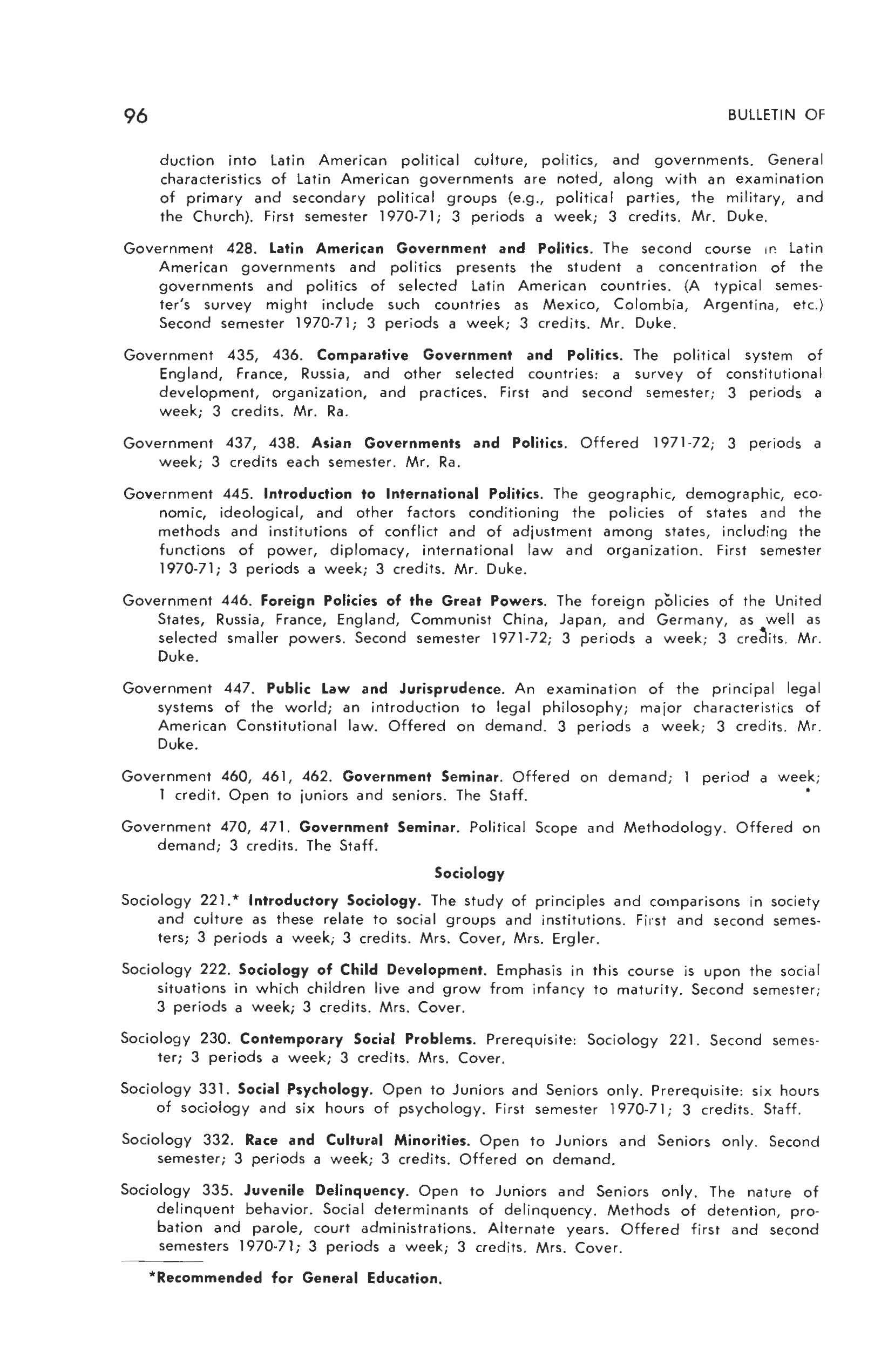
Government 446. Foreign Policies of the Great Powers. The foreign pol icies of the United States, Russia, France, England, Communist China, Japan, and Germany, as well as selected smaller powers. Second semester 1971-72 ; 3 periods a week ; 3 credits, Mr. Duke
Government 447 Public Law and Jurisprudence. An examinat ion of the principal legal systems of the world; an introduction to legal philosophy; major characteristics of American Constitutional law Offered on demand. 3 periods a week ; 3 credits Mr. Duke.
Government 460, 46 l , 462. Government Seminar. Offered on demand ; l period a week ; l credit. Open to juniors and seniors. The Staff
Government 470, 471. Government Seminar . Political Scope and Methodology. Offered on demand; 3 credits. The Staff.
Sociology 221.* Introductory Sociology. The study of principles and comparisons in society and culture as these relate to social groups and institutions. First and second semesters; 3 periods a week ; 3 credits. Mrs, Cover, Mrs. Ergler .
Sociology 222. Sociology of Child Development. Emphasis in this course is upon the social situations in which children live and grow from infancy to maturity. Second semester ; 3 per iods a week; 3 credits. Mrs, Cover.
Sociology 230. Contemporary Social Problems . Prerequisite: Soc iology 22 l Second semester; 3 periods a week ; 3 credits. Mrs. Cover .
Sociology 33 l Social Psychology. Open to Juniors and Seniors only. Prerequisite: six hours of sociology and six hours of psychology. First semester 1970-7 l ; 3 credits. Staff
Sociology 332. Race and Cultural Minorities. Open to Juniors and Seniors only Second semester; 3 periods a week ; 3 credits. Offered on demand.
Sociology 335. Juvenile Delinquency, Open to Juniors and Seniors only. The nature of delinquent behavior. Social determinants of delinquency, Methods of detention, pro bation and parole, court a dministrations. Alternate years Offered first and se cond semesters 1970-71; 3 periods a week; 3 credits , Mrs. Cover
*Recommended for General Education .
Sociology 441. Marriage and the Family. Open to Juniors and Seniors only. Offered each semester; 3 periods a week; 3 credits. Mrs. Cover.
Sociology 442. Introduction to Social Service. Prerequisite: six hours of sociology. This course is required of sociology majors and is open to other seniors who are considering social work as a career. First semester; 3 periods a week; 3 credits. Mrs. Cover.
Sociology 443. The Community. Open to Juniors and Seniors only. Prerequisite: six hours of sociology. Enrollment is limited to sociology and social science majors. Second semester 1970-71; 3 credits. Alternate years. Mrs. Ergler.
Sociology 333. Social Welfare as a Social Institution. First semester; 3 credits. Miss White.
Sociology 334. Social Work as a Profession. Second semester; 3 credits. Miss White.
Sociology 336. lnterventive Means in Social Welfare. Second semester; Miss White.
Sociology 400. Field Observation and Experience. Offered first eight-week block during both fall and spring semesters. 6 credits. Miss White.
Sociology 445. Social Theory. Prerequisite: six hours of sociology. This course is designed to review historical growth and development of social thought, types and nature of social theories, and the influence of social conditions on the development of theories of society. 3 periods a week; 3 credits. Mrs. Ergler.
Sociology 460, 461, 462. Sociology Seminar. Offered on demand; l period a week; l credit. Staff.
Anthropology 201, 202. Introductory Cultural Anthropology. Anthropology 201. A general study of human society and culture; an introduction to the principles of social and cultural anthropology. First and second semesters; 3 periods a week; 3 credits. Mrs. Ergler.
Anthropology 202. A cross-cultural analysis and comparison of selected societies; applying the principles of cultural anthropology. Prerequisite: Introductory Anthropology or lntroductnry Sociology. Second semester; 3 periods a week; 3 credits. Mrs. Ergler.
The Department of History and Social Sciences offers a major in history leading to the Master of Arts degree in Education. Majors may choose one of two plans of study, each totaling 30 semester hours.
Plan I. With thesis: American History, six hours; European History, three hours (or European History, six hours and American History, three hours); six hours of electives, three of which may be in a field other than History; Education 571, Education 681, and Psychology 622.
Plan II. Without thesis: American History, nine hours; European Hlstory, six hours (or European History, nine hours and American History, six hours); six hours of electives, three of which may be in a field other than History; Education 571, Education 681, and Psychology 622.
History 535. Constitutional History of the United States. 3 credits. Staff.
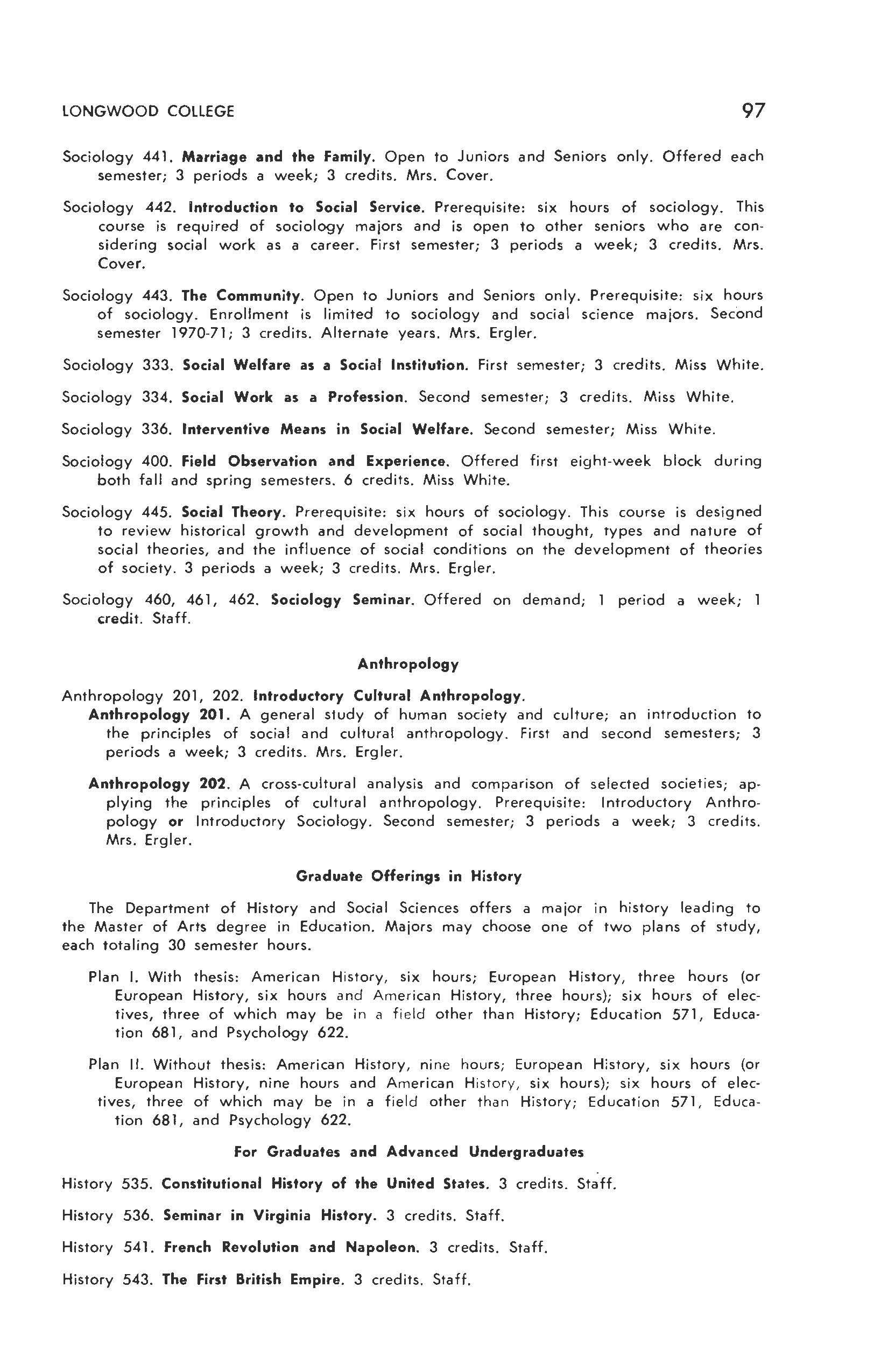
History 536. Seminar in Virginia History. 3 credits, Staff.
History 54 l. French Revolution and Napoleon. 3 credits. Staff.
History 543. The First British Empire. 3 credits. Staff.
History 544. Seminar in Soviet History. 3 credits Staff.
History 561. The American Colonies. 3 credits . Staff.
History 562 The Age of Jefferson 3 credits Staff.
History 563. The Age of Jackson. 3 credits. Staff.
History 564 Civil War and Reconstructiin. 3 credits. Staff.
History 565 Modern America 3 credits Staff
History 590, 591 History Seminar. 3 credits each semester. Staff
History 600 . Thesis Research. 6 credits.
History 631 The German Empire. 3 credits Staff
History 632 Germany Since 1918. 3 credits Staff.
Graduate Offerings in Geography
Geography 543. Geography in the Twentieth Century. 3 credits Staff.
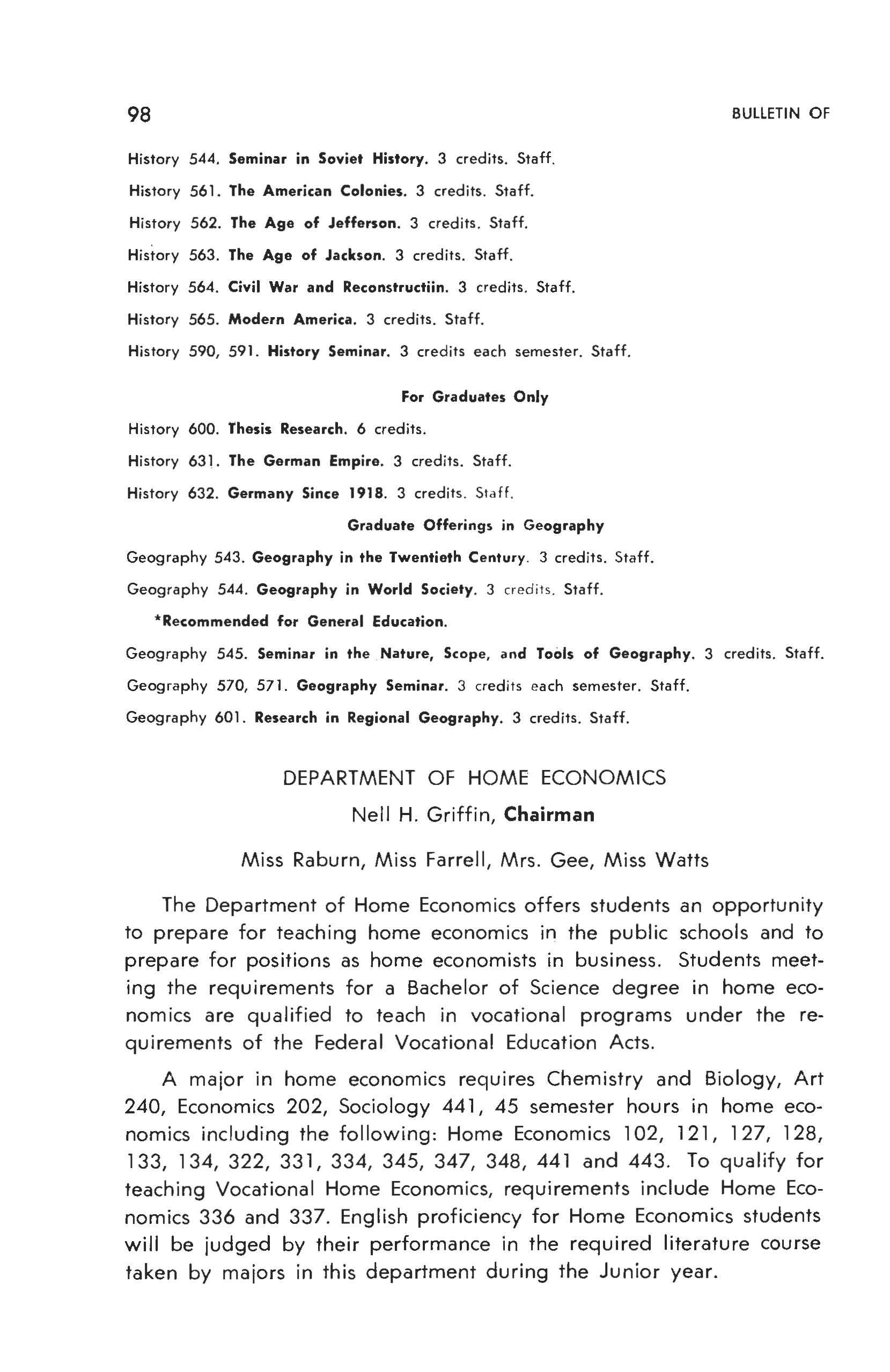
Geography 544 Geography in World Society . 3 credits. Staff.
*Recommended for General Education.
Geography 545. Seminar in the Nature, Scope , and Tools of Geography. 3 credits . Staff.
Geography 570, 571. Geography Seminar. 3 credits each semester Staff. Geography 601. Research in Regional Geography. 3 credits . Staff .
The Department of Home Economics offers students an opportunity to prepare for teaching home economics in the public schools and to prepare for positions as home economists in business. Students meeting the requirements for a Bachelor of Science degree in home economics are qualified to teach in vocational programs under the requirements of the Federal Vocational Education Acts.
A major in home economics requires Chemistry and Biology, Art 240, Economics 202, Sociology 441, 45 semester hours in home economics including the following: Home Economics l 02, 121, 127, 128, 133, 134, 322, 331, 334, 345, 347, 348, 441 and 443 . To qualify for teaching Vocational Home Economics, requirements include Home Economics 336 and 337 English proficiency for Home Economics students will be judged by their performance in the required literature course taken by majors in this department during the Junior year.
Home Economics 102. Home Equipment. The selection, operation and care of home equip• ment. Second semester; l single and two double periods a week; 3 credits. Miss Raburn.
Home Economics 121. Family Development. The continuing development of interpersonal relationships of family members throughout the family life cycle. 3 periods a week; 3 credits. Mrs. Griffin.
Home Economics 127, 128. Textiles and Clothing. A study of fibers and their relation and application to use in the home. Fundamental principles in selection and construction of family clothing; principles of fitting. Development of standards and techniques. l single and 2 double periods per week; 3 credits each semester. Miss Farrell.
Home Economics 133, 134. Foods and Nutrition. Food preparation based upon principles of nutrition and applicable to family meals. Nutrition study and practice in selection, storage, preparation, and service of foods. l single and 2 double periods a week; 3 credits each semester. Mrs. Gee.
Home Economics 300, 301. New Trends in Homemaking: Foods, Clothing. Home Economics 300: Furnishing the new kitchen, preparation of family meals. Home Economics 301: Selection and care of family clothing and home furnishings, construction of simple garments. (Open to student not majoring in Home Economics.) l single and 2 double periods a week; 3 credits each semester. Miss Farrell.
Home Economics 322. Advanced Clothing. Advanced work in fabrics, pattern adjustments, fittings, construction, remodeling and renovation of family clothing. Prerequisite: Home Economics 128. One single and 2 double periods a week; 3 credits. Miss Farrell.
Home Economics 323. Fashion Fundamentals. A study of the fashion world including designing and designers, preparation for designing, and fashion cycles. Prerequisite: Home Economics 128. 3 periods a week; 3 credits. Miss Farrell.
Home Economics 331. Management of the Home. Application of effective management processes to decision-making, personal and family values, and the specific resources of families. 2 single periods a week; 2 credits. Mrs. Gee.
Home Economics 334. Child Development. A study of the role of parents and other family members in providing an optimal climate for a child's physical, social, emotional and mental development. Observation and participation in the Child Development Laboratory are required. Prerequisite: Home Economics 121 or Psychology 256. 2 single and 2 double periods a week. Offered each semester; 4 credits. Miss Watts.
Home Economics 336. Teaching of Vocational Home Economics. The organization of teaching materials, principles of teaching and evaluation procedures for vocational home economics programs in secondary schools. 3 periods a week; 3 credits. Miss Raburn.
Home Economics 337. Special Problems in Home Economics Education. The responsibilities and activities of the home economics teacher in the total school and community pro· gram. 3 periods a week; 3 credits. Miss Raburn.
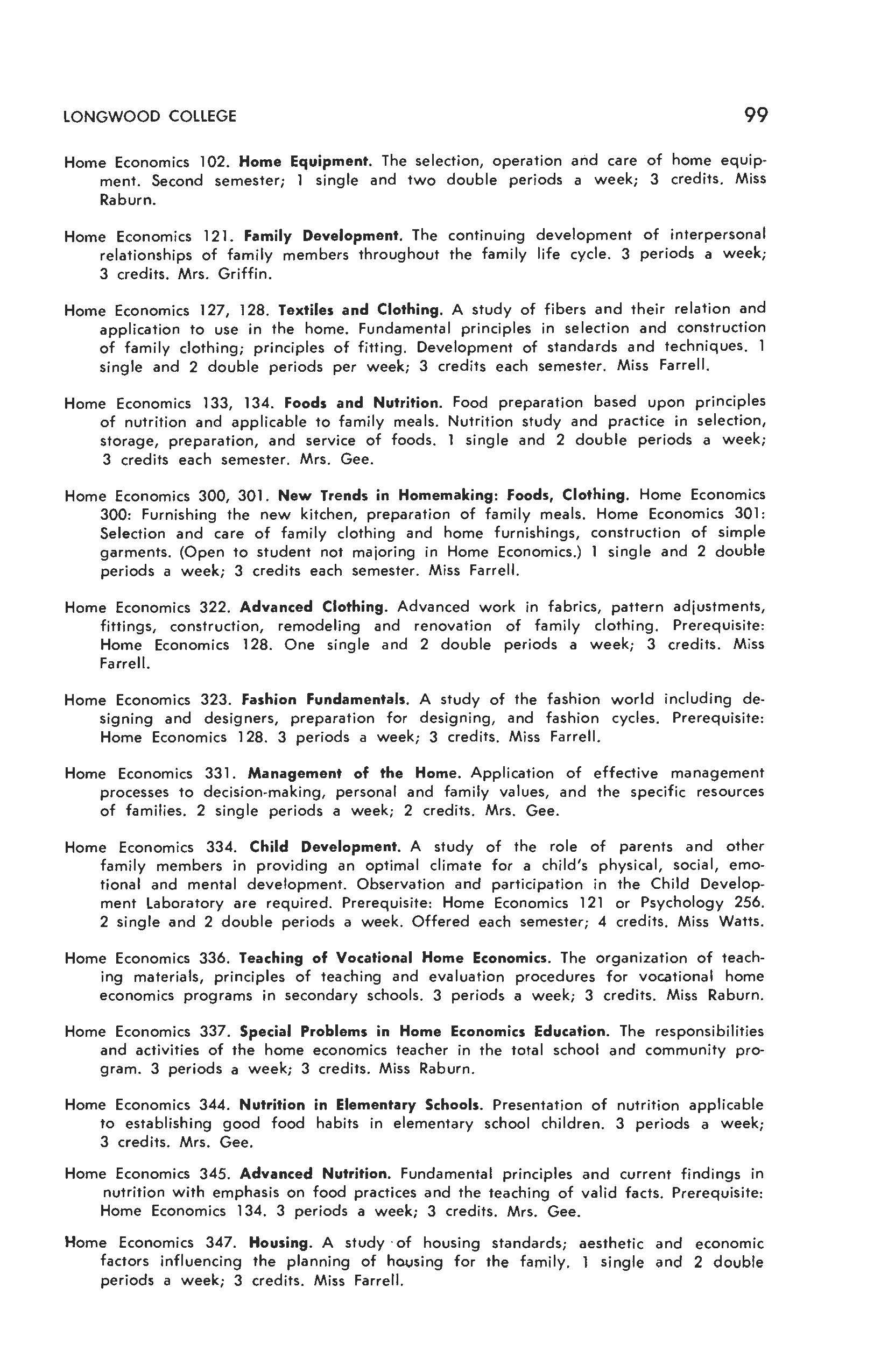
Home Economics 344. Nutrition in Elementary Schools. Presentation of nutrition applicable to establishing good food habits in elementary school children. 3 periods a week; 3 credits. Mrs. Gee.
Home Economics 345. Advanced Nutrition. Fundamental principles and current findings in nutrition with emphasis on food practices and the teaching of valid facts. Prerequisite: Home Economics 134. 3 periods a week; 3 credits. Mrs. Gee.
Home Economics 347. Housing. A study ·of housing standards; aesthetic and economic factors influencing the planning of housing for the family, l single and 2 double periods a week; 3 credits. Miss Farrell.
Home Economics 348 Home Furnishings . The aesthetic and economic factors influencing the selection of furnish i ngs for th e hom e 1 s i ngle and 2 double periods a week ; 3 cred its. Miss Farrell.
Home Econom ics 424 Tailoring Tailor ing techniques as applied to construction of suits or coats. Pr erequ isite : Home Econom ics 322 1 si ngle and 2 double periods a week ; 3 credits Miss Farrell.
Home Econom ics 437 Seminar in Home Economics . Selected study of the role of the Home Econom ist in the world of today Emphasis will be given to subject matter appropriate for work with disadvantaged people through organized school programs and adult groups . Offered each semester ; 2 credits . Mrs . Griffin , Miss Watts .
Home Economics 441 . Home Management Res idence . Senior home economics students are required to live in the home management house approximately one half semester . Directed experiences in fam ily living and home management Prerequisites : Home Econom ics 331 and 345; 4 credits Mrs Gee
Home Economics 443 Family Finance . A study of the needs and des i res of the consumer and the use of family income . 3 per iods a week; 3 credits . Mrs . G ri ffin .
Home Ec onomics 450. Experimental Cookery . Experimentation in fa ctors affecting food preparation Comparative studies of published experimental data. Prerequisite : Home Economics 134 ; 1 3-hour and 2 single periods a week ; 3 credits. Mrs. Gee.
Home Economics 452 Demonstration Techniques. Study of techniques used in commercial demonstrations . Practice in radio, TV, and audience presentations of home economics materials Prerequisite : Home Economics 134; 1 s ingle and 2 double periods a week ; 3 c red its Mrs Gee
Home Economics 455 Directed Study in Home Economics. For students qual ified to pursue d i rect e d ind ividual study in a specialized area of home economics Approval of the Chairman of the Department is required Offered on demand 2 4 credits The Staff.
Directed Teaching of Home Economiu in the High School. Students majoring in Home Economics , preparing to teach in the high school, carry on d irect e d tea c hing in th is field during the ir sen ior year as Educat ion 400 , under a general supervisor , supervising teacher, and a consultant in the Department of Home Econom ics Consultant : The Staff, Miss Raburn.
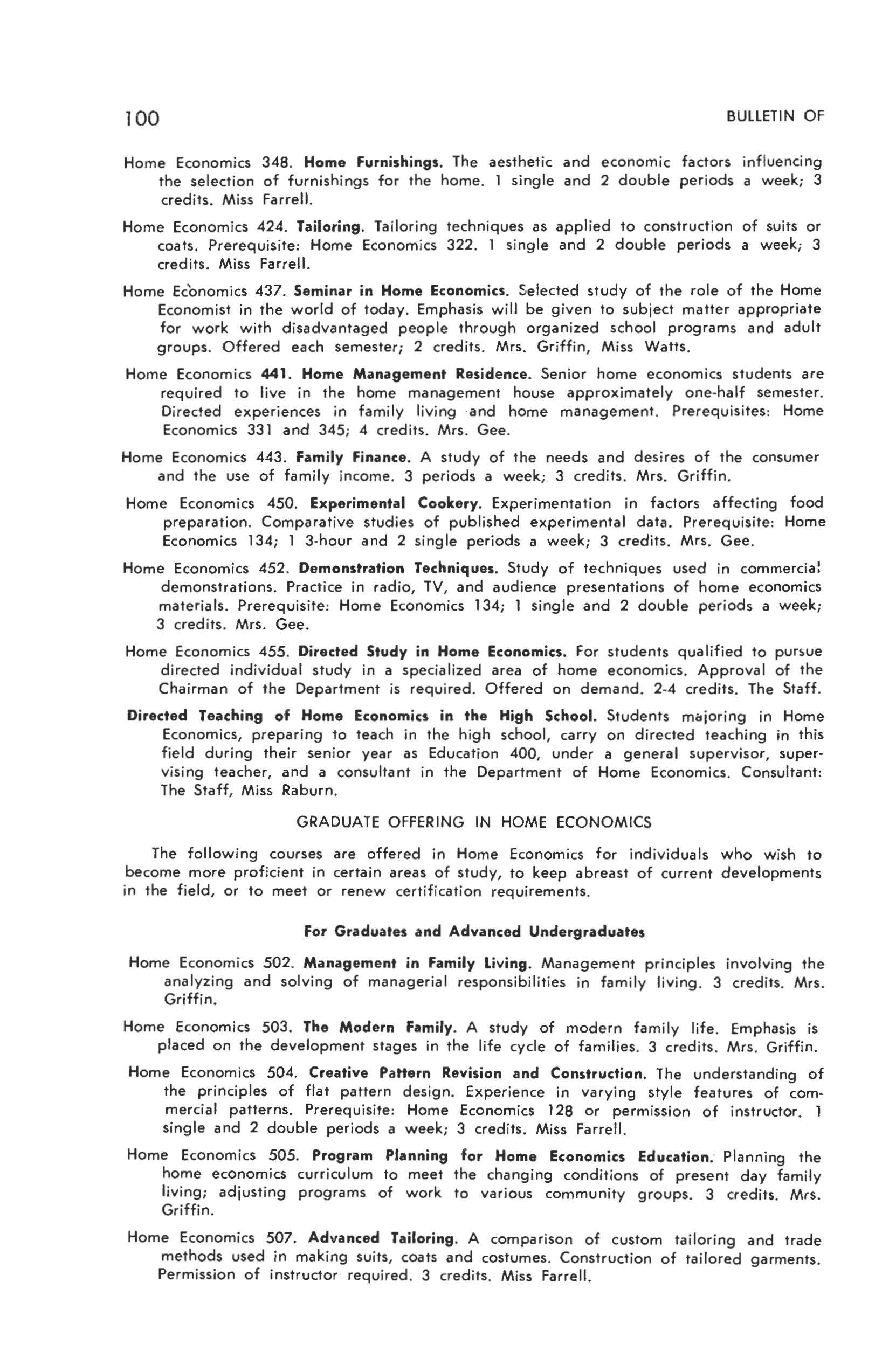
The following courses are offered in Home Economics for individuals who w ish to become more proficient in certain areas of study, to keep abreast of current developments in the field, or to meet or renew certif ication requirements
Home Economics 502 Management in Family living. Management principles involv ing the analyzing and solving of managerial responsibil ities in family living 3 cred its Mrs Griffin
Home Economics 503 The Modern Family. A study of modern family life Emphasis is placed on the development stages in the life cycle of famil ies 3 credits Mrs. Griff in.
Home Economics 504 Creative Pattern Revision and Construction The understanding of the principles of flat pattern design Experience in varying style features of commercial patterns. Prerequ isite : Home Economics 128 or perm ission of instructor 1 single and 2 double periods a week ; 3 cred its Miss Farrell
Home Economics 505 Program Planning for Home Economics Education ; Planning the home economics curr iculum to meet the changing cond itions of present day family liv ing ; adjusting programs of work to various community groups. 3 credits Mrs. Gr iffin
Home Econom ics 507 . Advanced Tailoring . A comparison of c ustom tailoring and trade methods used in making suits , coats and costumes Construction of tailored garments Permission of instructo r requ ired 3 credits. Miss Farrell
Miss Abbott, *Miss Allen, Mrs. Bollinger, Miss Glass, Mr Gussett, Miss Holladay, Mrs. Magnifico, Mr. Narkinsky, Mr. Noone, Mrs. Parrish, Miss Reid, **Mr. Webb, Mr. Wu
The Department of Mathematics offers courses designed for ( l) those students who plan to teach in the elementary and secondary school s of the State and (2) those students who plan to complete a curriculum without meeting the certification requirements for tea c hing
A major in mathematics requires a minimum of 31 semester hours which includes the following courses , Mathematics 235, 236 , 261, 262, 342, 343, 361, 460, and 471 It is recommended that all majors elect Mathematics 351, 461, 472, and 485, and those who plan to teach in high school are required to take Mathematics 451. A student with sufficient preparation in the secondary school may take a qualifying e x amination in mathematics administered by the Mathematics Department during the orientation week Results of the e x amination may enable a freshman to begin her mathematics study with analytic geometry and the calculus. Other freshmen should take Mathematics 161, 162 to prepare for a major in mathematics
One and one-half units of high school credits in algebra and one unit in geometry are prerequisites for a major in mathematics in any curriculum
Students majoring in mathematics are urged to elect general physics and other courses lending themsel v es to mathematical interpretations.
Mathematics 161, 162 or Mathematics 111-112 meet the six-hour general education requirement in mathematics for all curricula except that one preparing teachers for the elementary school (Requirement : Mathematics 123, 124, and 323). Mathematics and science majors must take Mathematics 161, 162, except for those students who begin their mathematics with Mathematics 261, 262. Mathematics 11 1-112 does not serve as a prerequisite for Mathematics 261, 262.
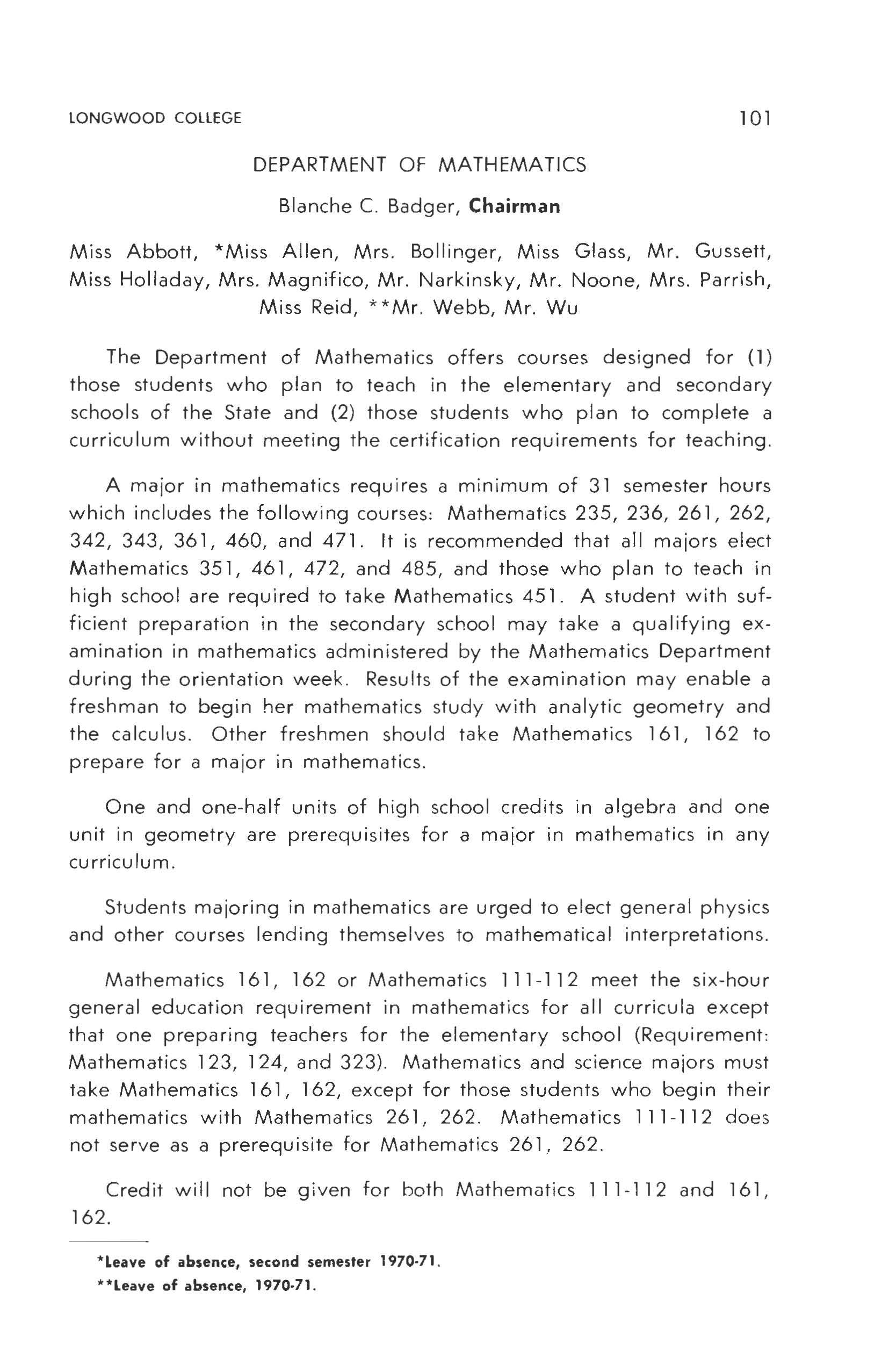
Credit will not be given for both Mathematics 111-112 and 161, 162.
*Leave of absence, second semester 1970-71 .
**Leave of absence, 1970-71.
Mathematics 111-112 Introduction to Mathematics. This course is designed to give the meaning and method of mathematics. Emphasis will be placed upon understanding rather than upon memorizing mathematical facts. The course is recommended for the non-mathematically oriented student and will not serve as a prerequisite to Mathematics 261, 262. First and second semesters; 3 periods a week; 3 credits each semester. The Staff.
Mathematics 123, 124. Basic Concepts of Mathematics. Basic concepts underlying contemporary arithmetic; emphasis on meaning and understanding; the logic of mathematics; language of sets and relations as applied to structure of number systems; mathematical proofs; fundamental concepts of algebra; percentage; analysis and solution of verbal problems ; graphing of equations and inequalities First and second semesters; 3 periods a week ; 3 credits each semester. Required for the B.S degree in Elementary Education. The Staff
Mathematics l 61, 162 Fundamentals of College Mathematics. A unif ied treatment of the basic ideas of contemporary algebra , trigonometry , and analytics The a im of this course is to show the nature of mathematics as a logical system . The material is fundamental to any student ' s training whether he wishes to continue in mathematics, the natural sciences, and engineering, or whether his interests lie in the social sciences or economics. First and second semesters; 3 periods a week; 3 credits each semester. The Staff.
Mathematics 204. Computer Science . This is an introductory course in computer science including machine language and techniques of programming in the Fortran language with applications. Prerequisite : Mathemat ics 16 l , 162. 3 credits.
Mathematics 235 , 236 Advanced Geometry Concepts of elementary geometry from a mature viewpoint Emphasis is placed on contemporary ideas and language. Mathematical logic is stressed including consistency , independence, and categoricity of postulational systems Topics from non Euclidean geometry are included The relation of geometry to the algebra of the real number system is emphasized First and second semesters; 3 periods a week; 3 credits each semester Mrs. Parrish, Mr. Wu.

Mathematics 26 l, 262. The Differential and Integral Calculus. Prerequisite: Mathematics 161, 162 or the equivalent. First a nd second semesters; 5 periods a week; 5 credits each semester. Miss Allen, Mr. Noone.
Mathematics 323. Mathematics for Teachers of the Elementary School . Elementary geometry from an intuitive approach is emphasized. Attention is given to materials and procedures in teaching mathematics in the elementary school. Offered each semester; 3 periods a week; 3 credits Required for the B.S Degree in Elementary Education. The Staff.
Mathematics 342 , 343. Introduction lo Modern Algebra. First semester : sets and m,appings , integers , general algebra ic systems , groups , rings , and fields Second semester: linear algebra. Prerequisite: Mathematics 262 First and second semesters ; 3 periods a week; 3 credits each semester. Miss Abbott, Mr. Narkinsky.
Mathematics 351. Introduction to Topology. Topological spaces, continuous mappings. homeomorphisms, compactness, connectedness, metric spaces, and other selected topics in point set topology. First semester; 3 periods a week; 3 credits. Mr. Narkinsky.
Mathematics 361. Calculus Ill Advanced topics in calculus not con s idered in Mathematics 261, 262. Prerequisite: Mathematics 261 , 262. First semester; 3 periods a week; 3 credits. Mr . Gusselt.
Mathematics 442 Topics in Algebra . Prerequisite : Mathematics 342 , 343 Offered on demand ; 3 periods a week; 3 credits
Mathematics 451. The Teaching of High School Mathematics. Offered first semester ; 3 periods a week; 3 cred its Mrs. Magnifico.
Mathematics 460. Differential Equations. Primarily a study of ordinary differential equations of the first and second order with applications to elementary work in mechanics and physics. Second semester; 3 periods a week; 3 credits. Mrs. Badger.
Mathematics 461. Advanced Calculus. A theoretical approach to the study of limits, con• tinuity, differentials, derivatives and integrals. Development of the real number system, elementary point set theory, .functions of several variables, infinite series, and power series. 3 periods a week; 3 credits. Prerequisite: Mathematics 361. Mr. Narkinsky.
Mathematics 471, 472. Introduction to Probability and Statistics. Prerequisite: Mathematics 261-262. Mathematics 471 offered second semester; Mathematics 472 offered on demand. 3 periods a week; 3 credits each semester. Mr. Wu.
Mathematics 485. Introduction to Analysis. Prerequisite: Consent of the instructor. Offered second semester; 3 periods a week; 3 credits. Miss Allen.
Mathematics 523. Mathematics for Teachers in the Elementary School. This course is designed to update the elementary teacher in modern concepts of mathematics and to give three hours credit toward a Master's degree in elementary education. 3 credits. Mrs. Magnifico.
Mr. Blasch, Miss Boehm, Miss Clark, Mr. Harbaum, Mr. Hesselink, Mr. McCombs, Miss Myers
The aims of the Department of Music are to emphasize the cultural, intellectual, emotional, and social values of music; to broaden the concept of music in life and in the schools; to prepare elementary teachers to teach music in their respective grades; to prepare supervisors and special teachers of vocal and instrumental music in elementary and high schools; to prepare church choir directors; to help students attain an artistic proficiency on their instruments and in the use of the singing voice; g._nd to develop an understanding and an appreciation of the best music through participation in instrumental and vocal ensembles and through directed listening to the world's great music literature.
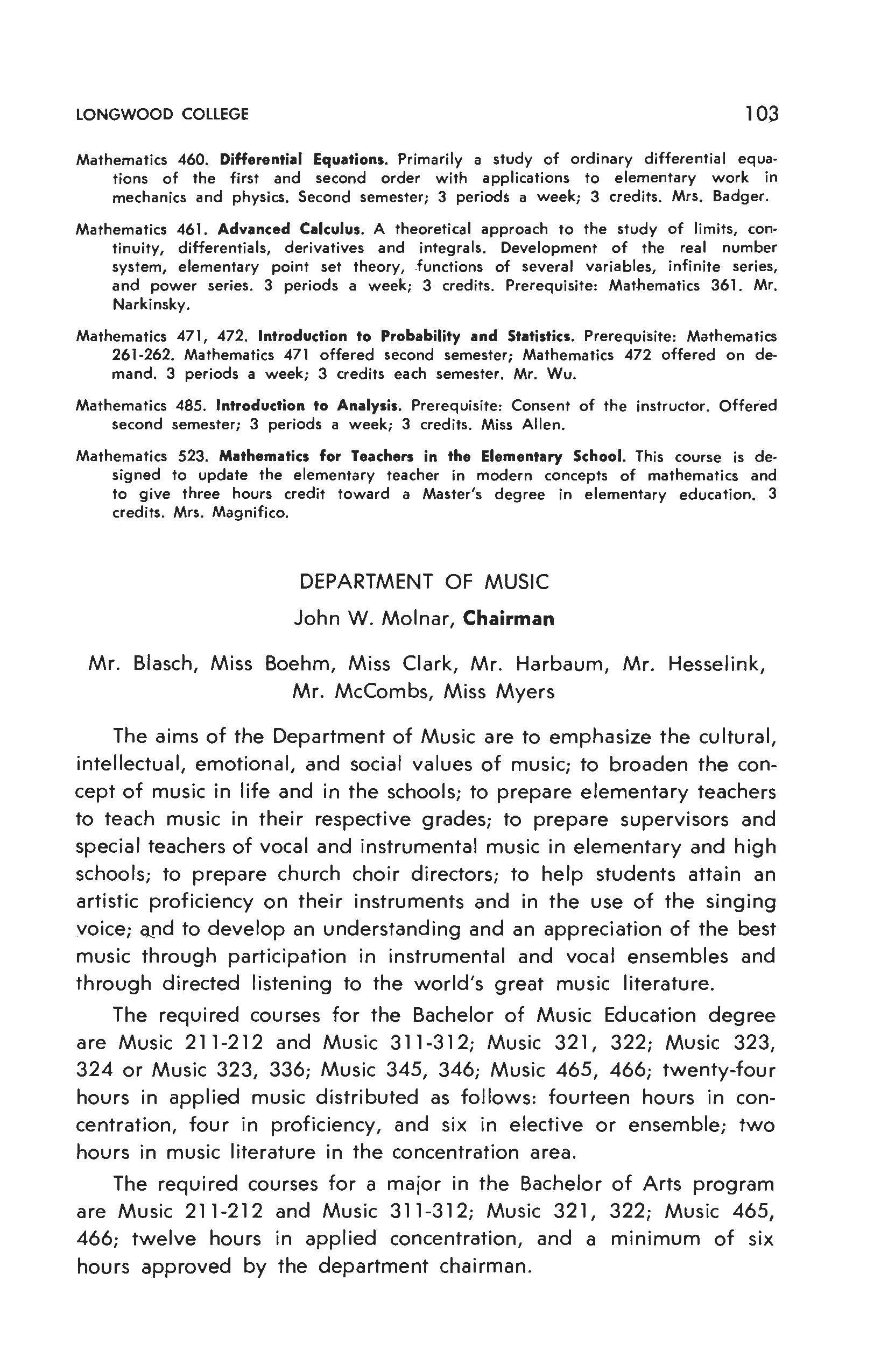
The required courses for the Bachelor of Music Education degree are Music 211-212 and Music 311-312; Music 321, 322; Music 323, 324 or Music 323, 336; Music 345, 346; Music 465, 466; twenty-four hours in applied music distributed as follows: fourteen hours in concentration, four in proficiency, and six in elective or ensemble; two hours in music literature in the concentration area.
The required courses for a major in the Bachelor of Arts program are Music 211-212 and Music 311-312; Music 321, 322; Music 465, 466; twelve hours in applied concentration, and a minimum of six hours approved by the department chairman.
Each music major must participate in an ensemble each semester.
If the student chooses to do part or all of her General Education requirement in the six-hour area of Humanities designated Art, Music, or Dramatic Arts in music, three hours must be in a classroom subject listed under Appreciation, History, or Literature, or Music 237.
The amount of credit in applied music that may be transferred from other institutions will be determined through evaluation of the student's ability by the Department of Music.
Music l 15. Basir. Musicianship. An introductory course in music reading through singing and the use of melodic instrum e nts, for the non-music major. Offered first semester; 2 periods a week; l credit. Miss Boehm.
Music 211-212. Structure of Music. An integrated study of music through the keyboard; written and creative work, ear training, form and analysis, keyboard harmony, part writing. First and second semesters; 5 periods a week; 4 credits. Miss Clark, Mr. Hesselink.
Music 311-312. Structure of Music. A continuation of Music 211-212, which is prerequisite. Altered chords; modulation; chromatic harmony; elementary counterpoint. First and second semesters; 5 periods a week; 4 credits each semester. Miss Clark, Mr. Hesselink.
Music 345, 346. Conducting. Technique of the baton; score reading ; rehearsal procedures. First and second semesters; 2 periods a week; l credit each semester. Mr. Molnar.
Music 413. Counterpoint. Strict and fre e counterpoint; motivic development ; invertable counterpoint. Prerequisite, Mus ic 311-312. Offered on demand ; 2 periods a week; 2 credits. The Staff.
Music 414. Form and Analysis. Harmonic and formal analysis of compositions of each period. Prerequisite, Music 311 312. Offered on demand; 2 periods a week; 2 credits. The Staff.
Music 415. Orchestration. Arranging for band and orchestra. Prerequisit e , Music 311-312. Offered on demand; 2 periods a week; 2 credits. The Staff.
Music 416. Choral Arranging Arranging for vocal ensembles and chu rus es. Prerequisite, Music 311-312. Offered on demand; 2 periods a week; 2 credits. The Staff.
*Music 123, 124. Guided listening. Compositions selected for their relationship to literature. First and second semesters; 2 periods a we ek ; l credit each semester. Miss Boehm.
*Music 165. The Appreciation of Music. Study for the understanding of the forms, styles, and periods of the music usually heard in performance. Offered both semesters; 3 periods a week; 3 credits. Th e St a ff.
*Music 168, 169. Music in Western Culture. Survey of the major periods of music with e xamples of the compositions of principal composers in ea c h period; the relation of music to other aspects of history and the culture of western civilization. First and second semesters; 3 periods a week,- 3 credits each semester. Mr Harbaum, Mr. Molnar.
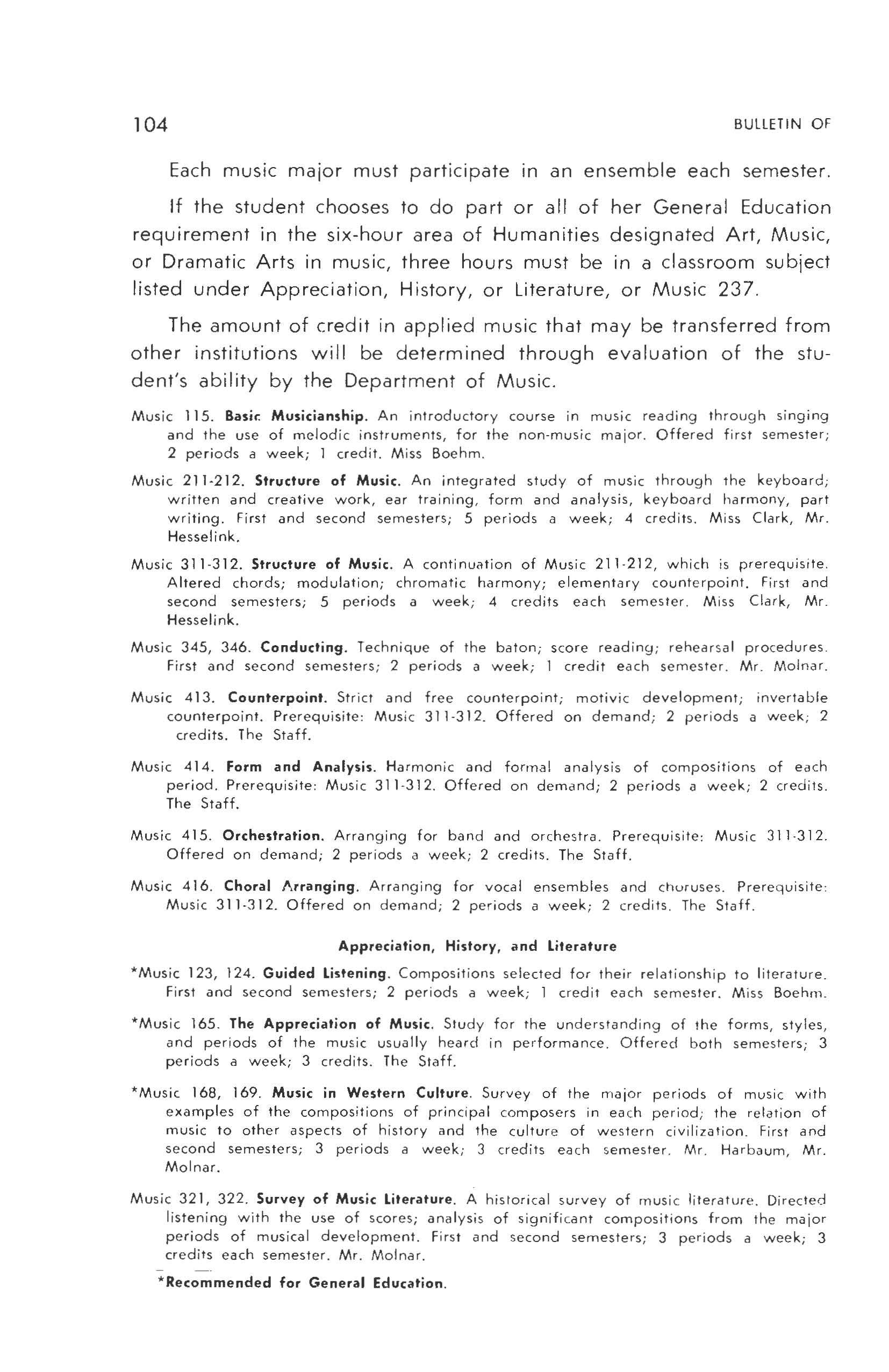
Music 321, 322. Survey of Music Literature. A historical survey of music literature. Directed listening with the use of scores; analysi s of significant compositions from the major periods of musical development. First and second semesters; 3 p e riods a week; 3 credits each semester. Mr. Molnar.
*Recommended for General Education.
*Music 353, 354. Concert Hour. Directed listening to selected masterpieces of music; bio graphical stud y of the composers. First and second semesters; 2 periods a week; 2 credits each semester. Mr. Harbaum.
Music 461 . Choral Literature. A study of sacred and secular choral literature of all periods. Offered ~n demand; 2 periods a week ; 2 credits.
Music 462. Organ Literature. A study of the literature of the organ through performance and listening. Required of organ concentrators. Alternate years; offered second semester; 2 periods a week; 2 credits. Mr. Hesselink.
Music 463. Piano Literature , A study of the literature of the pianoforte through performance and listening. Required of piano concentrators Alternate years; offered second semester; 2 periods a week; 2 credits.

Music 464. Voice Literature and Pedagogy. A study of the literature and the teaching of voice; principles of voice teaching and laboratory work with beginning voice students. Required of voice concentrators. Offered second semester; 2 periods a week; 2 credits. Mr. McCombs
Music 465, 466 History of Music. The history of music of western civilization, with examples. Open to non music maiors only with permission of the instructor. First and second semesters; 3 periods a week; 3 credits each semester. Mr. Harbaurn.
Music 237. Music for Elementary Teachers. Music for students preparing to teach in the elementary grades. Piano, including technique, chording, rhythm and accompaniment patterns; tonal and rhythmic reading; listening. Offered each semester; 3 periods a week; 3 credits. Miss Clark, Miss Myers.
Music 323. Music Teaching and Supervision in the Elementary School. Music activities in the five-fold program from early childhood through the middle and upper elementary school levels; materials and procedures. Open only to music maiors and others with the consent of the department chairman. First semester; 3 periods a week; 3 credits. Miss Boehm.
Music 324. Music in the School, Secondary Level. Philosophy, procedure , materials; emphasis on the mus ic al activities of the five fold progr a m; problems of the adolescent voice and interest; adaption of the program to the community. Open only to mus ic education majors and others with the cons e nt of the department chairman. Se cond semester; 2 periods a week ; 2 credits. Miss Boehm.
Music 329. Music in the Elementary School. Kindergarten through upper grades._ Study of the goals and philosophy of education through music in the elementary school ; techniques and approaches implementing the experien ce s needed in a developmental program of classroom music ; practice in planning and implementing the program Prerequisite, Music 237 , Both semesters; 3 periods a week 3 credits Miss Boehm.
Music 335, 336. Instrumental Music in the Schools. Study of all the band and orchestral instruments; embouchure and te chnical development ; rehearsal techniques, fundam e ntals of marching; materials. First and second semesters; 3 p e riods a week; 3 credits each semester. Mr . Harbaum.
Music 445. Teaching Piano. Techniques and materials of teaching piano in groups; observation and teaching of demonstration groups. Second semester; 2 periods a week; 2 credits Miss Clark.
Music 481. Operetta Production. The selection, casting, rehearsal , staging, and production of the school operetta. Offered on demand. Two periods a week; 2 credits. Mr. Molnar.
*Recommended for General Education .
Opportunity is offered all students of the College for cultural development through the study of the piano, harpsichord, organ, voice, or orchestral or band instruments, either through private instruction or in small classes Students may enter at any stage of advancement. Students majoring in music must pass a proficiency test in piano and voice .
Courses on the concentration level will be recorded as follows: Music 177 (Voice Concentration) or Music 177 (Piano Concentration) The name of the instrument, or voice, will be used in the blanks in the course descriptions.
Music 177, 17B. ( _ Concentration.) One-half hour individual lesson, one hour group instruction (or equivalent) plus related studio classes and recitals. 2 credits each semester
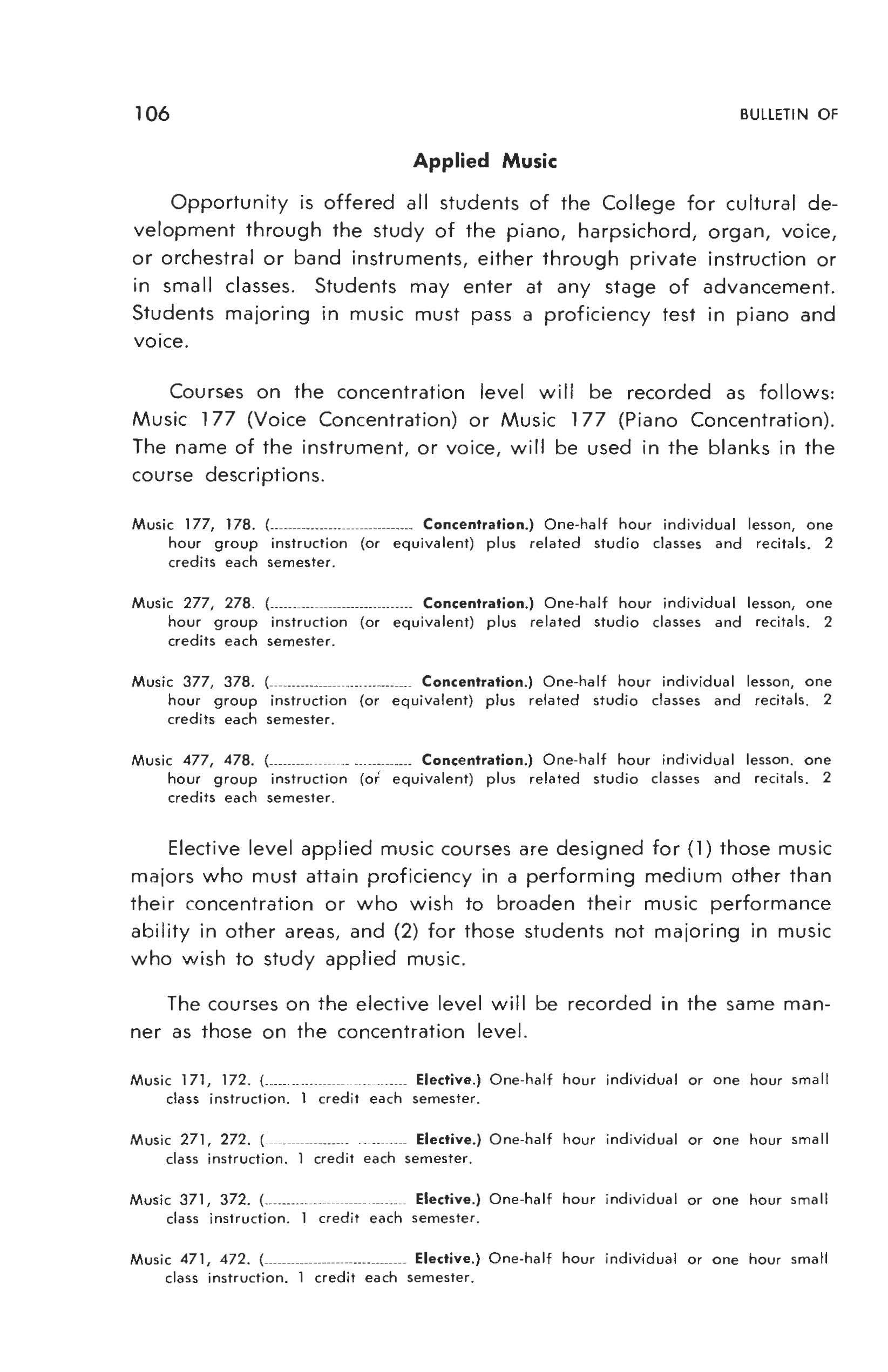
Music 277, 27B < ·-· · Concentration.) One-half hour individual lesson, one hour group instruction (or equivalent) plus relaied studio classes and recitals. 2 credits each semester.
Music 377, 378 ( ___ ··-··-· ·-- Concentration.) One-half hour individual lesson, one hour group instruction {or equivalent) plus related studio classes and recitals. 2 credits each semester .
Music 477, 478 { ---··------ Concentration.) One-half hour individual lesson. one hour group instruction (or equivalenl) plus related studio classes and recitals 2 credits each semester
Elective level applied music courses are designed for (l) those music majors who must attain proficiency in a performing medium other than their concentration or who wish to broaden their music performance ability in other areas, and (2) for those students not majoring in music who wish to study applied music .
The courses on the elective level will be recorded in the same manner as those on the concentration level.
Music 171 , 172 ( ___ ··-· ··-·--··-·-· -·- ·- Elective.) One half hour individual or one hour small class instruction. 1 credit each semester.
Music 271, 272. ( ______ Elective . ) One-half hour individual or one hour small clas s instruction l credit each semester.
Music 371, 372. ( _ ------·---·--·· Elective .) One-half hour i ndividual or one hour small class instruct ion. 1 credit each semester .
Music 471, 472 (___ _ __ Elective.) One half hour individual or one hour small class instruction . credit each semester.
Ensembles are open to all students who sing or play an orchestra or band instrument. The following require an audition with the conductor: Concert Choir, Madrigal Singers, and instrumental ensembles. The Freshman Choir does not require an audition. Formal programs are presented on and off the campus .
Credit and grades in ensembles are recorded in the following manner: Music 234, 244 (Concert Choir) or Music 234, 244 (Madrigal Singers).
f , ,•,p ;n ble s may be participated in without credit.
Music 140 (Ensemble.) Two periods a week; no credit.
Music 143, 144. (Ensemble.) Two periods a week; 1 credit each semester.
Music 240. (Ensemble.) Two periods a week ; no credit.
Music 243, 244. (Ensemble . ) Two periods a week; 1 credit each semester
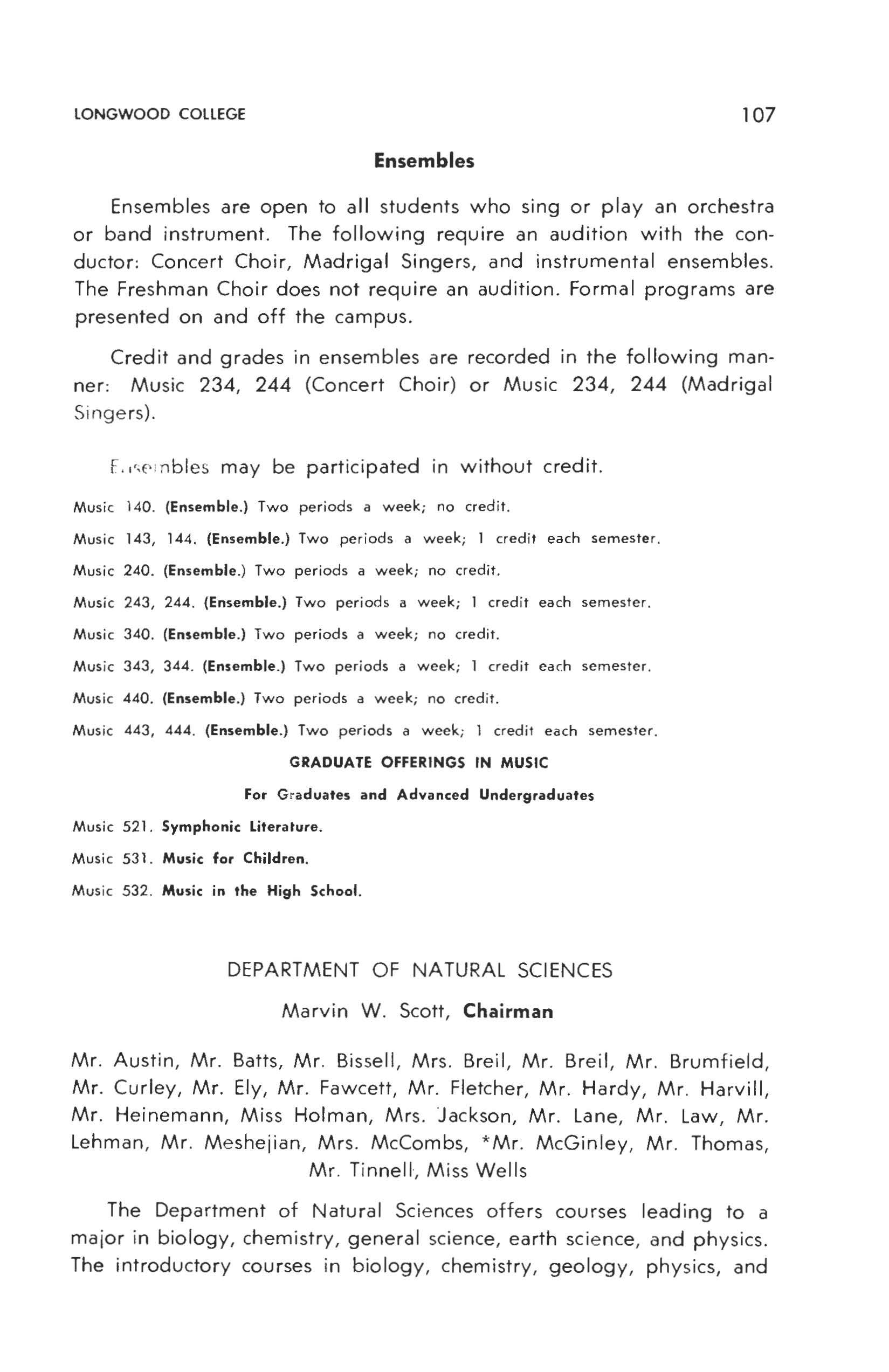
Music 340. (Ensemble.) Two periods a week; no credit
Music 343, 344. (Ensemble.) Two periods a week ; 1 credit each semester
Music 440 (Ensemble .) Two periods a week; no credit.
Music 443, 444. (Ensemble ) Two periods a week ; 1 credit each semester.
For G r aduates and Advanced Undergraduates
Music 521. Symphonic Literature.
Music 531. Music for Children .
Mus ic 532 Music in the High School.
Mr. Austin, Mr. Batts, Mr Bissell, Mrs. Brei!, Mr. Brei!, Mr. Brumfield, Mr. Curley, Mr. Ely, Mr. Fawcett, Mr. Fletcher, Mr. Hardy, Mr. Harvill, Mr. Heinemann, Miss Holman, Mrs . Jackson, Mr. Lane, Mr. Law, Mr. Lehman, Mr . Meshejian, Mrs. McCombs, *Mr. McGinley, Mr. Thomas, Mr. Tinnell, Miss Wells
The Department of Natural Sciences offers courses leading to a major i n biology, chemistry, general science, earth science, and physics The introductory courses in biology, chemistry, geology, physics, and
physical science fulfill the science requirements for general education. The requirements for pre-professional preparation for the medical sciences are included in the course offerings.
There is wide variation in the requirements for admission to different graduate schools and in different departments in the same institution. Students who plan to enter graduate schools should consult with the appropriate staff members for help in planning a program which will satisfy the admission requirements of the graduate school they plan to attend.
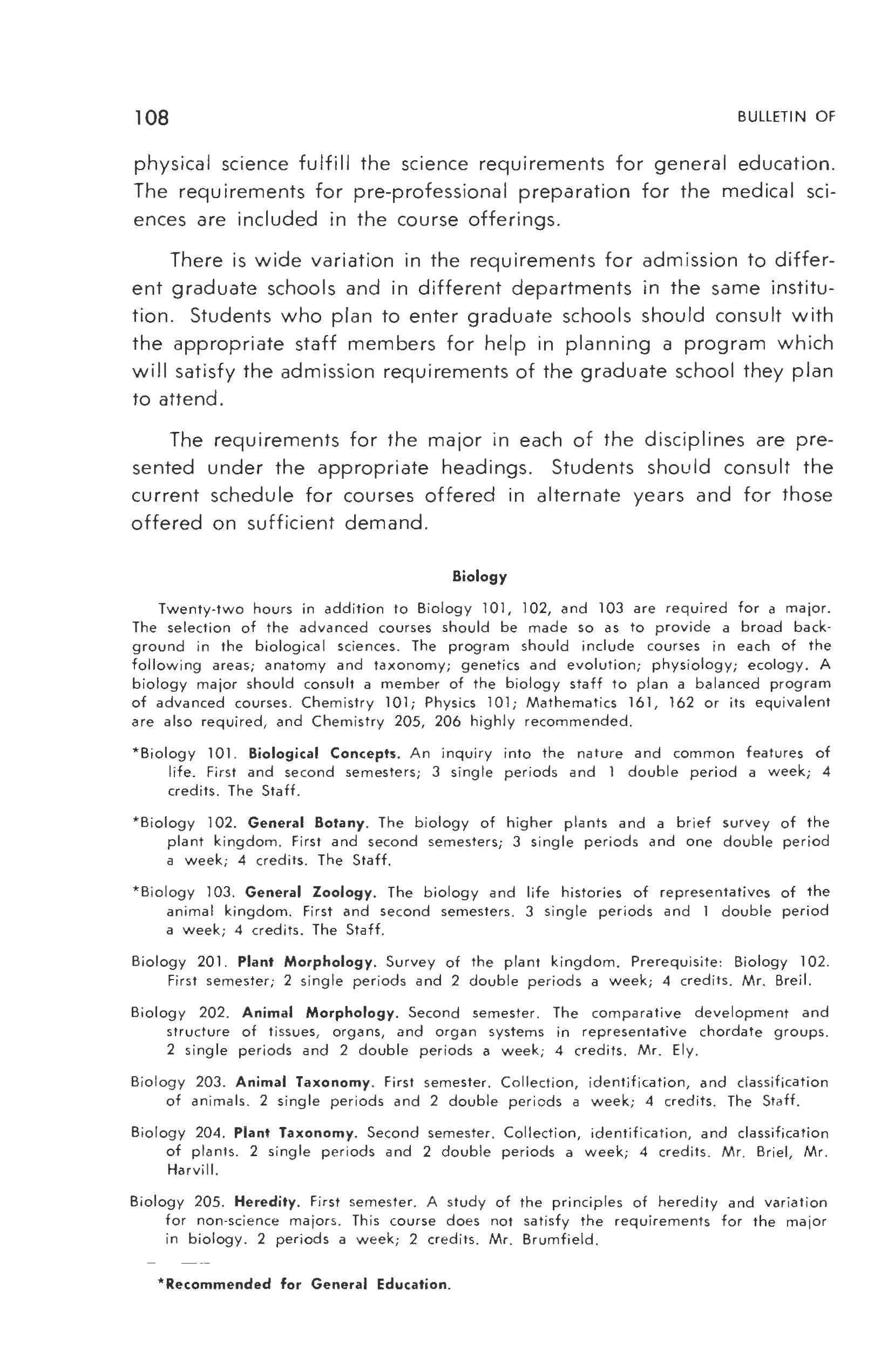
The requirements for the major in each of the disciplines are presented under the appropriate headings. Students should consult the current schedule for courses offered in alternate years and for those offered on sufficient demand
Twenty-two hours in addition to Biology 101, 102, and 103 are required for a major. The selection of the advanced courses should be made so as to provide a broad background in the biological sciences. The program should include courses i n each of the following areas; anatomy and taxonomy; genetics and evolution ; physiology; ecology . A biology major should consult a member of the biology staff to plan a balanced program of advanced courses. Chemistry 101; Physics 101; Mathematics 161 , 162 or its equivalent are also required , and Chemistry 205, 206 highly recommended.
*Biology 101. Biological Concepts . An inquiry into the nature and common features of life. First and second semesters; 3 single periods and l double period a week; 4 credits. The Staff
*Biology 102. General Botany. The biology of higher plants and a brief survey of the plant kingdom. First and second semesters; 3 single periods and one double period a week; 4 credits. The Staff.
*Biology 103. General Zoology. The biology and life histories of representatives of the animal kingdom. First and second semesters 3 single periods and l double period a week; 4 credits. The Staff.
Biology 201. Plant Morphology. Survey of the plant kingdom. Prerequ isite: Biology l 02. First semester; 2 single periods and 2 double periods a week; 4 credits. Mr. Breil.
Biology 202. Animal Morphology. Second semester The comparative development and structure of tissues , organs, and organ systems in representative chordate groups. 2 single periods and 2 double periods a week ; 4 credits. Mr. Ely.
Biology 203. Animal Taxonomy. First semester. Collection , identification, and classification of animals 2 single periods and 2 double periods a week; 4 credits. The Staff.
Biology 204. Plant Taxonomy. Second semester. Collection, identification , and classification of plants. 2 single periods and 2 double periods a week; 4 credits. Mr Briel, Mr. Harvill.
Biology 205. Heredity. First semester. A study of the principles of heredity and variation for non-science majors. This course does not satisfy the requirements for the major in biology. 2 periods a week; 2 credits. Mr. Brumfield.
* Recommended for General Education.
Biology 206-207. Human Anatomy and Physiology First and se cond semesters. Basic physiological principles and functional anatomy of the respiratory , circulatory and excretory, reproductive , digestive sys tems (Biology 206); and of the integumentary skeletal , muscular, nervous, and endocrine systems (Biology 207 ). 3 single periods and 1 double period a week; 4 credits each semester. Miss Holman.
Biology 300. General Ecology. First semester. Bas ic relationships among and between organisms and their environment. 3 single periods and l double period a week; 4 credits. Mr. Batts
Biology 302. Plant Ecology . Second semester. Relationships of plants to the ir environ· ments. 3 single periods and l double period a week; 4 credits. Mr Breil.
Biology 303. G""etics. First semester. Genetic concepts which form a foundation for an understanding of inheritance. 3 single periods and l double period a week; 4 credits.
Biology 304. Modern Genetics. Second semester. Modern concepts of the nature and func t ion of genetic material. 3 si ngle periods and l double period a week; 4 credits
Biology 305. Plant Physiology. First semester. Principles of cellular and ti ss ue functions in plants. 2 single periods and 2 double periods a week; 4 credits. Mr. Lehman.
Bio logy 306. Animal Physiology. Second semester. Functions of animal organs a nd organ systems. 2 sing le and 2 double periods a week; 4 credits. Mr. Ely.
Biology 307. Cytology and Cytogenetics. First semester. Structural and functional aspects of cellular maintenance and heredity. 3 s ingle periods and l double period a week; 4 credits. Mr. Heinemann
Biology 308. Field Biology . Second semester. Collection, ident ification , and life histories of local flora and fauna. l single and l double period a week; 2 credits. Mr. Batts.
Biology 309. Bacteriology. First and seco nd semesters. Fundamentals of microbial growth and culture. 2 s ing le periods and 2 double periods a week; 4 credits. Mr. Tinnell.
Biology 310. Evolution . Second s emester. A study of the basic processes of and evidences for evolution. 3 single periods a week; 3 credits. Mr. Brumfield.
Biology 311. (Science 311 ). Oceanography. An introduction to the geological, physical, chemical and biological aspects of the oceans. Second semester; 3 single periods and l double period a week; 4 credits. Mr. Austin, Mr. Batts.
Biology 312. Biochemistry. A study of the chemistry of proteins, carbohydrates, lipids, and nucleic acids in biological systems. Prerequisite: Chemistry 205 or permission of the instructor. 3 periods a week; 3 credits.
Biology 313. Contemporary Biological Problems . A study of biologically oriented topics of current interest, including drugs, pollution and birth control. Offer ed second block of second semester, 2 periods a week; l credit. Miss Wells.
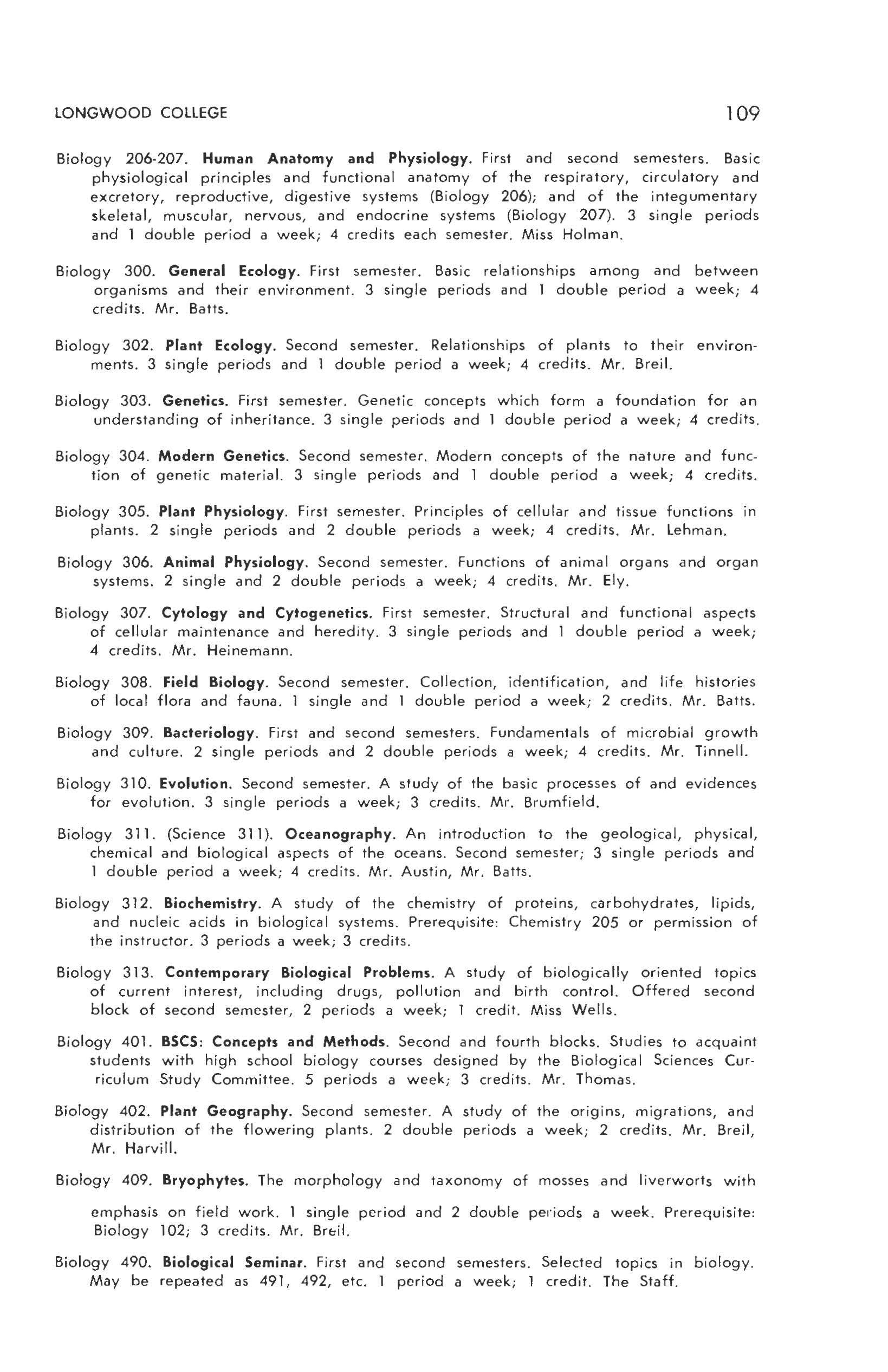
Biology 401. BSCS: Concepts and Methods. Second and fourth blocks. Studies to acquaint students with high school biology courses designed by the Biologica I Sciences Curriculum Study Committee. 5 periods a w ee k; 3 credits. Mr. Thomas .
Biology 402. Plant Geography. Second semester. A study of the or igins, migrations, and distribution of the flowering plants. 2 double periods a week; 2 credits. Mr. Breil, Mr. Harvill.
Biology 409. Bryophytes. The morphology and taxonomy of mosses and l ive rworts with
emphasis on f iel d work. 1 single period and 2 double periods a week. Pr ereq uisite: Biology 102; 3 credits. Mr. Brtil.
Biology 490. Biological Seminar . First and second semesters. Selected topics in biology. May be repeated as 491, 492, etc. l period a week; l credit The Staff.
The major in Chemistry requires 32 hours in chemistry. The advanced work must in· elude courses in the areas of analytical, organic and physical chemistry. Physics 101, 102 and Mathematics 161, 162 or its equivalent are also required. Students majoring in chemistry should seek the advice of a member of the chemistry staff in planning programs of advanced courses.
*Chemistry 101. Introductory Chemistry. A study of the basic concepts of chemistry designed for one semester. Offered both semesters; 3 single periods and 1 double period a week; 4 credits. Mr. Hardy.
Chemistry 103, 104. General Chemistry. A study of the laws and principles of chemistry and qualitative analysis. Chemistry 103 is prerequisite to Chemistry 104; 3 single periods and 1 double period a week; 4 credits each semester. Mr. Bissell, Mr. Law.
Chemistry 201, 202. Analytical Chemistry. The theory and practice of quantitative analysis by gravimetric, volumetric, and instrumental methods. First and second semesters; 2 single and 2 three-hour periods a week; 4 credits each semester. Mr. Law.
Chemistry 205, 206. Organic Chemistry. Fundamental principles and reactions of organic chemistry. First and second semesters; 3 single periods and 1 three-hour period a week; 4 credits each semester. Mr. Hardy.
Chemistry 301, 302. Physical Chemistry. Fundamental principles and problems associated with the properties of matter-its structure and interactions. Prerequisite or corequisite: Physics 101, 102 and Math 261, 262; 3 single periods and 1 three-hour period a week; 4 credits each semester. Mr. Bissell.
Chemistry 312. Biochemistry. A study of the chemistry of proteins, carbohydrates, lipids, and nucleic acids in biological systems. Prerequisite: Chemistry 205 or permission of the instructor. 3 periods a week; 3 credits. Mr. Hardy.
Chemistry 420. Chemistry Seminar. Reports and discussions of topics of interest in the field of chemistry. Open to qualified students. May be repeated for credit, in which event the number will be 421, 422, etc. One period a week; 1 credit. The Staff.
Chemistry 432. Theoretical Chemistry. An introduction to the quantum theory and its applications to chemistry. Prerequisite: Chemistry 302. 3 single periods a week; 3 credits. Mr. Bissell.
Chemistry 433. Inorganic Chemistry. A study of electronic structure and the periodic system, bonding in inorganic materials, non-aqueous solvent systems, and modern acidbase theory. Prerequisite: Permission of the instructor. 3 single periods a week; 3 credits. The Staff.
Chemistry 434. Organic Analysis. Theory and practice in analysis of organic compounds. Prerequisite: Chemistry 206. 1 single period and 2 three-hour periods a week; 3 credits. Mr. Hardy.
Chemistry 435. Organic Preparations. Preparation and purification of organic compounds selected according to individual interests, with emphasis on modern techniques. Prerequisite: Chemistry 206. 1 single period and 2 three-hour periods a week; 3 credits. Mr. Hardy.
Chemistry 443. Biochemistry. A study of the chemistry of proteins, carbohydrates, lipids, and nucleic acids in biological systems. Prerequisite: Chemistry 205 or permission of the instructor. 3 periods a week; 3 credits. Mr. Hardy.
Chemistry 460. Radiochemistry. Properties of radionuclides, interaction of radiations with matter, radioactivity detection and measurements, isotope techniques and analytical applications. Prerequisite: permission of the instructor. 2 single periods and 1 double period a week; 3 credits. Mr. Law.
*Recommended for General Education.

Chemistry 465. Instrumental Analysis. The theoretical principles underlying selected instruments and their application to the analysis of matter. Prerequisite: Chemistry 301, 302. 2 single periods and 1 three-hour period a week; 3 credits. The Staff.
The Major in physics requires twenty-four semester hours of advanced courses beyond the introductory course. In addition, Mathematics 261, 262, 361, and 460 are required. Students who wish to major in physics should plan their programs of advanced courses in physics and mathematics with the advice of a member of the physics staff.
*Physics 101, 102. General Physics. Physics 101 is prerequisite for Physics 102. First and second semesters; 3 single periods and 1 double period a week; 4 credits each semester. Mr. Fawcett, Mr. Meshejian.
Physics 201, 202. University Physics. An introduction to physics employing the calculus. Prerequisite or corequisite: Mathematics 261, 262. 3 single periods and 1 double period a week; 4 credits each semester. Mr. Meshejian.
Physics 321, 322. Atomic and Nuclear Physics. A survey of modern developments in electron, atomic, and nuclear physics. Prerequisite: Physics 101, 102. Prerequisite or corequisite: Mathematics 261, 262. 3 single periods and 1 three-hour period a week; 4 credits each semester. The Staff.
Physics 324. Thermodynamics. A study of thermal properties of matter; phenomena involved in flow of heat and performance of work. Kinetic theory and statistical mechanics are included. Prerequisite or corequisite: Mathematics 261. Offered alternate years. 3 single periods a week; 3 credits. The Staff.
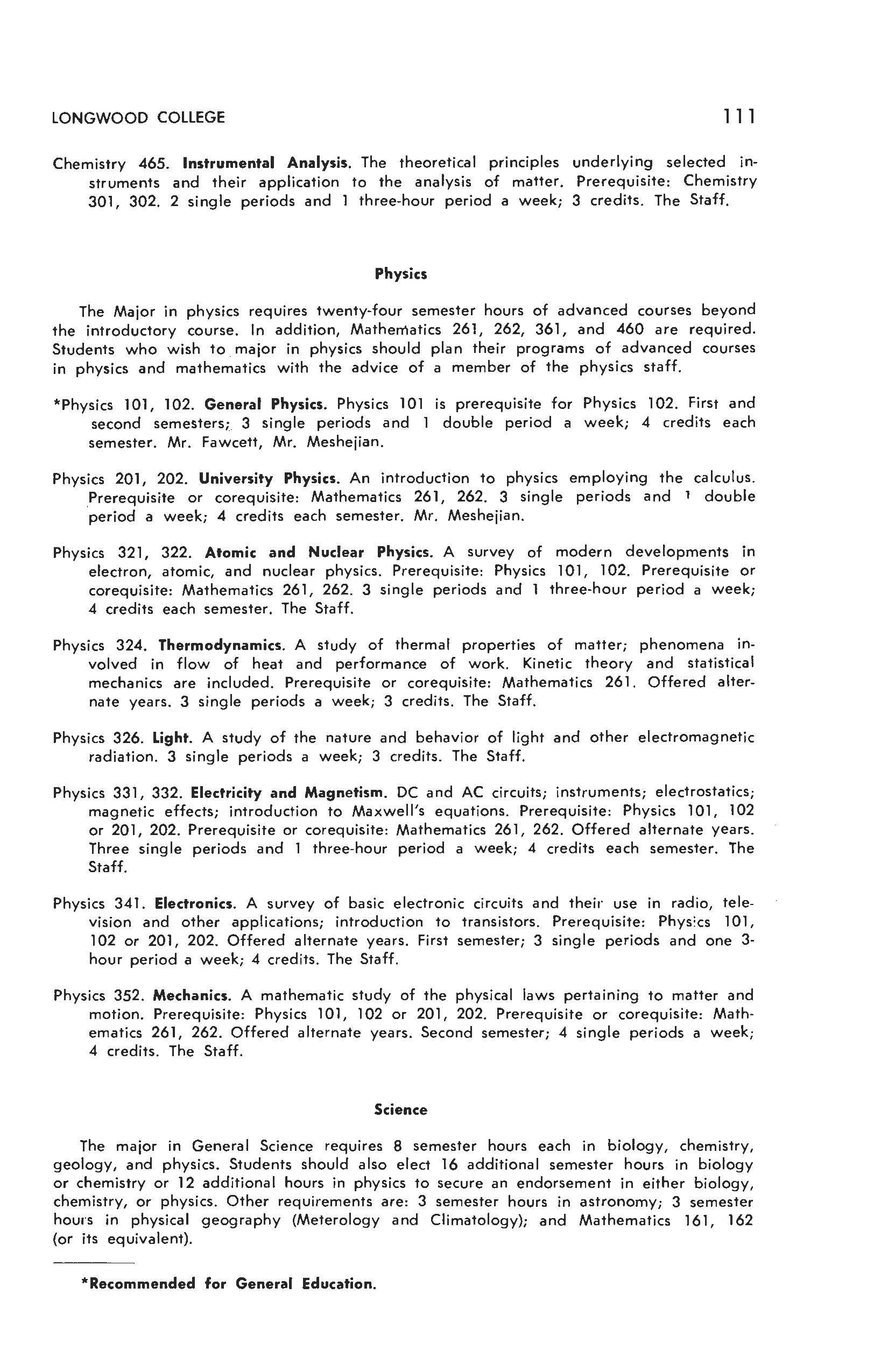
Physics 326. Light. A study of the nature and behavior of light and other electromagnetic radiation. 3 single periods a week; 3 credits. The Staff.
Physics 331, 332. Electricity and Magnetism. DC and AC circuits; instruments; electrostatics; magnetic effects; introduction to Maxwell's equations. Prerequisite: Physics 101, 102 or 201, 202. Prerequisite or corequisite: Mathematics 261, 262. Offered alternate years. Three single periods and 1 three-hour period a week; 4 credits each semester. The Staff.
Physics 341. Electronics. A survey of basic electronic circuits and their use in radio, television and other applications; introduction to transistors. Prerequisite: Phys'cs 101, 102 or 201, 202. Offered alternate years. First semester; 3 single periods and one 3hour period a week; 4 credits. The Staff.
Physics 352. Mechanics. A mathematic study of the physical laws pertaining to matter and motion. Prerequisite: Physics 101, 102 or 201, 202. Prerequisite or corequisite: Mathematics 261, 262. Offered alternate years. Second semester; 4 single periods a week; 4 credits. The Staff.
The major in General Science requires 8 semester hours each in biology, chemistry, geology, and physics. Students should also elect 16 additional semester hours in biology or chemistry or 12 additional hours in physics to secure an endorsement in either biology, chemistry, or physics. Other requirements are: 3 semester hours in astronomy; 3 semester hours in physical geography (Meterology and Climatology); and Mathematics 161, 162 (or its equivalent).
*Recommended for General Education.
The major in EMth Science requires 8 semesrer hours in each of the following biology, chemistry, geology, and physics. Also 6 semester hours in astronomy, 6 semester hours in physical geography and 4 semester hours in oceanography are required. Mathematics 161, 162 is a requirement for the Earth Science major.
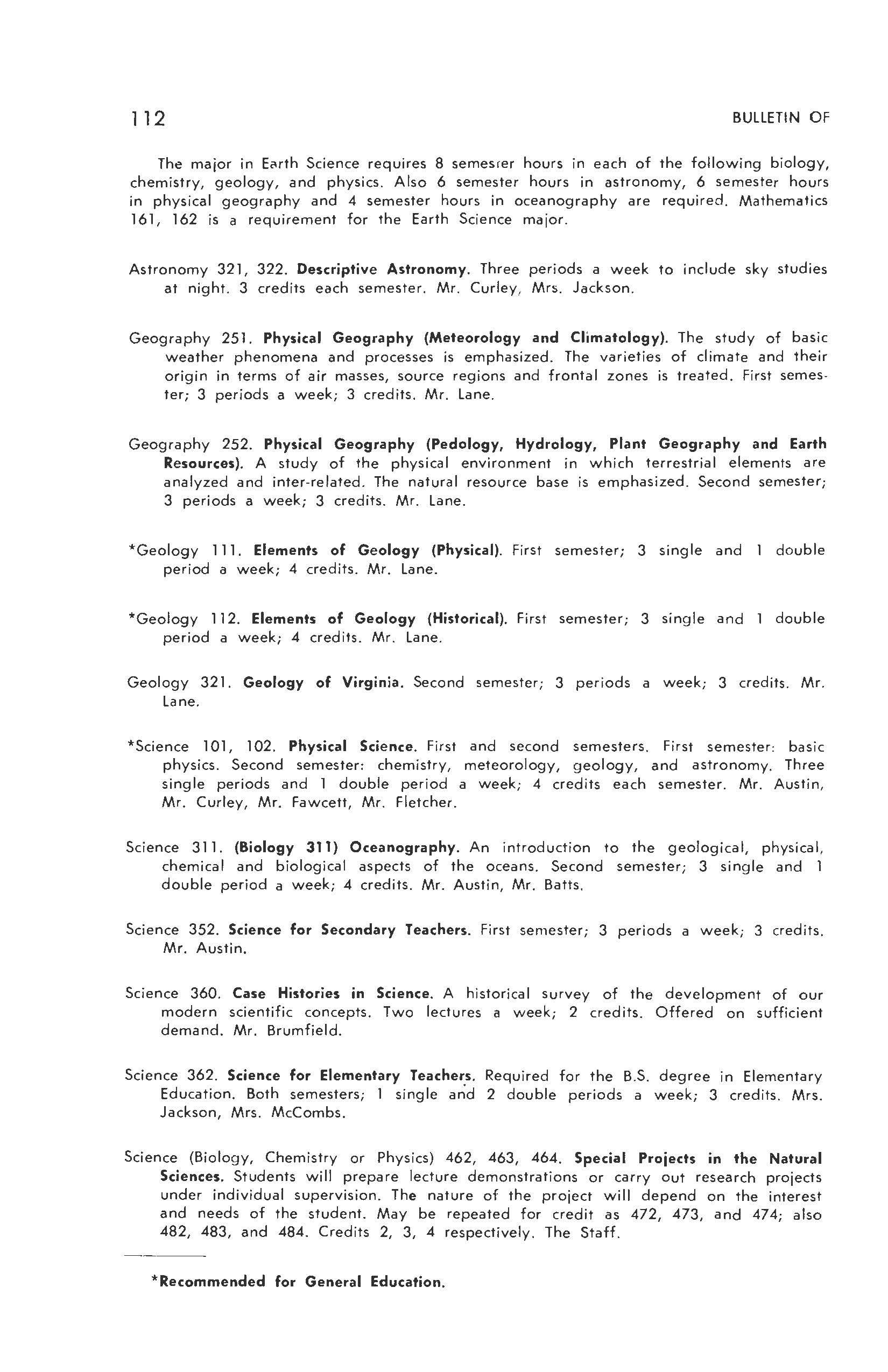
Astronomy 321, 322. Descriptive Astronomy. Three periods a week to include sky studies at night. 3 credits each semester. Mr. Curley, Mrs. Jackson.
Geography 251. Physical Geography (Meteorology and Climatology). The study of basic weather phenomena and processes is emphasized. The varieties of climate and their origin in terms of air masses, source regions and frontal zones is treated. First semester; 3 periods a week; 3 credits. Mr. Lane.
Geography 252. Physical Geography (Pedology, Hydrology, Plant Geography and Earth Resources). A study of the physical environment in which terrestrial elements are analyzed and inter-related. The natural resource base is emphasized. Second semester; 3 periods a week; 3 credits. Mr. Lane.
*Geology 111. Elements of Geology (Physical). First semester; 3 single and l double period a week; 4 credits. Mr. Lane.
*Geology 112. Elements of Geology (Historical). First semester; 3 single and l double period a week; 4 credits. Mr. Lane.
Geology 321. Geology of Virginia. Second semester; 3 periods a week; 3 credits. Mr. Lane.
*Science l 01, l 02. Physical Science. First and second semesters. First semester, basic physics. Second semester: chemistry, meteorology, geology, and astronomy. Three single periods and l double period a week; 4 credits each semester. Mr. Austin, Mr. Curley, Mr. Fawcett, Mr. Fletcher.
Science 311. (Biology 311) Oceanography. An introduction to the geological, physical, chemical and biological aspects of the oceans. Second semester; 3 single and l double period a week; 4 credits. Mr. Austin, Mr. Batts.
Science 352. Science for Secondary Teachers. First semester; 3 periods a week; 3 credits. Mr. Austin.
Science 360. Case Histories in Science. A historical survey of the development of our modern scientific concepts. Two lectures a week; 2 credits. Offered on sufficient demand. Mr. Brumfield.
Science 362. Science for Elementary Teachers. Required for the B.S. degree in Elementary Education. Both semesters; l single a,.;d 2 double periods a week; 3 credits. Mrs. Jackson, Mrs. Mccombs.
Science (Biology, Chemistry or Physics) 462, 463, 464. Special Projects in the Natural Sciences. Students will prepare lecture demonstrations or carry out research projects under individual supervision. The nature of the project will depend on the interest and needs of the student. May be repeated for credit as 472, 473, and 474; also 482, 483, and 484. Credits 2, 3, 4 respectively. The Staff.
*Recommended for General Education.
*Miss Andrews, Mrs Bobbitt, Miss Bowman, Miss Bush, Miss Callaway, Miss Davis, Miss Fath, Miss Gustafson, Mrs. Harriss, Miss Heintz, Miss Huffman, Miss Oliver, Miss B. Smith, Miss J. Smith, Miss S Smith
The Department has a two-fold purpose: first, to provide professional courses in physical and health education that will prepare students to teach Physical and Health Education in elementary and secondary schools; second, to provide opportunity fo r all students to engage in developmental and recreational activities.
A regulation suit is required in all activity courses The suits are purchased through the College Bookstore. Regulation swimming suits are provided by the College and must be used for instructional and recreational swimming .
The swimming pool is open to students at certain hours for recreational purposes Opportunities are provided for all stude:nts to participate in sports and dance activities through clubs, intramural, interclass, and intercollegiate and recreational programs
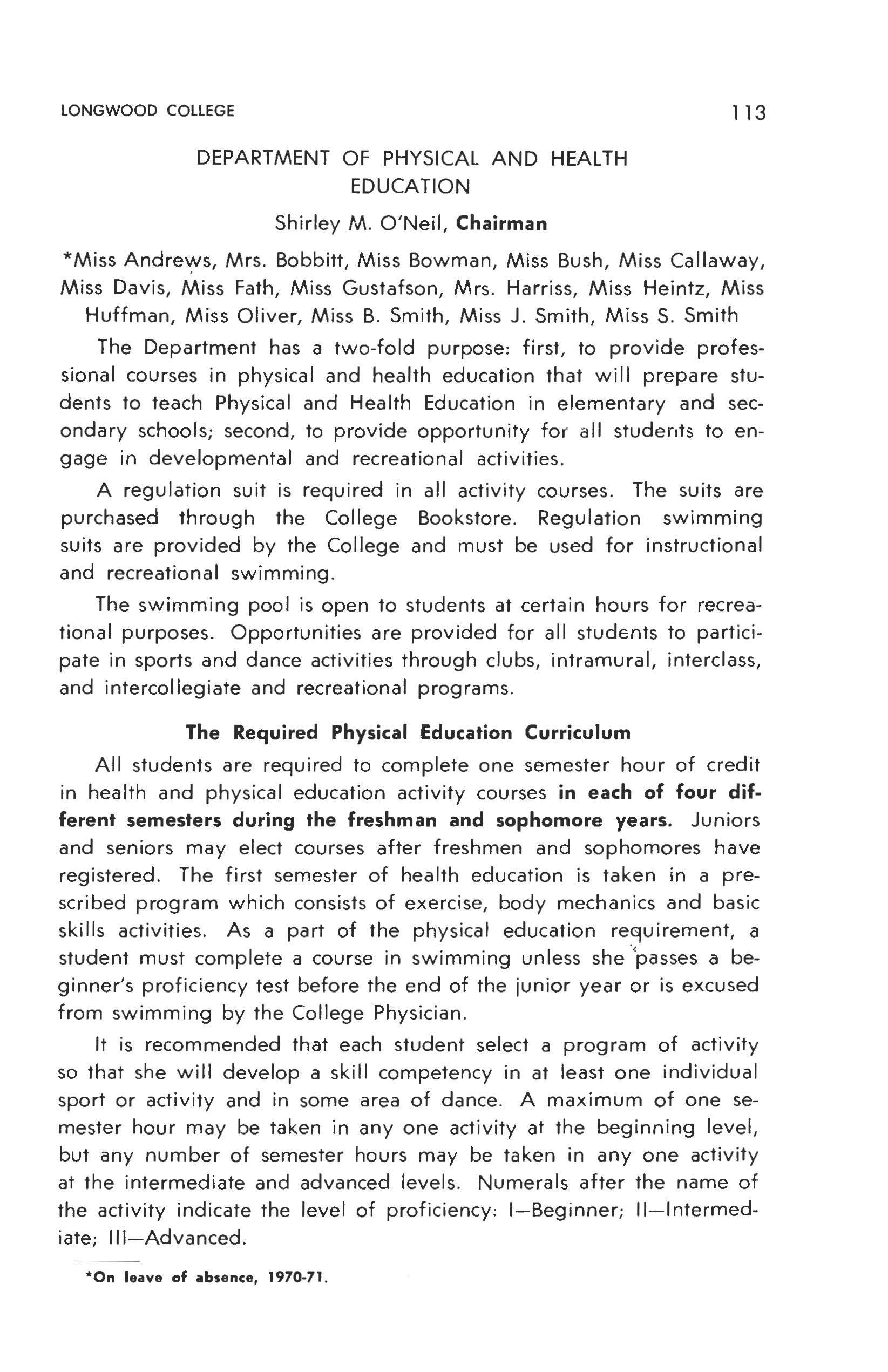
All students are required to complete one semester hour of credit in health and physical education activity courses in each of four different semesters during the freshman and sophomore years. Juniors and seniors may elect courses after freshmen and sophomores have registered The f i rst semester of health education is taken in a prescribed program which consists of exercise, body mechanics and basic skills activities. As a part of the physical education requirement, a student must complete a course in swimming unless she ·,passes a beginner's proficiency test before the end of the junior year or is excused from swimming by the College Physician
It is recommended that each student select a program of activity so that she w i ll develop a skill competency in at least one individual sport or activity and in some area of dance . A maximum of one semester hour may be taken in any one activity at the beginning level, but any number of semester hours may be taken in any one activity at the intermediate and advanced levels Numerals after the name of the activity indicate the level of proficiency: I-Beginner ; II-Intermed iate; Ill Advanced.
*On leave of absence, 1970-71 .
•tHealth Education 100. Freshman Health Education . A prescribed program for all freshman students. A general self-image course designed to meet present needs and interests of college students through exercise, body mechanics and basic skills activities. Offered both semesters; 3 periods a week; 1 credit.
Physical Education 104, 10S, 106, 107, 108, 109, 110, 112, 113 . Physical Education for all second semester freshman students, sophomores, juniors, and seniors. Semester activity courses; 3 periods a week; 1 credit.
Physical Education 104 . Fencing 1-11.
Physical Education 10S. Gymnastics 1-11.
Physical Education 106. Modern Dance I, II, Ill.
Physical Education 107. Tennis 1-11.
Physical Ecfucation 108. Golf 1-11.
Physical Education J09. Lacrosse 1-11.
Physical Education 110. Swimming-Non-Swimmers, Beginner, Intermediate, Senior Life Saving,· Water Safety Instructors, Synchronized, Competitive.
Physical Education 111. Seasonal activity courses; two ha If semester courses; students signing up for seasonal activity classes must take one class each half-semester and are not permitted to take two half-semester courses in one half-semester Registration for both half-semester classes must be completed during regular registration sessions at the beginning of each semester; 3 periods a week; 1 credit for both classes combined.
Archery I Badminton Basketball I, II Bowling I, II Fencing 1, 11 Field Hockey
Physical Education 112 . Archery 1-11.
Physical Education 113. Camping Skills.
Folk and Square Dance Golf I, II Lacrosse I, 11 Tennis I, II Volleyball I, II
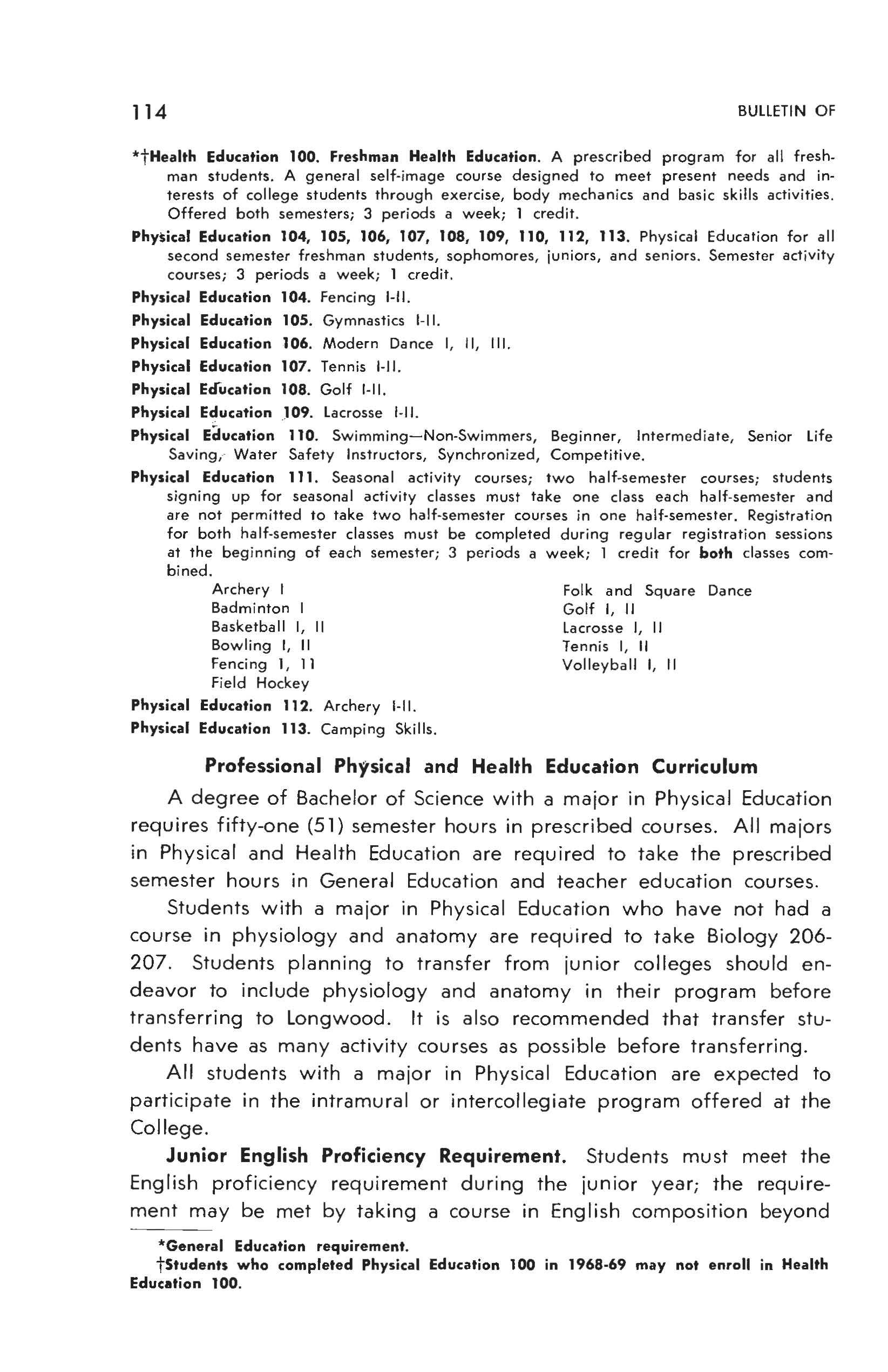
A degree of Bachelor of Science with a major in Physical Education requires fifty-one (51) semester hours in prescribed courses. All majors in Physical and Health Education are required to take the prescribed semester hours in General Education and teacher education courses. Students with a major in Physical Education who have not had a course in physiology and anatomy are required to take Biology 206207. Students planning to transfer from junior colleges should endeavor to include physiology and anatomy in their program before transferring to Longwood. It is also recommended that transfer students have as many activity courses as possible before transferring.
All students with a major in Physical Education are expected to participate in the intramural or intercollegiate program offered at the College.
Junior English Proficiency Requirement. Students must meet the English proficiency requirement during the junior year; the requirement may be met by taking a course in English composition beyond
•General Education requirement. tstudents who completed Physical Education 100 in 1968-69 may not enroll in Health Education 100.
the required course (English l 00), by taking the examination prepared by the Educational Testing Service (at the student's expense), or by writing a paper to be evaluated by three faculty members. The department has the prerogative to direct the student in the way in which she should be channeled. The curriculum established for the major in physical and health education is:
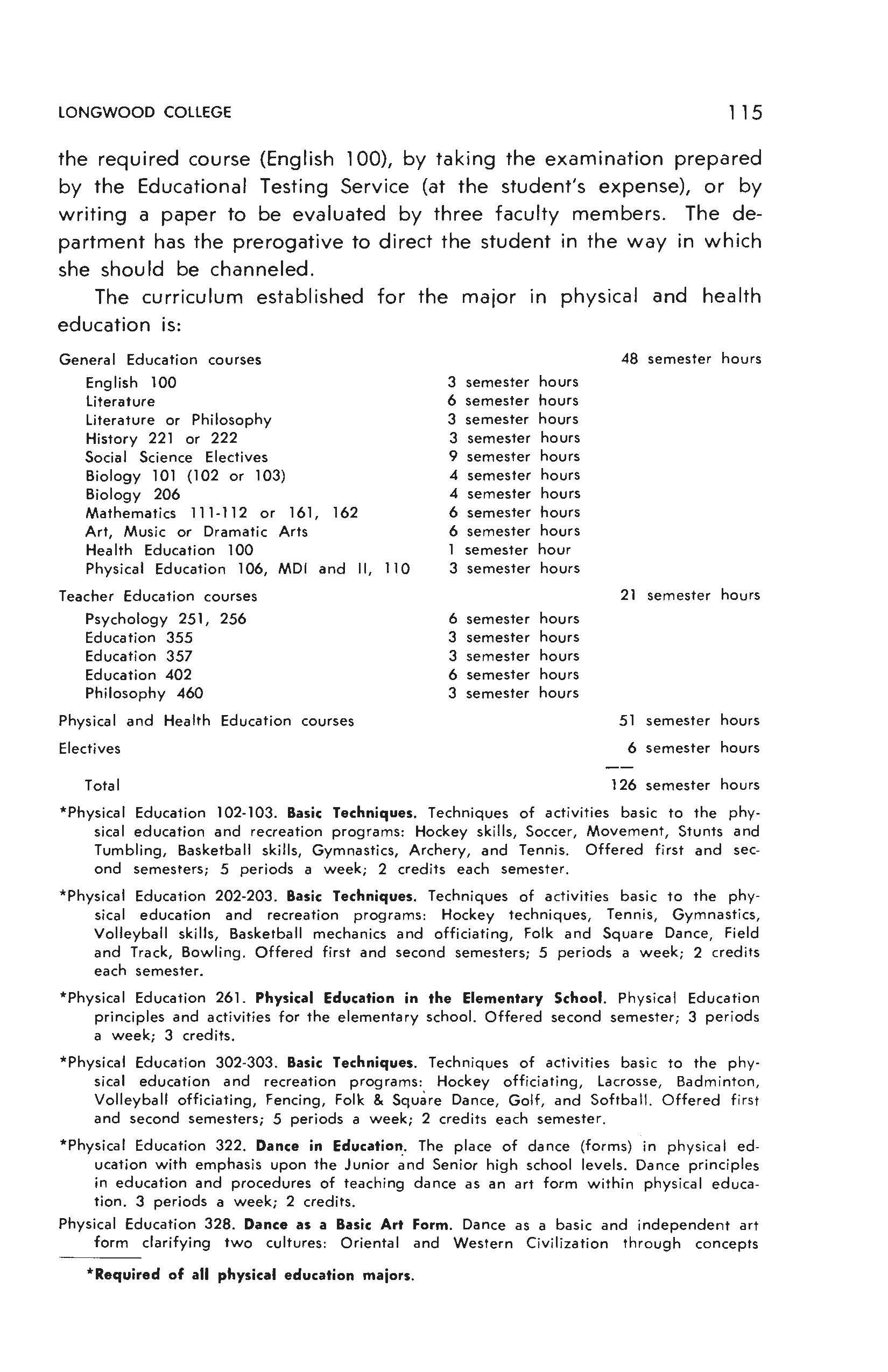
General Education courses
English 100 literature literature or Philosophy History 221 or 222 Social Science Electives Biology 101 (102 or 103) Biology 206 Mathematics 111-112 or 161, 162 Art, Music or Dramatic Arts Health Education 100 Physical Education l 06, MDI and 11, 110
Teacher Education courses Psychology 251, 256 Education 355 Education 357 Education 402 Philosophy 460
Physical and Health Education courses Electives
Total
3 semester hours 6 semester hours 3 semester hours 3 semester hours 9 semester hours 4 semester hours 4 semester hours 6 semester hours 6 semester hours l semester hour 3 semester hours 6 semester hours 3 semester hours 3 semester hours 6 semester hours 3 semester hours
48 semester hours 21 semester hours 51 semester hours 6 semester hours 126 semester hours
*Physical Education 102-103. Basic Techniques. Techniques of activities basic to the physical education and recreation programs: Hockey skills, Soccer, Movement, Stunts and Tumbling, Basketball skills, Gymnastics, Archery, and Tennis. Offered first and second semesters; 5 periods a week; 2 credits each semester.
*Physical Education 202-203. Basic Techniques. Techniques of activities basic to the physical education and recreation programs: Hockey techniques, Tennis, Gymnastics, Volleyball skills, Basketball mechanics and officiating, Folk and Square Dance, Field and Track, Bowling. Offered first and second semesters; 5 periods a week; 2 credits each semester.
*Physical Education 261. Physical Education in the Elementary School. Physical Education principles and activities for the elementary school. Offered second semester; 3 periods a week; 3 credits.
*Physical Education 302-303. Basic Techniques. Techniques of activities basic to the physical education and recreation programs: Hockey officiating, Lacrosse, Badminton, Volleyball officiating, Fencing, Folk & Square Dance, Golf, and Softball. Offered first and second semesters; 5 periods a week; 2 credits each semester.
*Physical Education 322. Dance in Education. The place of dance (forms) in physical education with emphasis upon the Junior ~nd Senior high school levels. Dance principles in education and procedures of teaching dance as an art form within physical education. 3 periods a week; 2 credits.
Physical Education 328. Dance as a Basic Art Form. Dance as a basic and independent art form clarifying two cultures: Oriental and Western Civilization through concepts *Required of all physical education majors.
relating to the primitive, archaic, and the medieval through historical, philosophical and contemporary forms of dance, and as an art form related to all other arts. Offered first semester; 3 periods a week; 3 credits.
Physical Education 337. Camp Counseling. Theory and practice in skills and procedures necessary for camping leadership. Second semester; 3 periods a week; 2 credits.
*Physical Education 338. Physiology of Exercise. Second semester; 3 periods a week; 3 credits.
*Physical Education 339. Kinesiology. Scientific bases of physical education activities, methods of analysis, and applications of scientific principles in specific physical education activities. First semester; 3 periods a week; 3 credits.
*Physical and Health Education 354. Principles and Procedures of Teaching Physical and Health Education in Junior and Senior High Schools. A combination of study and methods related to the school health program and physical education principles and activities for junior and senior high school girls. First semester; 3 periods a week; 3 credits.
Physical Education 355. Conduct of Extramural Physical Education Programs. Practice and theory in organization of intramural and interscholastic athletic programs including the principles and practice of coaching. Two periods a week; 2 credits.
Physical and Health Education 360. Elementary School Health and Physical Education. Health and Physical Education principles and activities for the elementary school. Required for a major in elementary education. Offered each semester; 3 single and 1 double period a week; 3 credits.
*Physical Education 402. Organization and Administration of Physical Education. Problems and procedures in physical education, with special emphasis on the Virginia program. Second semester; 5 periods a week; 3 credits.
*Physical Education 403 Evaluation in Physical and Health Education. Practice and theory in evaluation of performance in physical and health activities including physical fitness, skills and motor performance tests, grading procedures, body measurements, written tests, and classification of students. Offered second semester; 5 periods a week; 3 credits.
Physical Education 404. Seminar in Elementary School Physical Education. Contributions of a variety of physical education activities through the traditional and movement exploration approaches to the growth and development of the child. Prerequisite: student teaching. Three periods a week; 3 credits.
Physical Education 405. Practicum in Teaching. Supervised tea.ching experiences to supplement the professional teacher-training program. Credit and hours to be arranged (maximum of 3 credits).
Physical Education 428. Survey of Contemporary Dance Forms. Comparative study and analysis of the literature pertaining to classical and modern ballet, modern dance, and current theatre dance. Open to juniors and seniors. Prerequisite : Physical Education 328 or previous experience and study in ballet and/ or modern dance. Second semester; 2 periods a week; 2 credits.
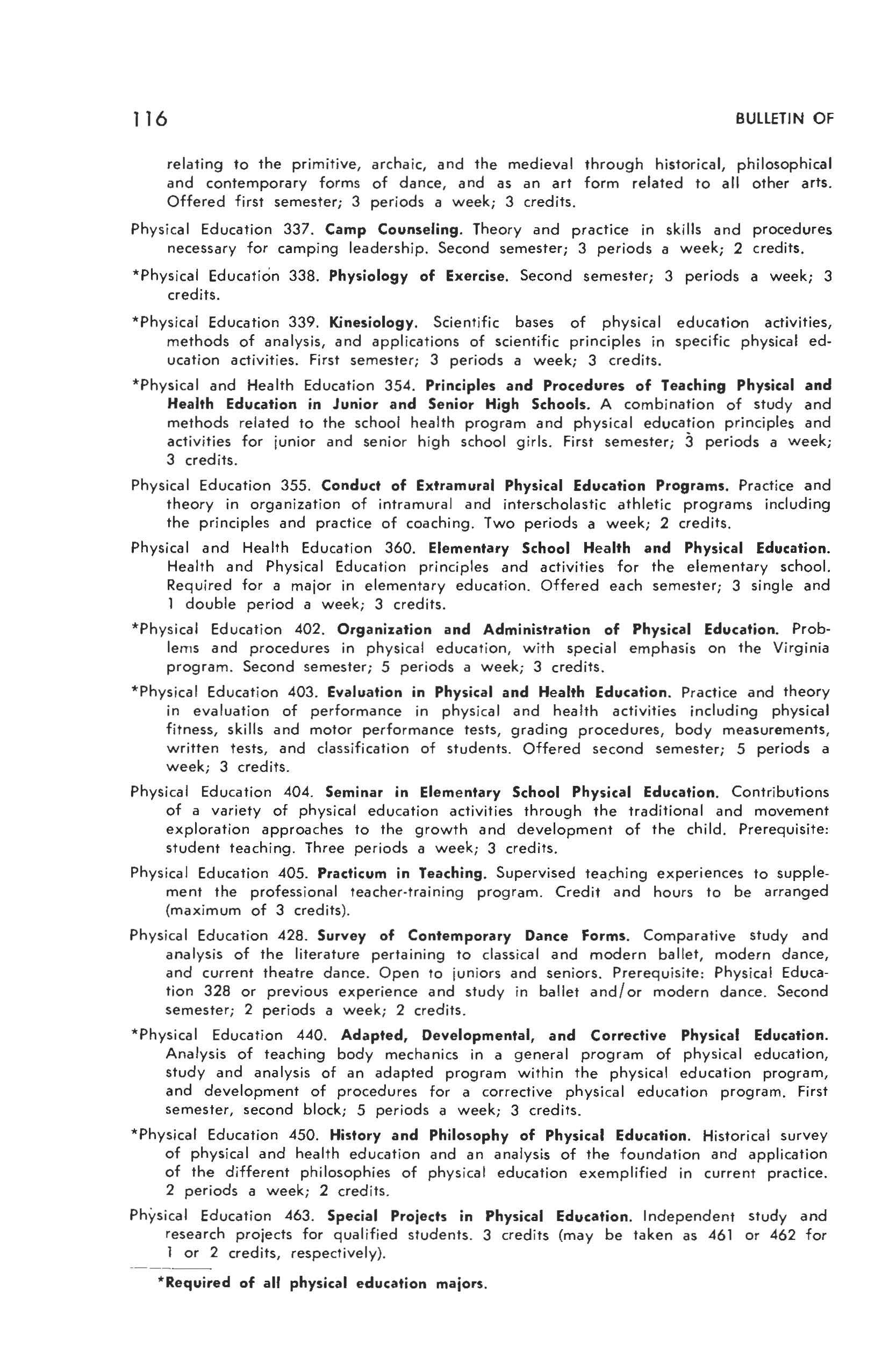
*Physical Education 440. Adapted, Developmental, and Corrective Physical Education. Analysis of teaching body mechanics in a general program of physical education, study and analysis of an adapted program within the physical education program, and development of procedures for a corrective physical education program. First semester, second block; 5 periods a week; 3 credits.
*Physical Education 450. History and Philosophy of Physical Education. Historical survey of physical and health education and an analysis of the foundation and application of the different philosophies of physical education exemplified in current practice. 2 periods a week; 2 credits.
Physical Education 463. Special Projects in Physical Education. Independent study and research projects for qualified students. 3 credits (may be taken as 461 or 462 for 1 or 2 credits, respectively).
*Required of all physical education majors.
*Health Education 301-302. Driver Education. Classroom instruction and supervised experience in teaching practice driving. Prerequisite: valid Virginia driver's license and background of driving experience This course is required for state certification in Driver Education. First and second semesters; 2 periods a week plus additional hours in behind-the-wheel instruction; 2 credits each semester.
*Health Education 339. Safety and First Aid A course in general safety, accident prevention and first aid. American Red Cross certificates will be issued to qualified ap· plicants. Second semester; 4 periods a week; 3 credits
**Health Education 341 Personal Health. General health course meeting present day needs and interests of college students. Required of all secondary school majors. Offered first and second semesters; 2 periods a week; 2 credits.
Mrs . Anderson, Mr. Sneideman,
Mr. WoodburnIt is assumed that a college graduate should be able to express ideas clearly, logically, and persuasively. To aid in the development of these skills, basic courses in public speaking, interpretation, and forensics (Speech 101, 312, 403) may be elected without prerequisite. They are designed to serve students planning to enter occupations which require effective oral communication, such as teachin9, business administration, personnel work, government service, law, and the ministry. These courses provide training in gathering, analyzing, and organizing evidence, with proper regard for logical and psychological factors important in audience situations, and in the development of effective delivery. Videotape facilities are available and may be used in evaluating platform assignments.

The Dramatic Arts offer a total experience involving intellectual, emotional, and physical aspects which contribute to the personal and social development of the the individual. Courses in the Dramatic Arts are designed to give students an insight into human character and life as reflected in dramatic literature, a breadth of empathic experiences permitting them to participate vicariously in the lives and experiences of other people, an appreciation of good theatre and worthwhile dramatic literature, critical standards of judgment, and an ability to move and speak effectively on stage More specialized courses deal with technical and aesthetic aspects of the theatre .
Three dual majors are offered by the department, two in conjunction with the Department of English : Speech and Dramatic Arts; Speech and English; and Dramatic Art and English. Specific requirements for these majors leading to the A.B. and B.S. degrees are as follows :
*Required of all physical education majors.
**Open only to students who are bound by th e catalogue under which they entered to complete 6 semester hours in Health and Physical Education,
Major in Speech and Dramatic Arts-38 semester hours: Speech 100,101,201,311,401,403; Dramatic Arts 201, 202, 301, 302, 305, 368; and one of the following: Dramatic Arts 369, 370, or 413, 560, or 561.
Major in English and Dramatic Arts-38 semester hours: English 100, 211, 212, 321 or 322, 505; Dramatic Arts 201, 202, 301, 302, 305; Speech 403; and six hours of dramatic literature, including Dramatic Arts 368 . The major in English and Dramatic Arts who is working for the Collegiate Professional Certificate must also take English 400. Major in English and Speech-39 semester hours : English 100, 211, 212, 321 or 322,505; Speech 100, 101, 201, 311, 401, 403; and 6 hours in approved offerings by the English Department in writing, literature, and linguistics . The major in English and Speech who is working for the Collegiate Professional Certificate must also take English 400.
For certification in Speech or Dramatic Arts as well as English, 6 additional semester hours are required in each field beyond the basic 30 semester hours in English Certification to teach separately Speech or Dramatic Arts requires 12 semester hours of work in each field. For Speech, the 6 or 12 semester hours may be obtained from any of the course offerings in Speech; for Dramatic Arts the 6 hours must be obtained from Dramatic Arts 201 and 202, and the 12 hours will include Dramatic Arts 201, 202, 300, and 301.
As described on page 54, Longwood College and the University of Virginia have a cooperative program leading to a major in Speech Pathology. The following courses are requirements for this major:
Art, Music or Dramatic Arts electives
Biology 101 or 103
Education 355 Engl ish 100, 211, 212, 510 Health Education 100 History 111,112 or Geography 141, 142
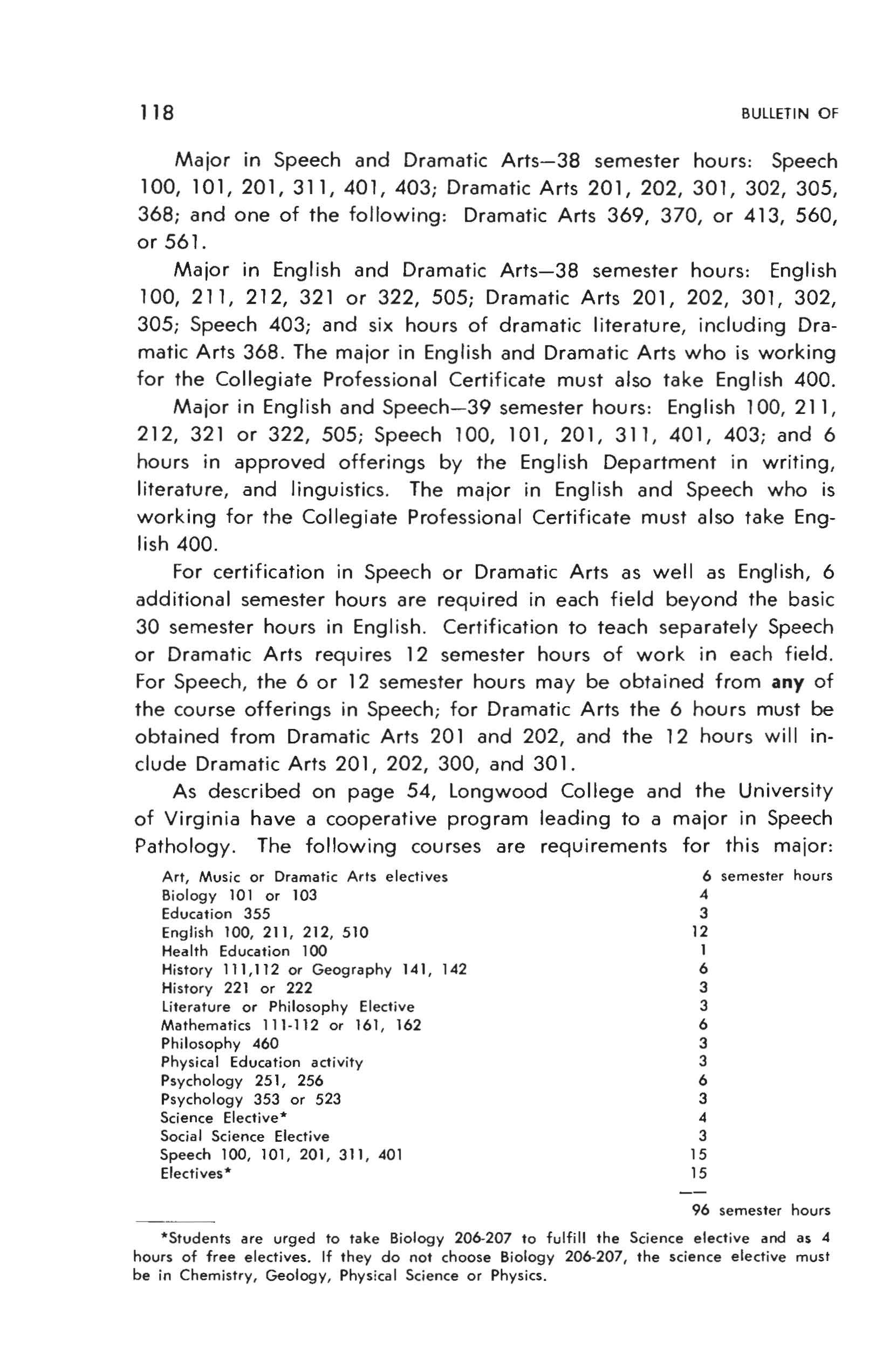
History 221 or 222
Literature or Philosophy Elective Mathematics 111-112 or 161 , 162
Philosophy 460 Physical Education activity
Psychology 25 l, 256
Psychology 353 or 523
Science Elective*
Social Science Elective Speech 100, 101, 201, 311 , 401 Electives*
6 semester hours 4 3 12 l 6 3 3 6 3 3 6 3 4 3 15 15 96 semester hours
*Students are urged to take Biology 206-207 to fulfill the Science elective and as 4 hours of free electives. If they do not choose Biology 206-207, the science elective must be in Chemistry, Geology, Physica I Science or Physics
At the Univers ity of Virginia:
Speech Education Speech Education Speech Education Speech Education Speech Education Speech Educat ion Speech Educat ion Speech Education Speech Education Speech Education
105: 106: 107 : 108 : 121 : 131 : 132: 142: 151 : 153 :
Phonetics
The Bases of Speech -· Sp·eech Science Experimental Phonetics _ _ Rehabilitation Programs in Speech and Hearing __ _ Principles of Speech Correction Pr i nciples of Speech Pathology -··- ----·Voice Disorders -· --· Introduction to Audiology Audiometry -·-------------
Total hours of credit ··- ----··-- ---·· · ·
Speech 100 Voice and Diction. Study of the vocal mechanism and voice production. Anal y sis of the sounds of American English through phonetic study Improvement of personal speech skills through reading exercises. Offered each semester; 3 periods a week; 3 credi ts. Mr. Woodburn.
Speech 101. Fundamentals of Public Speech. An introductory study of effect ive and responsible speaking. Provis ions will be made for practical application Offered each semester ; 3 periods a week; 3 credits. The Staff.
Speech 201. Discussion and Debate . Study and analysis of public discuss ion and debate concerning current national and international issues; discussion types and methods; argumentation Parliamentary procedure and conduct of the democratic meeting. Second semester ; 3 periods a week ; 3 credits. Mr. Woodburn.
Speech 311 Radio and Television . Radio skills with studio practice; elementary television, function of radio and television media in American culture. First semester ; 3 periods a week ; 3 credits Mr. Woodburn
Speech 312. Forensics. A course designed to acquaint students w ith forensic procedures, specifically intra- and extramural oratorical and forensic activities Offered first semester ; 3 periods a week ; 3 credits . Mrs. Anderson .
Speech 401 Speech for the Classroom Teacher . The role of speech in teaching ; psysiology of speech , voice training, speech corrective measures , public address , and group discus sion techniques Second semester; 3 periods a week; 3 credits Mr. Woodburn.

Speech 403 Oral Interpretation . Development of skill in oral reading : the expression and discipline of voice, thought, emot ional response, and bodily action ; techniques of presentation as adapted to varying forms and types of literature. Practice i n reading prose, poetry, and drama designed to increase literary appreciation First semester; 3 periods a week; 3 credits Mrs Anderson
*Dramatic Arts l 00 Introduction to the Theatre. A basic course designed to provide a general introduct ion to the dramatic arts. Offered each semester ; 3 periods a week ; 3 credits . The Staff .
Dramat ic Arts 201, 202 . Play Production. A lecture and laboratory course . First semester: introduction to the theatre including methods of play analys is; organization of the professional and educational theatre; methods of scene construction and paint i ng Second semester: methods of lighting the stage ; scene, costume , and light design. First and second semesters; 3 double periods a week ; 3 credits each semester Mr Sneideman.
*Recommended for General Education.
Dramatic Arts 300. Children'• Theatre. A study of the special requirements of presenting drama to children and of the child's response to theatrical experience. An exploration of improvisation as a basic directorial tool in work with children. In sequence with Dramatic Arts 301 and 302. Offered second semester 1971-72; 3 two-hour classlaboratories a week; 3 credits. Mr. Lockwood .
Dramatic Arts 301. Problem• in Directing. Directing with particular reference to the educational theatre, theatre organization, styles of presentation, composition and picturization, and relationships bP.tween the .director and other theatre workers . Students 10 direct one-act plays and assist in direction of the major productions of the semes• ter. Prerequisite: Dramatic Arts 201 or 202. In sequence with Dramatic Arts 300 and 302. Offered first semester 1970 71 ; 3 periods a week; 3 credits. Mr Lockwood.
Dramatic Arts ' 302 Fundamental• of Acting. Study of methods and styles of acting; historical development of acting as a fine art. Pantomime and improvisation. Students to perform in major productions, one-act plays, and class exercises and scenes. Prerequisite: Dramatic Arts 201 or 202. In sequence with Dramatic Arts 300 and 301. Offered second semester 1970 71; 2 double periods a week; 2 credits. Mr. Lockwood.
Dramatic Arts 303 . Scene Design. A lecture laboratory course dealing with the concept of scene design , the practical application of basic principles to modern staging methods , the function of scene design in its relation to the play, and the visual contribution of design to the production as a whole. Procedures and presentation techniques, theatre lighting, analysis of equipment needs of educational producing groups Prerequisite : Dramatic Arts 201 , 202 or consent of instructor Alternate years. Offered second ~em,.ster 1971-72; 2 double periods a week; 2 credits Mr. Sneideman.
Dramatic Arte 304. Costuming . /\ lecture-laboratory course dealing with the history of costumes for stage productions , the organization and care of theatre wardrobe, and the theory and technique of stage make-up. Laboratory work coordinated with college productions. Prerequisites , Dramatic Arts 201 and 202 or consent of instructor. Alternate years Offered first semester 1971 72, 2 double periods a week; 2 credits. Mr. Sneideman.
Dramatic Arts 305, 306. History of the Theatre. A study of Western and Oriental theatre from its beginnings to the prE!sent with special emphasis on the impact of the theatre arts on Western civilization. 305 and 306 will be offered in sequence in alternate years 1970-71. 3 periods a week; 3 credits. Mr. Sneidemar,. Dramat ic Arts 361'1 World Drama . A study of the forms and types of representative plays in the main current of world rlrama from its beginning to Goethe. (Same as English 368.) In sequence with Dramatic Arts 369 and 370 Offered second semester 1971-72; 1 peri,Jd.s o v,e~h 3 cre-.-:Hts. Mr. l.oi:-kv.t0od.
Dramatic Arts 369 Modern European Drama. A study of the European rhea 1re from Goethe through Shaw. (Same as English 369.) In sequence with Dramatic Arts 368 and 370. Offered first semester 1970-71 ; 3 periods a week; 3 credits. Mr. Lockwood
Dramatic Arts 370. Contemporary Drama. A study of European and American drama producted in the last fifty yeMs. Brecht, Bolt , Betti, Albee, Frisch, Sartre, Giradoux , Ghelderode , and others (Same as English 370). In sequence with Dramatic Arts 368 and 369. Offered second semester 1970-71; 3 periods a week; 3 credits . Mr . Lockwood.
Drnmatic Arts 404. Play Wr:ting . An historical survey of play-writing techniques of the past and the present; the development in the student, of a philosophy of play wriiing which clarifie s objective ancl rnearis; ernpliasis on theory and practice in play w,iii11g; the writi n g of a one-a c t play. Offered second semester; 2 two-hour c'asslal,oratories a week; 3 credits. Mr. Lockwood
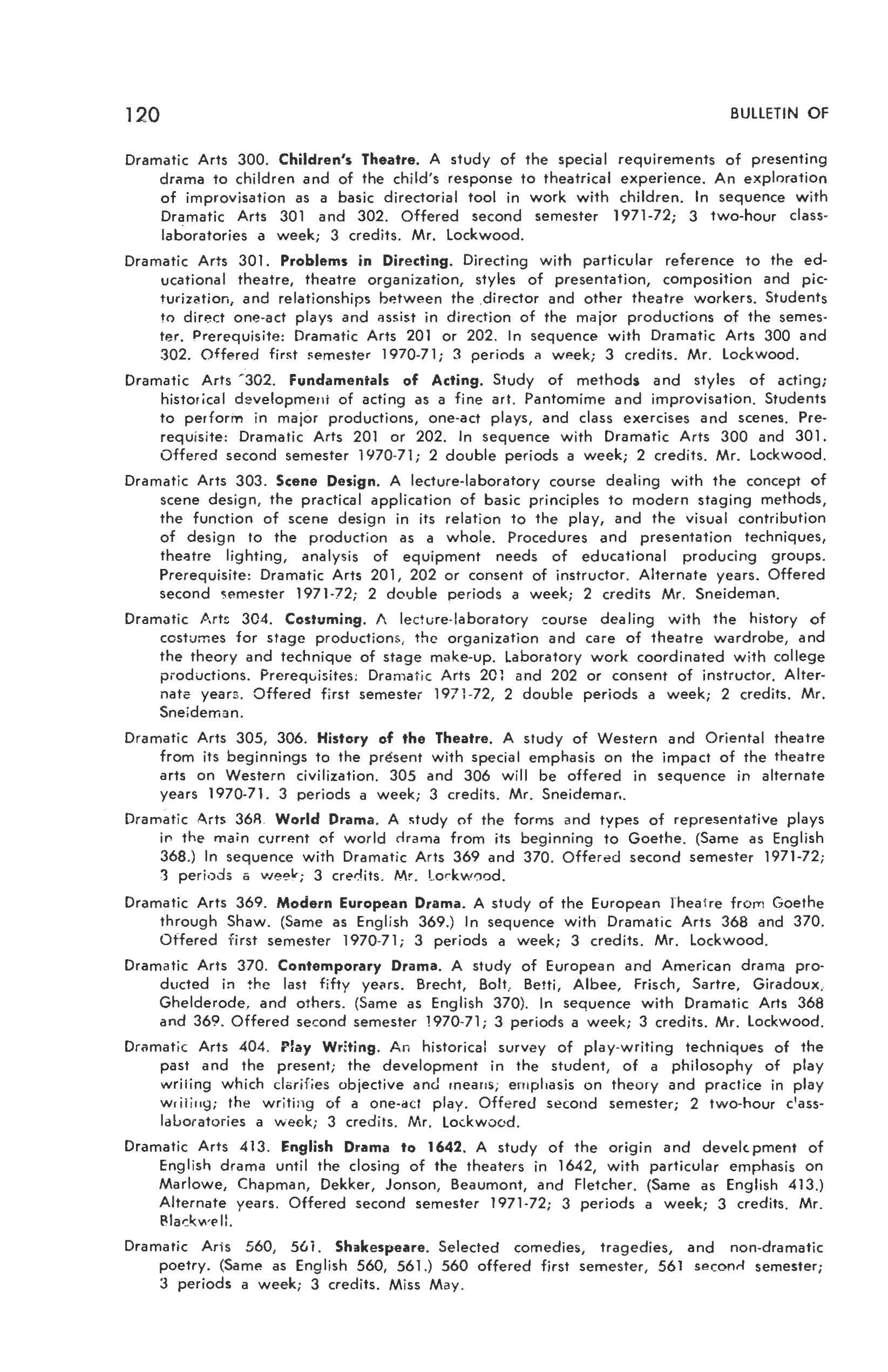
Dramatic Arts 413. fnglish Drama to 1642. A study of the origin and devekpment of English drama until the closing of the theaters in 1642, with particular emphasis on Marlowe, Chapman , Dekker, Jonson, Beaumont, and Fletcher (Same as English 413.) Alternate years. Offered second semester 1971-72 ; 3 periods a week ; 3 credits. Mr. Ella-::kweli.
Dramatic Aris 560, 5G i. Shake,peare . Selected comedies, tragedies, and non-dramatic poetry (Same as English 560, 561.) 560 offered first semester , 561 secon.-l semester; 3 periods a week ; 3 credits. Miss May.
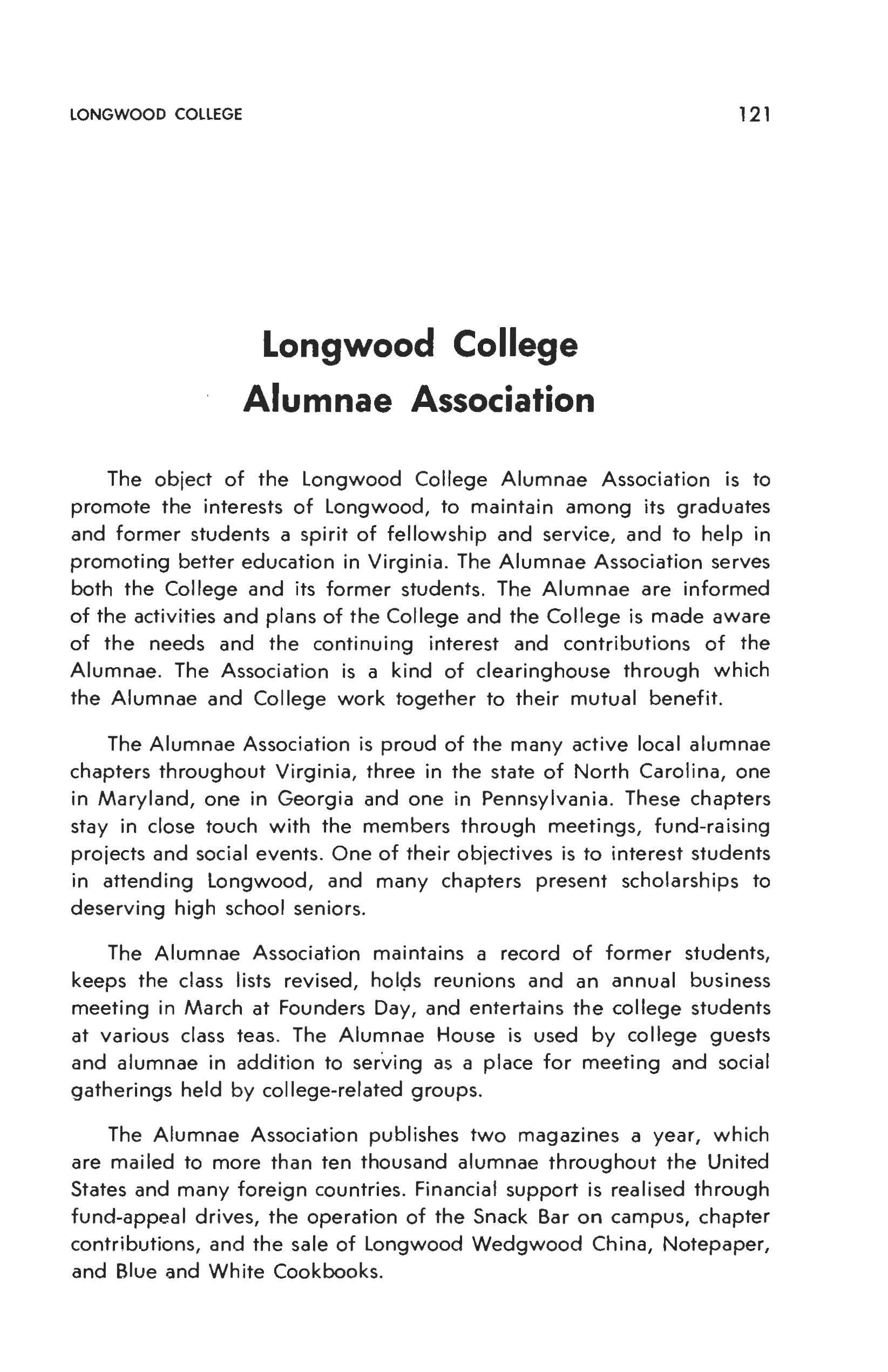
The object of the Longwood College Alumnae Association is to promote the interests of Longwood, to maintain among its graduates and former students a spirit of fellowship and service, and to help in promoting better education in Virginia. The Alumnae Association serves both the College and its former students. The Alumnae are informed of the activities and plans of the College and the College is made aware of the needs and the continuing interest and contributions of the Alumnae. The Association is a kind of clearinghouse through which the Alumnae and College work together to their mutual benefit.
The Alumnae Association is proud of the many active local alumnae chapters throughout Virginia, three in the state of North Carolina, one in Maryland, one in Georgia and one in Pennsylvania These chapters stay in close touch with the members through meetings, fund-raising projects and social events. One of their objectives is to interest students in attending Longwood, and many chapters present scholarships to deserving high school seniors.
The Alumnae Association maintains a record of former students, keeps the class lists revised, hol9s reunions and an annual business meeting in March at Founders Day, and entertains the college students at various class teas. The Alumnae House is used by college guests and alumnae in addition to serving as a place for meeting and social gatherings held by college-related groups.
The Alumnae Association publishes two magazines a year, which are mailed to more than ten thousand alumnae throughout the United States and many foreign countries. Financial support is realised through fund-appeal drives, the operation of the Snack Bar on campus, chapter contributions, and the sale of Longwood Wedgwood China, Notepaper, and Blue and White Cookbooks.
DR H I. WILLETT, JR , President, Longwood College Farmville, Va. 23901
DR. DABNEY S. LANCASTER, President Emeritus, Millboro Springs, Va . 24461
DR FRANCIS G LANKFORD, JR Cavalier Dr , Colthurst, Charlottesville , Va 22901
President : MRS BETTY JONES KLEPSER , 1405 S. 20th St., Arlington , Va 22202
First Vice President": MRS. GLADYS GRIFFIN JETER, 4433 Gorman Dr , Lynchburg, Va. 24503
Second Vice President: MRS ANNIE LEE YOUNG DUFF, P. 0. Box 296, Chuckatuck, Va 23339
Executive Secretary and Treasurer: MRS ELIZABETH SHIPPLETT JONES , Rt 2, Farmville , Va 23901
Alumnae House Chairman : MRS ROSEMARY ELAM PRITCHARD, 604 E Cawson St , Hopewell , Va 23860
Snack Bar Chairman : MRS NANCY MADDOX CARRINGTON, 4007 Summit Street, Lynchburg , Va . 24503
Directors : MISS DOROTHY OVERCASH , 21 S Washington St , Winchester, Va 22601
MRS CHARLOTTE RICE MUNDY, 1342 East Dr ., S W., Roanoke, Va 24015
MRS MAY HENRY SADLER MIDGETT, 401 Bay Colony Dr , Virginia Beach, Va 23451
MRS . ELEANOR FOLK CANTER , JR ., 456 Ott St ., Harrisonburg, Va . 22801
MRS. JO DEARING SMITH, Rt 1, Farmville, Va. 23901
MRS MARGARET TURPIN BURKE, 2008 Mimosa Dr , Lynchburg, Va 24503
MRS. JOHNNY LYBROOK MOTHERSHEAD , 5644 Gwynne Cove, Memph i s, Tenn 38117
MRS PAULINE LANFORD STONER , 8 South Childs St., Woodbury , N J 08096
Class Representatives :
MRS HELEN WEEKS PARKER, 1136 Georgetown Rd., Apt 101 , Norfolk, Va 23502
MISS OLIVIA GIBSON, 2624 Yale Ct , Apt 2, Chesapeake, Va. 23324
MISS JEANNETTE FALLEN, 102 Dara Dr ., Apt 3, Woodbr i dge, Va 22191
MRS VIRGINIA POINDEXTER SAMUEL , 2304 Hanson Rd , Apt 16, Edgewood , Md 21040
MRS SUE ELLA COLE MUSSELMAN , 14 Bentley Ct. , Fredericksburg , Va 22401
MRS. MARGIE WOOD STEELE , 6 East Bellefonte Ave ., Alexandria , Va 22301
MISS SHIRLEY DURVIN , 4307 Aust i n Ave. , Richmond, Va 23222
MISS SUZANNE MEEK, 3 South Oak Ave., Highland Springs, Va 23075
MISS JANET WILLIAMS , 2803 Skipwith Rd ., Richmond, Va 23229
MISS JANET SOFLEY , 321 Rosemont Rd , Apt 301, Virginia Beach, Va 23452
MISS CAM THOMAS, 2209 D Chateau Dr. , Richmond. Va. 23224
Presidenh of Local Alumnae Chapters:
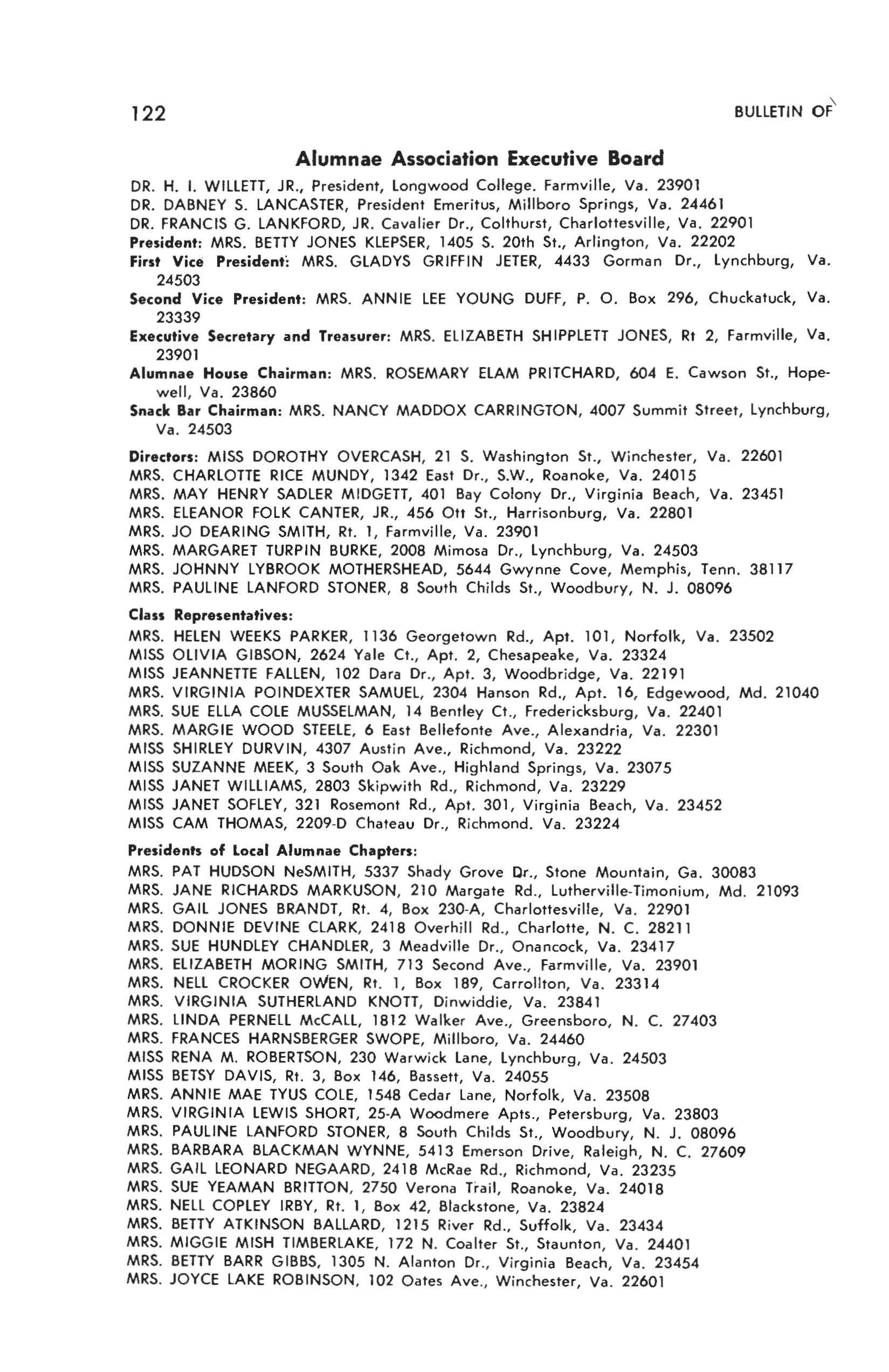
MRS. PAT HUDSON NeSMITH , 5337 Shady Grove Dr ., Stone Mo u ntain, Ga . 30083
MRS. JANE RICHARDS MARKUSON , 210 Margate Rd , Lutherville Timonium, Md 21093
MRS GAIL JONES BRANDT, Rt 4 , Box 230 A , Charlottesville, Va 22901
MRS DONNIE DEVINE CLARK, 2418 Overhill Rd. , Charlotte, N C 28211
MRS SUE HUNDLEY CHANDLER , 3 Meadville Dr ., Onancock , Va 23417
MRS ELIZABETH MORING SMITH , 713 Second Ave ., Farmville, Va 23901
MRS NELL CROCKER OWEN, Rt 1, Box 189, Carrollton, Va 23314
MRS VIRGINIA SUTHERLAND KNOTT , Di nwiddie, Va. 23841
MRS. LINDA PERNELL McCALL, 1812 Walke r Ave ., Greensboro, N C. 27403
MRS . FRANCES HARNSBERGER SWOPE, M i llboro, Va. 24460
MISS RENA M ROBERTSON, 230 Warw i ck Lane, Lynchburg, Va. 24503
MISS BETSY DAVIS, Rt 3 , Box 146, Bassett, Va 24055
MRS. ANNIE MAE TYUS COLE, 1548 Cedar Lane, Norfolk, Va. 23508
MRS. VIRGINIA LEWIS SHORT, 25-A Woodmere Apts., Petersburg, Va 23803
MRS. PAULINE LANFORD STONER , 8 South Ch i lds St., Woodbury, N . J. 08096
MRS BARBARA BLACKMAN WYNNE, 5413 Emerson Drive , Raleigh, N C 27609
MRS GAIL LEONARD NEGAARD, 2418 McRae Rd , Richmond , Va 23235
MRS SUE YEAMAN BRITTON , 2750 Verona Trail, Roanoke, Va. 24018
MRS NELL COPLEY IRBY , Rt 1, Box 42 , Blackstone, Va. 23824
MRS BETTY ATKINSON BALLARD , 1215 Ri ver Rd., Suffolk, Va 23434
MRS MIGGIE MISH TIMBERLAKE , 172 N Coalter St , Staunton , Va. 24401
MRS. BETTY BARR GIBBS, 1305 N Alanton Dr ., Virginia Beach , Va 23454
MRS. JOYCE LAKE ROBINSON , 102 Oates Ave ., Win chester, Va 22601
E. ANGUS POWELL-Rector RICHMOND
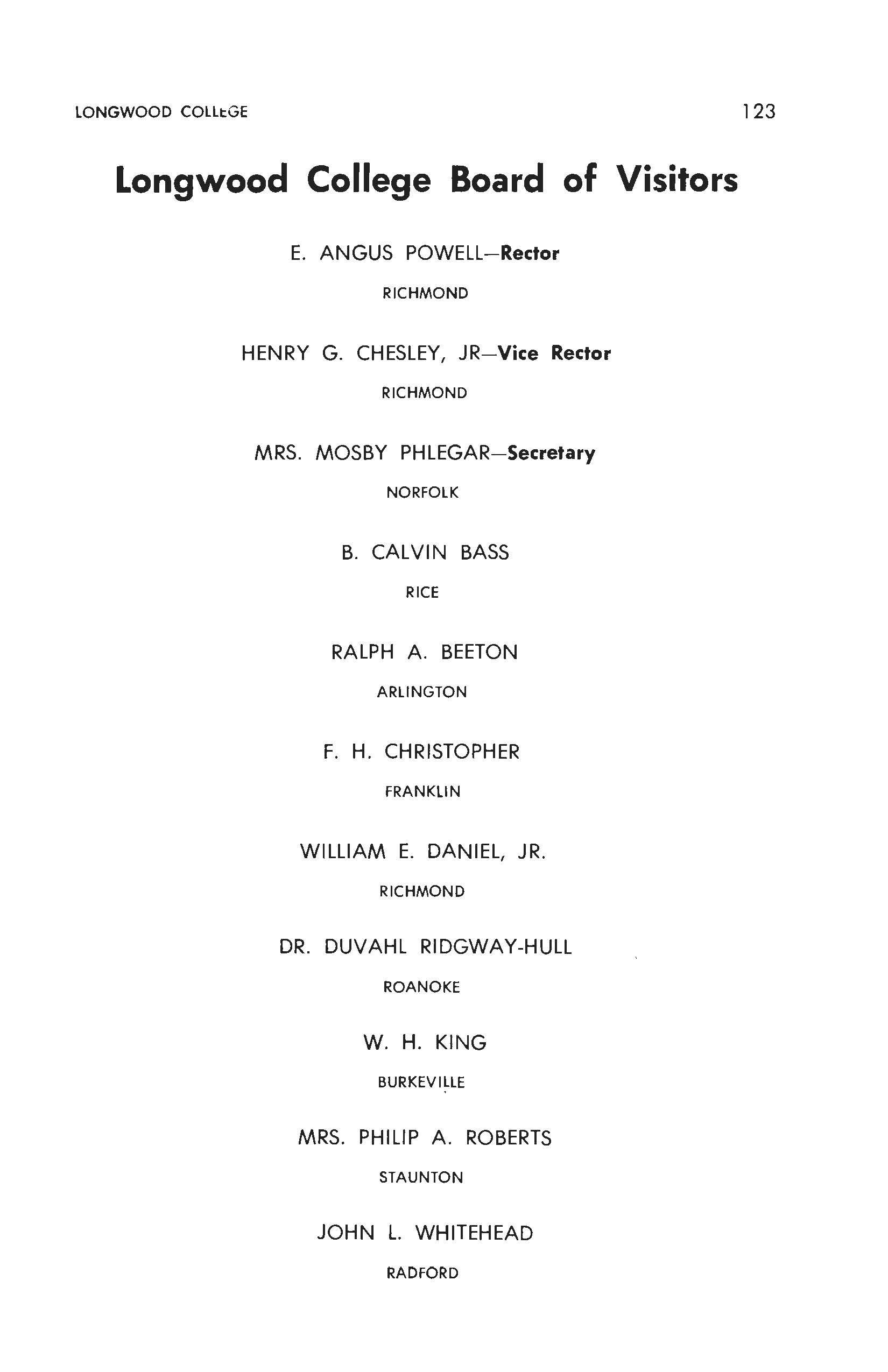
HENRY G. CHESLEY, JR-Vice Rector RICHMOND
MRS. MOSBY PHLEGAR-Secretary NORFOLK
B. CALVIN BASS RICE
RALPH A. BEETON ARLINGTON
F. H. CHRISTOPHER FRANKLIN WILLIAM E. DANIEL, JR. RICHMOND
DR. DUVAHL RIDGWAY-HULL ROANOKE
W. H. KING BURKEVILLE
MRS. PHILIP A. ROBERTS STAUNTON JOHN L. WHITEHEAD RADFORD
HENRY I. WILLETT, JR., B.A , M Ed., Ed D ______ President DABNEY S. LANCASTER, B.A., M.S ., LLD. ___ President Emeritus HERBERT R. BLACKWELL, B.A., M.A., Ph.D. ---- --- --·--· Dean of the College JOHN E. CARR, 111, B.S ., M B.A. ________ Vice-President for Administration JIMMY H PAUL, B.S. _ Business Manager and Treasurer RUTH B. WILSON, B.S . , M.Lit ., Ed .M., Ed . D. ____ Dean of Students B. B. ABRAMS, B.S ., LL.B . __ Director of Physical Plant GEORGE R. BRISTOL, B.S . ___ Director of Development T. CULLEN DALTON, B.A. , M Ed _ Director of Institutional Studies RAYMOND GILCHRIST, B S., M B.A. ____ _ __ Registrar HAROLD K. MAGNUSSON, B.S., M.A. __ Assistant Registrar F. EDGAR THOMAS, JR ., A.B . Ed . _ Director of Public Relations MARY W . WATKINS, B.S., M .A. _ Director of Admissions CAROLYN WELLS , B.A., M S , Ph.D _______ Assistant Dean of the College
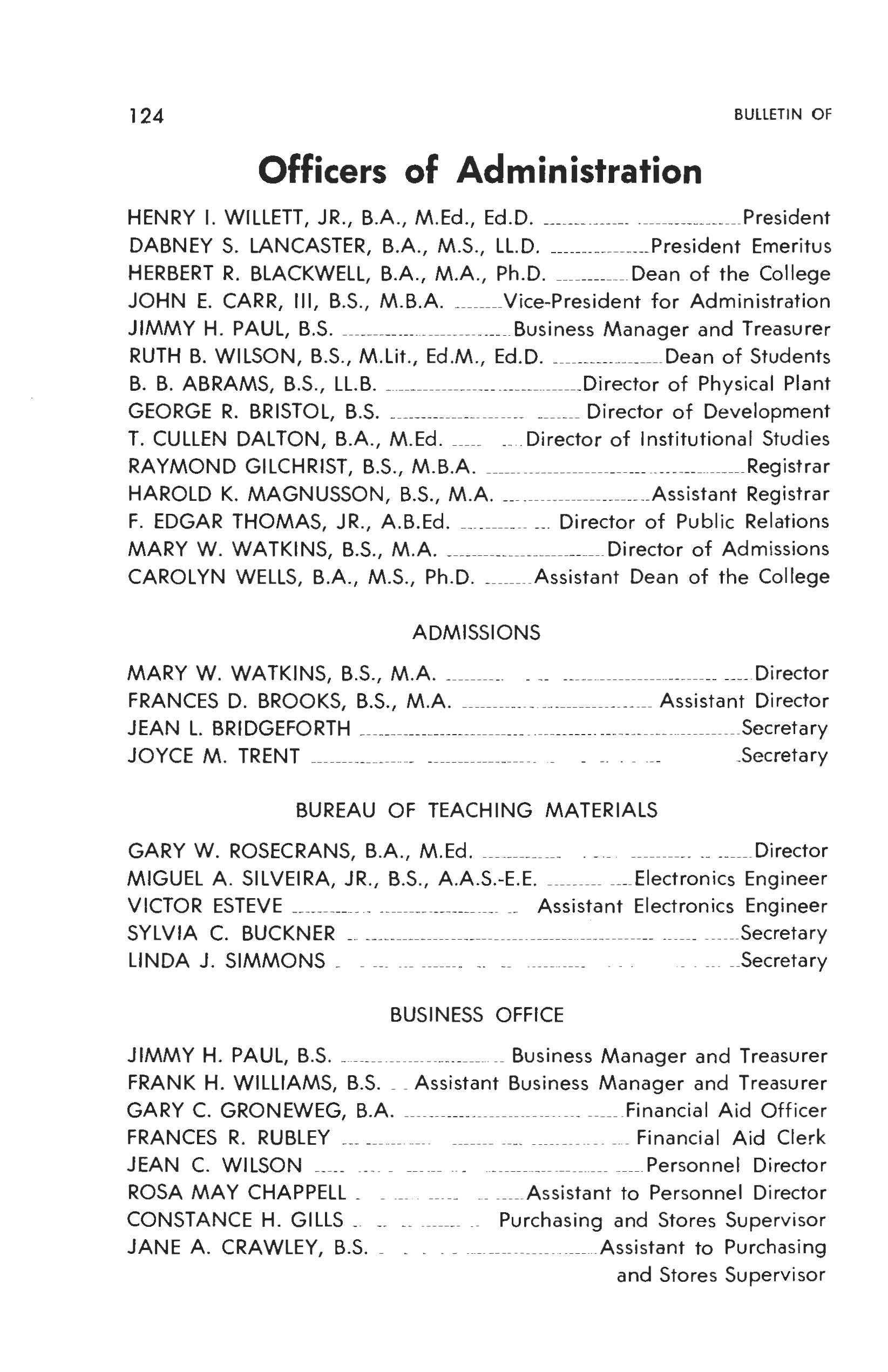
MARY W. WATKINS, B.S., M.A. _______ _ _ __ Director FRANCES D. BROOKS, B.S., M A. _ ·--- Assistant Director JEAN L. BRIDGEFORTH _ _ _ --· ____ _______ Secretary JOYCE M . TRENT _ __ _ ___________ Secretary
GARY W ROSECRANS, B.A., M.Ed. _______ _ __ Director MIGUEL A . SILVEIRA, JR ., B.S., A.A.S.-E . E. _ Electronics Engineer VICTOR ESTEVE _ _ _ ___ _ _ Assistant Electronics Engineer SYLVIA C. BUCKNER _ _________ _ __ ______ Secretary LINDA J SIMMONS _ _ _ __ _ __ Secretary
JIMMY H PAUL, B S ____ _ Business Manager and Treasurer FRANK H . WILLIAMS, B.S . _ . Assistant Bus i ness Manager and Treasurer GARY C. GRONEWEG, B A. _ ___________ _____ Financial Aid Officer
FRANCES R. RUBLEY ___ __ __ _______ _ ________ Financial Aid Clerk
JEAN C. WILSON __ . . .. _ ___ Personnel Director ROSA MAY CHAPPELL _ Assistant to Personnel Director CONSTANCE H GILLS _ __ __ _______ __ Purchasing and Stores Supervisor JANE A. CRAWLEY, B.S. _ _ __________ Assistant to Purchasing and Stores Supervisor
CAROLYN J. MORRISON, B.S. ____________________ Secretary, Purchasing Office
JUDY 0. WHALEY ________ Secretary to the Business Manager and Treasurer I LA H. RICKMAN, B.S. _________________________________________________________________ Cashier SH I RLEY C. WHALEY _________________________________________________________________ Cashier MARGUERITE. H. SHORTER
CI erk FREEMAN C. FOX
Supervisor WI LEY THORNTON
Clerk Messenger BESS P. DAN I EL

W. FRANKE
E. LEE LAND, B.S., M. Ed., Ed. D.
Di rector THERESA G. POSTON, B.S., M.S. _______________________________________________ Librarian MARY TA TUM TV Technican OV ELLA H. WILLIAMS ________________________________________________________________Secretary MARY M. WAITE, B.S.
TO LA G. MOR GAN ________________________________________________________________ Su pe rviso r NELLIE C. BABER ______________________________________ Operator RE BECCA M. DUN CAN Operate r
LEWIS E. WELLS, M.D. _________________________________________________ College Physician JAMES C. SAMS, M.D. ______________________________________________ College Psychiatrist JAN IE H. JON ES, R. N. ---------------------------------------------------------- Head Nurse PALLI E B. FOULK, R. N. _______________
Nurse FRANCES W. GARLAND, R. N. ________________________________________________________ Nurse EV A F. HALEY, R. N. ________________________________________________________________________ Nurse LOUISE H. FOREMAN, R. N.
CHARLES E. BUTLER, A.B., B.S., A.M. ________________________________________ Director MARTHA H. LeSTOURGEON, B.S., M.S. _____________________________________ Librarian RUTH H. WERT, B.A., M.S. in L.S. ____________________________________________ Librarian
REBECCA S. RITCHIE, A.B., M.S. in L.S. ____________________________ Head Cataloger BETTY A. El KE
Library Assistant FRANCES M. HOPKINSON, B.A. ____________________________________ Library Assistant FLORENCE R. RICHARDSON, B.S., M.A. ______________________ Library Assistant HARRIET F. ANDERSON _ _ _______________________ Assistant in the Library
NANCY P. BELL ·-- Assist ant in the Li bra ry THOMAS 0. BOSWELL ____ Assistant in the Library HELEN B. CUNNINGHAM _ Assistant in the Library JUNE E. GARLAND _ Assistant in the Li bra ry
MARGARET M. SCOTT _ Assistant in the Li brary ELVA B. WOODY ARD __ Assistant in the Library
B. B. ABRAMS, B.S. i n C.E ., L.L.B ., C.E ., C.P .E. _______ Director of Physical Plant
ANN N. _ NORTON __Secretary to Director of Physical Plant LEON P HENDERSON ___ Superintendent of Buildings and Grounds
BARBARA B. WOOD _Secretary to Superintendent of Buildings and Grounds ANN W. ROBESON __ Housekeeping Supervisor
JUNE W. ELLINGTON __ Assistant Housekeeping Supervisor MAMIE B. McCLENNY _ Assistant Housekeeping Supervisor WILLIAM J. ALLEN __ Manager, Laundry N El L SMITH ____ Chief of Pol ice J . ALLEN WI TT ------- ---- ----- --- ----- ----- ----- ----- --------------- Golf Course Ma nag er
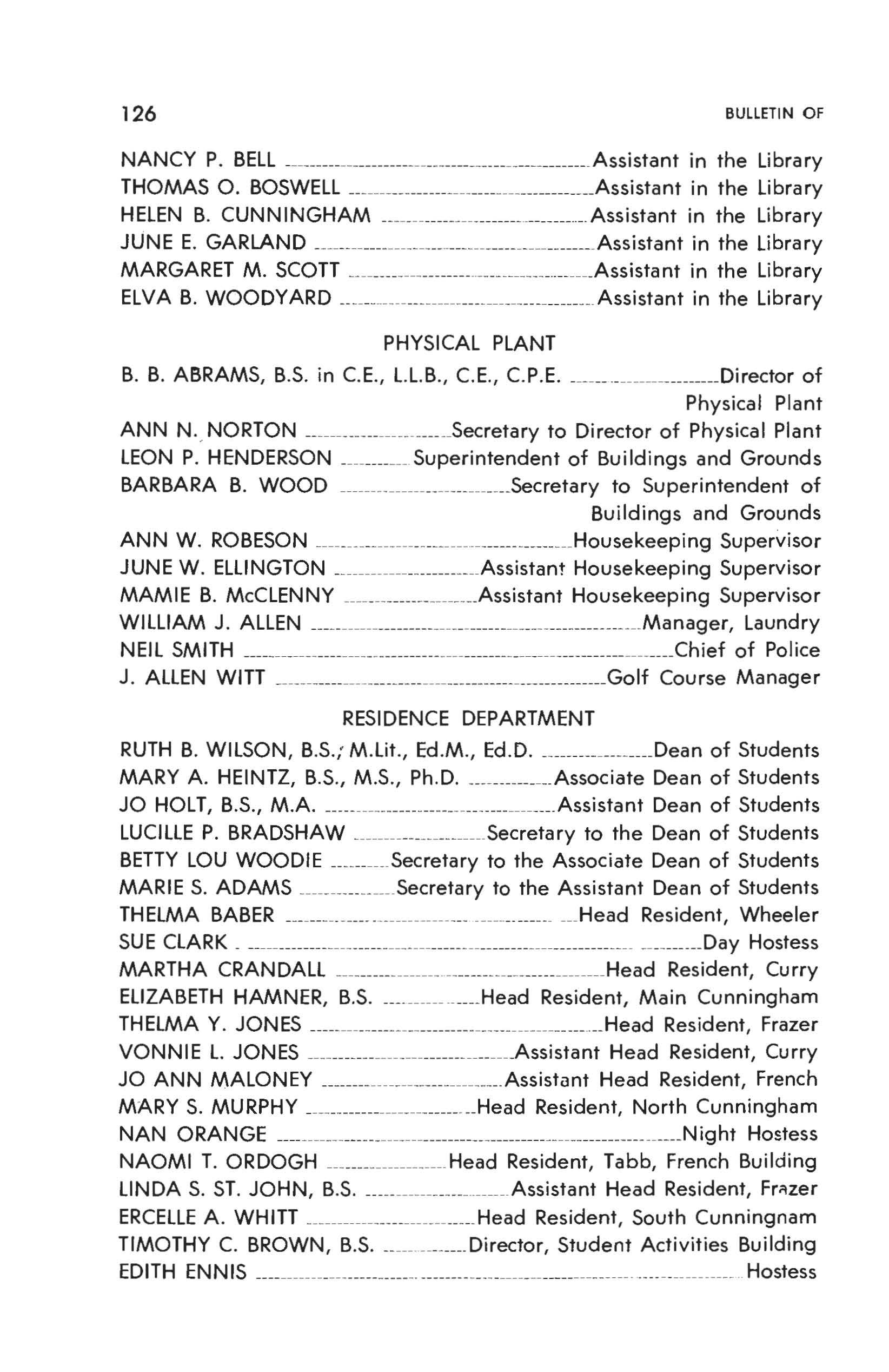
RUTH B WILSON, B S. ; M Lit , Ed.M , Ed D ____ Dean of Students
MARY A. HEINTZ, B.S., M.S ., Ph . D. __ Associate Dean of Students JO HOLT, B.S., M .A. _____ Assistant Dean of Students LUCILLE P. BRADSHAW _______ Secretary to the Dean of Students BETTY LOU WOODIE ____ Secretary to the Associate Dean of Students MARIE S ADAMS ____ Secretary to the Assistant Dean of Students TH ELMA BABER _ Head Resident , Wheeler SUE CLARK _ ______ Day Hostess MARTHA CRAN DALL __ Head Resident , Curry ELIZABETH HAMNER, B.S. __ Head Resident , Main Cunningham TH ELMA Y. JONES __ Head Res ident, Frazer
VONNIE L. JON ES _ Assistant Head Resident, Curry JO ANN MALONEY __ Assistant Head Resident, French MARY S. MURPHY __ Head Resident, North Cunningham NAN ORAN GE ____ Night Hostess NAOMI T. ORDOGH ______________ Head Resident, Tabb, French Building LINDA S. ST. JOHN, B.S. _______ Assistant Head Resident, Fr"lzer ERCELLE A. WHITT _____ Head Resident, South Cunningnam TIMOTHY C. BROWN, B S _Director, Student Activities Building EDITH ENNIS _ -------- ---- ----- --- ----- ---- -- ---__________ .. Hostess
SUSAN G. AMBURN __ Secretary, Vice-President's Office
BETTY F. BRYANT _Secretary to Director of Public Relations
EVELYN M. COLEMAN, B.S. ___ Secretary to the President
JEAN S. DOSS _Secretary to the Registrar PHYLLIS B. DRUEN __ Secretary, Registrar's Office
DOROTHY N GARNETT _Secretary, Registrar's Office
DOROTHY 0 . HANKINS Secretary, Dean's Office HOUSTON G. HATCH ER _______ Duplicating Service
VIRGINIA V. HILBORN, B.A. ____ Secretary, President's Office ELIZABETH S. JONES, B.S. _ Alumnae Secretary MARIE H. KIDD ____ Secretary, Public Relations Office
ROSE B. MITCHELL _______ Secretary, Department of Natural Sciences
VACELO H. MOORE _____ Secretary, Development MILDRED L. MORTON _Secretary to the Dean of the College PATRICIA M. MOTLEY ___ Secretary to Director of Institutional Studies
CHRISTINA M NEAL __ Secretary, Public Relations Office
EVA E. PHILBECK _Secretary to Vice-President for Administration
PATSY J . RANSON _ Machines Operator
JANICE M TINKLE ____ Secretary, Department of English RUBY SMITH ____________ Secretary, Department of Education NANCY STILLMAN __ Secretary to Director of Development
PEARL WADE _______ Secretary, Department of History and Social Sciences
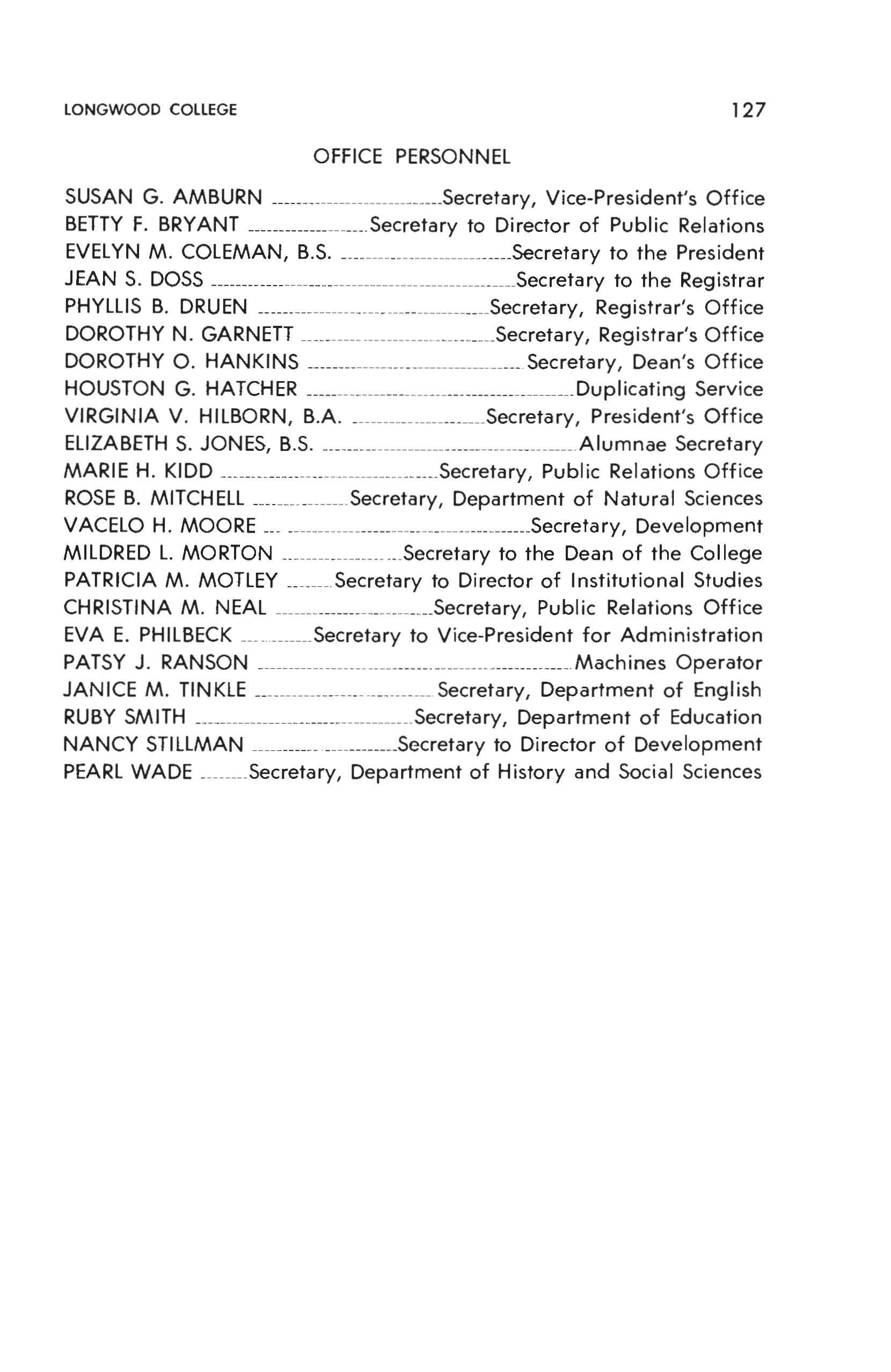
HENRY I. WILLETT, JR. B.A., M.Ed., Ed.D. ________________________________ President B.A., Washington and Lee University; M.Ed., Ed.D., University of Virginia.
DABNEY S. LANCASTER, B.A., M.S., LL.D. __________________ President Emeritus B.A .. University of Virginia; M.S., Virginia Polytechnic Institute; LLD., University of Richmond; LLD., College of William and Mary.
NORMA JEAN ABBOTT, B.S., M.M. ______________ .Instructor in Mathematics B.S., Madison College; M.M., University of South Carolina.
MERRY LEWIS ALLEN, B.S., M.Ed., M.S. _______________ Associate Professor of Mathematics B.S., College of William and Mary; M.Ed., University of Virginia; M.S., University of Illinois.
NANCY D. ANDERSON, B.S., M.A. _ Instructor in Speech and Dramatic Arts B.S., Westhampton College; M.A., Longwood College
*NANCY ANN ANDREWS, B.S., M.S. ___________________ Assistant Professor of Health and Physical Education B.S., Longwood College; M.S., University of Tennessee.
JOHN M. AUSTIN, B.S., M.Ed. B.S., Longwood College; M.Ed., University of Virginia.
_____ Associate Professor of Physical Sciences
BLANCHE C. BADGER, B.A., M.A., Ph.D. __________ Professor and Chairman of the Department of Mathematics B.A., Winthrop College; M.A., University of Tennessee; Ph.D., George Peabody College for Teachers.

MARGARET D. BAILEY, B.S. ________ Assistant Professor in the Campus School B.S., Towson State Teachers College.
ROBERT L. BANTON, B.A., M.Ed., Ed.D. Associate Professor of Education B.A., Randolph Macon College; M.Ed., Ed.D., University of Virginia.
GENE L. BARHAM, B.A., M.Ed. ___________ Assistant Professor of Education B.A., College of William and Mary; M.Ed., University of Virginia.
BILLY S. BATTS, B.S., M.S. ----------·------------- Associate Professor of Biology B.S., North Carolina State University; M.S., University of Washington.
GAIL 0. BEAUMONT, B.A., M.A. __________ .. Assistant Professor of English B.A., University of Hawaii; M.A., Duke University.
VIRGINIA BEDFORD, B.S., M.A. ____________________ Professor of Art B.S., University of Missouri; M.A., Teachers College, Columbia University. *On leave of absence 1970-71.
ALEXANDER V. BERKIS, LL.M., M.A., Ph D
__ Professor of History and Social Sciences
LL.M. , Universil y of lalvia ; M .A ., Ph .D.. Univ e rs il y of W is cons i n .
JANET L. BINGNER, B.S. , M.A. , Ed . D. __ Professor of Psychology
B S , Universil y of Pillsburgh ; M A. , Univ e r s it y of Ma r y land; Ed.D George Wa s h i n g ton Uni v ersit y
BARBARA BISHOP, B S., M F.A. Associate Professor and Chairman of the Department of Art
B S. , Longwood Coll e g e ; M F A ., Un iv e rs it y of North Ca ro l ina
ROBERT BISSELL, B.A., M.A. , Ph D
Assistant Professor of Chemistry
B A , Northw es tern Univers it y; M A ., Colu m bia Un iv ersity; Ph D., Duke Univ ers it y,
HERBERT R BLACKWELL , B.A. , M.A. , Ph D _
Professor of English and Dean of the College
B.A ., M.A. , Univ e rsi t y of Richmond ; Ph . D., Un ive rsi t y of Virg i n ia .
R. BEATRICE BLAND, B.S. , M.A. , Ed . D .
Associate Professor of Education
B.S. , Longwood College ; M. A ., Colu m bia Un iv ersi t y; Ed . D., Uni ve rs it y of Vir g inia.
ROBERT E. BLASCH , B.A., B M , M M. , M.A. Associate Professor of Music
B A ., Hofstra Univer si t y; B.M. , M M ., Un iv ersity of Mic hi g an; M A. , Un iv e r si t y o f Ill in o is.
ELEANOR W. BOBBITT, B S., M S
Associate Professor of Physical and Health Education
B S ., Longwood College; M S ., Univ e rs ity o f Te nn e s see.
PAULINE V. BOEHM, B A., M.M ___________ Assistant Professor of Music

B A ., Iowa State Te achers College ; M M ., Northw este rn Univer si t y
SANDRA A . BOLLINGER, B.A., M .M . _ _
Instructor in Mathematics
B.A , Longwood Colleg e; M M ., Un ive rsi ty of South Ca r ol ina
BETTY ANN BOWMAN, A.B ., M S _
A . B. , M .S ., Un iv e rs it y of Tenn essee .
DAVID A. BREIL, B.S., M.A., Ph . D. _
SANDRA J. BREIL, A.B., Ph D ____________
Associate Professor of Physical and Health Education
. __ . _ _
Associate Professor of Biology
B S., M A , Universit y of Ma ssa chu s etts ; Ph D., Florid a State Unive r s it y.
Associate Professor of Biology
A B., Un iver s it y of Vermont ; Ph D., Univ e rs it y of Ma ss a ch u se tts.
FRANCES R. BROWN, B.A. , M.A. , Ed .D . __ Associate Professor of English
B.A ., W e lls Colleg e; M A., Unive rsit y of Chi ca go ; Pea b o d y Con ser v at o ry of Music Ed D. , Harvard Un ive rsit y.
ROBERT T. BRUMFIELD, B.S., M .A ., Ph.D. _____________ ___ Professor of Biology
B.S , Hampden-Sydney College; M A , University of Virginia; Ph D., Yale University.
CLEO W . BUCHANAN, B.S., M.S . ____ ___ _Instructor in the Campus School B S., M.S., Longwood College.
THOMAS P BURKE, JR., B.A., M Ed. _ Assistant Professor of History
B A ., College of William and Mary ; M.Ed., University of Virginia.
BARBARA W. BURTON, B.R.E . ___ __ __ ____ Jnstructor in the Campus School B R E , Presbyterian School of Christian Education.
SALLY C. ~USH, B.S., M.A. _____ Assistant Professor of Physical and Heahh Educa~on B S., Mississippi State College; M.A., Appalachian State Teachers College
CHARLES E. BUTLER, B.A., B.S., M.A. _Library Director and ___ Professor of Library Science
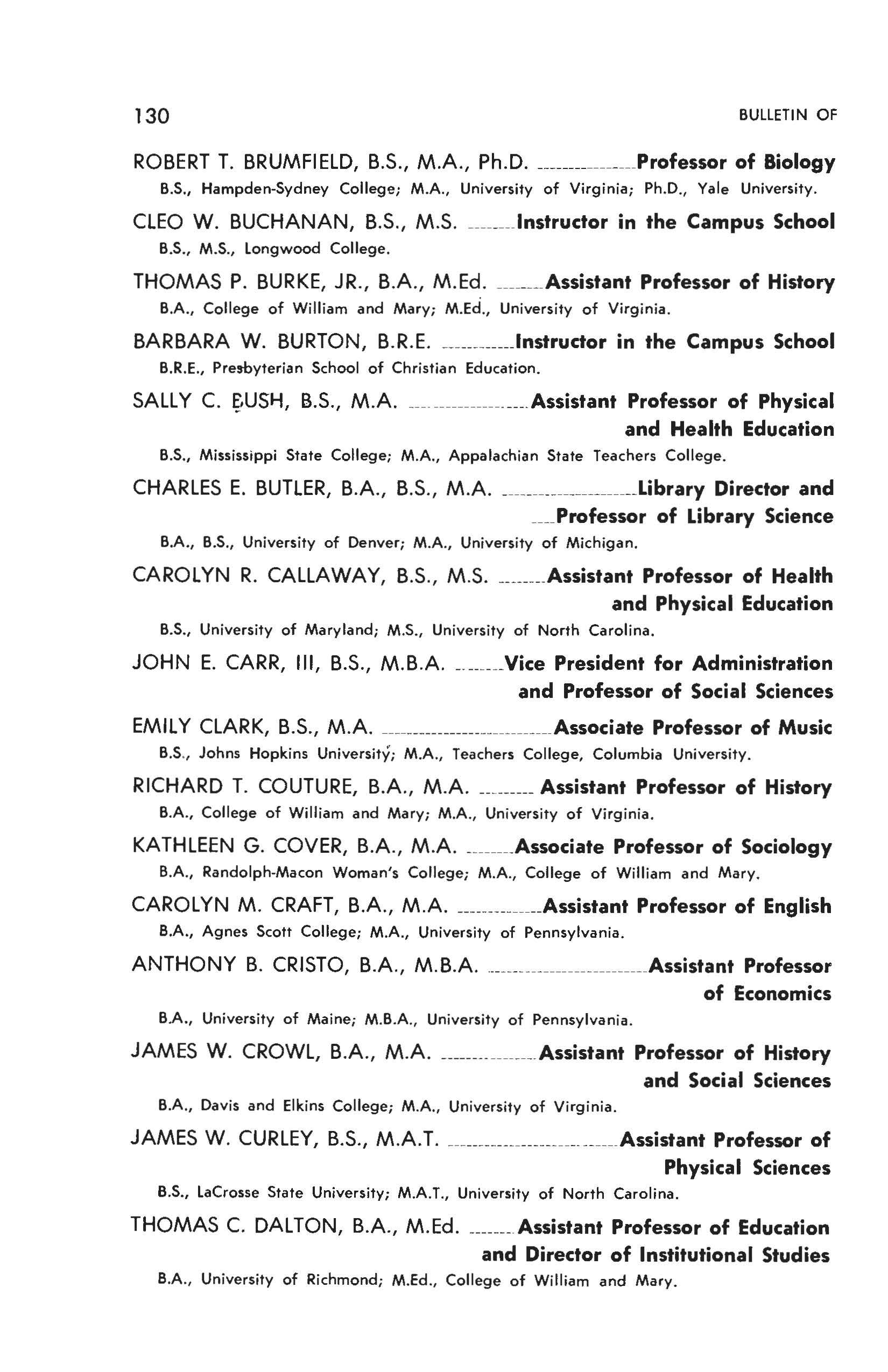
B A ., B S , University of Denver; M A , University of Michigan
CAROLYN R. CALLAWAY, B.S ., M .S. __ ______ Assistant Professor of Health and Physical Education
B S., University of Maryland; M S , University of North Carolina.
JOHN E. CARR, Ill, B.S., M B.A. _ Vice President for Administration and Professor of Social Sciences
EMILY CLARK, B.S., M.A. __ Associate Professor of Music B.S., Johns Hopkins University; M.A ., Teachers College, Columbia University .
RICHARD T. COUTURE, B.A., M .A. ____ Assistant Professor of History B A., College of William and Mary; M A ., University of Virginia
KATHLEEN G. COVER, B.A., M.A . _______ _ Associate Professor of Sociology B.A ., Randolph-Macon Woman's College; M A., College of William and Mary.
CAROLYN M. CRAFT, B.A ., M .A. __ _____ __ ___ __ Assistant Professor of English B.A., Agnes Scott College; M.A., University of Pennsylvania.
ANTHONY B. CRISTO, B.A., M .B.A. ____ Assistant Professor of Economics B A ., University of Maine; M B A., University of Pennsylvania
JAMES W CROWL, B.A., M A. __ Assistant Professor of History and Social Sciences
B.A ., Davis and Elkins College; M A , University of Virginia.
JAMES W. CURLEY, B.S., M.A.T. _______ Assistant Professor of Physical Sciences B.S., LaCrosse State University; M.A .T., University of North Carolina.
THOMAS C. DALTON, B.A., M . Ed. _ Assistant Professor of Education and Director of Institutional Studies B A ., University of Richmond ; M Ed ., College of William and Mary
EDITH W. DAUBNER, B.S., M.A., Ph D _ Associate Professor of Education
B.S., Towson State College; M A , Loyola College; Ph D., Johns Hopkins University, EDWARD V. DAUBNER, B S , M.A. _____ Associate Professor of Education
B S., M A ., Fordham University
DIANNE LEE DAVIS , B.S., M .S. ____ ____ __________ __ _____ _Instructor in Physical and Health Education
B S., Longwood College; "'' ·_·,_, University of Massachusetts IRVIN !3 . DENT, B S , M A Ed _________ Assistant Professor of Geography S.S., University of Virginia ; MJ• Ed ., East Carolina Un iversity . CHARLES J . DeWITT, B.A ., M .S., Ed.D. _ Associate Professor of Education
8 A , University of Virginia ; M S , c· ,gwood College; Ed D., University of Virginia.
ELINOR M DOUGLASS, A B , A.M _____ Assistant Professor of English
A B , Duke University ; A M., Columbia University WILLIAM T. DUKE, B.A ., M .S... ________ . ______ Instructor in History and Social Sciences
B.A. , M.S., University of Southern Mississipp i.
GEORGE P. ELLIOTT, B.S ., M .S. _ _________ Associate Professor of Education B S , M S., Longwood College
THOMAS H. ELY, B S , M S __________ Assistant Professor of Biology B.S., Emory and Henry; M S , Vanderbilt Un iversity MARY C. ERGLER, B.S., M.A. --------· · ____ __ ___ .. Assistant Professor of Sociology and Anthropology S.S., M .A ., University of Virg in ia .
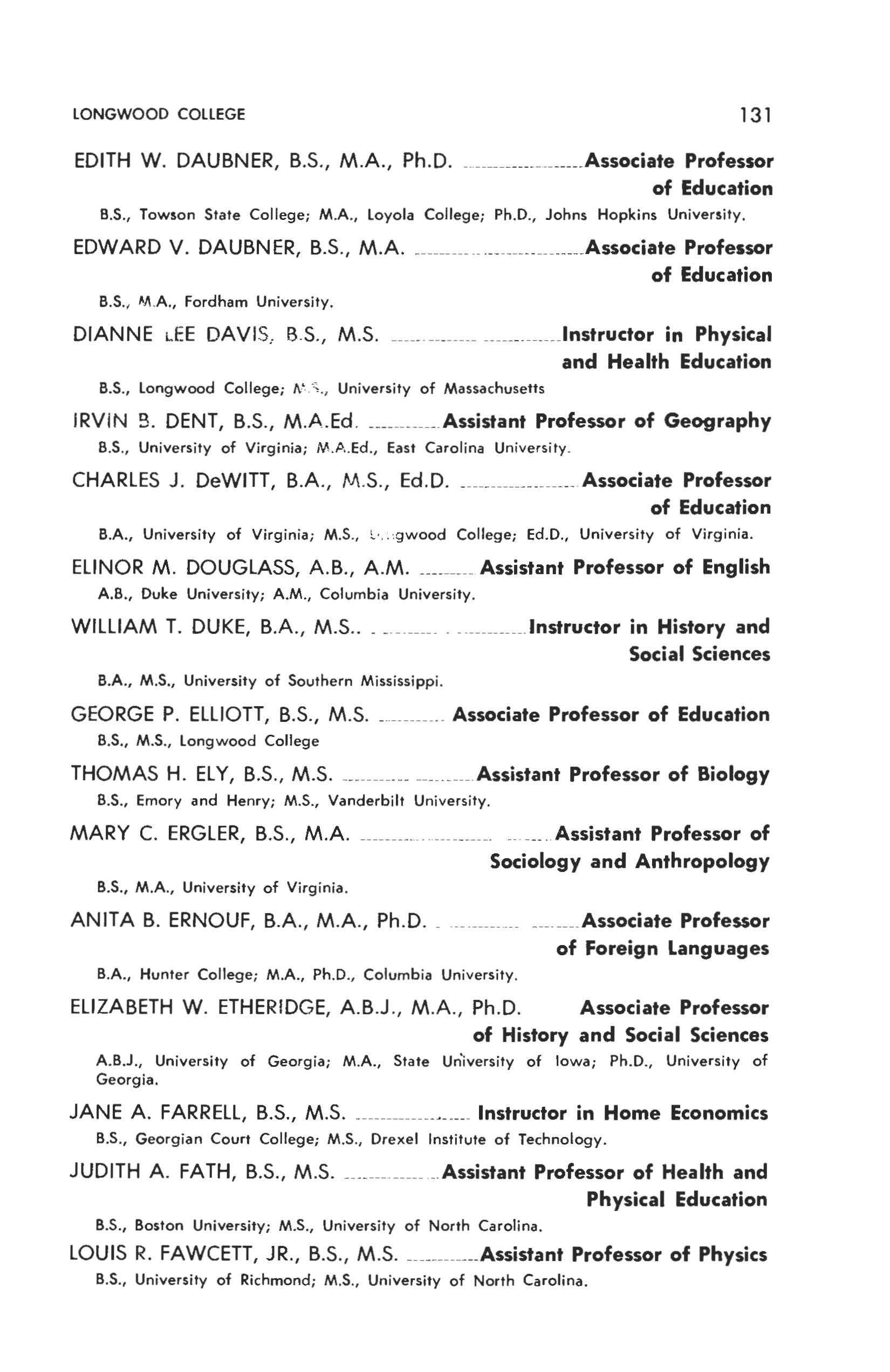
ANITA B ERNOUF, B.A., M.A., Ph D _
B A. , Hunter College ; M.A , Ph D. , Columbia Un iv ers ity.
ELIZABETH W . ETHERIDGE, A.B .J ., M.A., Ph .D.
_ Associate Professor of Foreign Languages Associate Professor of History and Social Sciences
A.B J ., University of Geor g ia ; M A. , State Un'ivers ity of Iowa ; Ph D., Un iversity of Georgia.
JANE A. FARRELL, B.S., M.S. -----------··----· Instructor in Home Economics S S , Georgian Court College ; M S., Drexel Institute of Technology
JUDITH A. FATH, B.S., M.S. _____ .. Assistant Professor of Health and Physical Education
S S , Boston University ; M S., Un iversity of North Carolina
LOUIS R. FAWCETT, JR , B.S , M S __ Assistant Professor of Physics B S., Un iversity of Richmond; M.S ., Un iversity of North Carolina
RICHARD K. FLETCHER, JR., B S., M.A. _ ____________ Assistant Professor of Physical Science B.S., Arkansas College; M.A., Murray State University.
ELISABETH LOUISE FLYNN, B.A., M A. __ Assistant Professor of Art B A., Manhattanville College; M.A., Loyola University.
WILLIAM L. FRANK, B A., M.Ed., M.A., Ph D. ___ Professor and Chairman of the Department of English B.A., M.Ed ., University of Southern Mississippi; M.A., Ph D., Northwestern University.
FRANCES W. GEE, B.A., B.S., M .A. __ _ Assistant Professor of Home Economics
B A ., B.S., Longwood College; M.A., Virginia Polytechnic Institute.
ROBERT D. GIBBONS, B.A., M.Ed., Ed.D. ____ Associate Professor of Education B.A., M Ed ., William and Mary College; Ed.D., University of Virginia.
RAYMOND GILCHRIST, JR., B.S., M.B.A. ___ ___ . Registrar and Associate Professor of Social Sciences B S , University of Maryland; M.B.A., Syracuse University
M. BRUCE GLASCOCK, B.S., M .A., Ph . D. . _ . Assistant Professor of History and Social Sciences B.S., Memphis State University; M.A ., Ph.D., Louisiana State University
JANICE D . GLASCOCK, B.S., M.A., Ph.D . ____________ Assistant Professor and Acting Chairman of the Department of Foreign Languages B S ., M.A., Ph.D., Louisiana State University.
EVELYN JUNE GLASS, B.A., M M __ _______ _ _ Instructor in Mathematics B.A., Transylvania College; M.M., University of Tennessee
FOSTER B. GRESHAM, B.A., M.A. _ .--____ Professor of English B.A ., Randolph-Macon College ; M.A., University of Virginia.
NEIL H . GRIFFIN, B.A., M.A. __________ Professor and Chairman of the Department of Home Economics B A., Radford College ; M.A., Teachers College, Columbia University.
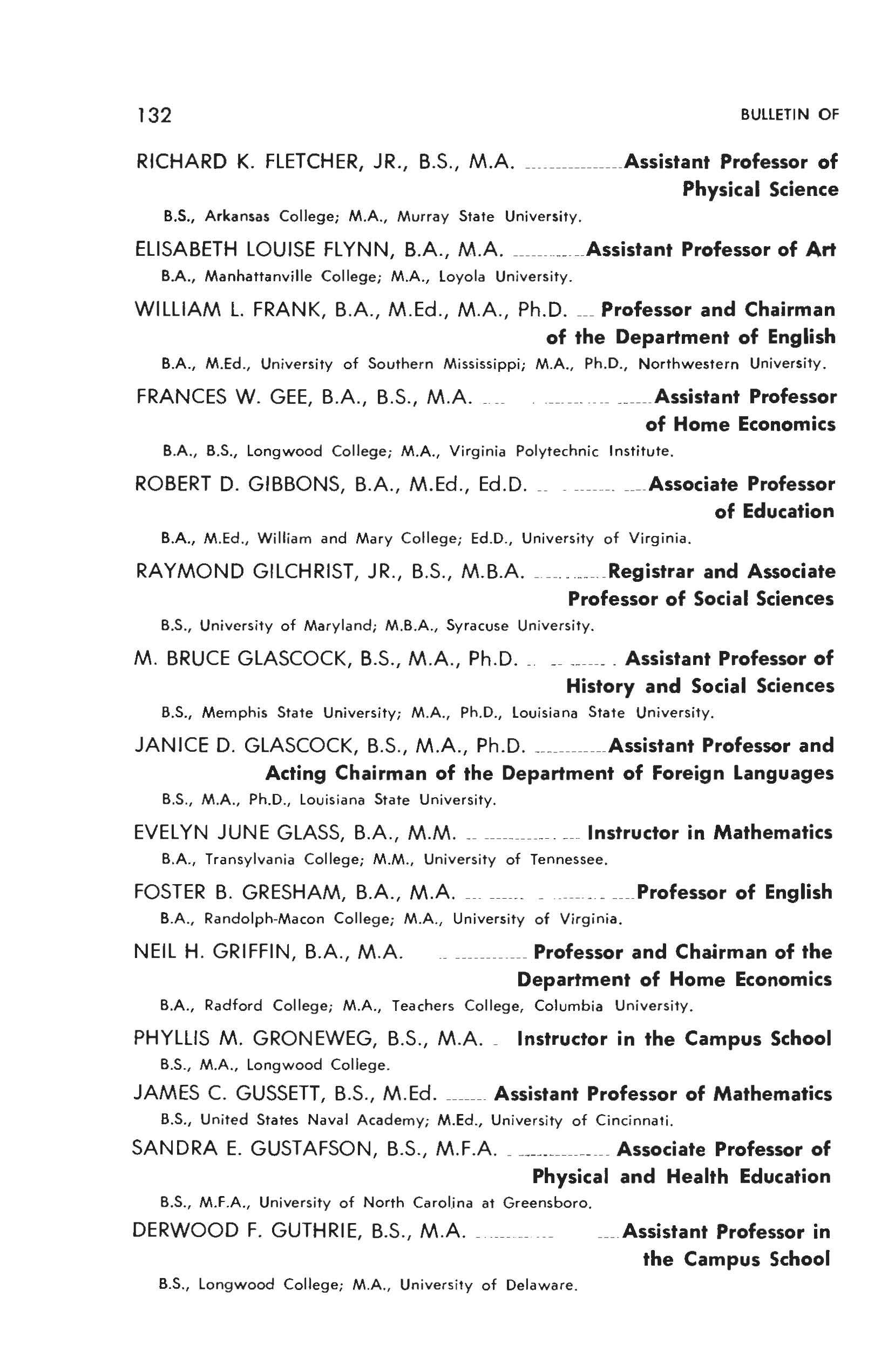
PHYLLIS M. GRONEWEG, B.S ., M.A. _ Instructor in the Campus School 8 5., M A., Longwood College.
JAMES C. GUSSETT, B S , M.Ed. ____ Assistant Professor of Mathematics B S., United States Naval Academy; M.Ed., University of Cincinnati.
SANDRA E. GUSTAFSON, B.S., M.F.A. __ Associate Professor of Physical and Health Education
8 5., M.F.A., University of North Carol ina at Greensboro.
DERWOOD F. GUTHRIE, B.S., M.A. _ S.S., Longwood College; M.A ., University of Delaware.
____ Assistant Professor in the Campus School
L. MARSHALL HALL, JR., AB., M .A .T. ___ ___ Associate Professor of History and Social Sciences
A B , M.A T , Duke University.
FRANCES N. HAMLETT, B S , M S _ Assistant Professor of Business Education
B S , Longwood College; M.S., Virginia Polytechnic Institute.
DARRELL G. HARBAUM, B.S ., M Mus. __ Associate Professor of Music
B S , University of Cincinnati; M Mus ., Cincinnati Conservatory of Mus ic
JOHN A. HARDY, 111, B A., M S __ .. ... Assistant Professor of Chemistry B.A., M S , University of Virginia.
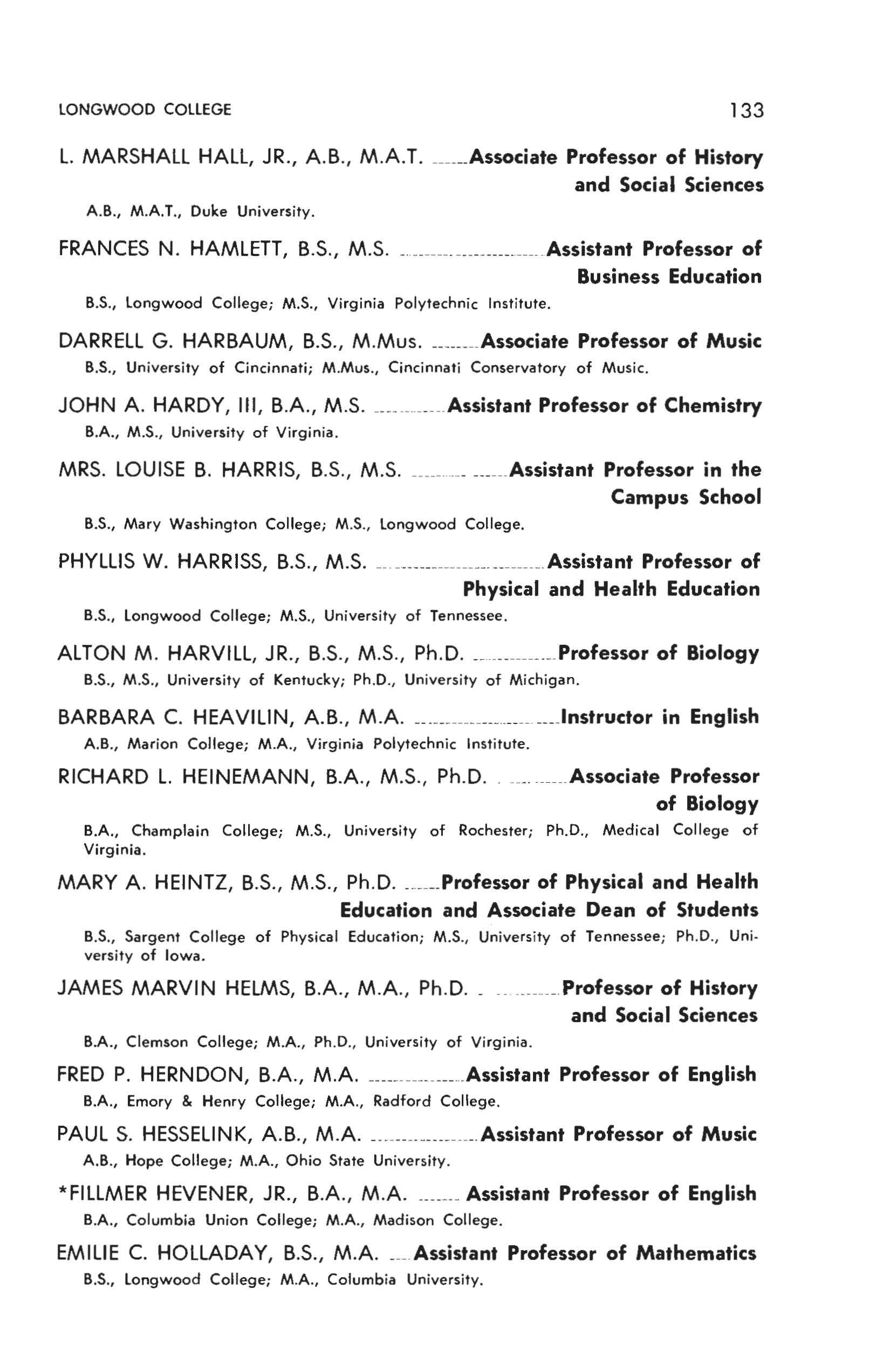
MRS. LOUISE B. HARRIS, B.S., M.S. ___ ___ Assistant Professor in the Campus School
B S , Mary Washington College; M S., Longwood College
PHYLLIS W. HARRISS, B.S ., M .S. _ Assistant Professor of Physical and Health Education
B S , Longwood College; M.S., University of Tennessee.
ALTON M HARVILL, JR., B.S., M.S., Ph D. __ Professor of Biology
B.S ., M .S., University of Kentucky ; Ph .D., University of Michigan.
BARBARA C. HEAVILIN, A.B , M A. _ .Instructor in English
A.B ., Marion College; M.A , Virginia Polytechnic Institute
RICHARD L. HEINEMANN, B.A., M.S . , Ph.D. __ Associate Professor of Biology
B.A., Champlain College; M.S , University of Rochester ; Ph.D., Medical College of Virginia .
MARY A. HEINTZ, B S., M.S., Ph.D. __ Professor of Physical and Health Education and Associate Dean of Students
B S , Sargent College of Physical Education ; M S., Univers ity of Tennessee ; Ph.D , University of Iowa.
JAMES MARVIN HELMS, B A., M.A., Ph.D _ Professor of History
B A , Clemson College; M.A., Ph D , University of Virginia
FRED P. HERNDON, B A., M.A. ___ Assistant Professor of English
B.A., Emory & Henry College; M.A., Radford College
PAUL S. HESSELINK, AB., M.A. __ Assistant Professor of Music
A.B ., Hope College; M.A., Ohio State University .
*FILLMER HEVENER, JR., B.A., M A. __ Assistant Professor of English
B.A , Columbia Union College ; M A ., Madison College.
EMILIE C. HOLLADAY, B.S., M.A. ____ Assistant Professor of Mathematics
B S , Longwood College ; M A., Columb ia University.
LETA JANE HOLMAN, B.S., M .S., Ph.D. ______ Professor of Biology
8.S , Texas Technological College; M.S., University of Michigan; Ph.D. , University of Maryland.
JOANNE HOLT, B.S., M.A. ____ _ ____ . Assistant Professor of Education and Assistant Dean of Students B.S., University of Illinois; M A. , Northwestern Unive rsity
CHARLOTTE S. HOOKER, B.A., M.A., Ph D _ _ Professor of English
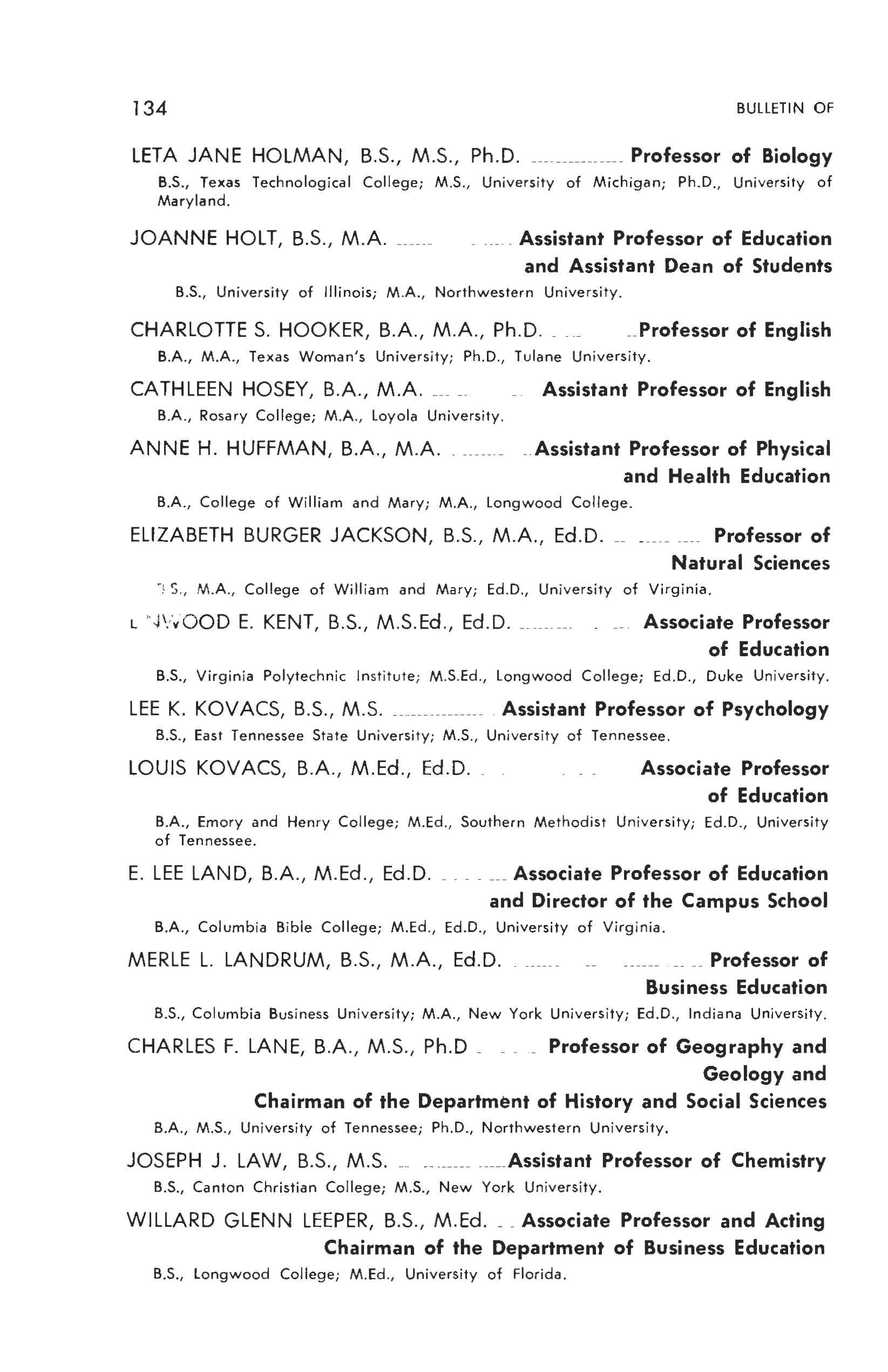
B.A ., M .A ., Texas Woman ' s University ; Ph.D., Tulane University.
CATHLEEN HOSEY, B.A., M.A. _ _ Assistant Professor of English
B A , Rosary College; M.A ., Loyola University.
ANNE H. HUFFMAN, B.A., M .A . . Assistant Professor of Physical and Health Education
B.A., College of William and Mary; M.A., Longwood College.
ELIZABETH BURGER JACKSON , B.S., M.A., Ed . D. _ __ _ ___ Professor of Natural Sciences ., S., M.A., College of Will iam and Mary; Ed.D., Uni ve rsity of Virginia.
L 1 ooD E. KENT, B.S., M.S.Ed., Ed . D.__ Associate Professor of Education B.S., Virginia Polytechnic Institute ; M .S .Ed., Longwood College; Ed.D . , Duke Uni v ersity.
LEE K. KOVACS, B.S., M .S. Assistant Professor of Psychology B S., East Tennessee State Universi ty; M.S., Universit y of Tennessee.
LOUIS KOVACS, B.A., M.Ed., Ed.D . Associate Professor of Education B A., Emory and Henry College ; M Ed ., Southern Methodist University; Ed.D. , University of Tennessee.
E. LEE LAND, B.A ., M .Ed ., Ed.D . _. ___ Associate Professor of Education and Director of the Campus School B A., Columb ia Bible College; M Ed., Ed D., University of Virginia.
MERLE L. LANDRUM, B.S., M.A., Ed . D. __ Professor of Business Education B.S., Columbia Business Uni ve rsity; M.A., New York University; Ed D. , Indiana University.
CHARLES F. LANE, B.A., M .S., Ph.D _ _ __ Professor of Geography and Geology
Chairman of the Department of History and Social Sciences B A ., M S. , Un iv ersity of Tennessee; Ph.D., Northwestern University.
JOSEPH J LAW, B S , M.S. _ _ _ Assistant Professor of Chemistry
B.S., Canton Christian College; M.S., New York University.
WILLARD GLENN LEEPER, B.S., M Ed. _ Associate Professor and Acting Chairman of the Department of Business Education B.S. , Longwood College; M.Ed., University of Florida.
ROBERT H. LEHMAN, B.S ., M . N.S . ____ _____ __ Assistant Professor of Biology
B S., Bloomsburg State College ; M N S , University of Oklahoma
NANCY V LEITCH, B A., M F A. _ Associate Professor of Art
B.A ., Carnegie Institute of Technology; M F.A ., Cranbrook Academy of Art.
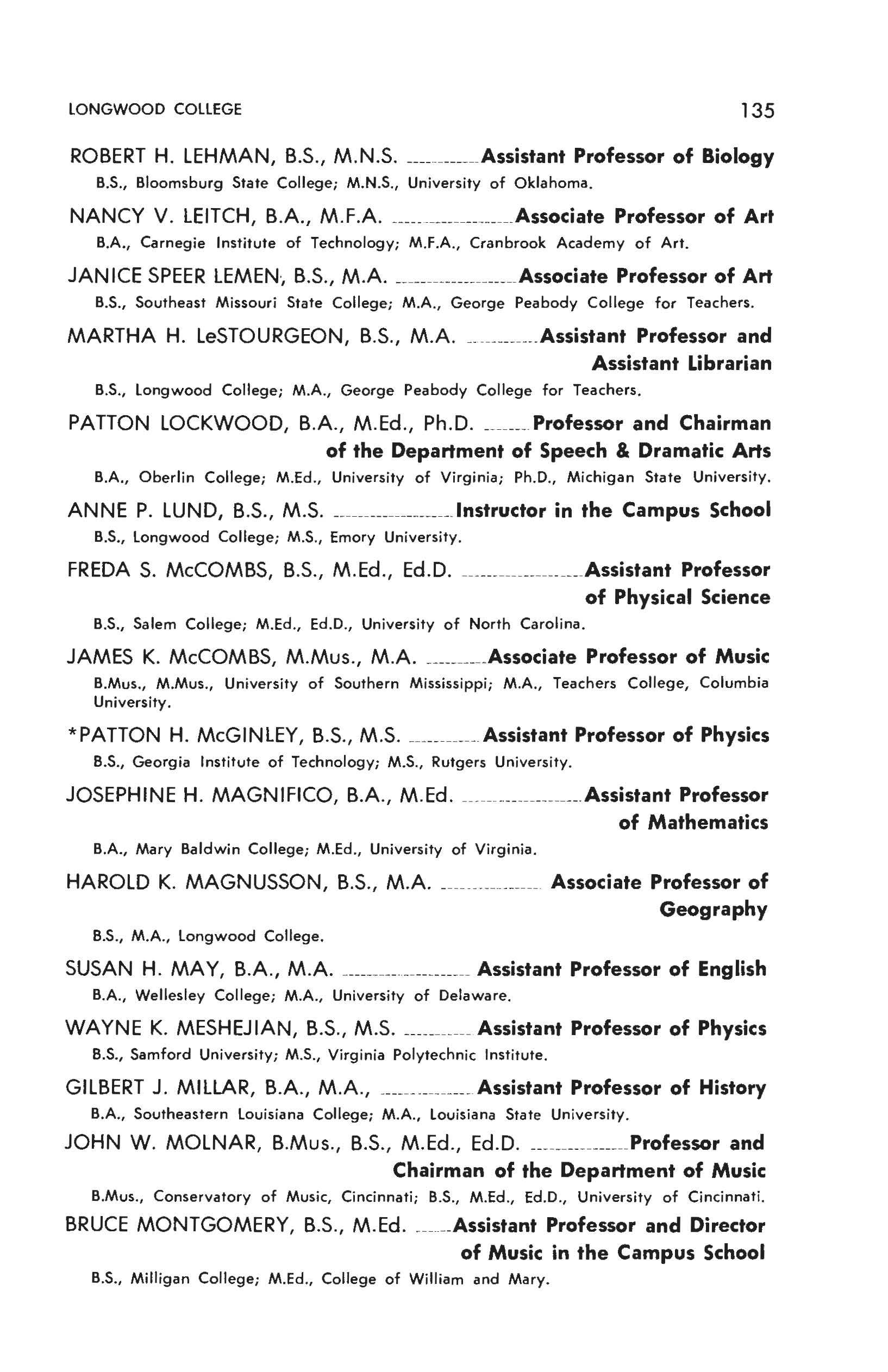
JAN ICE SPEER LEMEN, B.S., M .A. _ Associate Professor of Art
B.S. , Southeast Missouri State College; M.A., George Peabody College for Teachers .
MARTHA H. LeSTOURGEON, B.S , M A _ Assistant Professor and Assistant Librarian
B S , Longwood College ; M A., George Peabody College for Teachers
PATTON LOCKWOOD, B.A., M Ed., Ph.D. _ Professor and Chairman of the Department of Speech & Dramatic Arts
B.A., Oberlin College ; M.Ed . , Un iversity of Virginia; Ph . D., Michigan State University .
ANNE P LUND, B.S., M S _ Instructor in the Campus School
B S , Longwood College ; M.S , Emory University
FREDA S. McCOMBS, B.S., M.Ed., Ed.D . __ ___ ____ __ __ _____ _
B.S., Salem College; M Ed , Ed D., University of North Ca rol ina.
Assistant Professor of Physical Science
JAMES K McCOMBS, M.Mus., M A. __ Associate Professor of Music
B Mus , M Mus , University of Southern Mississippi; M A., Teachers College, Columbia University
*PATTON H. McGINLEY, B S , M.S. _ Assistant Professor of Physics
B.S , Georgia Institute of Technology; M S., Rutgers Univers ity
JOSEPHINE H. MAGNIFICO, B.A., M .Ed. ___ _____ ___ ____ __ ____
B.A , Mary Baldwin College ; M Ed , University of Virginia
HAROLD K. MAGNUSSON, B.S., M.A. __ _
B.S , M.A., Longwood College
Assistant Professor of Mathematics
Associate Professor of Geography
SUSAN H. MAY, B A., M A. __ Assistant Professor of English
B.A . , Wellesley College ; M.A ., University of Delaware.
WAYNE K. MESHEJIAN, B.S., M .S. __ Assistant Professor of Physics
B.S. , Samford University; M.S., Virginia Polytechnic Institute.
GILBERT J. MILLAR, B A., M.A., _ Assistant Professor of History
B A , Southeastern Louisiana College ; M.A., Louisiana State Univers ity
JOHN W. MOLNAR, B.Mus ., B.S ., M.Ed., Ed.D . _ Professor and Chairman of the Department of Music
B Mus. , Conservatory of Music, Cincinnati; B S., M Ed , Ed D , Un iversity of Cincinnat i.
BRUCE MONTGOMERY, B.S ., M . Ed. ____ _
Assistant Professor and Director of Music in the Campus School
B S , Milligan College ; M.Ed ., College of William and Mary
FRIEDA E. MYERS, B S.Ed., M.Mus. _ Assistant Professor of Music
B S Ed , Indiana Central College; M Mus., Indiana University
NORMAN 0. MYERS, B.S ., Ed.M. _ Associate Professor of Business Education
B.S., Grove City College; Ed.M., Uni v ersity of Pittsburgh
JOHNNY M. NARKINSKY, B.A., M A , Ph.D. _ _ Assistant Professor of Foreign Languages
B A , Florida State University; M A., University of Illinois; Ph D , Florida State University
SAM S. NARKINSKY, B.S., M .A. ___ Assistant Professor of Mathematics B.S., M.A ., University of Ill i nois.
E. T. NOONE, .B.S., M.S. __ Assistant Professor of Mathematics B.S., M.S., Northwestern State College
WAYNE K. NUNN, B.A., M.A.T . ____ Assistant Professor of Foreign Languages
B.A ., Wake Forest College ; M.A .T., University of Virginia; Diplome d'etudes, La Sorbonne, Universite de Besancon
PAMELA SUE OLIVER, B.S ., M.S. _________ Assistant Professor of Physical and Health Education B.S., Eastern Kentucky University; M S., University of Tennessee
SHIRLEY M. O'NEIL, B.A., M.A ., Ph . D. ______ Professor and Chairman of the Department of Physical and Health Education B A., University of New Hampshir e ; M.A., University of Tennessee; Ph D., University of Mich igan
CADA R. PARRISH , B.S., M.S. ____ Assistant Professor of Mathematics B.S., West Virginia Wesleyan College; M.S. , Stetson University
CHARLES H. PATTERSON, JR ., B.S ., M.A., Ed.D. _ Professor of Education and Chairman of the Department of Education, Psychology and Philosophy B S., M A., Ed.D., Univers ity of Virginia.
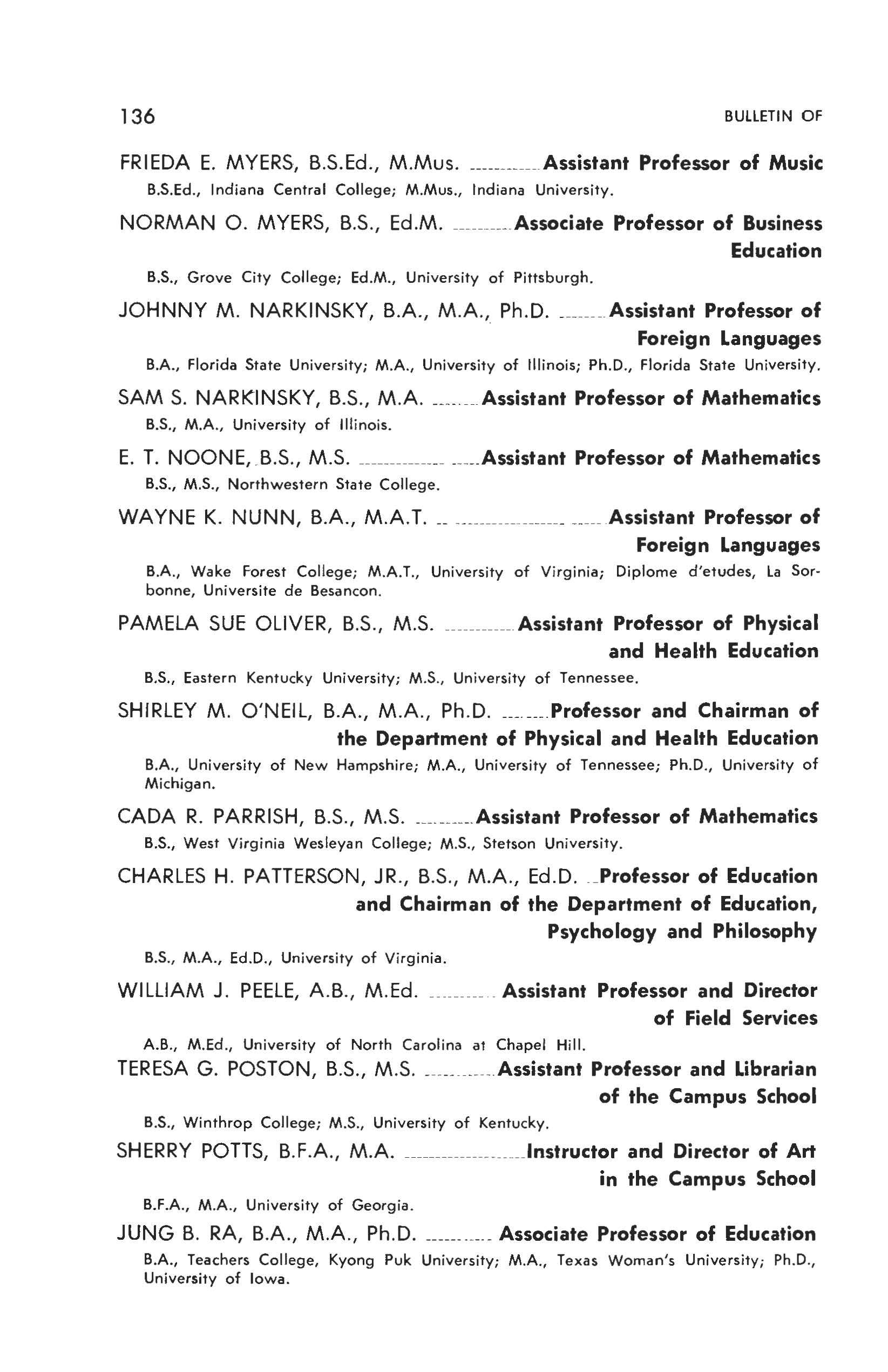
WILLIAM J . PEELE, A . B. , M. Ed . ________ .
A.B., M. Ed ., University of North Carol in a at Chapel Hill.
TERESA G. POSTON, B.S ., M.S . _____
Assistant Professor and Director of Field
Assistant Professor and Librarian of the Campus School S S , Winthrop College ; M.S ., University of Kentucky
SHERRY POTTS, B. F.A., M.A. __Instructor and Director of Art in the Campus School B.F.A., M A. , University of Georgia
JUNG B RA, B A., M.A., Ph D -·- Associate Professor of Education B.A ., Teachers College, Kyong Puk University; M.A ., Texas Woman ' s University ; Ph . D., University of Iowa
PIL-YULL RA, B.A., M A. _ Assistant Professor of Government B.A., Yon-sei University; M A., Southern Illinois University.
STELLA REBECCA RABURN, B.S , M.S. _ ___ Instructor in Home Economics B.S., M S., Northwestern State College
LOIS J. REID, B.S., M.A., Ph D ____ Associate Professor of Mathematics B.S . , College of William and Mary; M.A., Ph.D ., Duke Uni versity.
REBECCA SUZANNE RITCHIE, A.B , M S in L.S. _ Instructor and Head Cataloger in the Library A.B., College of William and Mary; M.S. in L.S., University of North Carol i na
GARY W. ROSECRANS, B.A., M.Ed ___ Assistant Professor of Education and Director of the Bureau of Teaching Materials B A , Wichita State University; M.Ed ., Unive rsity of Virginia.
ANNIE LEE ROSS, B.F.A., M.A ___ Associate Professor of Art B F A., Bethany College; M.A. , Oh io State University
PAUL G. ROUILLARD, AB., M . F.A. ____ Assistant Professor of Art A.B., St Anselm's College; M F A , The Catholic University of America.
EARL A. RUBLEY, B.S., M.S . __ . _ Associate Professor of Geography B.S., St Ambrose College; M.S ., University of Kentucky.
BEN D. SANDIDGE, B.A., M.A. _
B.A , M A , University of Texas
HELEN BARNES SAVAGE, B.S , M.A.
B.S., Jacksonville State College; M .A. , Emory Un iversity .
Assistant Professor of Foreign Languages
Associate Professor of Philosophy
MARVIN W. SCOTT, B.S , Ph.D. _____ Associate Professor and Chairman of the Department of Natural Sciences B S., Hampden-Sydne y College; Ph D , Virginia Pol y technic Institute.
MARIA C. SILVEIRA , M.N ., Lie ., Dr., M.A ., _
Assistant Professor of Foreign Languages
Maestro Normal, Escuela Normal de Oriente; Licenc iado y Dr en Educacion y Filosofia , Universidad de Oriente; M A , Stephen F Aust in State College
BARBARA B. SMITH, B.S., M . Ed., Ed.D . ____

Associate Professor of Physical and Health Education B S , Limestone College; M.Ed. , Ed D , Univers ity of North Carolina.
JEAN SMITH, B S., M A. _ _ ···--- Assistant Professor of Physical and Heahh Educa~on
B S , East Carolina University ; M.A., Western Carolina University.
SARAH LYNN SMITH, A.B. ,M.S. _ Instructor in Physical and Health Education
A.B , Duke Univers ity; M.S. , Indiana University.
HARVEY L. SN El DEMAN, B.A , M.A. _ Assistant Professor of Speech & Dramatic Arts
B A ., M.A., Univers ity of Connecticut
JO LESLIE SNELLER, B.S., M .A., Ed.D . ______ Assistant Professor of Education
B.S., M.A , Longwood College; Ed D , University of Virginia.
MAURICE P. SNELLER, B.A., M.A., Ph . D. ___ _______ ______ __ Professor of History and Social Sciences
B.A , M.A., Ph D., University of Virginia
WILLIAM J SOWDER, B S , M.A., Ph.D ____ Professor of English B.S., Virginia Polytechnic Institute; M A , University of Virginia ; Ph.D., University of Kentucky.
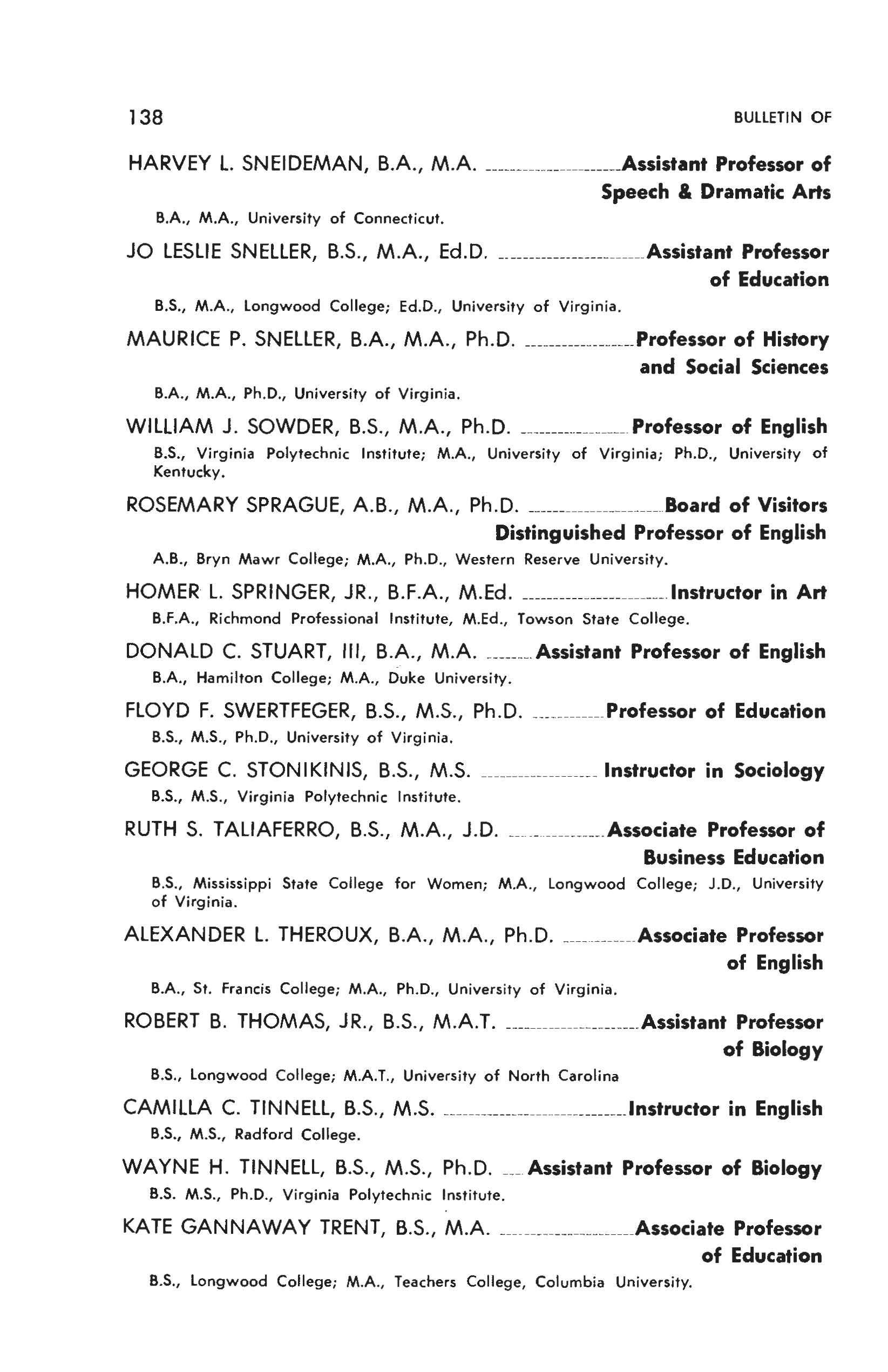
ROSEMARY SPRAGUE, A.B , M.A., Ph.D. ___ Board of Visitors Distinguished Professor of English
A . B., Bryn Mawr College; M.A ., Ph . D., Western Reserve University .
HOMER L. SPRINGER, JR ., B.F.A., M . Ed. ___ ____ ____ _____ ____ ____ Instructor in Art B F A., Richmond Professional Institute, M Ed. , Towson State College.
DONALD C. STUART, 111, B.A., M.A . ________ _ Assistant Professor of English B.A., Hamilton College ; M.A., Duke Un iversity.
FLOYD F. SWERTFEGER, B.S., M.S., Ph D ________ Professor of Education B S , M S., Ph.D ., University of Virginia.
GEORGE C. STONIKINIS, B.S., M.S. _ Instructor in Sociology B.S., M .S., Virginia Polytechnic Institute .
RUTH S. TALIAFERRO, B.S., M.A., J D. _ Associate Professor of Business Education
B S , Mississippi State College for Women; M.A., Longwood College ; J D., University of Virginia.
ALEXANDER L. THEROUX, B A., M A., Ph.D. _____ Associate Professor of English
B.A ., St . Francis College ; M.A., Ph.D., Univers ity of Virginia.
ROBERT B. THOMAS, JR ., B.S., M .A.T. ___ __ _______ _______ ___ Assistant Professor of Biology
B S., Longwood College; M.A.T , University of North Carolina
CAMILLA C. TINNELL, B S., M.S. ___ .Instructor in English B S., M S , Radford College.
WAYNE H TINNELL, B S., M S., Ph D _ Assistant Professor of Biology B.S. M S., Ph D., Virginia Polytechnic Institute.
KATE GANNAWAY TRENT, B.S , M A. ___ Associate Professor of Education B.S., Longwood College; M A , Teachers College, Columbia University.
EDWIN H. VASSAR, B.S., M S ______ . Associate Professor of Education and Director of Student Teaching
B S , Virginia Polytechnic Institute ; M S., Longwood College.
DAVID C. VEST, AB , M.A. __ Assistant Professor of English A.B., Birmingham-Southern College; M.A. , Vanderbilt Un iv ersity .
*PHYLLIS G. WACKER, B.A., M.A. ______ Assistant Professor of Psychology B A., Westhampton College; M.A , University of Richmond
MARILYN WATTS, B.S., M.Ed. _____ Jnstructor in Home Economics B.S., M. Ed ., University of North Carolina at Greensboro .
MARK G . WEATHERLY , B.S., M . Ed. _ Assistant Professor of Education B.S , M.Ed , Universit y of Virginia.
* RANDALL J . WEBB, B.S , M.S. _____ Assistant Professor of Mathematics B S , M S , Northwestern State College of Louis iana
CAROLYN WELLS, B.A., M.S ., Ph . D. _ Professor of Biology and Assistant Dean of the College B.A., Agnes Scott Coll e ge; M S , Ph D , Emory Universit y.
RUTH H . WERT, B.A., M .S. in L.S. ___ . _ Instructor and Librarian B.A., Lebanon Valley College ; M.S. in L.S ., Western Re serve Library School
NANCY C. WHITE, B.A., M S ______ Assistant Professor of Sociology B.A , Ly nchburg College; M.S ., Virg i nia Commonwealth Univers ity
ALLEN WIER, B.A., M A. _ Instructor in English B.A , Baylor Universit y; M A , Louisiana State Un iv ersity.
RUTH B. WILSON, B.S., M . Lit., M.Ed., Ed.D. _ .. ___ Professor of Education and Dean of Students B S., State Teachers College , Sl ippery Rock, Penns yl vania ; M Lit. , Universit y of Pitts burgh ; M.Ed., Syracuse Un iversity ; Ed D. , Un ivers it y of Pittsburgh
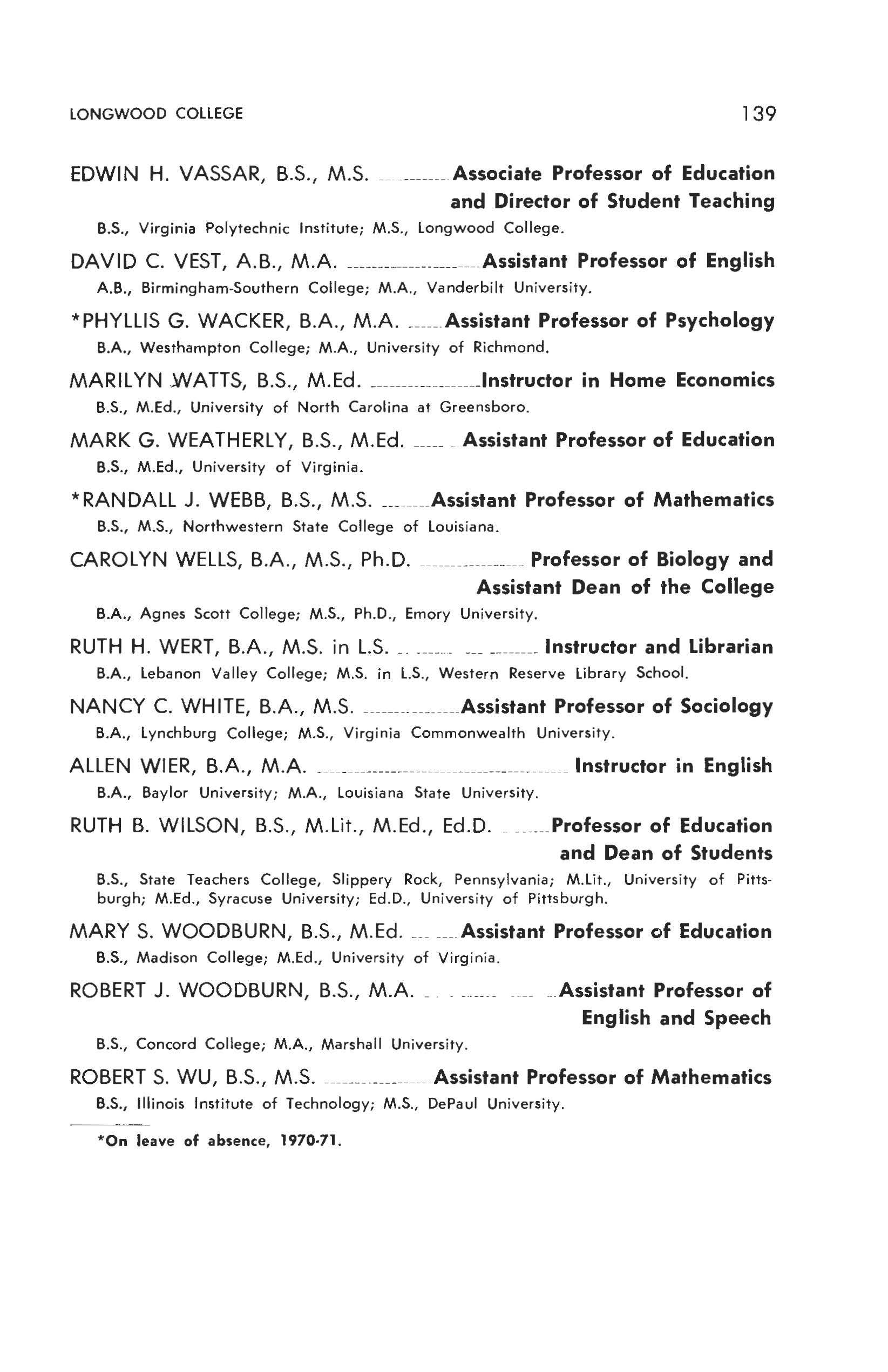
MARY S. WOODBURN, B.S., M . Ed . __ _ Assistant Professor of Education B.S., Mad ison College; M Ed , University of Virgin ia
ROBERT J. WOODBURN, B.S., M.A. _. B S. , Concord Co llege; M.A., Marshall Univers ity
... Assistant Professor of English and Speech
ROBERTS WU, B.S., M S. __ Assistant Professor of Mathematics B S. , Ill i nois Institute of Technology ; M S. , DePaul Un iv ersity.
*On leave of absence, 1970-71.
Absences
Academic and professional life __
Academic honors ___
41 21 47
Academic probation ---------· 44
Academic regu lat ions · 39 Accreditation -·------ 1, 12
Adjustments in curriculum requirements ---···- -----· -·- 40
Administrat i ve officers ------· 124
Administrative offices ------·- 7 Admission requirements _ 15 Adm :ssion to the Program of Teacher Education ·--
Advanced Placement ·Alumnae Association · Anthropology Application blank _ --·-
Application fee ··-Art -·
Art building _ --·· Athletic Association Athletic facilities __ Auditorium _ --··---
Automobile registration ·--Biology ·-Board of Vis itors __ _
45 41 121 97 143 30 65 10 24 9 8 32 108 123
Book store -------··· 11 Business education -· 68 Calendar, 1970-71 4
Campus ·- 7
Campus school ·- ----·--- 10 Changes in requirements -· 50 Chemistry 110 Choir and Chorus __ ··- -·20, 107
Class attendance __ _
Class rooms ---····- ------·-
Closed circuit Television College year ------··__
Commencement --··-__
Cooperative Program with
41 8 9 12 12 Hampden Sydney College · ·- 13
Course changes _ -·-- 31, 40
Course numbers _ ·--- ~ 39
Credits __ 39
Cultural, social and rec reational life 20 Day students 29
Departments of instruction __ _
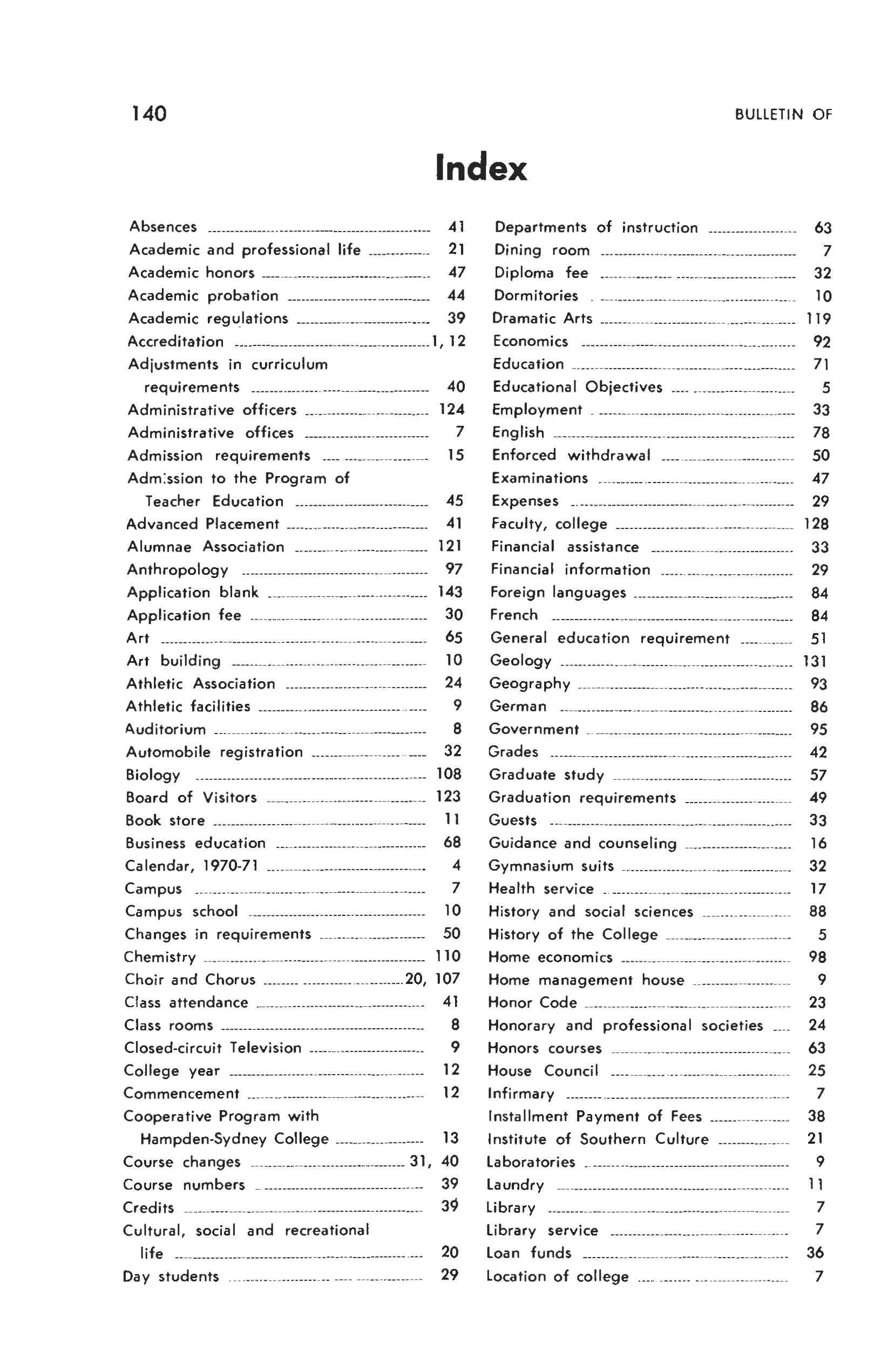
Dining room -----···-- ··- -----· ·· Diploma fee ________ Dormitories __ ·-·---Dramatic Arts ___ ··--Economics ---------·-··--- ·Education Educational Objectives __ _ Employment _ -----· English -·-Enforced withdrawal ___ _
63 7 32 10 119 92 71 5 33 78 50 47
Expenses 29
Faculty , college --·· 128 Financial assistance ---·-- ·---- 33 Financial information 29 Fore ign languages ___ 84 French ·-·-·-- 84 General education requirement _ 51 Geology 131 Geography ----·-German ---·- ·----Government _ Grades ----· ---· Graduate study ----··-
93 86 95 42 57 Graduation requirements ____ 49 Guests ·- 33 Guidance and counseling ·-- 16 Gymnasium suits 32 Health service _ -· -·- 17 History and social sciences __ 88 History of the College -·--·- ----·· 5 Home economics 98 Home management house _ 9
Honor Code ___ 23 Honorary and professional societ ies ____ 24
Honors courses House Council · Inf irmary -· ·
63 25 7
Installment Payment of Fees __ 38
Institute of Southern Culture ·-··· 21 Laboratories _ ---· -----· 9
Laundry -------·- 11 Library •- ----·-- ·----- 7
Library service ---· · · ··-- 7 Loan funds -·· 36 Location of college _________ _ 7
Mathematics ·- · ··--·-·--·- ·-··············· 101
Moral and religious life -····· 19 Music -·-····· 103 Music building ·-·-··· 10 Natura I sciences 107 Nursing ·-·· ··-··-··· ···· 54 Organizations ···-··· ···- 22 Out-of-state students ·-·· 29, 30 Overload ···-·· ··- · 29 Payments ···-· ··-·•- ···-··· 32 Physical and health education 113 Philosophy -········· -· · 75 Physics 111 Placement service ··- ········ 18 Post office ··-· · ··-·- ·· 11
Prerequ isites for student teaching ···· 46 Programs of study ····- 51 Psychology -··· ······--···· ····· 73 Publications Qua Iity credits ... Recreation centers ____ _ Refunds
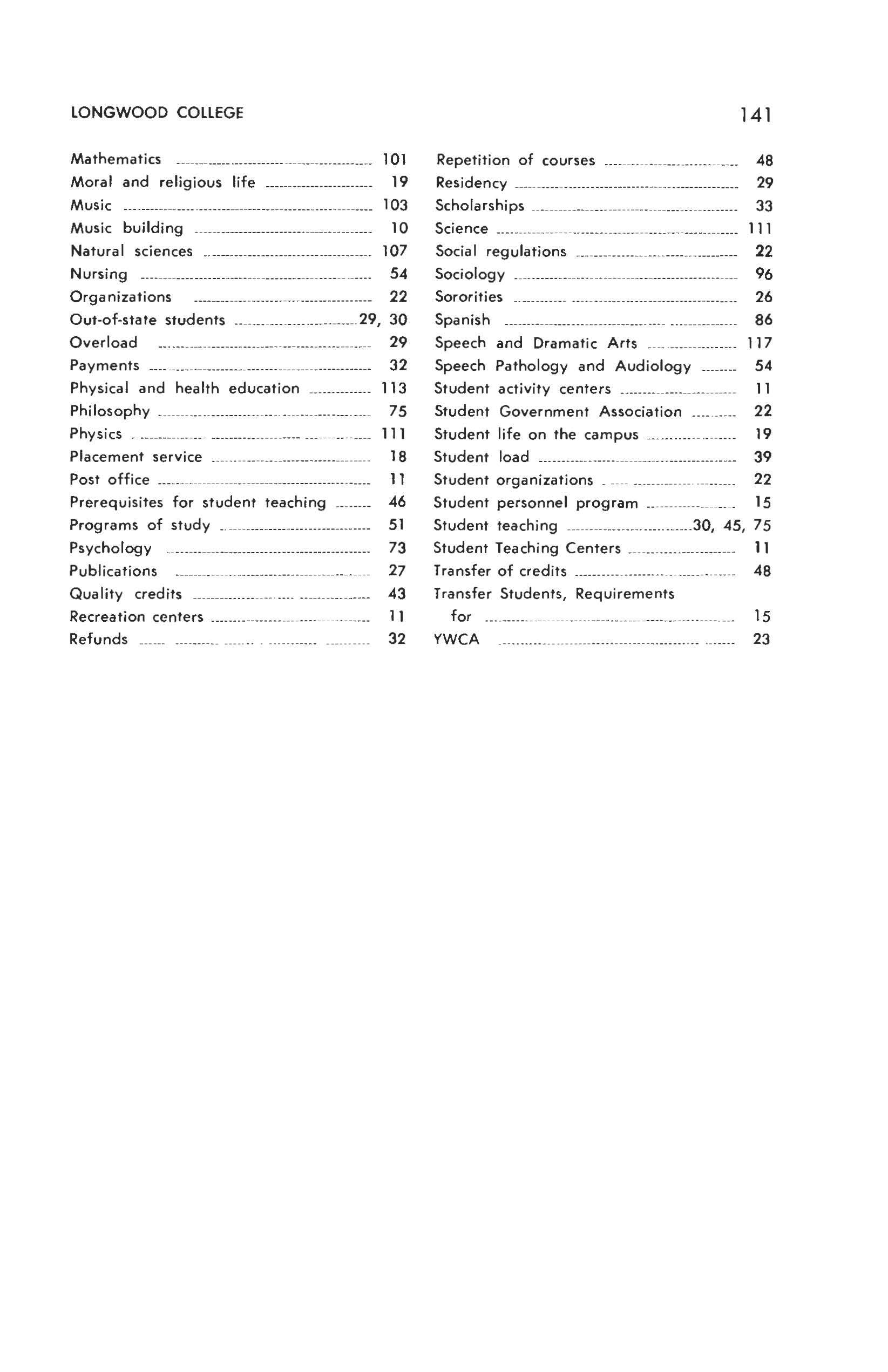
27 43 11 32
Repetition of courses ·············· ···············
Residency ··--·· ·······- --·· -·····
Scholarships ·-······ ·· Science ··-····-·· · Socia I regulations -· ··---···· Sociology ··--·-···· · Sororities Spanish
48 15 23
48 29 33 111 22 96 26 86 Speech and Dramatic Arts 117 Speech Pathology and Audiology 54 Student activity centers 11 Student Government Association 22 Student life on the campus .. ...... .. .... .. .. .. 19 Student load ·····-·············· ··-··········-········· 39 Student organizations ··-··········· 22 Student personnel program 15 Student teaching · 30, 45, 75 Student Teaching Centers .... . ....... 11 Transfer of credits Transfer Students, Requirements for ····--· ··· YWCA
Communications relative to general college policies should be addressed to the President of the College.
Requests for specific information about courses and curricula for both the undergraduate and graduate programs of the College and requests for summer catalogues should be addressed to the Dean of the College.
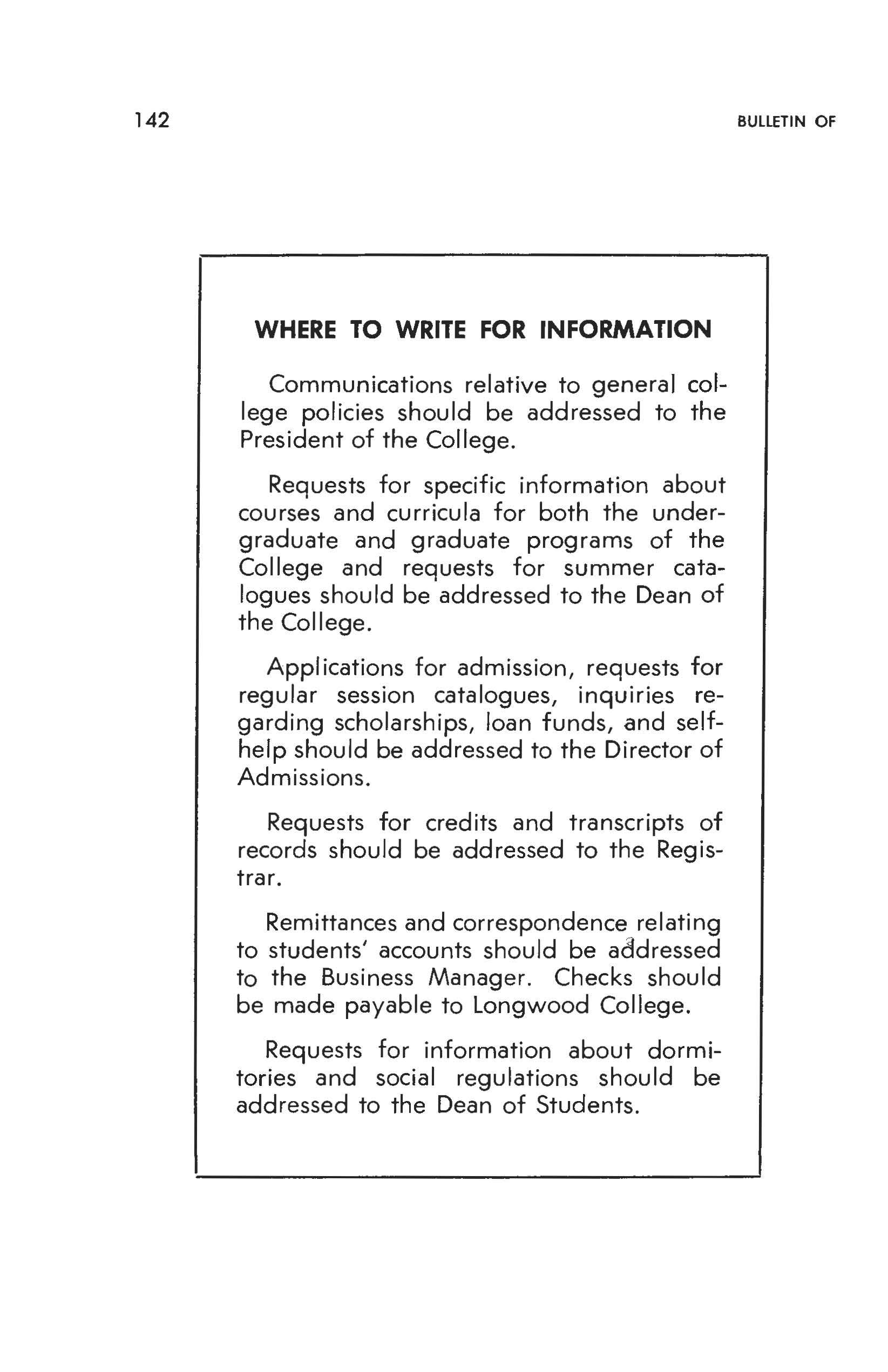
Applications for admission, requests for regular session catalogues, inquiries regarding scholarships, loan funds, and selfhelp should be addressed to the Director of Admissions .
Requests for credits and transcripts of records should be addressed to the Registrar.
Remittances and correspondence relating to students' accounts should be addressed to the Business Manager. Checks should be made payable to Longwood College.
Requests for information about dormitories and social regulations should be addressed to the Dean of Students.
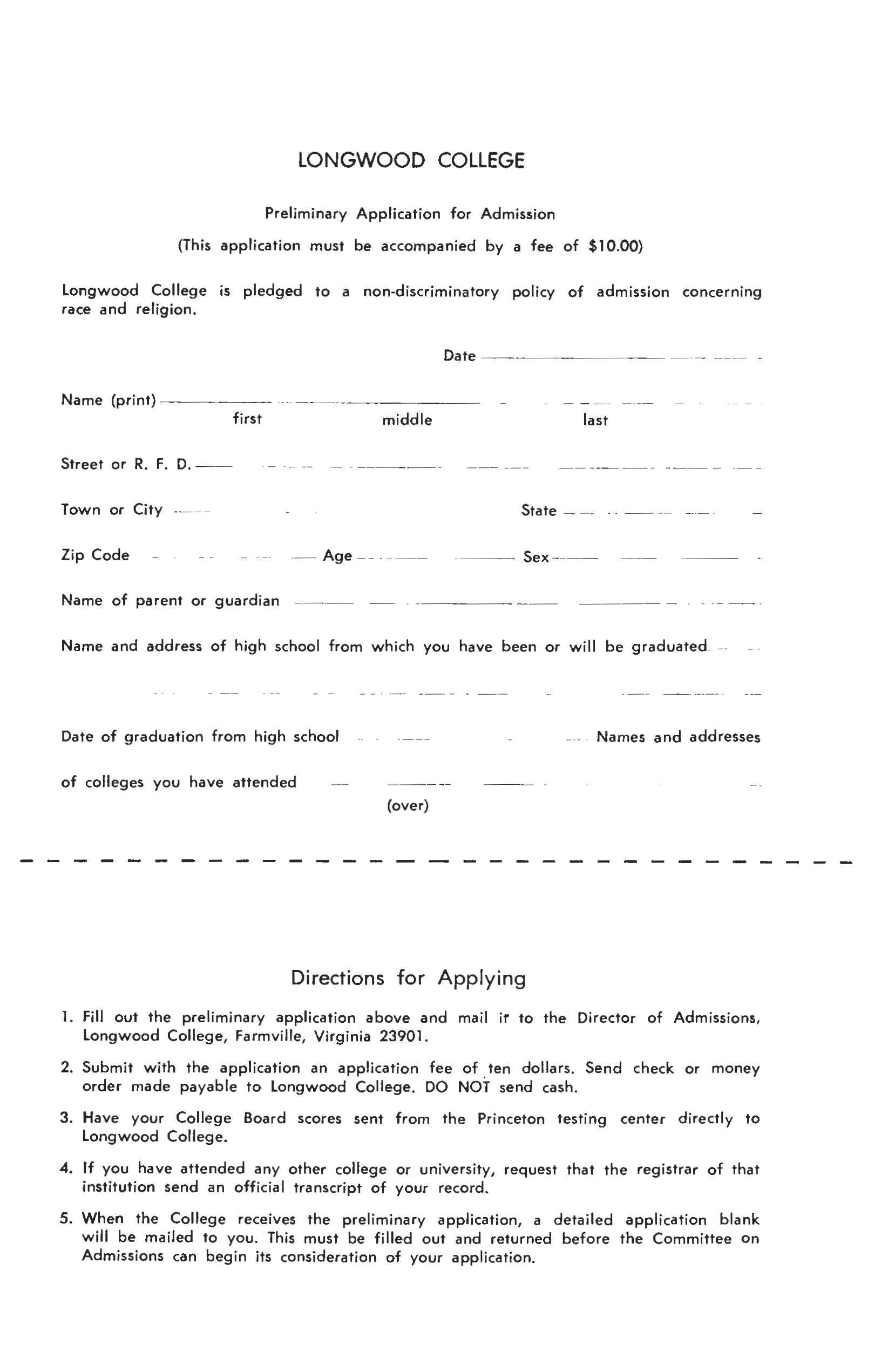
(This application must be accompanied by a fee of $10.00)
Longwood College is pledged to a non-discriminatory policy of admission concerning race and religion
Name (print)first Street or R. F. D.
Town or City Zip Code
Name of parent or guardian
middle Age
Date last State Sex
Name and address of high school from which you have been or will be graduated
Date of graduation from high school
of colleges you have attended (over)
Names and addresses
l. Fill out the preliminary application above and mail ir to the Director of Admissions, Longwood College, Farmville, Virginia 23901.
2 . Submit with the application an application fee of ten dollars. Send check or money order made payable to Longwood College DO NOT send cash.
3. Have your College Board scores sent from the Princeton testing center directly to Longwood College.
4. If you have attended any other college or university, request that the registrar of that institution send an official transcript of your record.
5. When the College receives the preliminary application, a detailed application blank will be mailed to you This must be filled out and returned before the Committee on Admissions can begin its consideration of your application.
Will you be a boarding student?
Date that you wish to enter
Have you taken the College Board Scholastic Aptitude Test?-------- Have your scores been sent to Longwood College?
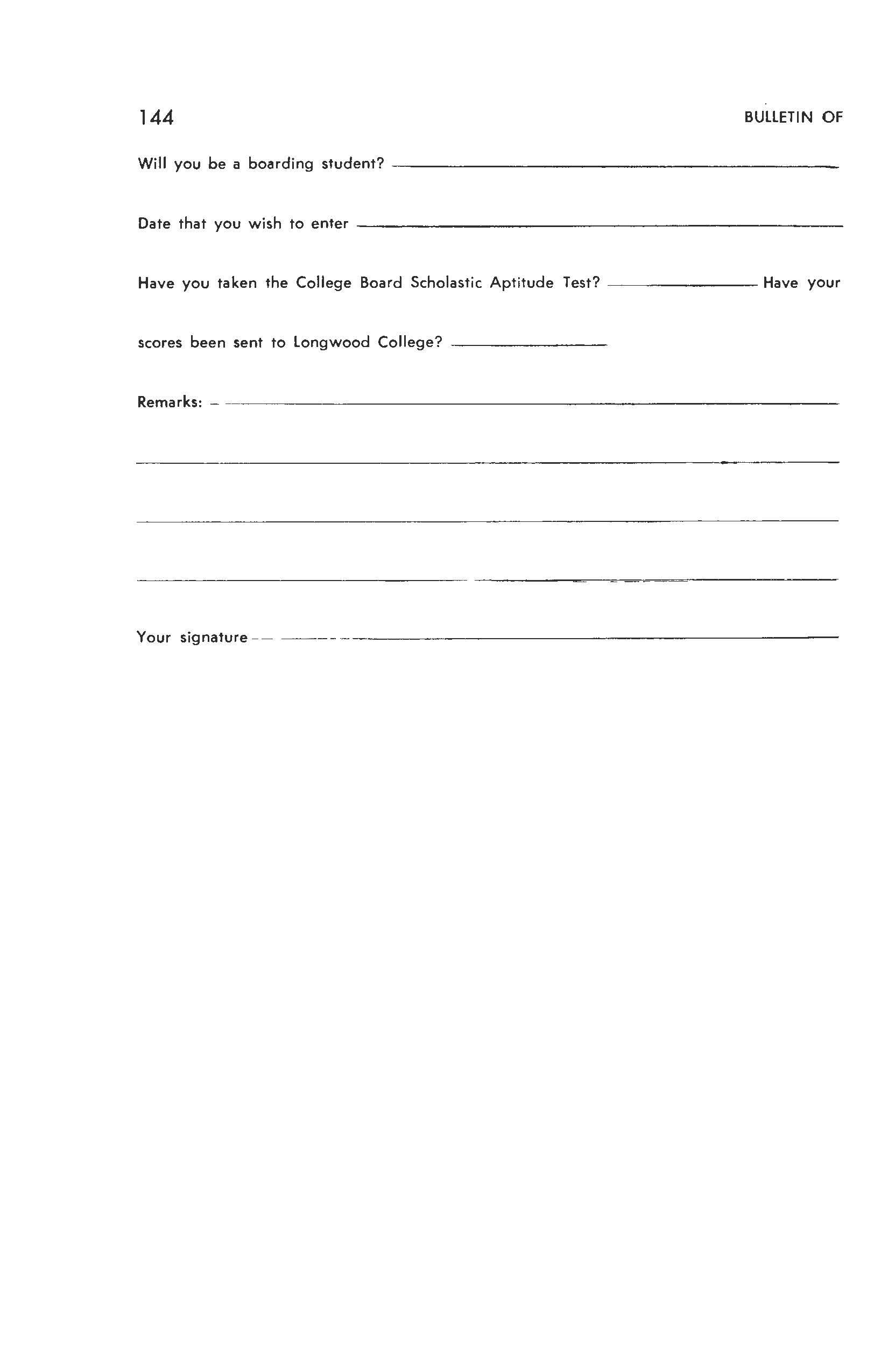
Remarks:
Your signature------




